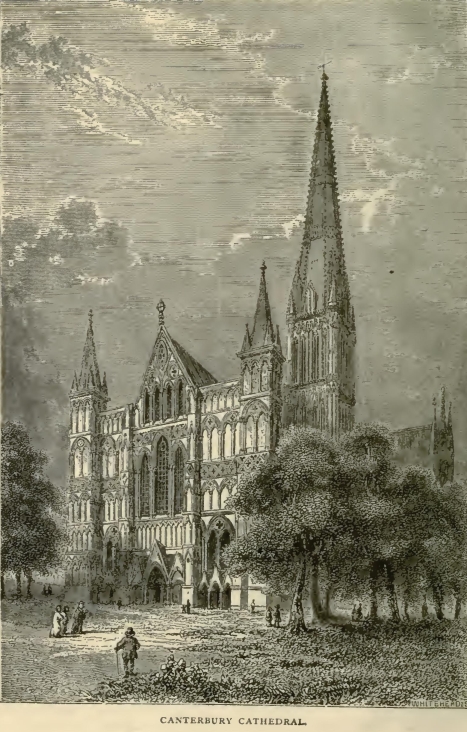
The Project Gutenberg EBook of Agnes Strickland's Queens of England, Vol.
I. (of III), by Rosalie Kaufman and Agnes Strickland
This eBook is for the use of anyone anywhere in the United States and most
other parts of the world at no cost and with almost no restrictions
whatsoever. You may copy it, give it away or re-use it under the terms of
the Project Gutenberg License included with this eBook or online at
www.gutenberg.org. If you are not located in the United States, you'll have
to check the laws of the country where you are located before using this ebook.
Title: Agnes Strickland's Queens of England, Vol. I. (of III)
Abridged and Fully Illustrated
Author: Rosalie Kaufman
Agnes Strickland
Release Date: October 15, 2014 [EBook #47121]
Language: English
Character set encoding: ISO-8859-1
*** START OF THIS PROJECT GUTENBERG EBOOK QUEENS OF ENGLAND, VOL. I ***
Produced by David Widger from page images generously
provided by the Internet Archive

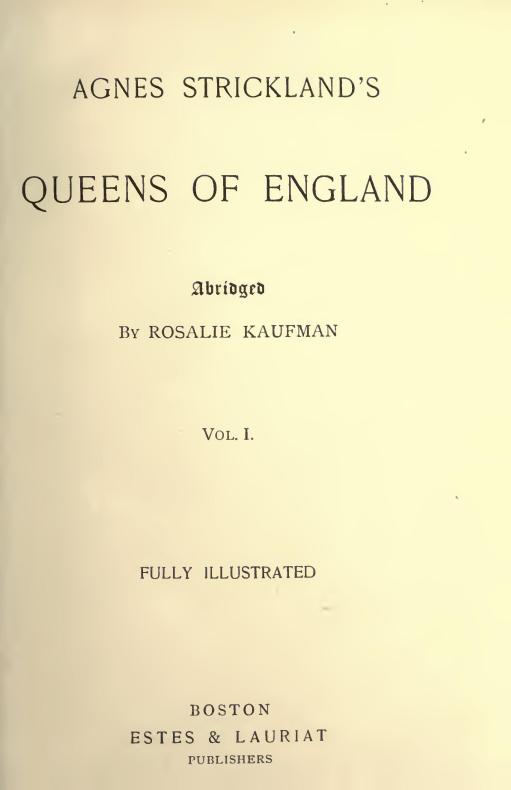
Up to Queen Anne, this work is based upon Agnes Strickland's "Queens of England;" but subsequent to that period many authorities have been consulted, and only such matter used as would seem appropriate. My first care was to prepare a narrative which should interest young people, but I have endeavored also to produce a result that would prove a source, not only of pleasure, but of profit. The limits of the design make it evident that some eminent names and noteworthy events could receive slight mention, or none at all, and that politics could be introduced only when requisite for the comprehension of events that depended on them. It will be a satisfaction to hope that my readers may be prompted to independent inquiry.
CONTENTS
STORIES OF THE LIVES OF THE QUEENS OF ENGLAND
CHAPTER I. MATILDA OF FLANDERS, WIFE OF WILLIAM THE CONQUEROR
CHAPTER III. MATILDA OF SCOTLAND, QUEEN OF HENRY I.
CHAPTER V. MATILDA OF BOULOGNE, QUEEN OF STEPHEN
CHAPTER VI. ELEANORA OF AQUITAINE, QUEEN OF HENRY II.
CHAPTER VII. BERENGARIA OF NAVARRE, QUEEN OF RICHARD I.
CHAPTER VIII. ISABELLA OF ANGOULEME, QUEEN OF KING JOHN.
CHAPTER IX. ELEANOR OF PROVENCE, QUEEN OF HENRY III.
CHAPTER X. ELEANORA OF CASTILE, FIRST QUEEN OF EDWARD I.
CHAPTER XII. ISABELLA OF FRANCE, QUEEN OF EDWARD II.
CHAPTER XIII. PHILIPPA OF HAINAULT, QUEEN OF EDWARD III.
CHAPTER XIV. ANNE OF BOHEMIA, SURNAMED THE GOOD, FIRST QUEEN OF RICHARD
CHAPTER XV. ISABELLA OF VALOIS, SURNAMED THE LITTLE QUEEN, SECOND WIFE
CHAPTER XVI. JOANNA OF NAVARRE, QUEEN OF HENRY IV.
CHAPTER XVII. KATHERINE OF VALOIS, SURNAMED THE FAIR, WIFE OF HENRY V.
CHAPTER XVIII. MARGARET OF ANJOU, QUEEN OF HENRY VI.
CHAPTER XIX. ELIZABETH WOODVILLE, QUEEN OF EDWARD IV.
CHAPTER XX. ANNE OF WARWICK, QUEEN OF RICHARD III.
CHAPTER XXI. ELIZABETH OF YORK, QUEEN OF HENRY VII.
CHAPTER XXII. KATHARINE OF ARRAGON, FIRST QUEEN OF HENRY VIII.
CHAPTER XXIII. ANNE BOLEYN, SECOND QUEEN OF HENRY VIII.
CHAPTER XXIV. JANE SEYMOUR, THIRD QUEEN OF HENRY VIII.
CHAPTER XXV. ANNE OF CLEVES, FOURTH QUEEN OF HENRY VIII.
CHAPTER XXVI. KATHARINE HOWARD, FIFTH QUEEN OF HENRY VIII.
CHAPTER XXVII. KATHARINE PARR, SIXTH QUEEN OF HENRY VIII.
Norman Arches......016
William the Conqueror......020
William the Conqueror, from Tapestries......021
Conqueror and Conquered......023
Landing of William the Conqueror......025
Ruins of Hastings......029
Old Westminster......033
Ships of William the Conqueror, from Tapestries.......036
The Tower.....037
Robert Discovers his Father.....039
Trophy of Norman and Saxon Arms.....041
Pleasure Barge on the Thames.....044
Matilda of Scotland.....047
Queen Margaret's Chapel.....051
The Beacon.....053
Death of the Red King.....055
College at Oxford.....059
Playing at Bowls.....061
Norman Font.....065
Exterior Pulpit.....066
Ancient Windsor Castle.....068
Abbey of St. Etienne.....071
Norman Tower.....073
Entrance to Norman Chapel.....075
Arundel Castle.....078
Horn.....079
Scold's Bridle.....080
A Battle.....081
Escape from Oxford.....085
Norman Robe.....088
The Pilgrim.....090
Eleanora of Aquitaine.....091
Crusaders on their March.....095
The Maze......101
Murder of Thomas à Becket......103
Tomb of Henry II......107
Berengaria of Navarre......111
Leaders of the First Crusade......115
Capture of Acre......119
Costumes of the Period......122
Isabella of Angoulême......125
The Crypt in Old Windsor......128
John's Anger after Signing Magna Charta......129
Magna Charta Island......132
Interior of Gloucester Cathedral......133
Eleanor of Provence......139
Angel Tower and Chapter-House, Canterbury......143
York, Chapter-House......147
Alnwick Castle, Northumberland......151
Gateway and Keep, Alnwick......153
King Henry and his Barons......155
Archers......159
Eleanora of Castile......161
Attempt on Edward's Life......165
Caernarvon Castle......171
Marguerite of France......177
Old Charing Cross......180
Isabella of France......183
Retainer's Hall......190
Westminster Hall......193
Under the Tower......195
City Hall, Valenciennes......201
Old Fort at Oxford......205
Edward II. and his Jailers......210
Tomb of Edward II., Gloucester Cathedral......211
Philippa of Hainault......215
Doorway......219
Philippa on her Knees before the King......227
Tomb of Edward III......231
Anne of Bohemia......235
Houses on Old London Bridge......238
Beards......242
Isabella of Valois......245
Joanna of Navarre......255
Shrewsbury......258
Before Agincourt......259
Costumes......262
Katherine of Valois......265
Friar Bacon's Study......267
Donjon at Vincennes.......277
Margaret of Anjou......281
Ruins of Kenilworth Castle......293
Royal Apartments......297
Warwick Castle......305
View of Verdun......311
Elizabeth Woodville......317
Windsor Castle......321
Vault of St. George's Chapel......324
Bloody Tower......325
Crypt in Tower......326
Anne of Warwick......329
Dungeon, Tower......331
Elizabeth of York......333
Chapel of Henry VII......340
Costumes......341
Katherine of Arragon......343
The Alhambra......347
London Bridge......350
Reception Room......353
Richmond Church......355
Richmond Palace......359
Bedroom of Henry VIII., Knoll Castle......363
House of Sir Thomas More......368
Wolsey's Tower......373
Hever Castle......385
Whitehall, Wolsey's Palace......388
Anne Boleyn's Chamber, Hever Castle......390
Watergate, Tower......393
Hampton Court......397
Jane Seymour.....405
Hampton Court, Garden Front.....408
Waterloo Bridge and Somerset House.....420
Guard Chamber, Lambeth Palace.....421
Heads on Old London Bridge.....423
Court Gardens.....425
Stairway.....429
Katharine Parr.....431
Old St. Paul's.....437
Essex House.....443
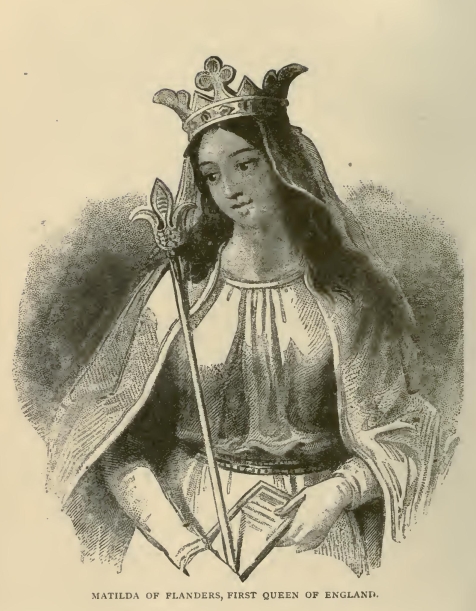
Matilda, wife of the great William, the Conqueror, was an exceedingly handsome woman, and as she had received the best education that was possible in her times, she was as celebrated for her learning as for her beauty. She was, besides, generous and religious, and had all the qualities necessary for the position she was called upon to fill.
She was famed for her fancy-work, which was looked upon as one of the most important and desirable occupations for ladies of rank; and any woman who could spin, weave and embroider was considered quite a treasure.
Matilda had three cousins who were such skilful needlewomen, that they were sought in marriage by the greatest princes of Europe. Their work has not been preserved, but Matilda's still remains and is called the Bayeux Tapestry. It is the most wonderful achievement in needlework ever accomplished by any woman. But we shall tell more about it, by-and-bye.
Matilda's father was Earl of Flanders, a rich, powerful prince, skilled in the arts of peace and war. He was, besides, such a popular man that all the rulers in his 016 neighborhood were anxious to win the hand of his beautiful daughter.
Her cousin, William of Normandy, was the most accomplished of them all, and loved her devotedly. He was handsome, brave and talented, and so strong, that, it is said, no man could bend his bow but himself. And he was such a sure marksman, that even when riding at full speed, he seldom missed his aim. It is remarkable that although he was the tallest man in his army, he passed through all his battles without the loss of a drop of blood, until towards the close of his career, when he was wounded by his own son.
Strange to say, this young man did not find favor in the eyes of his lady cousin at all; this mortified him so much, that he resolved to win her in spite of herself.
He had a rival in a young Saxon nobleman named Brihtric Meaw, who had come to Flanders as ambassador from Edward the Confessor, then on the British throne. This favored gentleman was so fair and light-haired that he was nicknamed "Snow." Matilda loved him in secret, which is probably the reason why she would not listen to her cousin William. 017 But Brihtric Meaw does not seem to have cared particularly for her, and so did not find out what her sentiments were towards him. Thus, quite innocently, he never attempted to court her, and she could not forgive his indifference. Still her mind was filled with him, and this made her treat William coldly. He was not to be baffled, however, but courted her through seven long and tedious years.
At last he became impatient, so one day when Matilda was going home from church, he managed to meet her, as lovers will. Perhaps she was more unkind to him than usual and made him angry, otherwise I do not know how to account for his behavior on that occasion, but he seized hold of her, rolled her in the dirt, then actually beat her. Before she had time to call for help, after she had recovered from her surprise, he jumped on his horse, and rode off as fast as he could go.
Now, she might have been induced to forgive him for spoiling her good clothes, but how she could have had anything more to do with a fellow, no matter what his rank might be, who could dare to treat her so brutally, is hard to understand. Perhaps the women were not so high spirited then as they are now, but certain it is that instead of getting into a rage, stamping her feet and forbidding him ever to approach her again, the princess was won. This remarkable style of love-making went straight to her heart, and brought matters to a crisis. It may be that she feared another beating, or that she was finally convinced of the greatness of his love; whatever it was, she consented to become his wife, forthwith.
The wedding was celebrated at William's Castle in Normandy, Matilda having gone there accompanied by her parents, and a large retinue of ladies and gentlemen. Her trousseau was magnificent, and on her wedding day she wore a superb velvet robe embroidered with gold and 018 pearls. It was so rich and costly, that it was for a long time preserved in the treasury of the Cathedral of Bayeux with William's mantle and helmet, which were adorned with precious stones.
At the time of his marriage, William's affairs were in a most perilous condition, for he was surrounded by powerful neighbors who wanted to get possession of the rich fields of Normandy. They hoped to divide them among themselves and leave the duke nothing. He had enemies among his own subjects too, who would have been pleased to turn him off and have his cousin Guy of Burgundy to govern them, because they thought he had a better right to the dukedom of Normandy than William had. Perhaps this was so, but the latter had too determined a will to yield, and he had been a leader nearly all his life.
When he was only five years old, he formed a battalion of boys of his own age whom he drilled in military practice every day. It must have been a pretty sight, and no doubt the little fellows fancied themselves real warriors. Of course disputes arose, all of which William settled with remarkable skill.
He was a good student too, for he knew enough of Latin at eight years of age, to read and explain Caesar's Commentaries.
When he was about seven, his father, Duke Robert, went on a pilgrimage to the Holy Land. But before he did so, he assembled all the nobles of his realm, and made them swear fealty to his bright, promising child, whom he hugged and kissed tenderly, then presented to his subjects as their future Sovereign, saying: "He is little, but he will grow."
Not long after this, Henry, King of France, invaded William's dominion, but he was defeated, because the young duke had such excellent advisers and assistants. 020
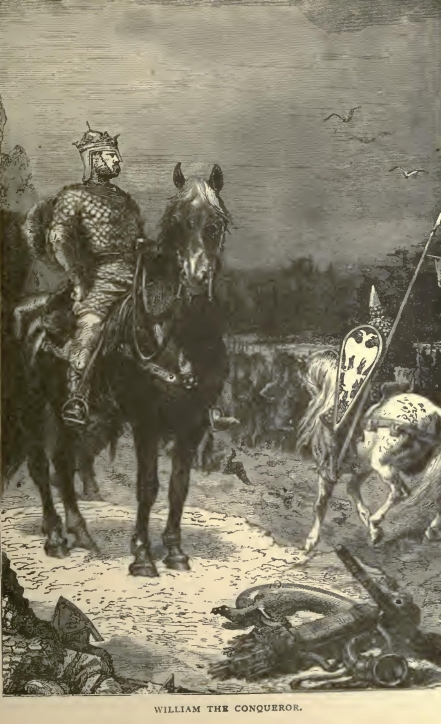
021The king was so indignant at this defeat, that he incited the Norman nobles to stir up an insurrection, hoping, no doubt, to punish the boy by depriving him of his title, altogether.
Once when William was out hunting, he passed the night at a remote castle without military escort. His cousin, Guy of Burgundy, hearing of it, laid a plot to kill him, but this was prevented by the Court fool, who accidentally found it out and travelled all night, at full speed, to warn the Duke of his danger. He managed to get into the castle at four o'clock in the morning, and knocked violently on William's chamber door with the handle of his whip, shouting: "get up! get up, my lord!" William obeyed the summons, and mounting his swiftest horse, half dressed, rode with fiery speed for many hours before he was beyond danger. Even while making his escape, he might have been caught, for his horse was almost exhausted when he had the good fortune to meet a gentleman who supplied him with another.
Later, the young duke had a chance to turn the tables on his cousin, Guy, whom he captured in battle. But remembering that they had been friends in early childhood, William forgave the attempt his cousin had made on his life, and released him.
The King of France was just planning another attack on William's dominions when the young man married, and 022then Matilda's father became such a powerful ally that the king hesitated. Soon after he died. Relieved of this anxiety, the duke thought he might settle down and enjoy the society of his young wife; but, the Archbishop of Rouen, who had reasons of his own for trying to prevent the marriage, pronounced it unlawful, and the young couple were so distressed that they appealed to the Pope. He decided that if each would build and endow an Abbey, as well as a hospital for the blind, he would grant them dispensation. This was not difficult, so Matilda founded the Holy Trinity for Nuns, and William founded the Monastery of St. Stephen.
Then William set to work to erect a palace for his own dwelling very near the Monastery. Matilda had a great taste for architecture and took pleasure in superintending these buildings. The great hall of the palace was one of the finest apartments in all Europe and the edifice itself was superb.
This royal couple did everything to render their subjects happy and contented, and provided work for them by building ships and harbors, which promoted trade also.
Though we know that Matilda did not love her husband before marriage, she became a devoted wife afterwards, and William showed his entire confidence in her by leaving her to govern his country when he went over to England to obtain a promise from Edward the Confessor that he would adopt him as successor to the throne.
He was kindly received in England, and Edward gave him some fine hawks, hounds and other presents. Then Matilda had a little boy whose birth added considerably to her happiness. He was called Robert, after his grandpapa, and there was great rejoicing in Normandy over this event. If they could have foreseen how he would turn out, the feeling would have been very different. 023In course of time Matilda had eight other children, and during many years of peace and national prosperity, she and her husband devoted themselves to their care and education.
A.D. 1065. Now it happened that once, when Harold, Edward the Confessor's half brother, was out fishing in an open boat, he was overtaken by a storm and obliged to seek refuge in the territory of the Earl of Ponthieu, who seized him and shut him up in prison. William rescued him, treated him most kindly, and even promised him one of his daughters in marriage, though she was but seven years old.
Harold acted like a sneak, and pretended to be highly flattered; but it was not his intention ever to marry the girl at all.
He listened to William's narration of how Edward had adopted him as his successor to the British throne, and made a solemn promise to assist him to get it. Soon after his return to England, he married the widow of the Prince of Wales, and at Edward's death he took no notice of his promise to William, but had himself proclaimed king.
Of course such conduct aroused William's wrath, and, with the aid of his wife's relations, he resolved to invade England.
A.D. 1066. This was the year 1066, and a memorable 024one on account of the appearance in the heavens of a splendid three-tailed comet. We are pleased to have such a visitor and to be able to gaze at it and study it with the aid of telescopes, but in that time the people were so superstitious that they thought it portended evil, and so it spread terror throughout the land. The death of the King, which occurred only a few days after its appearance, served to encourage the superstition. When the astrologers foretold its approach they announced it thus:
"In the year one thousand and sixty-six,
Comets to England's sons an end shall fix."
One of the largest and finest pieces of handiwork that Matilda accomplished, was the tapestry representing this comet in the heavens with its three fiery tails spread all across the canvas. A group of terror-stricken Saxon princes, priests and ladies have rushed out of their dwellings to look at it, and are pointing towards it, their faces expressing the utmost anxiety. To be sure the comet looked, when compared with the objects in the picture, a great deal larger than it could possibly have been, but probably, the size was suggested by the awe it inspired.
Matilda did not do all this work alone; if she had, Hood's Song of the Shirt might well apply to the hundreds and thousands of cross stitches that she would have made, and we should pity her for having such a weary task. But she was assisted by all the ladies of her court, who laughed and chatted merrily while their hands were busily employed.
Well, William started on his expedition to England, leaving his wife to rule at home, and his son Robert, then only thirteen years of age, military chief of Normandy.
A large number of his subjects objected to this invasion, SO when the whole fleet was becalmed at St. Valleri, the
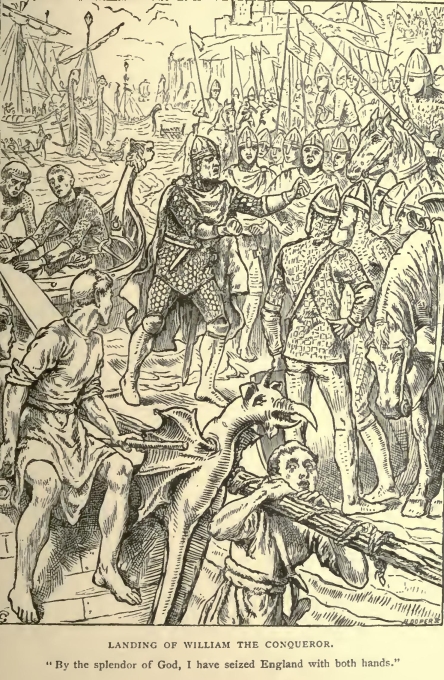
027common soldiers complained and declared that God was their adversary, and had stopped the wind to keep them back. The king did not know what to say to this, but at last he hit upon something that he knew would impress them. He ordered the shrine of St. Valleri to be brought from the tomb and placed in an open field, then invited everybody to pray to the saint to intercede with the Almighty for a breeze. Crowds of people far and near, as well as the Norman soldiers, brought offerings, and in a short time the shrine was buried in the gold, silver and other precious gifts that they placed upon it. The wind did not immediately change, but the malcontents had something to think about, and the delay gave Matilda time to carry out a pleasant surprise that she had planned for her husband. One day she appeared in the harbor on a splendid vessel of war that she had caused to be built as a present for William. She called it the Mora. At the prow of the vessel was a gold image of their youngest son. With one hand he held a trumpet to his lips, and with the other a bow with the arrow aimed towards England. Loud cheering and joyful exclamations greeted Matilda's appearance, and her husband was overcome by this mark of her affection.
The Mora carried a red flag at her mast-head by day; it was replaced at night by a bright light that served as a guide for the other vessels of the fleet. Scarcely was the duke well established on board than the long wished-for wind arose, every man was summoned to his post, and they set sail. Matilda went back home.
The Norman fleet met some very rough weather and lost two of their ships. On the 28th of September, 1066, they landed on the coast of Sussex.
The duke was the last person to step on shore. As he did so, he stumbled and fell. Probably he was still giddy 028from the motion of the vessel, but his followers thought it an evil omen and raised a great cry of distress. The duke's presence of mind did not desert him. He picked up two handfuls of sand, exclaiming: "See, Seigneurs! by the splendor of God, I have seized England with both hands!"
Then a meal was served on the beach, and afterwards the soldiers having selected a spot, began to put up the wooden fortress that they had brought in sections, from Normandy.
A piece of Matilda's tapestry represents the soldiers, assisting the carpenters and builders in this work.
The army tarried four days on the beach. But there were no telegraphs or newspapers in those days, so Harold knew nothing of the approach of his enemy until a knight arrived from Sussex, having ridden all the way without food or rest, and rushing into his presence shouted at the top of his voice: "The Normans have come! they have landed at Hastings and built up a fort! they will rend the land from thee and thine unless thou defend it well!" Harold sent a messenger offering to buy off the Normans, but William replied that he had not come for money, but to claim the realm that Edward the Confessor had given him.
"Nay; you ask too much of us, Sire," said the messenger. "Harold is willing to purchase your departure with silver, gold and fine garments, but if you refuse, he will give you battle on Saturday night."
The duke accepted the challenge. The night preceding the battle was passed by the English in dancing, singing and gambling; but the Normans prayed, fasted, and confessed their sins.
The battle was fought seven miles from Hastings. Taillefer, the warrior minstrel of Normandy, rode gallantly 029
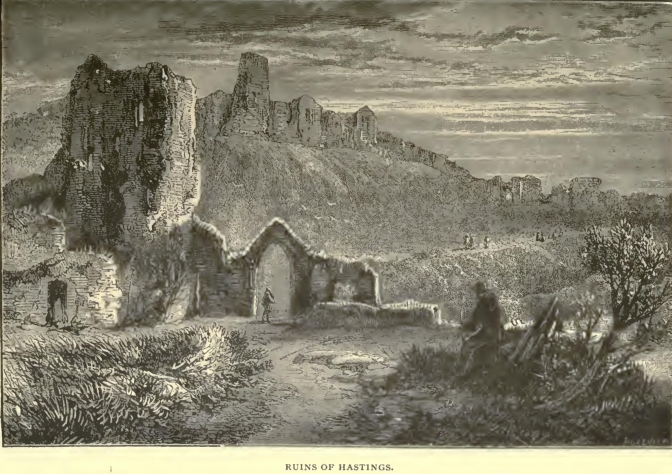
031at the head of the chivalry of his native land, singing the war songs of Rollo. William had three horses killed under him that day without receiving a single scratch himself. Harold was killed, and the victorious Duke William pitched his tent on the battle-field that night.
When Matilda received the joyful tidings of her husband's triumph, she was praying in a church, which, she ordered to be forever after called Notre Dame de Bonnes Nouvelles, in memory of the good news she had received there.
A celebrated piece of embroidery made by her after the victory represents her husband pointing towards his noble steed. He is dressed in a complete suit of armor, and the likeness is said to be as perfect as it could be, represented in cross stitch.
O n the Monday following the battle of Hastings, William rode into the city of London, on horseback, followed by a long train of the nobility of England and Normandy. He proceeded to Westminster Abbey, where he was crowned King of England.
Grand preparations had been made for this event, and such a brilliant coronation had never been seen. Crowds of people gathered in the streets, and the duke's fine presence and noble bearing won all hearts.
Holding the crown aloft the archbishop asked the nobles assembled, if they were willing to receive this duke for their king. They were so boisterous in their eager assent, that the Norman soldiers who had assembled outside the Abbey in case their protection should be needed, mistook the noise for the rising of the Saxons, and set fire to most of the buildings in the neighborhood. It required prompt action on the part of the more sober-minded of the Normans, to prevent the flames from destroying the Abbey itself. William was dismayed at this occurrence, and it was not until he showed himself in his coronation robes and crown, that his followers could be restored to order and quiet.
Now, one would naturally suppose that in those rude times, Matilda's neighbors would have taken advantage of her husband's absence to invade her dominion, but she governed with so much skill and prudence that they did 033not venture to molest her, and she made herself universally beloved and respected.
Having recounted the good traits of this queen, it is only fair to present the bad ones too, because nobody is entirely without faults, yet it is painful to be obliged to refer to one very dark deed of which she was guilty.
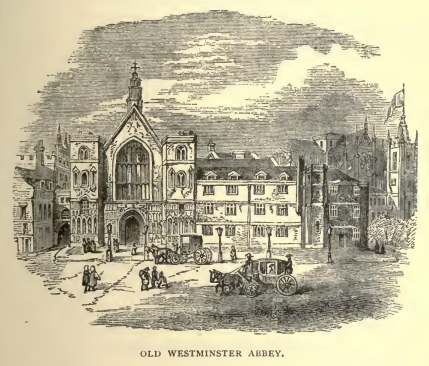
She must have had a large share of vanity, for she never forgave Brihtric Meaw because he did not return her early affection, and fourteen years later she sought revenge in this wise: She persuaded her husband to deprive Meaw of all his lands and bestow them on her; then she had him put in prison where, after several months, he died. This was a very serious crime, and it is hard to understand how a woman with everything in the world to make her 034happy, and with qualities so fine and noble as Matilda's certainly were, could have been capable of it.
After an absence of six months, William returned to Normandy, accompanied by a number of Saxon noblemen. He brought a large quantity of costly spoils, among which were garments richly embroidered in silver and gold by the skilful hands of the Anglo-Saxon women, whose beautiful work was renowned all over the world.
The whole summer was spent by the royal couple in travelling and amusements until news was brought to William that his Saxon subjects were planning an insurrection, when he hastened back to England. He arrived before any very serious steps had been taken.
He now began to see that his position would be in every respect more agreeable, and his subjects would be better, satisfied if he had his family at court, so he sent a numerous company over to Normandy to conduct them to England.
A.D. 1068. They proceeded at once to Winchester, where the queen's coronation took place with great pomp and ceremony. In order to render it still more imposing, William had himself crowned a second time, but on this occasion there was no such excitement as disturbed the first crowning. Everybody was charmed with the graceful, majestic appearance of the new queen, though some of the Saxons objected to her being called Regina, which is the Latin word, signifying Queen. However, William insisted upon this honor being conferred on his wife; though previous to his reign all the wives of the various kings had simply been termed "the lady, his companion." To be sure, few of the queens of England could claim more illustrious descent than Matilda; for Alfred, the best and noblest of their sovereigns, was one of her ancestors, and 035she was connected with most of the royal families in Europe.
After the coronation ceremony, a grand banquet was served, at which both the king and queen presided.
Now, Matilda had to be served by her hew subjects, the English, because they would not have been satisfied if she had kept only her Norman ladies in attendance.
The king was so happy that he bestowed favors right and left in order to gain the affection of the nation. He also revived some of the old offices at court, which was a very popular act. Among these, was that of grand pannetier, whose duty it was to carry the salt and the carving-knives from the pantry to the king's dining-table on state occasions. His fees were the salt-cellars, spoons, knives, and bread-covers laid on the royal table. Forks were not among the luxuries of William the Conqueror's day, when people must have verified the proverb of later times, that "fingers were made before forks." The Manor of Addington was presented to the cook for preparing a kind of white soup that tickled his majesty's palate.
During the grand coronation banquet, a noble cavalier, named Marmion, rode into the hall on horseback, completely armed, and shouted out three times: "If anybody denies that our most gracious sovereign Lord William, and his spouse Matilda, are King and Queen of England, he is a false-hearted traitor and liar, and here I do challenge him to single combat."
Nobody accepted the challenge.
Under a glass case' at the Museum of Bayeux is preserved to this very day, a piece of canvas, nineteen inches broad and sixty-seven yards long, on which Queen Matilda embroidered the whole conquest of England by her husband. There are many hundred figures of men, horses, birds, beasts, houses, trees, castles, and churches, all done 036in their proper colors.
The designs were made by a dwarf artist named Turold, who seems to have been farsighted enough to know that the work would become celebrated, for he has curiously managed to introduce his own figure or name on the canvas wherever it was possible.
After William and his wife were seated on the throne, there was a season of tranquillity. Then the Conqueror laid the foundation for the great Tower of London, as well as other strong fortresses. But revolts began again, and the Normans demanded the return of Matilda. She resolved to gratify them, but in so doing displeased the English, for they knew that during her absence there would be fewer celebrations at court, and they would thus be deprived of opportunities for disposing of their fine goods.
A.D. 1069. All the working people were affected, more or less, by her departure, and they 037got into a habit of gathering at each other's houses to discuss their wrongs and grievances. Fearing that they might stimulate one another to revolt, William instituted the Curfew, or the tolling of a bell, at eight o'clock every evening. This was a signal for all the lights and fires to be put out in the dwellings; the word was originally couvre feu, which means extinguishing fires.
Then William made war in the north of England and laid waste the whole country. In one of the battles a fair young Saxon, who was engaged to one of the king's daughters, was killed.
As time went on, Norman customs were adopted in England, and that dialect, which was a mixture of French and Danish, became popular. The learned wrote and conversed in Latin.
Now, the ladies of Normandy, whose husbands were fighting William's battles, began to grow tired of the long separation; besides, certain bits of gossip that came over the water to them aroused their jealousy. So, many of them insisted on recalling their lords who, for the sake of peace, were obliged to desert the king, and obey. The queen herself set a very bad example, for growing jealous of a daughter of one of the priests, she actually had the 038poor girl secretly put to death. When William went to Normandy, he beat her severely for this shameful deed.
Such treatment does not seem to have surprised her very much, though, for she forgave him just as she did for a similar indignity before her marriage, and the royal couple were soon living on the most amicable terms again.
But there was one serious cause of disagreement between them. It was the great affection that the queen felt for her eldest son Robert. She loved him better than any of her other children, while the third son, William Rufus, was the king's favorite.
Robert was a proud, self-willed, quick-tempered lad, who always wanted to rule, and the position of trust and importance that he had filled in Normandy during his father's absence had encouraged this disposition. He was spoiled, and showed an inclination to rebel when William resumed the reins of government.
A.D. 1076. One day when he was walking with some companions around the castle, his two younger brothers, William Rufus and Richard, with a desire for boyish fun, threw some dirty water out of the window directly on his head. Instead of receiving the joke good-naturedly, or retaliating as any brother might be expected to do, Robert flew into a passion, and with a drawn sword in his hand rushed up-stairs, declaring that he would kill the offenders. A great tumult ensued, and it was only the appearance of their father who burst into the room, flourishing his sword, and pronouncing angry threats, that prevented fatal consequences.
That evening Robert privately withdrew from court with a party of young nobles who were attached to him. He stood upon his dignity and refused to bow to his father's will.
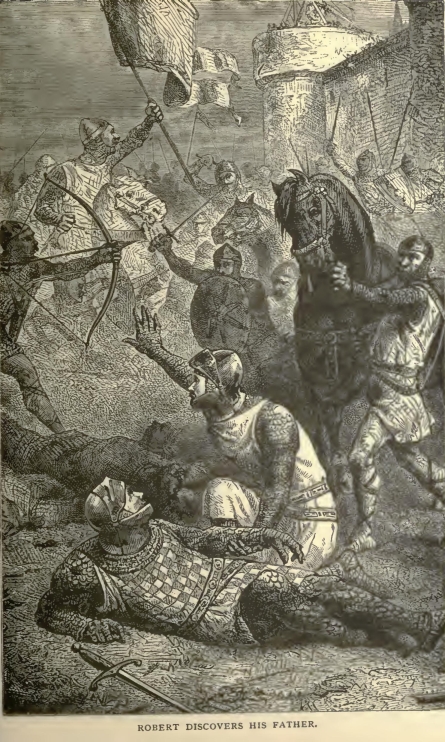
041About this time the Princess Constance married, and shortly after Princess Cicely entered a convent.
Then the queen received a severe blow in the death of her second son, Richard, a prince of most amiable disposition and studious habits. But Robert's bad conduct and his disrespectful behavior towards his father gave her more real sorrow than anything else in the world.
After a short absence he sought the king's presence and made a request that he should be appointed Sovereign of Normandy, saying, "It is my right; have you not promised to bestow it on me?"
"It is not my custom to strip until I go to bed," replied the king, adding some wholesome advice.
Then Robert, becoming impertinent,' said he did not come to listen to sermons, and angrily withdrew. He immediately went to live with his uncle, the Earl of Flanders. There he lived such a wild, extravagant life that his mother was frequently called upon to supply him with extra funds. When her private purse was empty, she sold her jewels and even her garments to provide the wicked youth with what he demanded.
All this was kept secret from William, which was certainly very wrong. But he found it out at last, and it need scarcely be said, that he was exceedingly angry. However, 042he did not beat his wife this time; perhaps he had heard before of women making sacrifices for their children, but he was hurt at Matilda's lack of confidence in him, and told her very truly, "The woman who deceives her husband is the destruction of her own house." She defended herself so well, that he forgave her at last, and continued to love her till the very end of her life.
But somebody had to be punished, and the victim was the agent who had forwarded the money to Robert, and attended to the selling of the queen's jewels and garments. The poor man was condemned to have his eyes put out. Filled with terror, he ran to a monastery, where, within twenty-four hours he was shaven and shorn and became a professed monk. Thus was he protected.
Robert's ambition would not let him rest, so he prepared an attack on England. There was a furious battle, and it so happened, that in the midst of it a hand to hand encounter took place between father and son. William was run through the arm with his adversary's lance and unhorsed. It is to be hoped, that as the warriors wore their visors down they did not recognize each other, for it would be horrible to think of a father's being intentionally wounded by his own flesh and blood. He cried out so loudly that he was known at once; then Robert raised him tenderly from the ground and begged to be forgiven, while he placed the wounded king on his own horse and led him to a place of safety.
It was a long time after the battle, in which Robert came off victorious, before he was blessed with his father's forgiveness, and this was brought about by the over-fond mother. Her health had suffered so much on account of the constant anxiety to which she was subjected, that William granted her request to invite his erring son home. But Robert was never admitted to his father's confidence.
A.D. 1078. 043It was William the Conqueror who established the celebrated Doomsday Book which contained a survey of all the lands throughout England. The object of this book was to enable the sovereign so to regulate taxes as to feel sure that he received as much as he dared exact from each subject.
It was while her husband was making one of his expeditions to Normandy that Queen Matilda heard of a German hermit who was renowned for his gift of prophecy. She sent to consult him as to what was likely to be the result of the ill feeling existing between her husband and Robert.
The hermit required three days for his reply, which was: "Tell your mistress that the Most High has made known to me in a dream, what she desires to hear. I saw in my vision, a pasture covered with grass and flowers. A noble charger was feeding thereon. A numerous herd gathered near eager to share the feast, but the charger would not permit them to approach. But, alas! suddenly he dropped dead, and a poor silly steer appeared in his place. He had no power to keep off the meaner animals, so they all rushed into the field and trampled down the grass and flowers that they failed to devour. This is the explanation:
"The noble steed is William the Conqueror, who by his wisdom and power keeps his surrounding foes in awe. The dull beast is Robert, who will succeed him. The other animals are the envious princes who are waiting for an opportunity to attack the fields of Normandy, and destroy the land. If the illustrious lady do not labor to restore peace, there will be nothing but misery, ruin, and desolation to her beloved country." This message came close upon the death of the Princess Constance, and added so much to Matilda's sorrow that her health broke down, and she died. She had reigned seventeen years, and was the first Anglo-Norman Queen of England.
Matilda's funeral was conducted with great pomp, and the tomb that was placed over her grave was a mass of sculpture and precious stones.
The king mourned the loss of his noble companion for many days; he gave up all his favorite sports and became an irritable, melancholy man. He survived his wife only four years.
Then Robert got possession of Normandy, but his attempt to place himself on the throne of England shortly afterwards failed.
A.D. 1087. William Rufus, called the Red King on account of the color of his hair, succeeded William the Conqueror, and his brother Henry became king when he died. Robert ended his life in a prison, after being shut up in it for twenty-eight years.
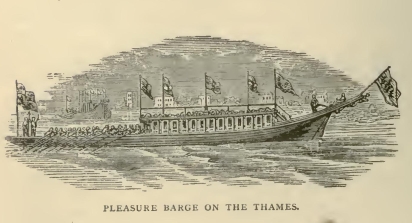
This princess is called "The Good Queen," a title that shows how dear she must have been to her subjects, and how much she must have done to promote their happiness. She is the only princess of Scotland who ever shared the throne of an English king.
Her aunt, Christina Atheling, was Abbess of Rumsey, and did all she could to influence Matilda to take the veil and enter a convent. But this was very displeasing to her father, the King of Scotland, and one day when she entered his presence with a nun's veil fastened to her head, he indignantly tore it to pieces, saying that he intended her to become a wife some day, not a nun. This circumstance made such an impression on her youthful mind, that she never forgot it.
When the king made this remark, there was a young man present whose name was Alan, Duke of Bretagne. He was the widower of Constance, William the Conqueror's daughter, consequently much too old for Matilda; nevertheless, he made up his mind on the spot that he would make her his wife if he could get her consent.
But now we must tell something about the illustrious mother of this princess, to whom she was indebted for her earliest lessons in piety and virtue.
Her name was Margaret, and her parents were Edward Atheling, surnamed the Outlaw, and a daughter of Henry II. of Germany.
A.D. 1068. 046When she was a young lady, her family determined to leave England and take up their residence in Hungary, but the ship on which they embarked became disabled, and was driven by a storm into the Frith of Forth. Malcolm Canmore, who was King of Scotland, chanced to be present when they arrived, and so struck was he with the extreme beauty of the Lady Margaret, that a few days later he demanded her hand in marriage. This offer pleased her brother Edgar Atheling very much, because, not only was it a fine thing to have his sister in such a lofty position, but Malcolm had received them all so kindly and hospitably that he had made an excellent impression, so Edgar joyfully gave his consent.
The spot where Margaret first set foot on Scottish soil is to this day called Queen's Ferry in memory of the circumstance.
Now, Malcolm could neither read nor write, and he was so rough and wild, that many of her Saxon friends objected to so pure and intellectual a girl as Margaret uniting herself to him. She loved him, however, and immediately after her marriage she set to work to reform her household as well as she could, and to introduce religious ceremonies, which were sadly wanting..
Her husband felt her superiority, and had so much confidence in her judgment that he left the entire control of the royal household in her hands. He entertained such respect and admiration for her virtues as well as her mental qualities, that her influence over him was excellent.
All persons who were leading bad, immoral lives were dismissed from the court, and no one was allowed to hold an office of any kind who failed in honesty or sobriety.
Although grace was said daily after each meal, by Turgot, the court chaplain, the Scotch nobles were in the habit of leaving the table as soon as they had satisfied their
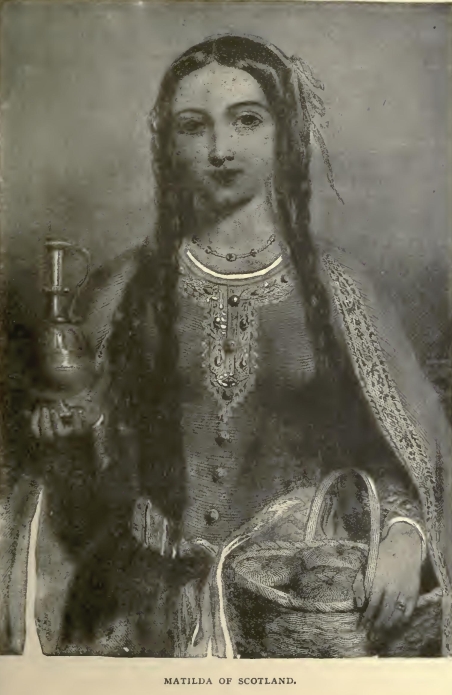
049stomachs, without waiting for the grace. This displeased Margaret, and she began to consider what she could do to keep them in their seats without commanding them to stay. At last her woman's ingenuity fixed upon this arrangement. She ordered a cup of the very choicest wine in the royal cellar to be served to each man after grace, and by degrees she had the satisfaction of seeing not a single vacant chair at table so long as Turgot remained. In time the "grace cup" became an established custom not only at court, but in the castles of the nobility, and the dwellings of the humbler classes throughout the land.
Margaret was also a devoted mother, and bestowed a great deal of care upon the education of her seven children. The learned Turgot was their preceptor and confessor, and when the queen was dying she said to him: "Farewell! my life is drawing to a close; to you I commit the care of my children; teach them above all things to love and fear God."
Her husband had been killed by treachery a short time previously, so the five princes and two princesses were left orphans.
Their uncle Edgar was very kind to them all, and placed the girls, Matilda and Mary, at the convent, with their aunt Christina, where he knew that they would have a better training and education than he could possibly bestow on them. There they remained for a long time, and were carefully instructed in the art of reading as well as in good manners.
Christina always hoped that they would both become nuns, and considering that they were entirely under her influence, with no parents, their brothers at a distance, and no home but the convent, it seems strange that they did not. But they were reserved for another fate.
In those rude times the Norman nobles were so rough 050and uncultivated that they had no respect for any woman excepting those consecrated to religion, consequently it was a common custom for young girls to dress in nun's attire for protection.
But Christina made her nieces wear the great, thick, heavy, black veil because it was all settled in her mind that it was to be forever, and whenever she saw Matilda without hers, she scolded her and treated her very harshly. Poor Matilda found it so uncomfortable, and no doubt unbecoming too, that she wept many a bitter tear over the infliction, and the moment she was out of her stern aunt's sight, she would fling the veil on the ground and stamp upon it. During the seven long years that she spent in the dreary convent, she must, many a time, have wished for her dear father to relieve her, as he once did.
Matilda was passionately fond of music and devoted much time and attention to this art. When she became Queen of England she was exceedingly liberal in her rewards to those monks who sang the church service well, and did everything in her power to encourage them.
While at the convent, this princess received two offers of marriage. The first was from the Alan, to whom we referred at the beginning of this biography. But fortunately for her he died before she was called upon to give an answer, for she positively asserted that she would rather wear the odious veil forever than wed him. The other offer was from the young and handsome William Warren, Earl of Surrey. But him she did not love, and although he was one of the richest and most powerful of the baronets of England or Normandy, she refused him. She was somewhat sly on this occasion, for she pleaded her devotion to a religious life as excuse, though the real one was the affection she entertained for Henry, fourth son of William the Conqueror.
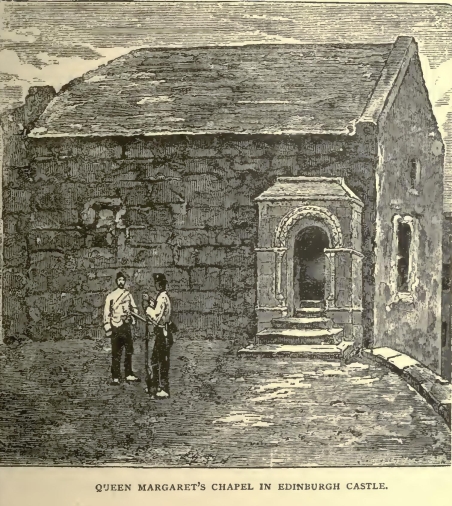
053She was then at Wilton Abbey, near Winchester, the favorite home of the Norman king. Edgar Atheling, who was very fond of his niece, went frequently to see her, and Henry sometimes accompanied him. On such occasions it is probable that Matilda managed to leave off her veil, for she was too pretty not to be somewhat vain, and Henry was too young and ardent not to have his heart touched by her charms.
This prince was surnamed Beauclerc because he was such a good student, and Matilda was so well, educated herself that she could appreciate his intellect and accomplishments. Therefore she preferred him to Warren, and no doubt by a whispered word, or a sly glance, succeeded in letting him know it.
Of all William the Conqueror's sons, Henry was most in favor among the English, owing to his having been born on their soil: nevertheless it was a long time before he became king.
When on his deathbed, his father called Henry to him and made the following prophecy: "Thy elder brothers may go before thee. Robert shall have Normandy, and William shall have England, but thou shalt be inheritor of all my honors, and shalt excel both thy brethren in riches and power."
This dying prophecy was not fulfilled until he was thirty-two years old, when Wat Tyrrel's arrow placed him on the throne. It happened in this way: William Rufus, with his brother Henry and a large party of attendants, were hunting one day, when Henry, by some mistake, was separated from the others and found himself quite alone in an adjoining forest. Suddenly, the string of his cross-bow 054snapped, and he entered the hut of the nearest forester to have it mended.
A shrivelled-up old woman, who sat on the hearth-stone and looked like one of the witches in Macbeth, saluted him as king. He was very much surprised at this, and began to assure her that she had made a mistake. Without heeding his reply, she continued in a cracked voice, holding up her long, bony forefinger in token of warning,
"Hasty news to thee I bring,
Henry, thou art now a king;
Mark the words and heed them well,
Which to thee in sooth I tell,
And recall them in the hour
Of thy regal state and power."
Henry was amazed, but had no time to reply before the Red King's attendants surrounded the door of the hut with news that their Sovereign had been shot and instantly killed. Wat Tyrrel's arrow had accidentally struck him in the head, and the unlucky marksman had fled to escape punishment.
Prince Henry did not wait to weep over the sad fate of his brother, nor even to see his body properly cared for, but jumped into the saddle and made speed for Winchester. The cause of this haste was that the royal treasurer, who happened to be present at the chase, declared emphatically that the crown now belonged to Robert, and started on a race with Henry to announce it at the Norman palace. But Robert was in the Holy Land, so, with drawn sword, Henry forced the treasurer to give up his keys, and at once took possession of the royal robes, jewels, and regalia. This high-handed action caused dissatisfaction among those nobles who owned lands in Normandy, for they were desirous that their duke should succeed; so it was resolved to settle the question in the council chamber. All the
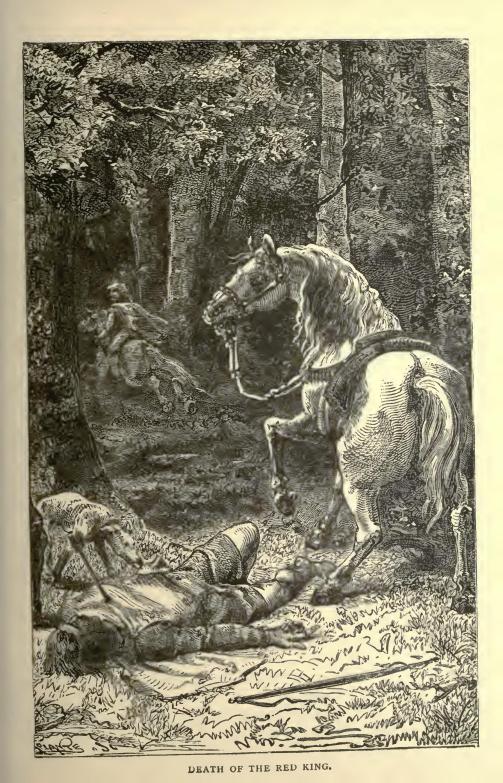
057nobles and prelates assembled, and while they were debating the matter, Henry gathered a crowd about him in the street, and eloquently pleaded his own cause. First he reminded them that he was a born Englishman, then he made the most flattering promises, and concluded his speech by assuring them that they should have an English queen, and be governed by English laws. Loud shouts and hurrahs greeted his ears, and "Long live Henry, King of England!" passed from mouth to mouth, until it was taken up in the council hall itself, and thus, by the voice of the people was the succession settled.
On the day after this scene Henry was crowned at Westminster Abbey. The promises he made he fully intended to execute, and set about his work of reform without delay. His popularity increased, and when he made known his intention to marry Matilda, a descendant of their beloved King Alfred, and a girl educated in England, it met with great favor.
He then made a formal proposal for her to her brother, the King of Scotland. But the Abbess Christina was determined not to give her up without a struggle, moreover, she was a Saxon, and objected to having the Norman line strengthened by such a union, so she declared that Matilda was a consecrated nun, whom it would be a sacrilege to marry.
Henry did not dare to act in defiance of the church, though he had resolved on this marriage, so he wrote to the Archbishop of Canterbury asking advice. That prelate refused to decide so important a question alone, but summoned a council of churchmen, before whom Matilda was requested to appear.
This must have been a most embarrassing ordeal for a young girl brought up in the strict seclusion of a convent, but she was equal to it, and answered all the questions 058put to her clearly and intelligibly. They asked her whether she had taken any vows, saying that if so, no motive could induce them to consent to their being broken. The princess denied that she had ever done so. The archbishop asked her if she had not worn the black veil at her father's court, and subsequently in the nunneries of Rumsey and Wilton.
"I do not deny," she replied, "having worn the veil in my father's court, for when I was a child my aunt Christina put a piece of black cloth over my head; but when my father saw it, he snatched it off in great rage, and swore at the person who had put it on me, observing at the same time that it was his intention to give me in marriage, not to devote me to the church."
Then she told how she had worn the veil for protection at first, and afterwards, because her aunt would beat and scold her whenever she left it off.
This explanation was considered perfectly satisfactory, and the council pronounced Matilda free to contract marriage with the king.
Now, although she loved Henry, and certainly had no desire to remain longer in the convent, yet she hesitated about getting married because she had heard the king was not so good and virtuous as he ought to be, and she feared to trust her happiness in his keeping. But those connected with the Saxon royal line entreated her with these words: "O most noble and most gracious of women, if thou wouldst, thou couldst raise up the ancient honor of England, thou wouldst be a pledge of reconciliation; but if thou refusest, the enmity between the Saxon and Norman races will be eternal; human blood will never cease to flow."
This was a strong argument in favor of her marriage. She was to become a bond of peace to a divided nation,
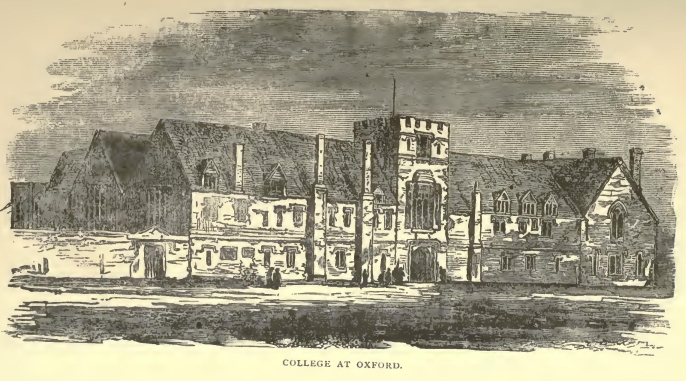
061and she ceased to object when Henry promised to be a constitutional monarch, and observe the laws and privileges established by Alfred.
Three years and six months after his coronation Henry and Matilda were married, and the latter was crowned at Westminster. Before performing the ceremony, the archbishop stood up in the pulpit, and related the whole history of the princess's life, because he wanted to leave no room for doubt that she was justified in getting married. He then asked in a loud tone whether anybody present had an objection to raise. All declared that the matter was rightly settled.
This marriage proved one of the happiest events for the English nation, for the queen's thoughts were always for the common people, and she urged her husband to grant them all their rights and privileges. One of his first acts was to abolish the curfew at her request, for she said that everybody ought to be permitted to sit up and enjoy an evening chat just as long as they pleased.
Henry's Anglo-Saxon subjects soon became so warmly attached to him, that they were anxious to show him an allegiance which the stern laws of his father, or of the Red King, never could have forced from them. They loved the queen also, because they knew that a great deal of their happiness was the result of her good influence.
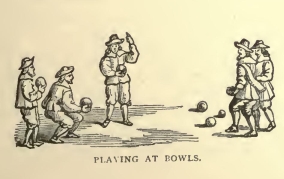
The royal couple lived at Westminster, in the palace of Edward the Confessor, and Matilda devoted much of her time to the care of the sick and the needy. She was so strict concerning her religious duties, that every day in Lent she went to Westminster Abbey barefooted and clothed in a garment of haircloth. Then she would wash and kiss the feet of the poorest people. One day a courtier reproved her for it, but she replied, as the following curious dialogue, taken from a rhyming chronicle of the day, will show,—
"Madam, for God's love is this well ado
To handle such unclean limbs and to kiss so?
Foul would the king think if this thing he wist,
And right well avile him ere he your lips kist."
"Sir, sir!" quoth the queen, "be still. Why say you so?
Our Lord himself example gave for to do so."
On another occasion, her brother, the King of Scotland, who was on a visit to the English court, entered Matilda's apartments, and found her on her knees washing the feet of some old beggars. She looked up, and asked him if he would not assist her in this work of charity and humiliation, for the good of his soul. His majesty smiled and left the room without making any reply. Perhaps as he had never had any practice in that sort of labor he feared that he might not be able to perform it skilfully, or it may be that he did not care to encourage his sister in the humility which she seemed inclined to carry to excess. How- 063ever, Matilda's good works were not all directed in one channel, for she tried to benefit every class of her subjects, the rich as well as the poor. Once when she was obliged to cross the river Lea on horseback, the tide was so high that she ran great danger of being drowned, so she caused a fine arched bridge to be built high up the stream. The Saxons called it the Bow Bridge. Then she built more of these structures, and to insure their being kept in good repair, she presented a mill or dwelling-house to those whom she selected to attend to them.
She planned new roads and repaired old ones, thus facilitating travel through the wild, uncultivated parts of the country, so that in time merchants could cross the desolate moors with their wares without incurring much risk.
All this work was probably done during her husband's absence from home when she was regent and could call on the public treasury, for certainly her private purse could never have enabled her to undergo such a heavy outlay. But that made no difference to her subjects, for they enjoyed the benefit of her improvements, and looked upon her as a real benefactress.
Henry's wise laws did not give universal satisfaction by any means; for the Norman nobles objected to any check being placed on their actions. They had been used to doing just exactly as they pleased with only their sweet wills to govern them, and now when they found that they could not commit crimes and outrages against the lower classes without incurring punishment of some sort they made great complaints. They could not understand why the laws that protected them and their families should apply equally to the common people. Their amusements were restrained, and their lawlessness no longer had free play. So they spoke with utter contempt of "that Saxon woman," as they called Matilda, and actually went so far 064as to apply ridiculous nicknames to the royal couple, before their very faces.
Just two years had passed since their marriage, when Duke Robert returned from the Holy Land. He determined at once to invade England. Now, as Henry's fleet was manned by Normans, under the influence of Norman chiefs, they refused to guard the coasts of England against their duke, but went out to meet him, and brought him in triumph to Portsmouth, where he was joined by nearly all the Anglo-Norman nobles, as well as a great many of the English themselves.
Well, Robert marched straight on to Winchester, but with all his faults, he proved himself a true gentleman on this occasion; for when he got there he heard that Matilda had a little baby and was ill in bed, so he refused to storm the city.
This consideration on his part pleased the queen so much, that she used her influence to bring about a reconciliation between her husband and his brother, and Henry invited Robert to court, where he was feasted and entertained in a sumptuous manner. The queen and her brother-in-law had one taste in common: they both loved music. It is only a pity that all Robert's fancies were not so refined and harmless.
Poets and minstrels from every part of Europe flocked to Matilda's court to recite their verses or sing their songs in her presence, and she took great pains to receive them kindly and make them welcome. The only objection that could be made to this custom, was that it cost too much money, for the queen was exceedingly liberal with her rewards. Robert was so well pleased with the treatment he received at his brother's court, that he prolonged his stay six months, and he and the queen passed a great deal of time in each other's society singing and 065studying music; and quite a warm affection grew up between them.
A.D. 1104. The following year the Duke of Normandy visited England again, probably to demand the payment of his pension. As he was accompanied by only twelve gentlemen it could scarcely have been his purpose to raise a revolt. Nevertheless, when Henry heard of his arrival he said, "By my faith, should he fall into my hands, I will keep him so closely imprisoned that he shall never give me any more trouble."
A friend of Robert's heard this remark, and hastened to warn him of his danger, advising him to seek the queen's protection, which he was very glad to do. She spoke kind and comforting words, assuring him that she would do all in her power to save him from the anger of the king. But Robert was so alarmed that he scarcely listened to what she said. He declared himself ready to make almost any sacrifice to insure his personal safety, and even offered 066to dispense with the annual sum the king regularly allowed him for resigning his claim to the throne.
When Henry heard this, he sent for the queen to come to him and bring Duke Robert with her. She did so, and the duke thus addressed his brother:
"Fair sire, I am come to show you our of affection, and not to injure either you or yours. We are brothers, born of one father and one mother. If I am the eldest, you have the honor of the crown, which is a much better thing. I love you well, and thus it ought to be. I have given over to the queen all you owe me for this kingdom. We will be friends now and exchange gifts of jewels, dogs, and birds."
The king replied: "We will do as you say, with thanks." Now, one of Robert's vices was intemperance, which was so great, that he would often be in a state of intoxication for days together. So, not long after his friendly speech, when he was under the influence of wine, he accused Henry of having cheated him out of his pension, by making Matilda mislead him with her fair words. Of course, after that there could be nothing but bitter and 067unkind feelings between the royal brothers, and Robert made so many threats, that the king embarked for Normandy, determined to make war on him.
But when he got there, Anselm, the old archbishop, effected a reconciliation. Anselm then returned to England and gave Matilda much pain, by putting in force a plan that he had agreed upon with Henry. It was to forbid any of the Anglo-Saxon clergy to marry, and to turn those out of the church who were already married. Two hundred of these poor unfortunates stood barefooted in the streets of London, when Henry returned, begging for compassion. He turned aside, and showed plainly that they were to look for neither aid nor sympathy from him, while the good Matilda wept bitterly, saying that "she dared not interfere."
At this time the royal couple had two children, a boy named William, and a little daughter who was placed at Wilton Abbey for care and education.
The Anglo-Normans were so much pleased with the Saxon style of wearing their hair, which was in long ringlets flowing to their shoulders, their mouths and chins covered with it too, that they soon imitated them. The king especially was remarkable for the beauty of his locks, which he cherished with care, though the Norman clergy highly disapproved of such vanity.
One day, while Henry was in Normandy, he and his train entered a church, where the bishop began to preach about the sinfulness of this new fashion, saying, "It was a device of the evil one to bring souls into everlasting perdition, the moustached, bearded, and long-haired men resembling filthy goats." The discourse was so touching that the King of England and his courtiers wept. Then the bishop drew a large pair of scissors from his sleeve and proceeded to crop off the curls and beards of his 068hearers, beginning with Henry, who was anxious to prove the sincerity of his tears. Thus for nearly an hour the church resembled a barber-shop, and afterwards Henry published an edict forever abolishing such sinful adornments as ringlets and beards.
After this Henry pursued the war in Normandy, completely conquered that country, and returned in triumph to England with Edgar Atheling, Robert, and four hundred valiant knights as prisoners.
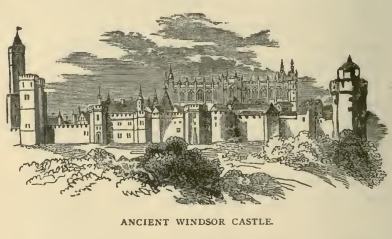
He then removed his court to Windsor Castle, which had been completed by Matilda during his absence. It now became necessary for Henry to spend part of every year in Normandy, as he was ruler of that country as well as of England.
In 1109 he received an ambassador from the Emperor Henry V., who came to make a proposal for the hand of the little Princess Matilda, then only six years of age. The offer was accepted, but the child was permitted to remain at home until she had reached the mature age of twelve, when she was married and crowned in the cathedral of Mentz. The little empress was very kindly treated by 069her husband, who was forty years her senior; and she was so amiable and pretty, that she won the hearts of the German princes, his sons.
When Prince William was twelve years old, the king took him to Normandy, and presented him, with great pomp, as heir to the duchy. The barons and freemen swore fealty to him.
The royal family passed the following Christmas at the Abbey of St. Alban's as guests of the Abbot Richard, who invited them, as well as a large company of prelates and nobles, to assist at the consecration of the abbey. In a rich illuminated volume, called the Golden Book of St. Alban's, (now in the British Museum,) is a likeness of the queen, evidently made at this time.
In the year 1117, a fresh revolt called Henry to Normandy again, and during his absence "the Good Queen," whose health had been failing for many months, died. To the last hour of her life she was a beautiful example of piety and self-denial, and her virtues had made her so dear to her subjects of every class, that she was passionately lamented by them all. She was buried at Westminster Abbey near her royal uncle, Edward the Confessor.
After her death, her three Saxon maids of honor retired to a hermitage where there was a holy well, or medicinal spring, and established a convent there. They were pious ladies, always ready to bestow alms and relieve the sick and suffering, and passed the rest of their lives in imitating the charitable, worthy deeds of their royal mistress.
Prince William never returned to England after the death of his mother, but spent much of his time fighting against the King of France, at his father's side.
In 1119 he married Alice, daughter of the Earl of Anjou. A year later he accompanied his father to Harfleur for the purpose of embarking for England. The king set 070sail the same night, leaving the prince to follow in the "White Ship" the finest vessel in the Norman navy. William went on board with a gay party of young friends, and ordered three casks of wine to be given to the ship's crew. This was a mistake, for the sailors were, for the most part, intoxicated when they sailed. Prince William, desiring to overtake the rest of the fleet, ordered his captain to put up all his sails, and the "White Ship" went rushing through the water with such dangerous speed, that she suddenly struck a rock and began to sink. All was terror and confusion. The life-boat was launched, and the young heir of England, with several of his companions, got into it, and would probably have been able to row back to the Norman shore in safety; but the cries of his half-sister calling on him for assistance reached his ear. He commanded the boat back, and as soon as it neared the ship, such numbers sprang into it that it immediately sank. Out of three hundred persons who embarked on the ill-fated vessel only one escaped to tell the sad tale. This was a poor butcher, who climbed to the top of the mast, and was rescued next morning by some fishermen.
The report of the disaster reached England next day, but there was nobody bold enough to carry it to the king, so for three days he was left in suspense.
At length his private little page was selected to break the news to the bereaved father. Entering the room with pattering steps and a sorrowful mien, the child knelt down at Henry's feet and told him of the dreadful catastrophe. He sank upon the floor in a swoon, from which he did not recover for many minutes. In all his life Henry I. was never known to smile again.
A.D. 1120. Three years after the death of Queen Matilda he married Adelicia of Louvaine, surnamed the Fair Maid of Brabant, a lady of distinguished beauty and rare
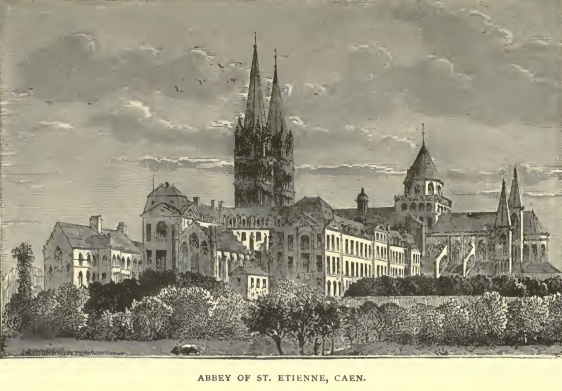
073talent. She occupied the English throne too short a time for us to devote a separate chapter to her reign. She was a good, kind stepmother to the little Empress Matilda, and took excellent care of her. But she could not have been very happy as the wife of Henry I., because his troubles made him such a cross, melancholy old man that even his greatest nobles were afraid to approach him. He died in Normandy in 1135, and three years later Adelicia married William de Albini.
She had seven children after her second marriage, from one of whom by lineal descent were two of the most unfortunate of all the queens of England,—Anna Boleyn and Katherine Howard.
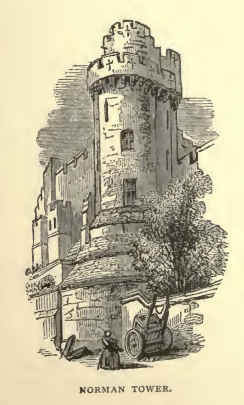
Matilda of Boulogne was the last of the Anglo-Norman queens, and the only child of the Count and Countess of Boulogne. She was educated at the Convent of Bermondsey, which was founded by her mother, but it was never intended that she should spend her life there, because, at a very early age, she was married to Stephen de Blois, a nephew of Henry I.
Stephen was a handsome, bright, intellectual boy when he went to seek his fortune at the court of England, and Henry Beauclerc was pleased to have an opportunity of showing kindness to the son of his sister Adela, Countess of Blois, whom he had always loved very tenderly.
So he knighted the youth, and bestowed upon him the hand of his queen's niece Matilda, the heiress of Boulogne. After the marriage, the king presented the young couple with the Tower-Royal, a strongly fortified palace, which became their London residence.
Stephen had embarked on board the ill-fated Blanche Nef, or White Ship, with his cousin William, but prudently left just before the vessel sailed, saying: "She was too much crowded with foolish, headstrong young people."
After the death of his son William, the king placed his affections on his nephew, and always liked his companionship in all his voyages. Stephen was a great favorite in 075England, for he was as affable and agreeable to the poorest and humblest people as he was to the nobles. His wife, too, was daily winning hearts, and when the king's health began to decline, it was fondly hoped that this young couple would succeed him instead of his daughter, the Empress Matilda. And so they did, for no sooner was King Henry's
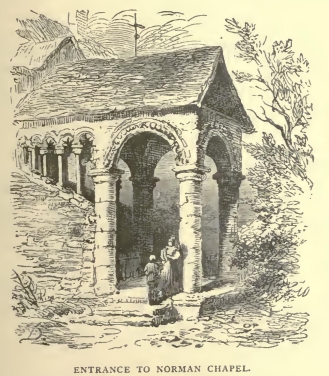
death announced than Stephen left Normandy, and embarked for Dover, leaving the last rites of his deceased uncle to the care of Robert, Earl of Gloucester.
He hastened on to London in the midst of a terrible thunder-storm, and convened an assembly of barons, before whom the steward of King Henry's household swore that the late sovereign had disinherited the Empress Matilda 076on his deathbed, and named Stephen as his heir. Thereupon the Archbishop of Canterbury absolved the nobles from the oath of fealty they had twice sworn to the daughter of their dead king, and Stephen was crowned without opposition.
This was easily managed, because the Empress Matilda, being the wife of a foreign prince, was residing on the continent, and therefore out of the way. Besides, at the time of her father's death, her husband was dangerously ill, and she had no thought for anything but the care he required. When he recovered she determined to remain quiet for awhile to watch the condition of affairs in England.
A.D. 1136. Meanwhile Queen Matilda had given birth to a son, who was named Eustace, and three months after her husband had claimed the crown, her own coronation took place on Easter Sunday, 1136.
Stephen began his reign by making some wise and popular laws, but he permitted his nobles to build or fortify over a thousand castles. This was a grave mistake, because the owners of these strongholds could shut themselves up in them and defy the crown when they chose.
The first sad experience Stephen had in this respect was when the Earl of Devonshire refused to obey him, or to acknowledge his right as king. Stephen proceeded to chastise him, when the King of Scotland, taking advantage of this disturbance, invaded the northern counties under pretence of revenging the wrongs of his niece, the Empress Matilda, though Queen Matilda stood in the same degree of relationship to him as the empress did.
Stephen met the King of Scotland with a large army, but Queen Matilda interposed between the two sovereigns, and settled all differences without any bloodshed.
A.D. 1137. This happy termination of the storm that had been gathering was celebrated by a series of rejoicings, 077but in the midst of them Stephen was seized with an illness so serious that it resulted in a stupor closely resembling death. It was reported in Normandy that he really had died.
Thereupon the party of the Empress Matilda immediately began to take measures to place her on the throne, her husband, the Count of Anjou, entering Normandy at the head of an army to assert her right. Then Stephen's elder brother, Theobold, put in his claim. Meanwhile Stephen recovered, and no sooner did he see the danger that threatened him, than, leaving his wife to look out for his interests in England, he hastened with his little son to France, and by means of a large bribe induced King Louis VII. to acknowledge the child's claim to the earldom of Boulogne, which Queen Matilda had bestowed on the child.
During King Stephen's absence some enormous fires occurred in different parts of England which seemed to be the work of discontented subjects; conspiracies were formed in favor of the Empress Matilda, and, what was worst of all, the King of Scotland made another invasion into Northumberland. But Queen Matilda showed herself a woman of courage and determination, for she actually went in person to fight the insurgents, and kept them at bay until her husband arrived and drove the Scottish army back into their own country.
The party that favored the empress had become so powerful by the autumn of 1140 that, had she acted promptly, she would certainly have gained the prize she sought. But she did not enter England until Stephen had taken possession of the castles as well as of the great wealth of three bishops who had opposed him.
Consequently, when she took up her abode at Arundel Castle, Stephen might perfectly well have made her his 078prisoner; but he remembered what a debt of gratitude he owed to her father, and spared her for the sake of his benefactor. When she expressed her desire to remove to the Castle of Bristol, he was even so gallant as to offer his brother, the Bishop of Winchester, as escort, and to pledge his word that she should not be molested by the way.
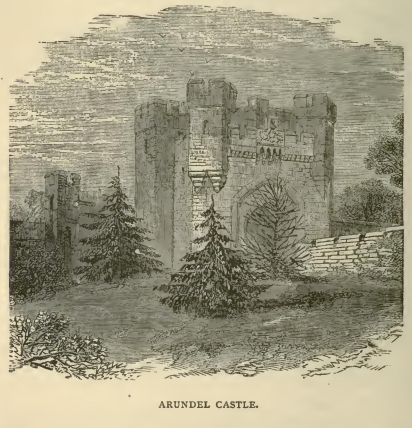
The Earl of Gloucester was still fighting for his sister's rights when Queen Matilda went, with her son Eustace, to France for the purpose of strengthening her husband's cause by the aid of her foreign relations. While there, a 079marriage was negotiated between Constance, sister of Louis I., and little Eustace, who was just four years old.
Matilda was still in France when the battle of Lincoln, so disastrous to Stephen's cause, was fought.
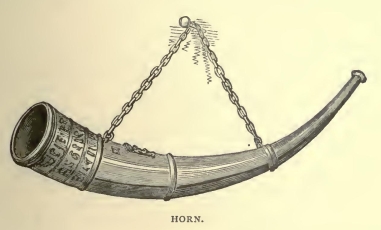
It happened that Stephen had shut up a number of the Empress Matilda's partisans and their families when he besieged the town of Lincoln; among these was the Earl of Gloucester's youngest daughter, who had recently married her cousin, the Earl of Chester. So determined were the father and husband to liberate her, that, with all their followers, they swam across the river Trent, behind which Stephen and his army thought themselves safely encamped, and fiercely attacked him in their dripping garments.
Stephen fought desperately, until he was left almost alone on the field, when a stout knight seized him and led him captive before the Empress Matilda, who ordered him into close confinement in Bristol Castle.
Then the Empress Matilda made her public entry into the city of Winchester, where she was received in state by Stephen's brother, the bishop of that place, who excommunicated all those who adhered to the imprisoned king, 080and promised absolution to all those who joined the cause of the empress.
At this melancholy juncture Queen Matilda returned from France. She at once made a personal appeal to the citizens of London, with whom she had always been popular, and so readily did they listen to her complaint that they demanded the liberation of the king. But her brother-in-law, Henry de Blois, the Bishop of Winchester, paid no attention to the demand; he even refused to have Queen Matilda's address to the Synod in behalf of her husband read aloud, and boldly declared the Empress Matilda sovereign of England.
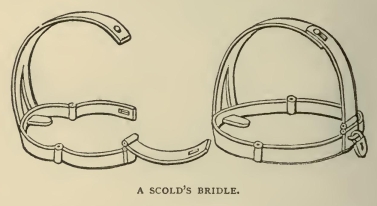
Then Queen Matilda made a pathetic appeal to this haughty, arrogant woman in behalf of Stephen, who remained, heavily ironed, in prison. She assured the empress that the loss of power was of little moment; all she asked was that her husband might be set at liberty. She even proposed that if her life were spared, and her son were permitted to enjoy the Earldom of Boulogne, she would enter a convent, her husband a monastery, and promised that both would forever forego all claim to the crown of England.
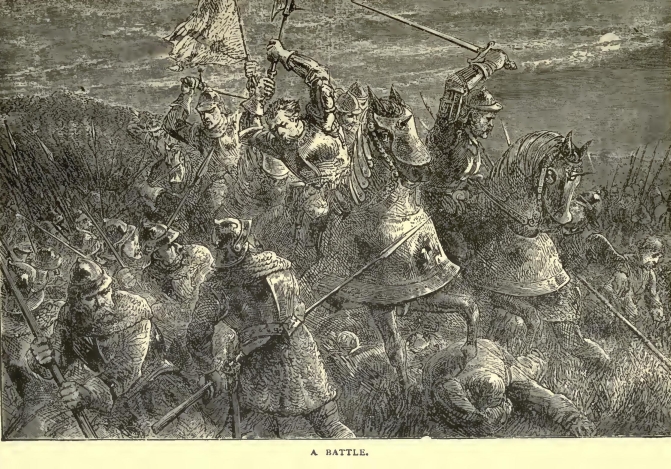
083This petition, as well as all the others that King Stephen's wife had made to the cruel empress, was rejected with contempt. But the devoted wife was not to be baffled when working for her husband's life and pardon, so taking advantage of a misunderstanding that arose between the Bishop of Winchester and the empress, she induced that prelate to absolve all those of her husband's party whom he had previously excommunicated, and to aid her in the deliverance of his brother.
Then, in the name of her son, Prince Eustace, she raised the standard of the captive king in Kent and Surrey, and a strong army was soon organized in her support.
Meanwhile the empress had become exceeding unpopular, and when the citizens of London found that she proposed to treat them as a conquered nation, which her demand for a subsidy proved, they asked leave to deliberate.
The empress retired to her palace of Westminster, where she awaited the arrival of a deputy with the bags of gold she felt sure they would send. Suddenly the bells of London rang out an alarm, and every man in the city and its vicinity came out of his house carrying a sword. A formidable army soon collected, ready to dispute any unjust demand for subsidies, and proceeded to the palace.
But the empress, with her barons and chevaliers, had made good their escape on horseback, and were far on the road to Oxford when the mob broke open the doors of the palace.
The King of Scotland was with his niece, but he was so disgusted with her behavior that he made the best of his way to his own borders. By the time the empress reached Oxford, all of her train had deserted excepting the Duke of Gloucester, with whom she entered the city alone.
With a large army ready to support her, Queen Matilda 084now returned to London, where she was received by the populace with open arms. Her next step was to go with her son to the Bishop of Winchester and entreat him to assist her in once more placing her husband on the throne.
He promised to do so, and urged the queen to put herself at the head of her army and march to Winchester. At her approach, the prelate retired to his castle in the suburbs, and a blockade was established that made the empress tremble in her palace. No doubt, during the two months of famine and warfare that succeeded, she regretted more than once the scorn with which she had repulsed her cousin's humble appeal. At last, when at least twenty-five churches and monasteries had been destroyed, and the empress knew that her position was becoming daily more dangerous, she prevailed on her brother, the Duke of Gloucester, to assist her to escape. He and the King of Scotland attempted to do so by forcing their way through the besiegers.
The Duke of Gloucester fought bravely, but was compelled to surrender at last, when he was made captive and conducted before Queen Matilda. The King of Scotland escaped with the empress, and got as far as Devizes, where the queen's soldiers pursued them so closely that they would certainly have been captured but for a stratagem to which the empress was compelled to resort for safety. She had herself rolled in a winding-sheet, and placed in a coffin, and was in this manner carried on the shoulders of some of her faithful partisans to the fortress of Gloucester, which belonged to her brother. There she was deposited at last, after many hours of travel, worn out with fasting and terror.
A.D. 1141. The Duke of Gloucester was so necessary to his party, that the empress opened communication with Queen Matilda to effect his release. But the only terms
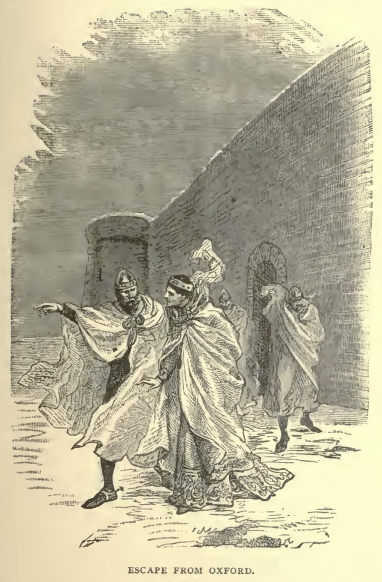
087to which the devoted wife would listen, were those that would secure the restoration of her husband. Consequently, after many propositions had been made on one side and rejected on the other, and after Queen Matilda had threatened severe measures against Gloucester, the illustrious prisoners were exchanged. This important event took place in November, 1141.
Stephen had another attack of his old malady soon after his release, but he recovered with the tender care bestowed upon him by his loving wife, and then entered the field again, determined to fight more desperately than ever.
Then the party of the empress thought they would claim the assistance of her husband, the Count of Anjou, for which purpose the Duke of Gloucester was despatched to Normandy. Before leaving England, however, he saw his sister established at the Castle of Oxford, where he felt perfectly certain of her safety.
But Stephen was so bent upon capturing the empress that he laid siege to the fortress she occupied and reduced her to such distress for want of provisions that she escaped one night with only four attendants. The fugitives dressed themselves from head to foot in white, and as the ground was all covered with snow, they moved noiselessly and unnoticed along, protected by the banks of snow and ice along the Thames, through a blinding storm that flew full in their faces. When at a safe distance from the castle, they walked faster, over hedges and ditches, until they reached a town six miles off, where they obtained horses and rode on to Wallingford the same night.
There the empress met her brother, who had just returned from Normandy. The Count of Anjou had not seen fit to comply with the request of his wife's party for assistance, but compromised by sending Prince Henry to see his mother, keeping their other child, Geoffrey, with 088him. He was evidently not anxious to see her himself. Three years later the count sent a train of Norman nobles to England to reclaim his heir. The Duke of Gloucester accompanied his nephew part of the way, and then bade him farewell forever; for he died in October, 1147. Deprived of the support of this true-hearted brother, the Empress Matilda abandoned hope and left England, nearly all of her friends having deserted her.
Stephen and Matilda were so delighted at the departure of the empress, and the establishment of peace, that they celebrated the following Christmas with unusual splendor, and prevailed upon some of the barons to swear fealty to their son, Eustace, then thirteen years old, and acknowledge him as heir-apparent to the throne.
In 1148, Queen Matilda founded and endowed the Church of St. Katherine, by the tower; also the Royal Abbey of Feversham in Kent. Then she spent a few months quietly at the convent. But her health had begun to decline, and she died of a fever on the 3d of May, 1151, at the age of forty-seven.
She was buried at the new abbey of Feversham, and was deeply lamented by all who knew her. About three years later Stephen was laid beside his beloved queen.
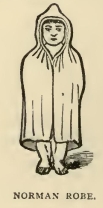
Eleanora was born in the beautiful province of Aquitaine, a name that Julius Caesar gave to the south of Gaul on account of its numerous rivers and fine ports. The people liked the name and adopted it; but it was really the ancient kingdom of Provence.
Eleanora and her sister Petronilla were daughters of William, Count of Poitou, such a good, pious man,'that as he happened to be in the Holy Land at the time of his death, he was forever after called St. William.
The grandfather of these girls was William IX., not a very good man, but a learned one, and an excellent poet. The most polished and civilized people on the face of the earth in the 12th and 13th centuries were to be found in Provence, and their language, which was a mixture of French and Italian, was particularly adapted for poetry and music. This is no doubt the reason why there were so many minstrels in that country, who wandered about from one nobleman's house to another, singing their songs and reciting their poems.
William IX. was a troubadour, and his compositions were so popular that they became models for all the others. He was the most powerful prince in all Europe, but as he advanced in years his conscience began to trouble him, and 090he thought he must reform before it was too late. So, when Eleanora was about fourteen years of age, he ap> pointed her ruler of Aquitaine in his place, assembled all the nobles of the land, and made them take an oath of allegiance to her, because, as he told them, he wished to occupy himself with spiritual matters.
This done, he planned a marriage between Eleanora and the son of Louis VI. of France. The young people had no objections to offer, and they were married at Bordeaux without delay.
A.D. 1137. As soon as they were crowned Duke and Duchess of Aquitaine, William IX. laid aside his royal robes forever. Attired in a hermit's gown, he started on a pilgrimage to Spain, and passed several years in different caves in the gloomy, rocky wilderness, where he ended his days.
Now, Eleanora was a great heiress, because all the rich territory that her grandfather had owned passed into her possession.
Afterwards, young Louis was crowned Duke of Guienne, when he and his youthful bride were summoned to France to attend the death-bed of his father, Louis VI., the good king and wise law-maker. His dying words were: "Remember, royalty is a public trust, for the exercise of
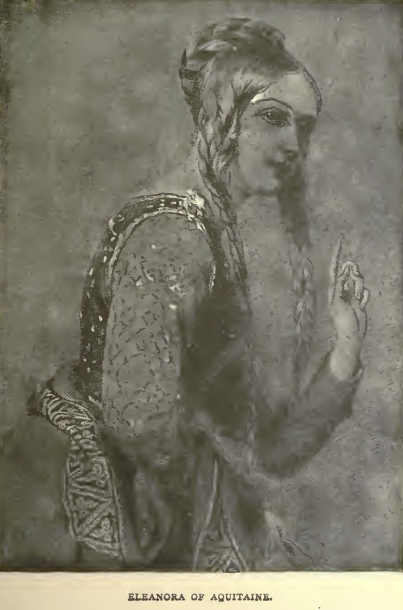
093which a rigorous account will be exacted by Him who has the sole disposal of crowns and sceptres."
Louis was impressed by these words, but they had little weight with the thoughtless Eleanora. She was beautiful and accomplished, but seemed to think that the chief object in life was enjoyment. She was a fine musician, and wrote some beautiful poetry, which she set to music. These verses were remembered and sung long after she had ceased to live, which proves that they must have had considerable merit.
Eleanora's southern subjects adored her, and were dreadfully grieved whenever she had to leave them to return to her court at Paris. She preferred to stay among them, too, because, as she had entire control of affairs in the south, all was life and fun there, while her husband's palace was under such rigid rule that it was almost like a convent.
She gave festivals in Provence, called "Courts of Love," that were very popular among her subjects. On such occasions she, with her ladies-in-waiting, would receive all the troubadours who chose to come with their new poems and songs. The ladies would hear them, and then pronounce sentence upon them, and as Eleanora was a very accomplished poetess, her judgment was considered of great value.
She could not induce her husband to take part in these amusements, yet she had considerable influence oyer him, which, unfortunately, once led him to commit an act of great injustice. It was on account of her sister, Petronilla, whose beauty was equal to her own, and whose sense of right was sadly wanting. This princess happened to fall in love with a certain young count, whose affection she was determined to have, although he was a married man. So she and Eleanora put their heads together and planned, 094until they brought about a divorce between the count and his wife for some trifling excuse. Then Petronilla married him. But the former wife had a brother, the Count of Champagne, who would not stand such treatment towards his sister, so he laid the matter before the pope, who commanded the divorced count to leave his new wife immediately and take back the former one. This so enraged Eleanora that she persuaded her husband to punish the Count of Champagne. Louis, who had another cause of offence against this man, did not need much urging, and invaded his country at the head of a large army. They destroyed right and left until they came to the town of Vitry, which they began to storm; thirteen hundred of the terrified inhabitants rushed to the cathedral and locked themselves in for safety. The building was set on fire by the besiegers, and every soul w'as burned to death. About this period the eloquent St. Bernard came to Burgundy and preached the crusade. Such crowds of people flocked to hear him that they were obliged to meet in the market place, for there was no church in the town nearly large enough to contain them. King Louis and Queen Eleanora were present also, and the saint spoke so eloquently, and in such harsh tones, about the burning of the Vitry cathedral that they both felt very repentant. The king resolved to atone for the horrible deed by going to the Holy Land to fight for the Christian cause. That was all very well, and one can only admire him for such a resolution. But the queen vowed that she would accompany her lord, and lead her southern forces in person. This was a silly determination for a woman, and the excellent Abbot Suger tried to persuade her to give up all idea of such a wild expedition, but she had made up her mind to become a female crusader, and no argument could change her. Throughout her life, she was weak where she ought to have been
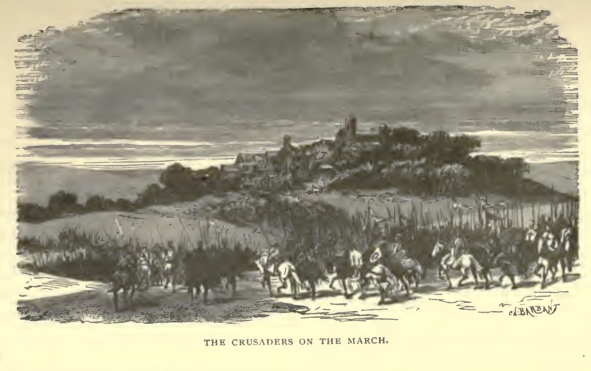
097strong, and determined where timidity would have been, by far, more becoming and womanly. The king did not oppose her crusade; but even if he had, she would have forced him to yield to her will.
She received the holy cross from the hand of St. Bernard, and immediately put on the dress of an Amazon and mounted a horse. All the court ladies did the same, calling themselves the queen's body-guard. Then they formed in parade every day, and practised military exercise in public, making themselves as ridiculous as possible. In short, they were a band of madwomen, and nobody could control them. When once they had become Amazons they abandoned all womanly occupations, consequently had no use for their distaffs; these they sent to all the knights and nobles who kept out of this insane expedition. Thus, many of them being too weak to stand such a taunt, were actually shamed into joining though their good sense opposed it.
King Louis managed his difficult enterprise with a good deal of courage and prudence, but it would have required a greater general than the world has ever known to discipline a regiment of fantastic women. The freaks of these female warriors were the cause of all the misfortunes that befell the army, for the king, after landing in Thrace, sent them forward with his choicest troops, and told them exactly how to choose their camp so that they would overlook the valley of Laodicea. He remained about five miles behind with the baggage, of which there was a large supply, and had to stop frequently to fight the bands of Arabs who attacked him.
Instead of obeying her husband's directions, Queen Eleanora insisted that her part of the army should halt in a lovely valley, full of grass and flowers. This inviting spot caught her fancy, and military discipline became of secondary importance to her. 098It was almost night when the king approached the valley; he could not distinguish his troops on the elevated ground where they ought to have been, and knew not what to make of it. The queen was not encamped there, that was certain, so there was nothing for him to do but to enter the valley in search of her. Soon after he was attacked from the hills by swarms of Arabs, and had to move in and out among the rocks to dodge them. At one time he barely escaped with his life by climbing a tree, whence he fought desperately. It was daylight before he discovered the troops that he had sent in advance. During the night seven thousand French soldiers had been killed, the provisions had been cut off, the baggage, containing all the fine clothing of the lady warriors, had been plundered by the Arabs, and the whole army was in great distress. Fortunately, Eleanora had an uncle living near by; his name was Prince Raymond, and he was the handsomest man of his time. He threw open his friendly gates to the defeated French army, and they were glad to rest and refresh themselves after all the hardships they had endured. The uncle and niece met for the first time, and were so charmed with each other that Louis soon became jealous; so one night he hurried his wife off without taking leave of his polite host. This made Eleanora so angry that when they arrived at Jerusalem she did nothing but grumble and complain. Most pilgrims had their piety aroused on this holy ground, but it was not so with Eleanora; she wanted to get home, and quarrelled with her husband for keeping her there. In fact, she never forgave him for forcing her away from her uncle's agreeable company, and from that time all affection w'as at an end between this royal couple Eleanora was not willing to submit to restraint of any sort, and her husband's temper was so tried that he resolved to have a divorce. So, on his return to Paris, he consulted 099his confidant, the Abbot Suger, about this matter. That worthy man advised him to wait; because, he argued, that it would be troublesome for France to have to give up the money Eleanora's provinces in the south yielded; besides Louis' daughter, the Princess Marie, would probably be deprived of her inheritance if her mother should take it into her head to marry again.
Louis accepted this advice, but he had his wife closely watched, and would not allow her to go to Provence at all. She complained of the stupid life she led in Paris, and made great fun of her husband for wearing plain clothing and keeping his head and beard closely cropped, which she declared made him look more like a priest than a king.
Well, in time another princess was born, and named Alice. Soon after this event Henry Plantagenet visited Paris. He was a noble-looking young prince, full of energy and very intellectual.
A.D. 1151. Eleanora fell so desperately in love with him that without hesitation or advice she applied for a divorce from Louis, and got it. No doubt the king was glad to be rid of such an undutiful, unwomanly wife, though he did have to give up all control over his southern provinces, even Guienne.
Eleanora went straight to her favorite home, where Henry Plantagenet followed her. He was probably not so very much in love with her, for she was twelve years his senior, but he needed her money and her ships to fight King Stephen, and lay claim to the throne of England, which he did during the first year of their marriage.
He returned in triumph, and was besieging the castle of a rebel duke in Normandy when the news of Stephen's death reached him. For six weeks England was without a king, until Eleanora and Henry arrived with their young son. They were crowned at Westminster Abbey in 1154, 100and such a magnificent coronation had never been seen. The costumes of costly silk and brocade worn on that occasion had been brought by Eleanora from Constantinople. In one of her portraits she wears a close coif, or hood, over which is a band of precious stones; a rich brocade gown is fastened with full gathers just below the throat, and confined there with a costly collar of exquisite gems. Over this is an outer robe, or pelisse, bordered with fur, the large sleeves of which fall open from the shoulder, displaying the tight ones of the gown beneath. In some portraits her hair is braided and wound closely around her head with jewelled bands, and over this is a piece of fine gauze, which could be so arranged as to serve the double purpose of veil or bonnet, just as the wearer chose.
Before marriage, the girls of that time wore their hair in long ringlets, but the church required married ladies to conceal their locks. After Henry I. cut off his curls, and forbade his courtiers to wear their hair long, they adopted wigs, but Henry II. abolished them, and appeared at his coronation with short hair and shaven chin. His dalmatica, or long gown, was of the richest brocade with elaborate gold embroidery; over this he wore the short cloak afterwards called the court-mantle. This coronation introduced into England the sumptuous robes of silk and velvet worn by the ecclesiastics there on that occasion. The queen's first residence in England was at a little village nearly opposite to London, and she must have been struck with the grandeur of that remarkable city, with its tower, its tall spires, and the river Thames running through it, so different from anything she had ever seen before.
Now, although she did not please her new subjects, who were acquainted, of course, with her former behavior, they felt the advantage of being connected with her Aquitainian dominion, and in a few months large fortunes were 101made by the London traders in the wines imported from the port of Bordeaux.
One of the queen's country residences was at Woodstock, where rather a peculiar incident occurred. She was resting in the park, concealed by the shrubbery, one day when the king passed so close to her that she observed a thread of silk tightly twisted into his spur. She wondered where he could have been to have picked up such a thing, so, as he moved off, she cut it, and resolved to ferret out the mystery. Next day he left Woodstock for a long journey, and the queen immediately thought that now was her time to gratify her curiosity. So she sought the piece of silk, which proved to be the end of a ball, and followed its windings among the roads and thickets until she came to a door cunningly concealed by a luxuriant vine. This she opened, and found it to be the entrance to a winding path under ground. A few minutes' walk brought her to a bower at the further end of the forest, in which sat an exceedingly pretty young girl embroidering. "Aha!" thought the lady, "now we know where Henry gets his spurs caught in balls of silk."
This girl was Rosamond Clifford, who was said to have been a playmate of Henry's in his youth, and as she was kept a prisoner, it is probable that she did not know of his marriage until his wife informed her of it. At all events, nobody ever heard what took place at this interview, but it is certain that, in obedience to the queen's commands, Rosamond entered the convent of Godstowe, where she passed the remaining twenty years of her life.
II. fancied himself about to die, he left dominions to all his sons excepting this one.
Little Matilda was three years old when she was married to Henry the Lion, Duke of Saxony.
A revolt in the south of France caused Eleanora's return, because her subjects there insisted on having her to rule them. King Henry escorted her to Bordeaux, where she stayed with her son Richard.
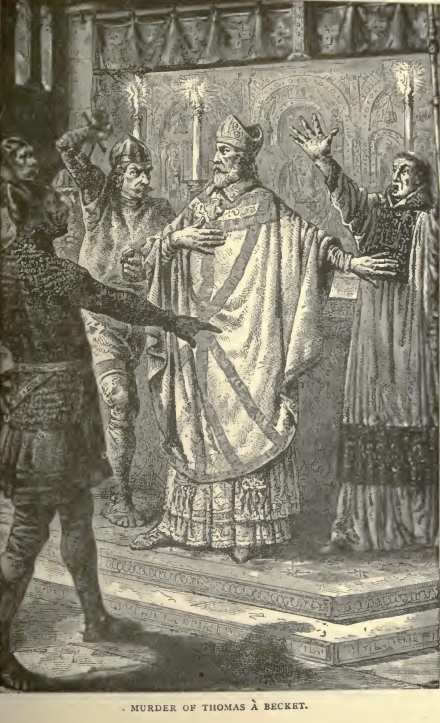
A.D. 1156. 102 Shortly after this adventure, the Princess Matilda was born, and a year later the celebrated Richard Cour de Lion came into the world. In course of time, Queen Eleanora had several other children, among whom was John, surnamed Lackland, because once, when Henry 105Great disputes had been going on in England for a long time between the church and state, headed by Thomas à Becket, the celebrated Archbishop of Canterbury. Prince Henry was so devoted to this priest, who had been his tutor, that the king became jealous of the influence exerted by Becket over the mind of his son. In order to change the current of the prince's thoughts, the father offered him a share in the government of his kingdom. This was gladly accepted, and young Henry was crowned. But he had a perverse little wife, Marguerite, daughter of Louis VII., who was fond of Becket, too, and she vowed that she would wear no crown that had not been placed on her head by that fascinating prelate; so she remained with her mother-in-law at Aquitaine.
King Henry met with so much opposition at the hands of Becket that he became enraged at the very sight of that priest. Once, when he was the subject of conversation among his knights, Henry asked, angrily, "whether no man loved him enough to revenge the affronts he perpetually received from an insolent priest?"
A.D. 1171. Four armed men instantly proceeded to the cathedral, and slaughtered the archbishop while he was kneeling before the altar in prayer.
When this happened Eleanora was still in the south with her son Richard, who had been crowned Count of Poitou. Suddenly she chanced to hear that Henry was thinking about getting a divorce from her, so she resolved to seek the protection of her former husband, the King of France. Disguised in male attire, she stole out of the palace at night, and started on her journey. But Henry had his Norman agents on the spot, and they watched her so closely that her absence was discovered in time for them to overtake her. They captured her very roughly, and brought her back to Bordeaux, where she was kept in close 106imprisonment until her lord was summoned. He remained only a few days in the south, then went back to England with two royal captives, his wife and the young Princess Marguerite, whom he had not forgiven for scorning the crown he offered unless it could be consecrated by his enemy, Becket. Now, that he had her in his power, he resolved to punish her. But after a few months' confinement she was restored to her husband.
Eleanora was not so fortunate, for she was kept a prisoner at the royal palace of Winchester for nearly sixteen years. During that time there was no end of strife among her sons. The real mischief-makers were the troubadours, of whom we have spoken, for with their inspiring war songs they were constantly urging the princes to battle for one trivial reason or another, even when they would gladly have been at peace.
It must not be supposed that the queen was unkindly treated at Winchester, for, on the contrary, she received the attention and respect due to her station. While she was there Louis VII., her divorced husband, died; and shortly after, the death of her eldest son, Henry Plantagenet, followed. This was a great sorrow to the royal couple, and Henry mourned with the deep grief of David over Absalom. Still later, their son Geoffrey was killed in a grand tournament in Paris.
In one of her letters to the pope, the queen thus writes about these bereavements: "The younger king and Geoffrey, Count of Bretagne, both sleep in the dust, while their most wretched mother is compelled to live on, though tortured by recollections of the dead.".
In 1189, Henry II. died, and was succeeded by his son Richard I., Cour de Lion. About the first act of the new king was to order his mother's release, and from a captive Queen Eleanora at once became a sovereign, for the reins
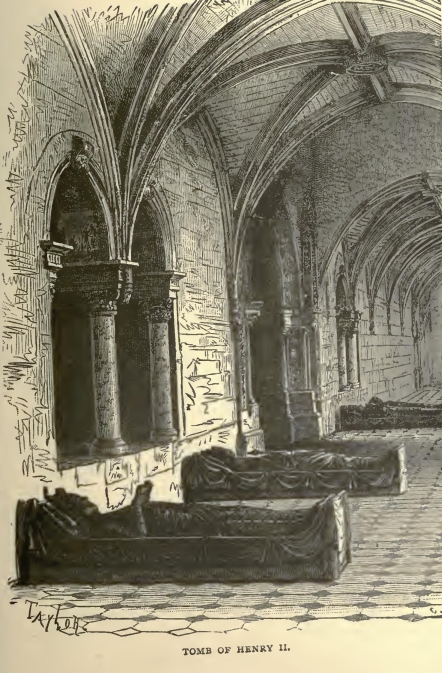
109of government were placed in her hands as regent. Her long confinement must have had a good effect on her, for she went about, from city to city, releasing all the poor people that her husband had cruelly locked up for violating the Norman game laws, and spent her whole time in acts of mercy and charity. Richard was crowned in 1189, but, as his mother's mourning prevented her being present on that occasion, no women were admitted at all.
The king then settled a most liberal revenue on his mother, and she went to Aquitaine, the government of which was also restored to her. But she did not stay there; her old age was passed in England, where she assisted her son in governing, and made him, as well as herself, exceedingly popular.
Eleanora of Aquitaine is among the very few women who, after an ill-spent youth, have become wise and benevolent in old age. But she had a great deal more trouble to bear before her death. Her life exhibits many traces of a great ruler. If she had only been blessed in her early days with a good, moral education, she would have been one of the greatest women of her time. Slowly and surely she learned the stern lesson of life, which teaches that without virtue, power, beauty and royalty are of slight avail.
A.D. 1204. She was a very old woman when she retired to a convent, where she spent many months previous to her death, which occurred in 1204. She was buried by the side of Henry II., and on her tomb is a reclining statue said to be a good portrait of herself. The features are noble and intellectual. On the head is a hood, above which is a regal diadem; and a blue mantle, figured with silver crescents, is folded gracefully about her form. 110
Richard Cour de Lion first met the beautiful, accomplished Berengaria at a tournament, and fell desperately in love with her; but, unfortunately, he was at that time engaged to Alice of France, so could not offer his hand to the Provençal princess.
Both Sancho the Wise, King of Navarre, Berengaria's father, and Sancho the Strong, her brother, were poets of considerable merit, and early came under the notice of Richard, who was not only a troubadour poet, but as sovereign of Aquitaine, he was, besides, the prince and judge of all the troubadours. Between him and Berengaria's brother a warm friendship was formed in early youth, strengthened by their similarity of tastes.
It was not until after his father's death that Richard was at liberty to marry the Princess Berengaria, to whom he had been secretly engaged for several years. So she was about twenty-six years old when Richard ascended the throne of England. He at once sent his mother, Queen Eleanora, to the court of Sancho the Wise to demand the princess in marriage.
The royal father was much pleased, and placed his daughter in charge of the queen without hesitation. The two ladies set out together and travelled as far as Naples, where ships awaited them in the bay. But the princess
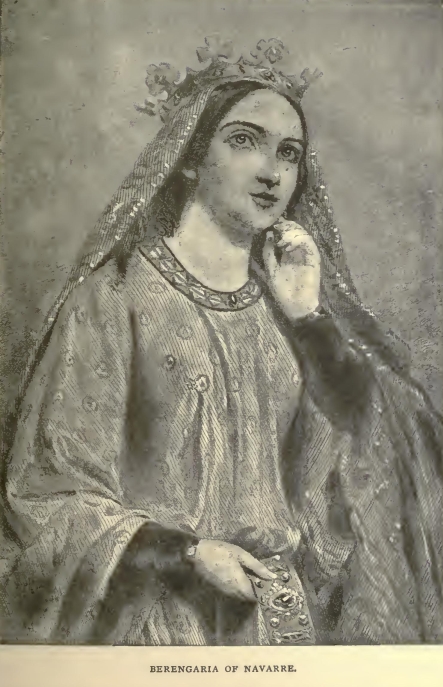
113would not join her lover until he had broken off his engagement with Alice; so she spent the spring of 1191 at Brindisi with his mother. At last a message came from Richard announcing that he was free to marry, then his lady-love returned to France with his sister, Queen Joanna, in whose charge she had been placed by the queen mother.
While Richard was waiting the arrival of Berengaria, he instituted the order of Knights of the Blue Thong, to scale the walls of Acre. They were twenty-four in number, and were distinguished by a band of blue leather which each wore on his left leg.
A.D. 1192. It was Lent when Berengaria met her royal lover, therefore their marriage had to be postponed; but so anxious was Richard to begin his crusade, that he set out at once with his knights in his favorite ship, which he had named "Trenc-the-mere," meaning cut the sea. His fleet consisted of one hundred and fifty ships and fifty galleys. Among the latter was one in which Berengaria and Queen Joanna, guarded by a brave knight; accompanied the crusaders.
A dreadful storm drove the galley which contained the queen and princess into the harbor of Limoussa, the capital of Cyprus, but when Isaac Comnenus, the lord of the isle, found out who they were, he brutally refused them shelter, and they were obliged to row out of the harbor. As soon as the gale abated, Richard Cour de Lion, who had found shelter in a harbor of Crete, started in search of his bride. When he beheld her ship pitching and tossing in the Bay of Famaguta, he suspected that something had prevented the knight in charge from seeking the protection so near at hand. Armed, as he was, he jumped into the first boat that could be got ready, and when, on reaching the queen's galley, he heard how the Lord of Cyprus had behaved, his fury knew no bounds.
The Queens of England. 114Determined to punish the offender at once, Richard led his crusaders straight to Limoussa, and made such a sudden and desperate attack that in a few hours he had captured the town, and all the inhabitants had scampered to the neighboring mountains for shelter.
Then, in response to King Richard's signals, the queen's vessel entered the harbor and landed at Limoussa, where grand preparations were soon under way for the marriage and coronation of the royal pair.
The wedding ceremony was performed in the month of May, 1191, and King Richard gave a grand feast, to which he invited the people of Cyprus.
On that occasion Berengaria wore a richly-embroidered robe of velvet and satin. Her dark hair fell in curls, over which hung a full long lace veil, fastened to a crown studded with rich jewels.
King Richard wore a short rose-colored satin skirt, with a brocaded mantle embroidered in silver. A richly jewelled Damascus sword hung at his side, and on his head he wore a scarlet hood, brocaded in gold with figures of animals. He had a bright complexion, and curly, yellow hair, and' his figure was a perfect model of manly grace and strength.
The people of Cyprus had been so tyrannized over by Isaac Comnenus that they gladly consented to receive Richard for their king; therefore, by the advice of all the crusaders who had witnessed his marriage, he was crowned King of Cyprus, and his bride Queen of England and Cyprus.
Then the daughter of the despot, Isaac, threw herself at King Richard's feet and asked for mercy. He kindly raised her from the ground and sent her to his wife and sister, with whom she remained until the end of the crusade. Her father was bound in silver chains and presented to Queen Berengaria as her captive.
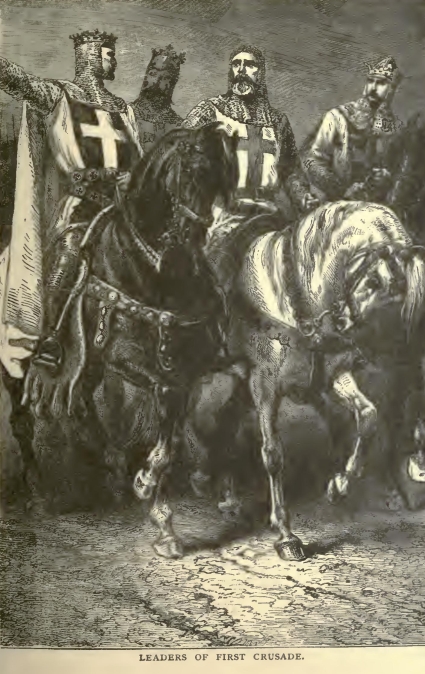
117Once more the fleet set sail for Palestine, and when Richard appeared' before Acre, the whole army of Christians, already assembled there, marched to the beach to welcome him.
The town was soon taken, and before proceeding further, Richard established his wife and sister in safe quarters there, under the protection of a couple of brave knights, to await his return.
King Richard distinguished himself by many brave deeds during his Syrian campaign, and captured several important towns, but Jerusalem did not fall into his hands. Once he was in sight of that coveted city, when the Duke of Burgundy, who commanded the French forces, suddenly drew back with his whole division when victory seemed certain, because he would not have it said that the King of England had taken Jerusalem. This act, which was prompted by envy, was a serious blow to Richard, who, throwing down his weapon, said, with tears in his eyes and his hands raised to heaven:—
"Ah! Lord God, I pray thee that I may never see thy holy city, Jerusalem, since I have failed to deliver it from the hands of thine enemies."
He returned to Acre in 1192, and, after spending a few days with his wife and sister, saw them embark for home on the very day he himself set out in the disguise of a Templar to return across Europe by a different route.
His vessel was wrecked off the coast of Istria, and his ignorance of geography led him to the neighborhood of Vienna, the capital of his enemy, Leopold of Austria.
One day, after several narrow escapes, he sent a page to make some purchases at a village near Vienna. The boy was recognized by an officer who had been in the late crusade with Leopold's troops. He was seized, and after suffering much cruelty, confessed where he had left his 118master. A party of soldiers set out for the inn designated, but could not find King Richard. The landlord said, on being questioned: "No, there is no stranger here, unless it be the Templar in the kitchen, who is turning the fowls which are roasting for dinner."
The Austrian officer, accompanied by his soldiers, proceeded at once to the kitchen, recognized the king, who sure enough was busily turning the spit, and cried: "There he is. Seize him!"
Cour de Lion started up and fought desperately for liberty, but he was only one man against a dozen, who captured him and carried him in chains before Leopold.
He was forthwith locked up in a gloomy prison, where he remained for many months, no one knowing whether he was alive or dead.
Meanwhile Berengaria and Joanna had landed at Naples and proceeded to Rome, where they remained six months. While there, Berengaria saw a belt of jewels offered for sale that she knew Richard had worn when he parted from her. This convinced her that something dreadful had happened to him, but she had no means of finding out the truth, and as soon as she could get a safe escort she journeyed on until she arrived at Poitou.
As time went on, poor Richard fancied himself forgotten, and bitterly lamented because he had no friend nor relation who loved him enough to rescue him. But he was wrong, for as soon as his mother heard of his captivity she spared no pains nor money to obtain his release. It was a long time, though, before the exact spot of his imprisonment could be ascertained, and this is how it happened, after many months: A certain troubadour knight who had been with Richard when he was shipwrecked at Istria, having heard of his captivity, wandered around through the southern cities of Germany in search of him. One day he
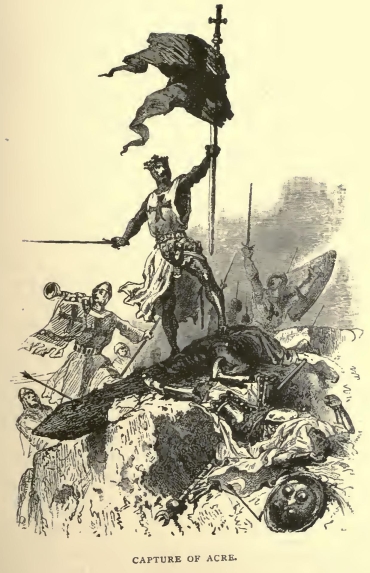
121stood beneath the tower that formed Richard's prison, and sang a song that he and the king had composed together. When he finished the first stanza, the prisoner replied with the second; then the troubadour hastened with all speed to Queen Eleanora with the discovery he had made.
She took immediate measures for her son's release, and with the assistance of the pope, to whom she made a most pathetic appeal, a large ransom was collected, with which the devoted mother set out for Germany.
A.D. 1195. After an absence of more than four years, Richard arrived in England in company with Queen Eleanora.
During his imprisonment, John, his younger brother, had tried to possess himself of the crown of England. It was the mother who prevented anything so disgraceful, and who kept all Richard's dominions intact, and it was she who proudly sat beside her brave son at his second coronation, which took place in his own country.
Berengaria remained in France, and Richard was not at all anxious to join her there, or to have her with him. The reason for this remarkable conduct on the part of a husband is that on his return to England Richard had been met by his former bachelor friends, into whose way of living he fell, much to the disgust of the more sober of his subjects. He drank with them to excess, and led such a gay, bad life, that Berengaria could not join him.
At last he became alarmingly ill, and began to repent of his neglect of his wife; but he knew that she was justly displeased with him, and did not dare to approach her. So he assembled at his bedside all the monks within ten miles and publicly confessed his sins, vowing that if Queen Berengaria would forgive him he would never forsake her again.
A few months later he went to France and became 122reconciled to his wife. It was a year of famine and of suffering among the poor, and the queen used her newly-restored influence over the heart of Richard to persuade him to many acts of charity that preserved the lives of a number of families. The Christmas of the year 1196, which occurred shortly after the king's arrival in France, was celebrated in grand style.
Berengaria accompanied her husband in all his campaigns after that, and never left him during the remaining three years of his life.
It was when Richard was storming the Castle of Chaluz, in April, 1199, that an arrow pierced his breast and caused his death. He was buried at the Abbey of Fontevraud.
Queen Berengaria went to live at Mans, where she founded the Abbey of L'Espan, and devoted her life to deeds of charity.
She lived to an advanced age, and was buried at the abbey she had founded.
She deserves to be remembered as a Queen of England who was never in that country, and as a woman possessed of many noble virtues.
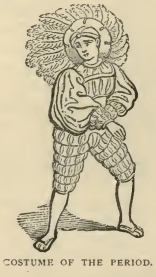
John ascended the throne of England on the death of his brother, Richard Cour de Lion, and it was at a festival given to him at Angouleme that he first made the acquaintance of Isabella, who afterwards became queen.
A.D. 1200. She was just fifteen years old and so beautiful that King John fell madly in love with her. She was engaged to Hugh de Lusignan at the time, but her parents were so ambitious for her to be raised to the lofty position of Queen of England, that they kept her with them after the festival instead of allowing her to return to the Castle of Valence, the possession of her betrothed, where she had been living under the protection of the Count of Eu, his brother.
Isabella really loved Hugh de Lusignan, but she was dazzled by the splendor of the triple crown of England, Normandy and Aquitaine, and, as her lover was absent, she denied that she had ever consented to marry him.
According to the feudal laws of the thirteenth century, King John, as ruler of Aquitaine, had the power to prevent any marriage that the Provençale princess might contract, if he chose, and to deprive her of her inheritance besides.
So, when King John and Isabella were married, in the month of August, 1200, Count Hugh dared not interfere to prevent it. But he challenged the king to mortal combat. 124The reply he got was that if he wished to fight a champion should be appointed for that purpose, but he was indignant at such a proposition and determined to await an opportunity for revenge.
Isabella sailed with her husband for England, where she was duly crowned by the Archbishop of Canterbury. Six months of feasting and enjoyment succeeded, which were only terminated at last by rumors of war.
Thereupon, King John retired with his wife to Rouen, where he led such a life of indolent ease as to excite the displeasure of all who surrounded him.
His mother, the aged Eleanora, was then residing at the Castle of Mirabel in Poitou, and was the ruler of Aquitaine. Quite suddenly and unexpectedly her residence was besieged by Hugh de Lusignan, whose plan was to capture the old lady and exchange her only for his lost love.
But Eleanora held out heroically until the arrival of her son John, whom she had summoned at the first signal of danger.
King John's enemies had reckoned on his character as a sluggard, but they found their mistake, for when he heard of the attack on his mother he hastened to Mirabel with lightning speed, hemmed in Count Hugh and Duke Arthur of Bretagne, who had joined him, and took both prisoners. The one was his rival in love, the other in empire.
Count Hugh was subjected to the most insulting treatment at the hands of the king, who had him and the other insurgent barons of Poitou chained hand and foot to carts drawn by oxen. In this manner they were forced to follow him wherever he went, until he made them embark with him for England.
King John was not so cruel to his nephew, Arthur, whom he merely had locked up in the citadel of Falaise,
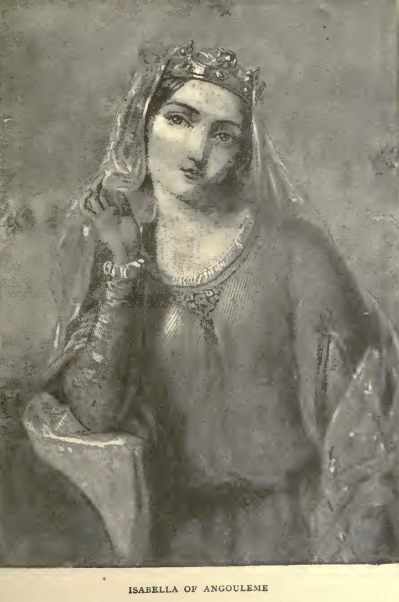
127leaving himself the sole representative of the house of Plantagenet.
A.D. 1204. In 1204 Queen Eleanora died, and from that moment her son John seemed lost to all sense of decency or fear, and became more corrupt and wicked than the most brutal of his subjects. Queen Isabella's influence was no check on his notorious conduct.
In 1206 he entered into a treaty with his prisoner, Hugh de Lusignan, with whose aid he conquered the southern part of France.
On his return to England he made some most unreasonable demands of his barons, one of them being the surrender of their children as hostages. Those young nobles who fell into his hands were required to attend the queen, serve her at meals and follow her at cavalcades and processions. The Lord of Bramber resisted the King's demand, whereupon he, with his wife and five children, were all shut up in a room at the old Castle of Windsor and deliberately starved to death.
A.D. 1211. Queen Isabella had given birth to several children, but that did not prevent her brutal husband from treating her with extreme harshness. Once, when he fancied that she had a fancy for a certain knight, he had the man assassinated, and his dead body suspended over her bed. Then he shut her up in Gloucester Abbey, where she remained until 1213, when it suited his majesty to take her with him to Angoulême.
King John found himself again in need of Hugh de Lusignan's assistance when Philip Augustus of France seized the northern provinces. But that brave count refused his aid unless the king would give him his eldest daughter, Joanna, for a wife. This was a singular request, considering that he had once been engaged to the mother, but he was gratified, and the infant princess was 128forthwith handed over to him to be brought up in one of his castles as her mother had been before her. Count Hugh soon cleared the northern provinces of France of the invaders, and then John returned to England to perpetrate new acts of tyranny.
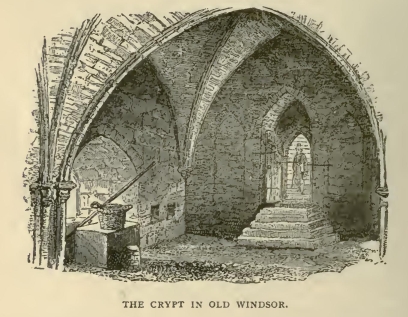
A.D. 1215. After the signing of the Magna Charta, which granted certain privileges to all his subjects, King John behaved like a madman, giving way to outbursts of fury, cursing the hour of his birth, and biting and gnawing sticks and clubs until he reduced them to small bits. The result of several sleepless nights at the fortress of Windsor, the scene of many secret murders, was an expedition to the Isle of Wight, where, after idly sauntering on the beach for days at a time and conversing with the fishermen, he joined a band of pirates with whom he made attacks on his own subjects. He was gone so long that everybody
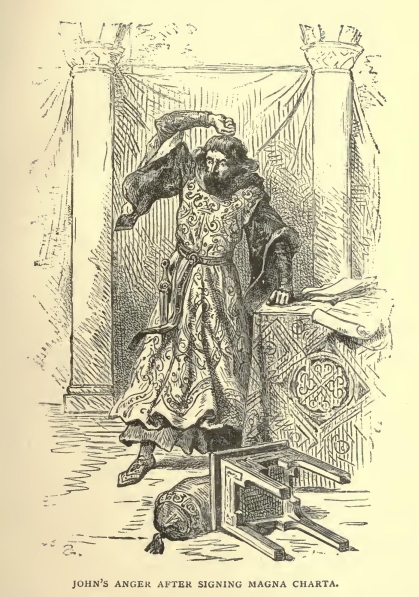
131hoped he would never return, but, like a bad penny, he turned up at the end of a few weeks, when he was joined by troops from Brabant and Guienne, whom he had summoned to aid him in revenging himself on the rebellious barons. This he did by travelling around among them, obliging them to entertain him, and then turning upon them and doing some damage to their lives or property. It was not uncommon for him to set fire to a house in which he had been sheltered over night.
In the midst of this diabolical career, Queen Isabella met her husband at Marlborough, and after spending a few weeks with him, retired to Gloucester with her children.
While she was there, Prince Louis of France made an invasion into England, prompted to the act by the barons, who were so incensed against their sovereign that they offered him the crown if he would come to their aid.
Then the tormentor tried to escape towards the north, but when he thought to cross the Wash to Lincolnshire, part of his army, his baggage, and his splendid regalia were lost, and he barely escaped with his life. He arrived at Swinshead Abbey ill and in a horrible temper.
With his usual brutality, he gave vent to his spleen by saying, while eating in the abbot's refectory, "that he hoped to make the half-penny loaf cost a shilling before the year was over."
This malicious speech was heard by several monks, who, thinking that John's outrages had extended far enough, treated him to a dose of poison served in a dish of stewed pears. Ill as he was from the effect of the poison, the king insisted on proceeding on his journey, and was therefore carried on a litter to Newark, where he summoned several monks for the purpose of confession. It was no trifling matter for this sinful man to recount all the wrongs of which he had been guilty, but having accomplished it, 132he forgave his enemies and made all the officers about him swear fealty to his eldest son, Henry. Then he expired, having left directions for his burial. As soon as the news
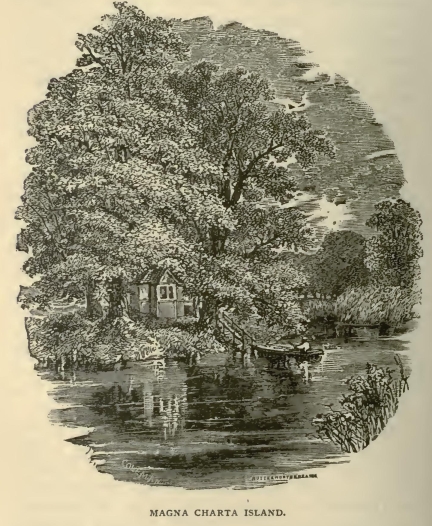
of the king's death reached her, Isabella caused Prince Henry to be proclaimed in the streets of Gloucester, and nine days later she assisted at his coronation in the cathedral of that place.
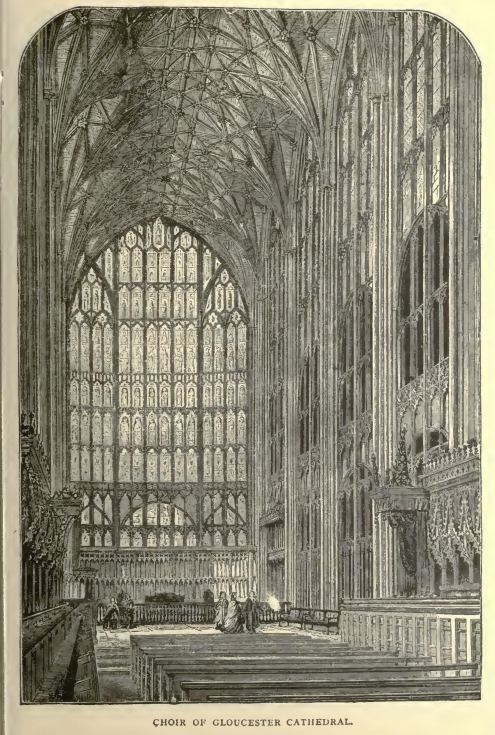
A.D. 1217. 135Although the young king was only nine years old, his mother was so unpopular that she was not asked to act as regent, and before the year of her widowhood had expired, she retired to her native city of Angoulême.
The Princess Joanna, then just seven years of age, was still at Count Lusignan's castle at Valence, but the count himself was absent on a crusade.
In the year 1220 he returned, and frequently met the mother of his little promised bride. The consequence was, that his early love was renewed, and as Isabella was still a very handsome woman, only a few years younger than himself, she was a much more appropriate mate for him than Joanna could have been.
So they were married without asking the advice or consent of any one in England; consequently Isabella's dower was withheld from her, much to the indignation of her husband.
Now, it so happened that Henry III. was at war with the King of Scotland, whom his council were anxious to conciliate. They therefore resolved to offer the king the hand of the little Princess Joanna in marriage, so when Henry wrote his mother a congratulatory letter on her nuptials, he demanded, at the same time, the restoration of his sister. Isabella refused to give up the princess, because she was highly displeased at being deprived of her jointure.
Thereupon the young king applied to the pope, who took great pains to inquire into the merits of the case. A voluminous correspondence was carried on between the contending parties. The King of Scots insisted upon his marriage with Joanna before he would come to terms; the result was the payment of all the money due to Queen Isabella in exchange for her daughter.
The King of France was the liege-lord of the Count de 136Lusignan, and it was so hurtful to the pride of Isabella to see her husband kneel at the feet of any man, that she gave him no rest until he joined her son, Henry III., whom she had instigated to undertake the conquest of Poitou.
Several years of warfare ensued, and at last the King of England fled to Bordeaux. De Lusignan's possessions were overrun by the enemy, and Queen Isabella was forced, after much suffering, to throw herself on the mercy of the King of France, Louis IX.
She went to his camp with her husband and children, and, falling at his feet, begged for mercy. He received them kindly, and granted forgiveness on easy conditions.
Nevertheless, so ungrateful did Isabella show herself, that when an attempt was made on the life of good King Louis, in 1244, it was proved that she had bribed people to poison him. She flew to the Abbey of Fontevraud for protection, and there hid herself from the French, who held her responsible for so much sorrow and bloodshed that they gave her the name of Jezebel.
She died in 1246, and was buried in the common cemetery of Fontevraud. Some years later her son, Henry III., raised a stately monument over her grave.
De Lusignan joined a crusade after the death of his wife, and was killed at one of the battles in 1249. His eldest son was known as Hugh XI., Count de la Marche and Angoulême. His other children were liberally provided for by Henry III., much to the indignation of his English subjects.
Eleanor of Provence was married when she was only fourteen years old, and became the most unpopular queen that ever reigned over the English court. She was so beautiful as to be called La Belle, but her judgment was too immature tor her to stand all the adulation she received without being spoiled by it.
Before she entered her teens, Eleanor had written a poem in the Provençal dialect, which is remembered in her native country to this day. Born in that land of poetry and song, of parents who were both popular poets among the troubadors, young Eleanor's talent was fostered and encouraged by the very air she breathed.
It was this talent that was the means of placing her on the throne, for she wrote a romance in verse, selecting Richard, Earl of Cornwall, who was then preparing a crusade, for her hero. Romeo, her tutor, and one of the greatest Italian poets of his day, was so proud of his pupil, that he carried the composition to Richard, who was immensely flattered by it. But he could not, in return for the compliment, offer his hand and heart to La Belle Eleanor because he was already provided with one wife; therefore he did the next best thing—recommended her to his brother, Henry III.
So delighted was this king with the accounts he received of the beauty and genius of the maid of Provence, that 138he put 'a stop to the treaty under way for the hand of Joanna, daughter of the Earl of Pembroke, and forthwith despatched ambassadors to the court of Count Berenger to demand his daughter Eleanor in marriage. With the covetousness for which he was noted, he added a dower of twenty thousand marks to his demand.
The court objected to so large a sum. Henry lowered it, but even then the father would not agree, and so much bargaining was the result that the high-spirited court was on the point of putting an end to the affair altogether, when a peremptory order came from the king to conclude the marriage at once, with or without money. Then the contract was signed and the maiden was delivered with due solemnity to the ambassadors.
When she commenced her journey to England, the royal bride was attended by a train of knights, ladies and minstrels who accompanied her to the French frontier. There she was met by her eldest sister, the wife of King Louis, and after receiving the congratulations of her relatives, she embarked for Dover and landed there January 4, 1236.
A.D. 1236. She was married at Canterbury, where King Henry had received her with a splendid train of followers, and after the ceremony the royal couple proceeded to London, where preparations on a very grand scale had been made for the reception and coronation of the new queen.
Her apartments at Westminster Palace had been newly decorated and furnished by order of the king, and all the streets of London had been thoroughly cleansed.
The 20th of January was appointed for the coronation, and on the previous Saturday, Henry laid the first stone of the Lady Chapel in Westminster Abbey.
The streets through which the procession passed were
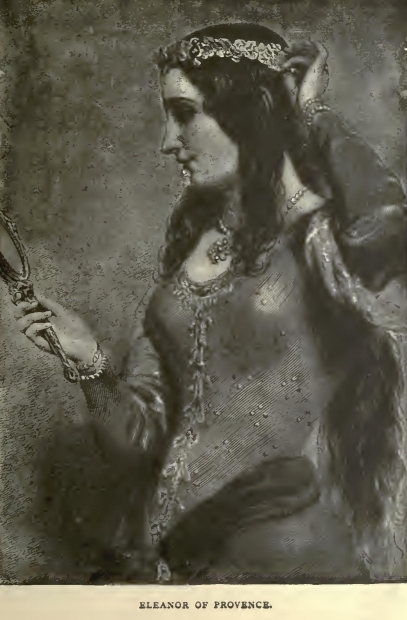
141hung with flags, banners and garlands of flowers, and the houses were gaily decorated. Three hundred and sixty equestrians, preceded by the king's trumpeters, who sounded as they moved along, accompanied the royal pair from the tower. These were loyal citizens, who, mounted on richly caparisoned horses and clad in bright, embroidered satin and velvet garments, each carried in his hand a gold or silver cup to be used at the banquet. They were called cellarers, and it was their duty to hand wine to the royal butler, who passed it to the sovereigns. After the banquet, the butler always claimed the cup out of which the king had drank, the curtain that hung behind the royal table became the property of the doorkeepers, other perquisites being divided among the cooks and scullions. King Henry was very charitable and did not forget the poor, among whom a liberal supply of money was distributed by his orders.
At this coronation were worn the most splendid garments ever seen in England. They were made of the costliest satin and velvet, richly, embroidered in gold and silver, and the ladies wore head-dresses composed of rare and precious gems. The queen's crown was worth £1500, and her girdle was studded with jewels of great value.
The king, who had a taste for finery not often seen in men, wore a garment of gold tissue that glittered with every motion.
The expenses of Eleanor's coronation were so enormous that the king had to petition the Lords for money. They refused, saying, "that they had amply supplied funds both for his marriage and that of his sister Isabella, who had just been united to the Emperor of Germany; and as he had wasted the money he might defray the expenses of his wedding as best he could."
Great dissatisfaction was felt in England on account of 142the number of foreigners who had accompanied Queen Eleanor. Among these was her uncle, Peter of Savoy, who by the end of a year had gained such complete control over Henry that all the affairs of the kingdom were submitted to him.
Throughout his reign, Henry III. too frequently made demands on the purses of his subjects, to supply his unbounded extravagance, and Queen Eleanor was no check to him in this respect. Their tastes were similar, and Henry had in his wife a congenial companion, interested, as he was, in literature and art. Her influence over him was unbounded, and he was never known to refuse any demand she made, no matter how unreasonable it was.
Their first child was born at Westminster in 1239, and received the name of Edward, in honor of Edward the Confessor.
An attempt was made on the king's life one night by a crazy man named Ribald, who concealed himself in the palace during the day and stole into the king's bed-chamber at midnight. Fortunately Henry spent the night in another apartment, otherwise the score of stabs that the madman inflicted on the bolster would certainly have put an end to his majesty. The shrieks of one of the queen's maids of honor, who heard the would-be murderer shouting horrible threats with each thrust of his dagger, aroused the household, and the wretch was taken into custody.
A.D. 1241. In 1241, a year after the birth of her daughter Margaret, Queen Eleanor accompanied her husband to France, on an expedition against their brother-in-law, King Louis. After a series of defeats, they took refuge in Bordeaux, where many of Henry's knights and nobles forsook him and returned to England. He revenged himself by imposing upon them heavy fines,—his favorite mode of punishment
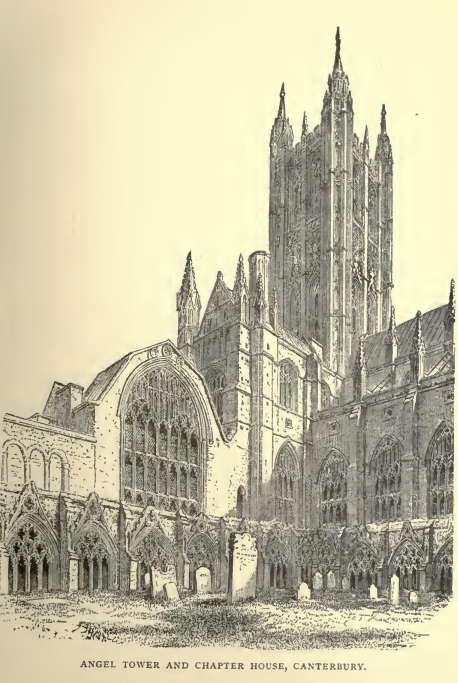
145Henry and Eleanor spent a merry winter at Bordeaux, amusing themselves with feasts and pageants that they could ill afford, and on their return to England, in 1243, Henry issued an order compelling the principal inhabitants of every town on the route to appear on horseback to give them welcome.
A.D. 1243. The marriage of the queen's youngest sister, to the king's brother Richard, Earl of Cornwall, who had become a widower, was solemnized in England the following autumn. On that occasion Henry called upon his Jewish subjects to furnish funds for the sumptuous festivities that he saw fit to give, and he spared no expense, for the wedding-dinner alone consisted of thirty thousand dishes.
But he remembered the poor as usual, and ordered all the children from the streets and highways of Windsor and its neighborhood to be collected together and feasted in the great hall of the palace, after which the royal children—of whom there were then three—were weighed, and silver coin placed in the balance was distributed among the destitute individuals present.
The following year the threatened war between England and Scotland was averted by a contract of marriage between the infant Princess Margaret of England and the heir of Scotland.
England was in such a dreadful state of misrule at this time that no traveller was safe from plunder; and in some counties no jury dared to punish the plunderer. Henry himself sat on the bench of justice and tried many cases. Once he summoned Lord Clifford for some offence, but the gentleman not only refused to answer, but forced the king's officers to eat the royal warrant, seal and all. He was severely punished.
One great cause of Eleanor's unpopularity was the means 146she employed for extorting money from her subjects. She compelled vessels carrying valuable cargoes to unload at her quay, no matter how inconvenient it might be, in order that she might receive the toll. When the royal funds were almost exhausted, the king and queen, with their son, Prince Edward, daily invited themselves to dine with the different rich men of London in turn, to save the expense of keeping up a table of their own. They added to this economical mode of living by insisting on costly presents from their entertainers as a proof of loyalty.
A.D. 1251. The year 1251 closed with the marriage of the Princess Margaret and Alexander III. of Scotland, whose engagement had been signed seven years before. As the bride was just ten years of age, and the groom twelve, they probably had not much choice in this matter.
On the morning preceding the ceremony, the youthful groom was knighted at York Cathedral. The wedding feast was served by the archbishop at a cost of four thousand marks; and he supplied six hundred oxen, that were all consumed at one meal. The costumes worn by the nobility were, as when Eleanor, her mother, was married, of the most extravagant material, scolloped, embroidered and ornamented with costly jewels. The queen and her ladies wore robes that trailed on the ground, but, as they were the same length all around, they had to be held up to enable the wearers to walk. The height at which they were raised depended upon the beauty or ugliness of the feet and ankles, no doubt. During this reign the hair was gathered under a network of gold, over which was usually thrown a gauze veil. Unmarried ladies wore ringlets, or long braids hanging down the back and fastened with ribbons. A head-dress made in the shape of a knight's helmet, with an aperture for the face to peep through, was
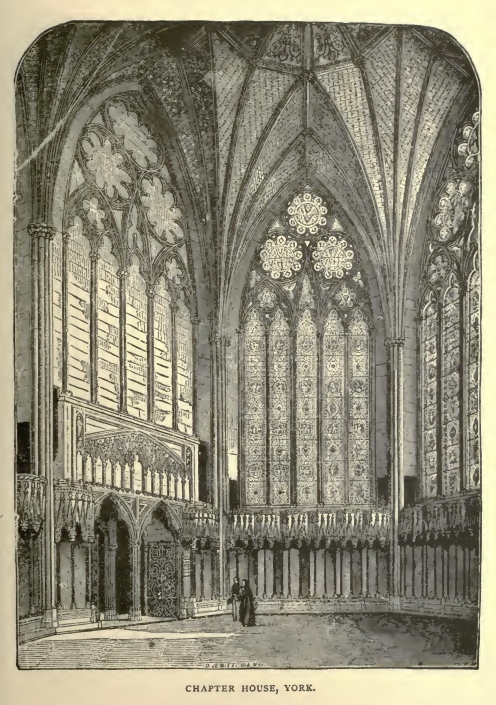
149worn by ladies, old and young, in the street, and must have been very becoming.
After Margaret's marriage, the king became even more extortionate in his demands for money than ever, and thus made a host of enemies. He applied for funds for a crusade, but was refused, and shortly after he was called upon to quell an insurrection at Guienne. This was the result of the recall of the Earl of Leicester, who had been governor there.
The earl had been replaced by Prince Edward, who was only fourteen, and therefore incapable of managing public affairs. Before his departure, King Henry appointed Eleanor regent of England, but requested her to advise with his brother Richard, Earl of Cornwall, on matters of importance. He sailed from Portsmouth August 6, and arrived at Bordeaux on the 15th of the same month.
Queen Eleanor's first act, on finding herself in power, was to tax the London citizens more heavily than her husband had ever done, and those who refused her unjust claims were sent to the Marshalsea Prison. This conduct aroused universal indignation, and the following year, when parliament was summoned for the purpose of demanding aid to carry on the war in Gascony, they peremptorily declined to give it.
Every other means having failed, Henry instructed his brother to extort money from the Jews, and no sooner did he get it than he sent for Eleanor to help him to squander it on the nuptials of Princess Eleanor of Castile with their eldest son, Prince Edward. Queen Eleanor willingly resigned the cares of government to the Earl of Cornwall, and with his wife, Prince Edmund, her second son, and a retinue of knights and ladies, sailed for Bordeaux, where she was warmly welcomed by her husband.
A.D. 1255. 150After Prince Edward's marriage, his parents went to pass a fortnight at the court of King Louis. The day after their arrival, King Henry distributed so much money among the poor of Paris and gave such a grand entertainment to the crowned heads assembled to meet him, that it was called the Feast of Kings.
On their return home, which occurred January 27, 1255, the king and queen made a public entry into the city of London, and received a present of a hundred pounds and a valuable piece of plate from the citizens.
Shortly after, the royal couple were made extremely anxious by a report that the young king and queen of Scots were deprived of their rights and kept in close confinement by the regents, Sir John Baliol and Comyns. The queen's physician was immediately despatched to Scotland to ascertain the facts. He managed to obtain a secret interview with Margaret, who gave a lamentable account of her treatment. She said, "that she had been rudely torn from her husband and shut up in a dismal place, the dampness of which had seriously injured her health, and, so far from having any share in the government, she and he were treated with disrespect and were in danger of their lives."
Queen Eleanor was so distressed at the condition of her child, that she accompanied the king on a northern campaign, constantly urging him to do something to aid her. The Earl of Gloucester was sent to Scotland for that purpose, and with John Mansel gained admittance to Edinburgh castle, by disguising themselves in the dress of Baliol's tenants. Then, secretly admitting their followers, they surprised the garrison, restored the young king and queen to each other's society and carried their cruel jailers, Baliol and Ross, before King Henry at Alnwick. Throwing themselves at the feet of the sovereign, the traitors implored for mercy and were forgiven, but as Baliol
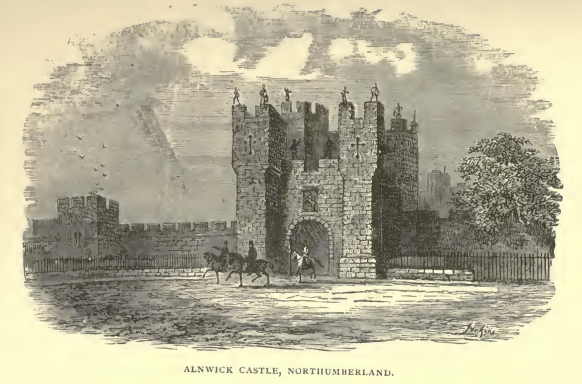
153was Henry's own subject he had to pay a heavy fine, which his majesty pocketed for his own private wants.
Queen Eleanor was lying ill at Wark Castle, and requested her daughter Margaret, with the young king of Scotland, to join her without delay. They obeyed, and as soon as the royal mother was convalescent, accompanied her to Woodstock, where King Henry joined them. The court was kept with extraordinary splendor at that beautiful palace, which contained three kings and three queens, with their retinues, during the winter of 1255, for besides the English and the Scottish royal couples, there was Richard, Earl of Cornwall, who had been elected King of the Romans, and his second wife, Queen Eleanor's sister.
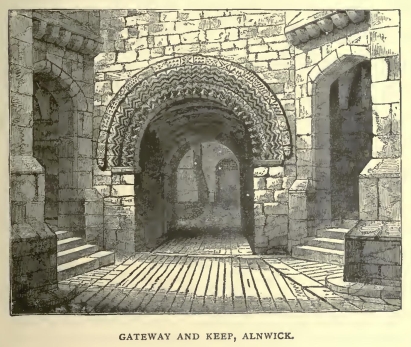
They all made a public entry into London in February, wearing their crowns and royal robes, and the entire populace 154assembled to witness the splendid procession. After the departure of the royal visitors, there was a season of misery and gloom caused by a dreadful famine, and by the drain that had been made on the public treasury by the King and Queen of the Romans, who, on departing for Aix-la-Chapelle, where they were to be crowned, carried with them seven hundred thousand pounds sterling. Added to this were the battles of the barons, to whom both Henry and Eleanor had made themselves obnoxious by frequent acts of selfishness and injustice, and finally the shameful attack upon the Jews, whose wealth had excited the envy of the nation.
The mob was led on by the Marshal of London and John Fitz-John, a powerful baron, killing and plundering without mercy, men, women and children of that noble race, and driving hundreds from their beds into the street half clad as they were. The next morning they began again with such demoniacal yells that the queen, who was at the Tower, was so terrified that she got into her barge with several of her ladies, intending to escape to Windsor Castle. But as soon as the populace observed the royal barge, they made a rush for the bridge, crying: "Drown the witch!—drown the witch!" at the same pelting the queen with mud and trying to sink the vessel by hurling down huge blocks of wood and stone that they tore from the unfinished bridge. There was nothing for Eleanor to do but to hasten back to the Tower, where she remained until nightfall, then sought shelter in the Bishop of London's palace at St. Paul's, whence she was privately removed to Windsor Castle, where Prince Edward was garrisoned with his troops.
A.D. 1264. While the civil war continued King Henry took the queen and her children to France, where she remained under the care of King Louis and her sister Margaret.
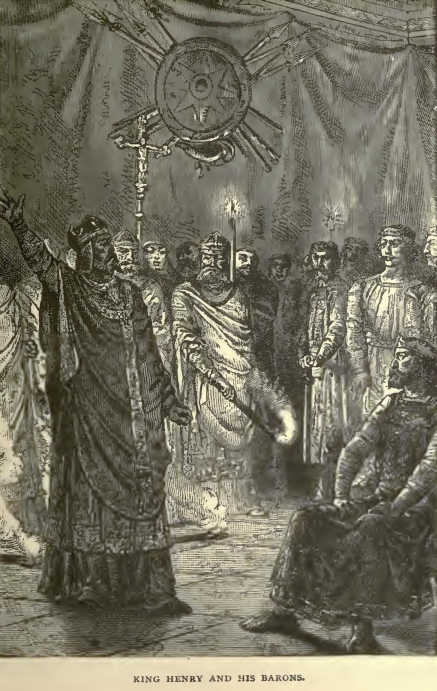
157At the battle of Lewes, the king and Prince Edward were captured and locked up in the Castle of Wallingford. As soon as Eleanor heard their sad fate she sent word to Sir Warren de Basingbourne, her son's favorite knight, that Wallingford was feebly guarded and could not resist an attack. Sir Warren lost no time in crossing the country with three hundred horsemen, and laid siege to the castle, which, contrary to his expectation, was warmly defended. At last the besiegers called out to Sir Warren that "if they wanted Prince Edward, they should have him bound hand and foot, and shot from the mangonel"—a war engine used for throwing stones. On hearing this, the prince begged leave to speak with his friends, and appearing on the wall "assured them that if they persevered in the siege, he should be destroyed." Thereupon Sir Warren and his chevaliers withdrew.
The royal prisoners were afterwards removed to Kenilworth Castle, and Lady Maud Mortimer, who was warmly attached to the queen, helped Prince Edward to escape. Having sent him the necessary instructions, she had a swift horse concealed in a thicket on a certain day when it was planned that he was to ride races with his attendants. When all the horses were tired out, he approached the spot where Lady Maud's fresh one awaited him, and after mounting, he turned to his guard and said: "Commend me to my sire, the king, and tell him I shall soon be at liberty." He then galloped off to a hill, about a mile distant, where a band of armed knights awaited him.
Although the queen was living in France at this time, she made several secret visits to England, to ascertain the true state of affairs there. After her husband's dreadful defeat at Lewes, she pawned all her jewels, and, with the money thus raised, collected a powerful army that might have subdued the whole kingdom if they had ever reached 158it. But the Almighty mercifully ordained otherwise, and before Queen Eleanor, with her foreign troops, set sail, the battle of Evesham was fought and won by Prince Edward.
A.D. 1265. At this battle King Henry was wounded in the shoulder and would have been cut down by one of his own soldiers, who mistook him for an enemy, had he not cried out in a feeble voice: "Slay me not, I am Henry of Winchester, your king."
An officer who happened to be within hearing, conducted him to Prince Edward, and thus the royal father and son met once more. After tenderly embracing his sire, the prince knelt to receive his blessing.
A succession of victories for Edward soon put an end to the barons' wars and reinstated the royal family of England. It is much to the credit of King Henry, that after he was restored to power, not one of his enemies was brought to the scaffold. But he punished them with such heavy fines that many of the rebel barons were reduced to penury.
A.D. 1269. Henry III. lived to witness the completion of St. Edward's chapel at Westminster, which he had begun fifty years before. On St. Edward's day, October 13, 1269, assisted by his two sons and his brother, the King of the Romans, he bore the bier of Edward the Confessor to the chapel and deposited it in the new receptacle. This ceremony was witnessed by the whole court, and Queen Eleanor offered at the shrine a silver image of the Virgin, besides jewels of great value. King Henry reserved the old coffin of the saint for his own use, and was placed in it just three years later, having expired on the 16th of November, 1272.
He was buried at Westminster Abbey, near the shrine of Edward the Confessor. His funeral was conducted with 159great magnificence by the Knights Templars-military monks who, in the middle ages, acted as bankers and money-brokers to all Europe—and they raised a fine monument to his memory, which was afterwards inlaid with precious stones brought from the Holy Land for that purpose, by Edward I., King Henry's heir.
Queen Margaret, of Scotland, followed her royal father to the grave within the year, and then, bowed down with suffering and sorrow, Queen Eleanor retired to Ambresbury, where four years later she entered the convent and took the veil.
A.D. 1291. She survived her husband nineteen years, and when she died her body was embalmed and placed in a vault until King Edward, her son, returned from his campaign in Scotland. Then he summoned all his barons and clergy to Ambresbury, where the funeral rites were duly performed and his mother's body was buried. Her heart was conveyed to London and interred in a church.
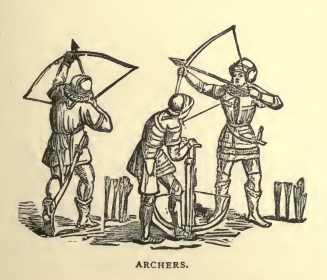
Edward I. was only fifteen years old when he accompanied his mother across the Pyrenees from Bordeaux, to claim the hand of Eleanora, sister to King Alphonso of Castile, to whom he had been betrothed several months before.
A.D. 1256. The marriage was solemnized a few days, after his arrival, feasts and tournaments in honor of the event followed, and then the little bride of ten years proceeded with her lord to Paris. She was present at the feast of kings, given by King Henry to celebrate his son's marriage, of which mention is made in the preceding reign.
When Henry III. and Queen Eleanor returned to England, the young couple went with them and made their public entry into the metropolis in grand state.
Among the numerous entertainments given to welcome the bride, that which took place at the house of John Mansel, the secretary of state, was the most remarkable. All the royal family, with their entire retinue, were present, and as the mansion was by no means capacious enough to accommodate so large a party, tents were erected on the surrounding grounds. Considering that seven hundred messes of meat were served at one meal, it is not surprising that Mansel's house was too small.
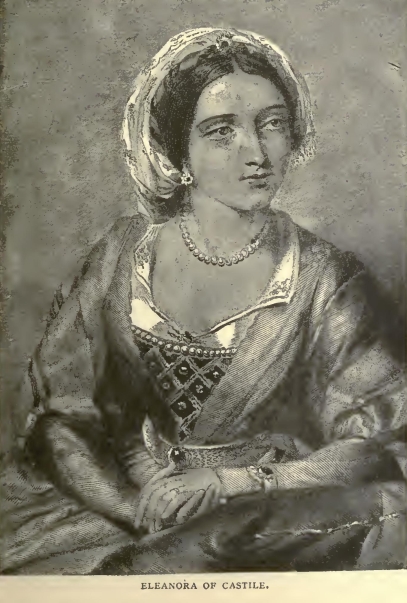
163A few months later, Prince Edward took his little wife to Bordeaux to complete her education, which had scarcely begun at the time of her marriage. While she pursued her studies, the prince led the life of a knight-errant, wandering from place to place, and taking part in various tilting matches and tournaments until summoned to England to take part in the civil wars that resulted, after several years, in the complete restoration of Henry III.
A.D. 1265. Peace was so far established in 1265 as to warrant the return of Queen Eleanor, who took her daughter-in-law home with her.
Prince Edward met the ladies at Dover, and was delighted to welcome his wife, who had, during her absence, developed into a remarkably handsome woman. She had clear cut, delicate features, a fine figure, and magnificent black hair, peculiar to Spanish ladies.
The young couple set up their establishment at the palace of Savoy, built by Edward's uncle, but passed much of their time at Windsor Castle, where, a year later, their first son was born. He received the name of John, after his unworthy grandfather. In 1267 a second son was born and named Henry.
Prince Edward was too restless a man and too much of a soldier to settle down to a life of luxury and ease, and an escape from injury, or perhaps death, that he had one day when playing chess at Windsor, turned his thoughts towards a crusade. He had just left the table, with no special purpose, when the centre stone of the ceiling fell and crushed the chair he had occupied. This circumstance convinced him that he was under Divine protection and that his life was spared for some great work.
He therefore began his preparations for a campaign in Syria forthwith. Prince Edward was eminently fitted for a crusader, being a powerful man, tall, well formed, remarkably 164agile in wielding his sword, and an excellent horseman.
His wife loved him so fondly that she resolved to accompany him, though it was a sacrifice to leave her two lovely little boys. All the hardships and dangers attendant upon a crusade were laid before Eleanora in graphic colors, but she was willing to brave them all rather than let her husband go without her. "Nothing," said this faithful wife, "ought to part those whom God hath joined, and the way to heaven is as near, if not nearer, from Syria as from England or my native Spain."
Before leaving England, Eleanora, in company with Queen Eleanor, visited the various shrines throughout the kingdom and made offerings, some of them being of great value.
A.D. 1270. In the spring of 1270 the young couple bade farewell to the two sons they were never to see again, and set sail for Bordeaux, thence to Sicily, where they were to be joined by King Louis of France, with his army.
But the death of King Louis occurring at this time, deprived Prince Edward of the aid he had counted on, and caused his detention for several months. The King of Sicily tried to persuade him to abandon the crusade, but heroically striking his breast the prince exclaimed:—"Sang de Dieu, if all should desert me, I would lay siege to Acre, if only attended by Fowen my groom!"
In the spring and summer of 1271 Edward made two successful campaigns and defeated the Saracens with great slaughter. Returning to Cyprus for reinforcements, he undertook the siege of Acre, and established a reputation in the Holy Land, not inferior to that of his great uncle, Cour de Lion.
The Saracen admiral, bent on revenge, sent a messen-
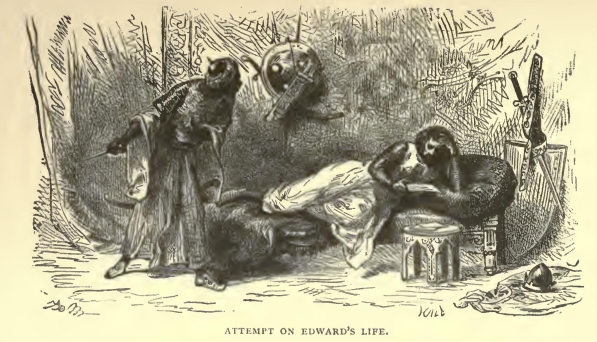
ger 167several times to the prince, with letters, in which he expressed his desire to become a Christian convert. He was always received in private, because the admiral's life would be in danger from his own people unless the utmost secrecy were observed. The fifth time the ambassador presented himself, Edward was lying on a lounge, clad in a loose garment, as the weather was very warm. He was soon absorbed in the letters that had been written on purpose to please him. Suddenly the letter-carrier drew forth a poniard and aimed at the prince, who fortunately perceived the treachery in time to receive the blow on his arm. The man made another attempt, but Edward felled him to the ground with a powerful kick in the breast, then seizing a stool, killed him outright. The sound of the scuffle brought in Prince Edward's attendants, one of whom beat out the brains of the treacherous messenger. "What was the use of striking a dead man?" asked the prince, with stern reproach.
A surgical operation became necessary before the wounded arm could be cured, but at the end of a fortnight Edward was able to mount his horse, the attention and good nursing of his wife having hastened his recovery.
Eleanora had a little princess soon afterward, and called her Joanna of Acre, from the place of her birth.
As his army had become much reduced, Prince Edward took leave of the Holy Land and returned to Sicily with his wife and infant. Sad news awaited them, for a messenger announced the death of their two little boys in England, and they had scarcely recovered from the shock when another arrived to inform them that Henry III. also had died.
The firmness and resignation with which Edward had borne the loss of his sons now gave way to an outburst of grief that surprised every one, particularly as his father's death made him King of England. When questioned on 168the subject Edward replied: "The loss of infants may be repaired by the same God that gave them, but when a man has lost a good father it is not in the course of nature for God to send him another."
The royal pair spent a year in Rome before returning to England. During their passage through France, Edward took part in several tournaments, and did not land at Dover with his wife until August 2, 1273.
A.D. 1273. Preparations for their coronation were speedily concluded, and that important ceremony took place on the 19th of August. Great enthusiasm was exhibited by the citizens of London, who had enjoyed a season of such prosperity since the establishment of peace that they were anxious to prove their loyalty to the new king and queen by lavish expenditure. Both houses of parliament assembled to welcome their majesties, and for two weeks after the coronation banquets were served every day in the wooden buildings that had been erected in the palace grounds for that purpose. The rich and the poor, the country yeoman and the Londoner, were welcomed alike and entertained free of charge. It was a fortnight of universal rejoicing, and the opening reign promised to be an exceedingly popular one. But the most remarkable feature of the coronation was this: while the king was at a feast prepared in the palace for the lords who had attended him during the ceremony, King Alexander of Scotland came to pay his respects, accompanied by a hundred knights. They arrived on horseback, and, as each man alighted, his horse was turned loose to become the property of any person, no matter what his station, who might be lucky enough to capture him. Afterwards came Edmund, the king's brother, the Earls of Pembroke and Warren, with their train of knights, and the horses of this whole party were likewise turned loose. 169Llewellyn, the Prince of Wales, did not appear at the coronation, and this displeased the king so much that he sent to inquire into the cause, whereupon the prince replied that as he had reconquered all the Welsh territory that Edward's Norman predecessors had taken possession of, he owed no homage to the King of England.
Later, when Llewellyn's bride was on her way to Wales, her vessel was captured by the Bristol merchantmen, and the damsel was taken prisoner. King Edward treated her with courtesy, and placed her in charge of the queen at Windsor Castle. Then the prince submitted to the required homage with alacrity and went to Worcester, where the King and Queen of England met him, bringing his lady love with them. The marriage ceremony was performed at Worcester Cathedral; King Edward gave the bride away, the queen supported her at the altar, and both honored the marriage feast with their presence. A year later the young princess died, then her husband repented of his homage and suddenly invaded England, but he was killed on the battle-field without accomplishing anything.
A.D. 1283. Wales was in such an unsettled state in 1283 that King Edward found his presence there very necessary. The queen went with him and established her court at Rhuddlan Castle. By that time the royal couple had several children, and their sixth daughter, Princess Isabella, was born soon after their arrival in Wales.
The following year the queen removed to the Castle of Caernarvon, because it was the strongest fortress in Wales, and the king wanted to feel that she was safe from insurgents. There, in a gloomy little chamber, ten feet by eight, a prince was born on the 25th of April, 1284. The room had no fireplace, but tapestry was hung on the walls to keep out draughts. It was Queen Eleanora who first 170put tapestry to this use in England in imitation of a Moorish custom that she had seen adopted in Spain. A Welsh nurse was procured for the infant, because the queen knew that it would please the people to have a native woman in that position. Edward I. was at Rhud-dlan Castle, trying to negotiate a treaty of peace with the authorities of Wales, when a gentleman arrived to inform him of the birth of his son. He was so delighted that he knighted the man on the spot and made him a present of some lands.
The king then hastened to Caernarvon to see his wife and baby. Three days later all the chiefs from the different parts of North Wales met at the castle to tender their submission to Edward, and to implore him to appoint them a prince of their own land, whose native tongue was neither French nor Saxon.
Edward assured them that he would comply, whereupon they promised that if his character was free from stain, they would certainly accept him without a murmur. Then the king ordered his infant son to be brought in, and presenting him to the assembly, said, "that he was a native of their country, his character was without reproach, that he could not speak a word of English or French, and that if they pleased, the first words he uttered should be Welsh."
As there was no alternative, the rough mountaineers kissed the little hand and swore fealty to Edward of Caernarvon.
The queen soon removed to Conway Castle, where she was surrounded with all the comforts and luxuries the age afforded. Under her influence the Welsh made rapid strides towards civilization, and she felt happy to be among them; but they had been so barbarous when she first went to their country that the king had to threaten se-
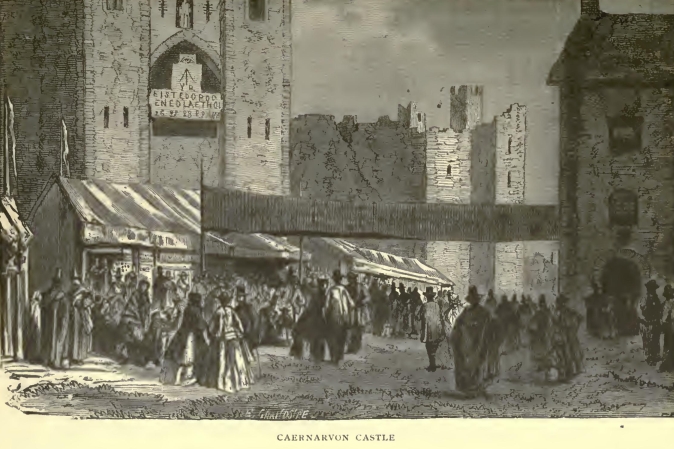
vere 173punishment to any one "who should strike the queen or snatch anything out of her hand."
A.D. 1285. King Alexander of Scotland died in 1285, and his heiress, the Princess Margaret of Norway, was by consent of the nobles of Scotland, solemnly betrothed to little Edward of Caernarvon, Prince of Wales.
In 1290, Queen Eleanora was the mother of nine beautiful princesses, to whose care and education she devoted a great deal of time. They occupied a retired portion of Westminster Palace, which was called in consequence, Maiden Hall. One of these princesses entered a convent, not long after the ninth one was born, and during the same year three others married. The rejoicings that attended the nuptial ceremonies were suddenly brought to a close by a dreadful calamity. It had been arranged that the little Queen Margaret of Scotland should go to England to be educated under the guidance of Queen Eleanora, but she died on the voyage. This sad event was disastrous to Scotland, and threatened the prosperity of the whole kingdom, by severing the bond that would have united it had the marriage between Margaret and Edward been consummated.
A.D. 1291. As soon as the king heard of Margaret's death he started for Scotland, bidding his beloved Eleanora to follow as speedily as possible. But before he reached his destination a messenger overtook him with news of the queen's dangerous illness. She had been attacked with fever while travelling through Lincolnshire, and prevented from proceeding. Edward turned back instantly, and everything was lost sight of excepting that his dear wife was ill and suffering. Notwithstanding that he pushed forward with utmost haste, he arrived too late, for the queen was dead. King Edward's grief was so deep for a time that he was unable to attend to public affairs of 174any description. He followed the corpse of his wife for thirteen days, stopping at every important town to have a funeral ceremony performed at the largest church where all the neighboring priests and monks assembled for the purpose. As the royal bier approached London the officers and principal citizens met it, clad in black hoods and gowns, and marched in solemn procession to Westminster Abbey.
Queen Eleanora was buried at the feet of her royal father-in-law. Besides the beautiful monument in bronze for which King Edward paid an Italian artist £1700, he erected others in the shape of a cross in memory of the chère reine, as he called his wife, at each of the places where the funeral procession halted on the way to London. The last stopping place was the one now called Charing Cross, a perversion of the original French, which signified "dear queen's cross."
Eleanora of Castile was sincerely lamented in England; for as Walsingham says of her: "To our nation, she was a living mother, the column and pillar of the whole realm. She was a godly, modest and merciful princess, who consoled the sorrow-stricken, and made those friends that were at discord."
During the reign of Edward I. and Eleanora, sculpture, architecture, casting in brass and bronze, and wood-carving were encouraged, and many beautiful specimens of these branches of art appeared in England.
Of all the children of this royal couple, the nun-princess and Edward II. were the only ones that reached middle age.
King Edward I. was so grieved at the death of his "chère reine," that he gave himself up to the deepest melancholy, which lasted several months. He was growing old, and felt the loss of his companion of many years most keenly. However, he learned in time to submit to the inevitable, and roused himself to attend to the affairs of his kingdom.
No sooner did his ministers observe this favorable change in the mind of their monarch than they set to work to effect further improvement by seeking a successor to the defunct queen. Their choice fell on Marguerite, the sister of Philip le Bel of France.
A. D. 1299. After the usual preliminaries the treaty was duly signed, and the marriage was celebrated at Canterbury, Sept. 8, 1299.
Marguerite was only seventeen years old, but she was such a good, sedate and pious woman that her union with a man old enough to be her grandfather proved by no means an unhappy one. On the contrary, she exercised a wholesome influence over him, and prompted him to many merciful and worthy actions.
It was due to her persuasion that the poor widow, Lady Marguerite Howard, was released from a debt to the crown which she could not possibly have paid, and many of her subjects could cite similar acts prompted by her good and tender heart. 176The citizens of Winchester were deeply indebted to her for preserving them from King Henry's wrath when Bernard Pereres, a hostage from the city of Bayonne, made his escape. He had been confided to the care of the mayor of Winchester, and was looked upon as a prisoner of the greatest importance. King Edward placed a sheriff in charge of the city, deprived the people of all their liberties, fined the mayor three hundred marks, and shut him up in the Marshalsea prison until he should be able to pay the sum. The Winchester citizens were in despair, and threw themselves on the mercy of their queen. She recalled the exhibition of loyalty that they had made when she appeared among them a bride, and her heart warmed towards them in their distress. Fortunately, she was able to aid them, for the king had presented her with the charter of Winchester, thus entitling her to all the fines levied on its citizens. With this document she presented herself before her lord, and claimed the unfortunate mayor with his three hundred marks, as her property. Edward yielded, and even restored the liberties of which he had, in his displeasure, deprived the Winchester people. They never ceased to be grateful to Queen Marguerite.
But this occurred after she had been Edward's wife several years. We must return to the beginning of her reign.
On the Wednesday after his marriage, the king was suddenly and unexpectedly summoned to Scotland because of a rebellion that had broken out there. During his absence the queen occupied apartments in the Tower, and as the small-pox was raging in London that season, her court were quarantined in that palace.
The following year she joined the king in Scotland, but stopped at Brotherton in Yorkshire while he was fighting his battles.
A. D. 1300. On the first of June, 1300, her first child
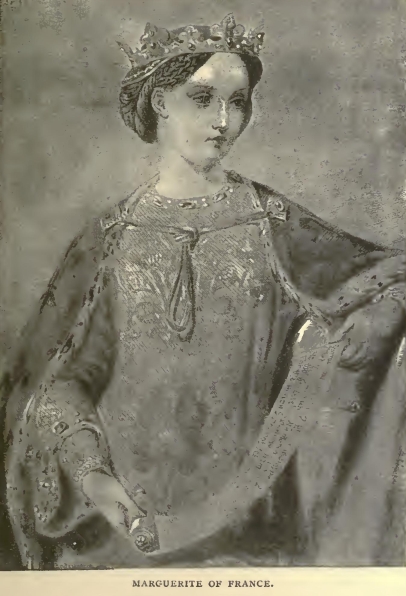
179was born. It was a boy, and Queen Marguerite gave him the name of Thomas, after the favorite English saint, Thomas à Becket of Canterbury.
The queen occupied Cawood Castle at that time, and during the four years she spent in that magnificent fortress, her husband was laying siege to one stronghold after another, until Scotland was subdued from sea to sea. Stirling Castle was the last one to yield, but when King Edward made his triumphal journey home to England, its brave commander, Wallace, was carried a captive in the royal train.
On their return to London, the king and queen gave a series of entertainments to celebrate the conquest of Scotland. One of the grandest tournaments ever witnessed in England took place at that time, at Westminster Palace, on which occasion Prince Edward and two hundred other noblemen were knighted. In 1308 the queen had another son. She named him Edmund, and he afterward became the Earl of Kent.
A. D. 1308. King Edward was on his way to Scotland in 1308, but fell ill before he reached the border. He lingered until the Prince of Wales reached him, and with his dying breath commanded his son, "to be kind to his little brothers, and, above all, to treat with respect and tenderness his mother, Queen Marguerite."
Much sorrow was felt at the death of their warrior king, but his wife mourned for the loss of the tender, affectionate husband Edward had always been.
A few months after his death she went to France to be present at the marriage of Edward II., with her niece, Isabella. On her return to England she lived in seclusion, devoting her time and money to deeds of charity. Marguerite died on the 14th of February, 1317, at the early age of thirty-six, and was buried at the Grey Friars church, a splendid building that she had founded.
A. D. 1317. 180 Her stepson, Edward II., had always loved her, and to show his respect for her memory, he not only had her pall draped with rich material of silk striped with gold, but erected a splendid monument besides.
Queen Marguerite is the ancestress of all the English nobility bearing the name of Howard, who unite in their veins the blood of St. Louis with the greatest of the Plantagenet kings.
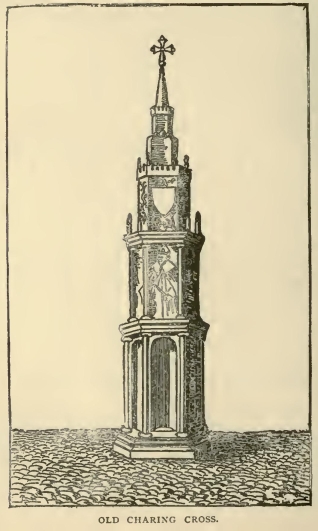
Isabella of France was a princess of the very highest rank, her father being Philip IV. of France, and her mother Queen of Navarre. But she was likewise one of the worst women that ever occupied the throne of England. She was born in 1295, and when only nine years of age was betrothed to Edward, Prince of Wales. At that time her father agreed to settle on her the sum of £18,000 for her marriage portion.
He was not rich enough to give her so much money, but he got possession of it by murdering and robbing the poor Knights Templars—a religious body first established at Jerusalem to protect pilgrims travelling in the Holy Land. Such ill-gotten gain could not be expected to bestow much pleasure or profit on the possessor of it.
When Edward I. was dying, he charged his son to lose no time in completing the arrangements for his marriage, and the prince had received such favorable reports concerning the personal charms of his lady-love that he hastened to obey. Before the king was buried he dispatched two earls to France to appoint the wedding day.
He was so much in love, that it is said he lost the kingdom of Scotland by hurrying away to get married when his presence in that country would have made him its sovereign.
He need not have been in such haste, for Isabella was scarcely fourteen years of age, and perhaps if he had waited 182until her mind was more matured, she would not have acted so unwisely as she did on several occasions afterwards.
Grand preparations were made at Westminster Palace for the reception of the young queen. The royal apartments were re-decorated and handsomely furnished, the gardens were newly laid out and planted with the rarest flowers, the fish-ponds were all cleaned out and freshly supplied, and Queen's Bridge was repaired. The royal ship called Margaret of Westminster was cleaned, painted, and newly fitted up under the king's personal direction for the comfort of his expected bride, and no trouble or expense was spared that could add to her pleasure.
When everything was ready, Edward appointed his favorite, Piers Gaveston, guardian of the country, and sailed, accompanied by Queen Marguerite, his stepmother, to meet his bride. He landed at Boulogne, where Isabella and her royal parents awaited him, and the next day the marriage was celebrated at the famous cathedral of that town.
A. D. 1308. Four kings and four queens were present, besides a larger number of princes and nobility than had ever met together on such an occasion, and the church presented an appearance of unusual magnificence. The bride's beauty excited the greatest admiration, and she was called Isabella the Fair. Had any member of that royal assembly been told that before the end of her life she would be known as the "She-wolf of France," he would not have believed it; appearances are often deceptive.
Festivities were kept up for nearly two weeks, then the newly-wedded couple went to Dover, where they were met by a large party of noble ladies and gentlemen who attended them to Westminster.
Among those who met them on their arrival in England was the Piers Gaveston whom Edward had left as guardian during his absence. This man was the cause of a great 183
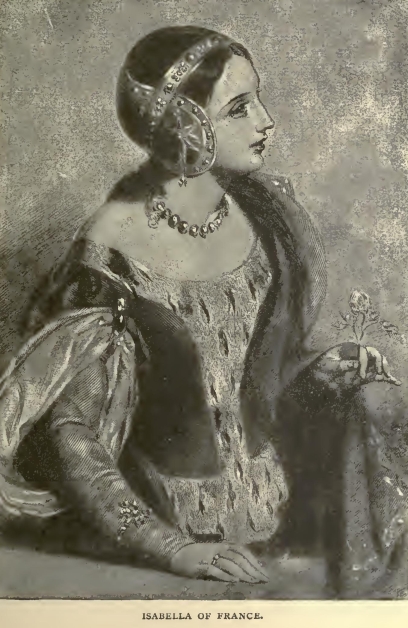
deal of trouble later because of his unbounded influence over the king, who, the moment he caught sight of his favorite, flew to him and threw his arms about his neck calling him "brother."
Isabella's outfit was magnificent. She had two superb solid gold crowns ornamented with precious stones, a large number of gold and silver drinking vessels, golden spoons, fifty silver soup-bowls, twelve large silver dishes, and twelve smaller ones. Her dresses were made of gold and silver stuff, velvet, and shot silk. Six of them were of the finest imported green cloth, six were of mixed and figured material, and six were scarlet; she had, besides, a supply of costly furs, four hundred and nineteen yards of towels, and six dozen nightcaps. She brought with her the tapestry for her own chamber, on which were embroidered in gold the arms of France, England, and Brabant.
Her father presented his son-in-law with a large number of the costliest rings, jewels, and other precious articles that could be found; but Edward was foolish enough to give all to Piers Gaveston, who had a perfect passion for finery.
Such conduct on the part of her husband made Isabella very angry, for she looked upon these handsome gifts from her father as part of her dowry, and naturally she objected very decidedly to having them handed over to a stranger whom she had already begun to dislike.
Just a month after the marriage the day was appointed for the coronation of the young king and queen, but the nobles informed Edward that unless his haughty favorite were banished from court they would not attend the ceremony. This threat signified that they meant to refuse their oath of allegiance, so Edward was very much alarmed, but promised that at the parliament, which was to meet immediately after the coronation, everything should be arranged 186to their entire satisfaction. But he gave fresh cause for complaint by bestowing upon Piers Gaveston the very highest office at the coronation,—that of bearing the St. Edward's crown. This made one of the royal earls so angry that he would have killed the favorite on the spot had it not been for the respect he felt for the young queen.
Gaveston had taken it upon himself to manage everything; and either his arrangements were badly made, or he was so unpopular, that nobody would obey him, for there was nothing but disorder and confusion from beginning to end. The crowd was so great that several people were injured, and one poor knight was knocked down and trodden to death. It was three o'clock in the afternoon before the coronation was over, and since early morning those engaged in the ceremonies had eaten nothing. The company were not seated at the banquet until after dark, and then every dish was so poorly cooked and so badly served that the hungry nobles were indignant, and felt that they could sooner have forgiven the favorite for any offence than this one. Isabella, too, was out of humor and exhausted; in short, all classes were dissatisfied, and many of the customary ceremonies had to be omitted because the usual masters of them were absent.
Whether by accident or design, several slights were put upon the young queen that made her French followers so angry that they went back home and complained to her father. Besides, Isabella sent a letter filled with complaints against her husband and his too-powerful favorite. This made the King of France use all his influence to strengthen the party of French barons who despised Gaveston, and even to induce the English ones to oppose him, too.
Probably, if the queen had been older, her beauty and talents might have enabled her to gain such control over 187her husband that his favorite's presence would have had less effect; but she was so young and inexperienced that, although she felt the importance of her position in the English court, Edward treated her like a child, and this vexed her beyond everything.
Gaveston was just the sort of a person who could, if he chose, lead so weak a young man as Edward II., and, unfortunately, he did so choose. He was very handsome, a perfect Adonis, remarkable for his courteous manners, courage, and sparkling wit. He would mimic and make fun of the peculiarities of the English nobles for the amusement of the thoughtless king, which was, of course, most displeasing to them, and he even went so far as to ridicule the queen. She complained to her father, who secretly induced the barons to insist upon the banishment of the favorite. Edward was at last compelled to yield, and promised to send him beyond the seas, but the wily Gaveston had recently strengthened his position by marrying a niece of the king, so he had himself appointed Governor of Ireland. Even his worst enemies own that he ruled that country very well.
But the following year he came back to England to attend a tournament. He brought such a magnificent retinue, and made so great a display, that the barons were jealous, and hated him worse than ever. Little did their dislike or their displeasure affect him, for he took his revenge by ridiculing them anew, and calling them most provoking names. The Earl of Pembroke was dark, thin, and sallow-complexioned, so he named him "Joseph the Jew;" the Earl of Warwick, who foamed at the mouth when in a passion, was "the Wild Boar of Ardenne;" and the Earl of Lancaster, who dressed peculiarly, was styled "the Stage Player." Thus he made fun of the entire party. But the insults were treasured up against him; 188and when, some years later, his day of reckoning dawned, not much mercy was shown him.
In the meantime he had stirred up such a storm that his royal master's throne tottered under him. The queen and her uncle, the Earl of Lancaster, with all the barons, formed a combination against him so strong that Edward dared not oppose it, and dismissed him to Guienne. At parting with his favorite, he lavished on him all his jewels, even the rings, brooches, and buckles that his young wife had presented him with at various times. This was one of the most foolish things Edward ever did, and nobody can blame Isabella for feeling offended.
However, she was at that time much beloved by her subjects, and, with Gaveston out of the way, we hear no more complaints until the year 1312, when, to her great displeasure, he turned up again. This time, with his usual lack of judgment, the king had recalled him, and made him his principal secretary of state. This was a very high office, for he had all the affairs of the country under his control, and so determined was he to keep Edward under his thumb that nobody could speak to him excepting through the secretary.
This arrangement gave great offence, and when the young queen saw how the royal favorite was injuring her husband by making the nation dislike him, and, what was still worse, by leading him into dissipation and other acts of folly, she angrily remonstrated with him. He forgot the respect due to her rank, and answered with contempt, whereupon she complained to the king. But instead of upholding his wife and punishing his insolent favorite, Edward treated the matter with the utmost indifference. Isabella was furious, and wrote to her father, the King of France, a letter filled with bitter complaints of her husband's coldness and neglect, saying, "that she was the most wretched of wives, and that Gaveston was the cause of all her troubles."
In reply, Philip secretly urged the peers to rebel, which they did at last, headed by the Earl of Lancaster, and determined to compel Edward to dismiss his hated secretary of state. Then began a civil war, the most horrible disaster that can overtake any country. Edward, evidently considering discretion the better part of valor, ran away with his wife and his favorite. They got as far as York, but the victorious barons entered that place in triumph, and the two fugitives sailed for Scarborough, leaving the poor young queen alone, although she entreated her husband with tears in her eyes to take her along.
Finding herself forsaken, Isabella retired to a remote castle, where she passed her time in visiting the sick and poor, which the following notes, found in the royal household book, prove:—
A.D. 1312. "October 9. To little Thomeline, the Scotch orphan boy, to whom the queen, being moved to charity by his miseries, gave food and raiment to the amount of six and sixpence."
And again:
"To the same orphan, on his being sent to London to dwell with Agnes, the wife of Jean, the queen's French organist; for his education, for necessaries bought him, and for curing his maladies, fifty-two shillings and eightpence."
While at this castle the queen received a message from her uncle Lancaster assuring her of her safety, and telling her that they were only fighting to get hold of Gaveston.
The king, in the meantime, having left his favorite in the strong fortress of Scarborough, proceeded to the midland counties to raise forces for his defence. But the men of England were so indignant at the treatment their young 190queen had received at the hands of her husband and his unworthy guide, that instead of obeying the orders they received, they rose en masse to storm Gaveston in his shelter. Being destitute of provisions, and knowing that he could not withstand a siege, he surrendered on condition that he was to be safely conducted to the king and allowed to speak with him freely before his trial.
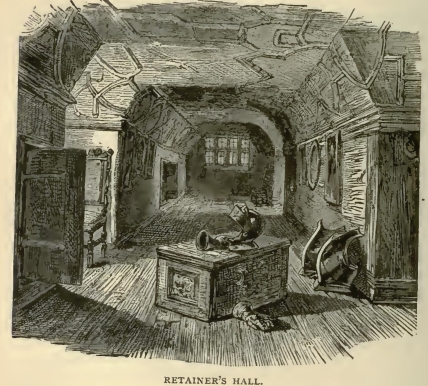
The barons, after solemnly swearing to observe this treaty, lost no time in bringing their prisoner to a sham trial. No mercy tempered their judgment of a man who had ridiculed and defied them, so they beheaded him then and there. Afterwards they enjoyed the extreme satisfaction of ransacking the luckless favorite's baggage, and 191found many of the crown jewels, a number of precious ornaments that had been presented to the king, and several articles of gold and silver plate from the royal household.
When Edward heard of the murder of his friend, he was beside himself with rage and grief, and swore vengeance on the heads of those who had committed the deed. He then joined the queen and went with her to Windsor, where their first child, afterwards Edward III., was born.
He was a fine healthy baby, and his parents, as well as the English nation, and the French nobles who were in the country were all delighted at this happy event. Four days after his birth the little fellow was baptized with great pomp, having no less than seven godfathers.
After this period, Isabella's influence over her husband was so strengthened that she brought about a reconciliation between him and his barons, and there was peace in the realm once more. Then the king and queen made a pleasure trip to Paris, where they spent two months enjoying the feasts and amusements which the magnificent and wealthy court of Philip provided for their entertainment.
At last, through the entreaties of the queen, the pardon to all those who had assisted in causing the death of Gaveston was published, and her excellent influence was felt in many ways.
During the next few years another prince and a princess were born, and on each occasion presents of great value were distributed by the royal pair.
In the household book there is mention of the king's gift of £333, "to Isabella, Queen of England, for the baptismal feast after the birth of the Lady Eleanora." There are also these entries, showing something of the fashions of the time:—192"To Vanne Ballard, for pieces of silk and gold tissue of fustian and of flame-colored silk for the making of cushions for the charrettes (carriages) of the queen and her ladies."
"To Robert le Termor, the bootmaker of Fleet Street, for six pairs of boots with tassels of silk and drops of silver gilt, price of each pair five shillings, bought for the king's use."
When the royal couple kept Twelfth Night their presents were very generous. To one of their subjects they gave a silver gilt pitcher with stand and cover; to another, for presenting bunches of new grapes, 10s.; to another, for bringing a box of rose-colored sugar, £2 10s.; to the mother of the king's fool, 10s., besides many others. To the Lady Mary, the king's sister, who was a nun, fifteen pieces of tapestry with coats-of-arms embroidered thereon, besides £26 on her departure from court, and to three of his knights for dragging him out of bed on Easter morning Edward paid £20.
A.D. 1317. During this fourteenth century there was the most dreadful famine ever known in England, which lasted nearly three years. On one occasion, when the king and queen were dining in public in the great hall of the palace at Westminster, a woman, wearing a mask, entered on horseback, rode straight up to the royal table, and handed a letter to the king. Thinking that it probably contained "some agreeable flattery", he ordered it to be read aloud. But, to his great mortification, it took him severely to task for his unkingly fancies, and blamed his bad government for all the calamities that had befallen the country. The woman was immediately arrested, and confessed that she had been employed by a certain knight. The person she named boldly acknowledged that he had written the letter, supposing that it would be read in private, and that the king would thus be informed of the complaints of his subjects.
It was about four years after this event that the queen first met Roger Mortimer, the man who exercised such an influence over her life. By this time the king had two new favorites named Despencer. They were father and son, and both were bitter enemies to Roger Mortimer.
The circumstances of Isabella's life so began to shape themselves at this period that from being a lovely, amiable peace-maker, she became a bad, cruel, dishonored traitor. 194In 1321 she set out on a pilgrimage to the tomb of St Thomas à Becket, proposing to spend the night at Leeds Castle, which was her own property. Baron Badlesmere had charge, of this castle, and lived there with his wife, so Isabella sent a marshal in advance to have everything put in order for her reception, not imagining for a moment that any objection could possibly be raised to her stopping there. But the baron was absent from home, and had charged his wife to protect the castle from any intruders whatsoever. Not knowing what might be the real object of the queen's visit, Lady Badlesmere did just the wrong thing when the royal messengers arrived, treated them with insolence, and said, "that the queen might seek some other lodging, for she would admit nobody within the castle without an order from her lord."
The messenger was still arguing the case with the lady when Isabella arrived at the castle gates with her train. A volley of arrows greeted the party, and killed six of the royal escort. The queen was obliged to seek other shelter for the night, but she was excessively angry, and complained bitterly to the king of the treatment she had received, begging him to avenge the insolence of Lady Badlesmere for daring to exclude her from her own castle. Badlesmere himself was foolish enough to send a most insulting letter to the queen in reply to the complaints that had been addressed to him concerning his wife's conduct, declaring that he heartily approved of what she had done. As this baron had held the high position of steward of the royal household before he was placed in charge of Leeds Castle, it is probable that the queen had done something to make him her enemy. Neither her Uncle Lancaster nor any of his associates seemed inclined to side with Isabella, so she determined to be revenged on them all, and would not rest until her husband promised to besiege the castle. 195A large force was soon gathered together before the walls, but Lady Badlesmere felt certain that, with the stock of provisions she had laid in, she could resist any attack, besides she expected all the barons to side with her. But she soon found out her mistake, and in a few days the Castle of Leeds was obliged to surrender, and eleven of its defenders, including Badlesmere, were hanged just outside the gate. Lady Badlesmere was sent to the Tower of London as a state prisoner.
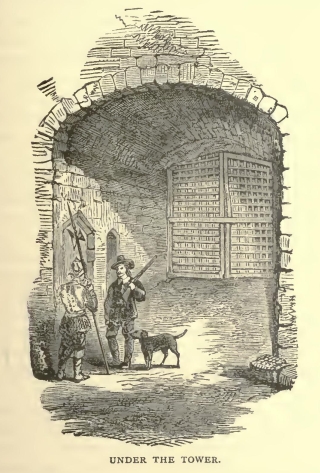
196Isabella now did all in her power to influence the king against the barons, instead of working to restore peace, as she once did. So he fought against them in person, and Lancaster was seized in the battle. He was sentenced by the king with the least possible delay, and beheaded a few hours later. The queen knew nothing about her uncle's sentence until too late, otherwise, it is to be hoped, she would have endeavored to save him. She was living in the Tower at the time, and it was there that her youngest child, the Lady Joanna, was born.
Roger Mortimer had been captured while fighting against the king, and imprisoned in the Tower under sentence of death; but he managed in some unaccountable manner to see Isabella, and get her interested in him. Her influence was all-powerful at that period, so, to the astonishment of everybody, she made Edward change Mortimer's sentence of death to imprisonment for life, though he had really commenced the civil war by a fierce attack on the lands of the Despencers. These men now hated the queen more than ever for assisting their enemy.
The following year Mortimer planned his escape from the Tower with the assistance of the constable and others. The queen herself provided a drink for the guard that put them into a heavy sleep. Then the prisoner, who had worked a hole from his dungeon into the kitchen of the royal apartments, climbed up the chimney and got out on the roof, along which he stealthily crawled to the Thames side, and descended by a rope ladder. The constable awaited him in a little boat, and rowed him across the river, where seven of his friends met him on horseback. With this guard he went to the coast of Hampshire, and pretended to sail to the Isle of Wight; but, instead of that, the fugitive got on board a large ship that had been engaged for him, and was soon landed in Normandy. Thence he went to Paris. When the king heard of the escape a great hue and cry was raised for Mortimer, dead or alive, but his whereabouts were not suspected, and he remained safely hidden in France.
The Despencers now began to influence the king as powerfully as Gaveston had done, and the queen commenced her plans for their destruction. She declared that they were the cause of all the recent bloodshed, and pretended that her Uncle Lancaster was a saint and a martyr, who only met his death by the advice of these favorites.
They had really committed one fault for which Isabella could not forgive them; they had caused her allowance to be curtailed, and no one ever offended her without paying dearly for it.
She had ceased to be lovable to the king, and so had lost her hold on him; but for this also she blamed the Despencers. Then she was deprived, by their advice, of her French servants and of all her possessions in England. She and her husband quarrelled to such an extent that at last they refused to see each other at all.
But Isabella was not meek enough to stand ill-treatment, so she complained to her brother, King Charles, who had succeeded to the throne of France. He wrote a very indignant letter to Edward, declaring his intention of seizing all the provinces of the French crown held by England. But Edward was not prepared for war, and neither he nor his ministers dared to go to France to face the angry brother of Isabella.
A.D. 1325. In this dilemma the queen volunteered her services as peace-maker, providing she might be allowed to go to Paris herself. Edward was only too happy to have the matter so easily settled, and the Despencers were delighted at the thought of getting rid of her. Isabella had a little plan of her own which she 198intended to carry out. The first step was a treaty of peace, which she arranged on her arrival in France, between her brother and the King of England. She was not at all surprised when the Despencers, who feared her influence over the weak mind of Edward, had dissuaded him from crossing the channel with her, even after his arrangements had been made. In fact, this was exactly what she had desired, because it enabled her to propose that her son, the Prince of Wales, should be invested with certain powers which she named, and sent in his father's stead. Both the king and the Despencers fell into the snare, and Isabella got the heir to the throne of England into her own hands.
As soon as Isabella found herself safe in France with her son, she laughed in her sleeve at the way she had hoodwinked her husband and his despised favorites. She was just where she wanted to be, and had no intention of returning to England until affairs there had changed to her complete satisfaction. She and her brother, King Charles, had concocted a treaty, it is true, but it was so written as to be almost incomprehensible, and to leave much matter for dispute between the two sovereigns.
Isabella made all sorts of frivolous excuses for prolonging her stay in Paris, where she was joined by her favorite Mortimer and all the banished English lords. Although these people were open enemies of her husband and his government, the wicked queen held councils and meetings with them, while she refused to have anything to do with the commissioners Edward had appointed.
The Bishop of Exeter, horrified at her disgraceful behavior, went over to England to inform the king of it, and to advise him to command her immediate return with the Prince of Wales.
Edward wrote several letters to his wife on this subject, 199but she paid no attention either to his entreaties or his orders. She declared openly "that it was the intention of the Despencers to cause her to be put to death if she returned to England." She knew better, but this statement aided her schemes, and she even succeeded in deceiving her brother, King Charles of France, who wrote King Edward "that he could not permit her to return to him unless she were guaranteed from the evil that was meditated against her by her enemies, the Despencers."
Edward's reply to this letter was manly and dignified. He begged his brother-in-law not to credit anything so false, but to send back his wife, of whom he wrote in kind, affectionate terms.
Isabella refused to go, and used her vile influence to encourage her son's disobedience in this matter also. Edward II. was very much hurt, and wrote frequently to his wife, reminding her of her duty, and taking her severely to task for her disloyal conduct.
It seems that during this time Isabella was treacherous enough to write most friendly letters to Hugh Despencer, even though she had openly pronounced him her enemy.
What offended King Edward most of all was that his son, whom he loved dearly, was not only kept away from him, but that he constantly associated with his mother's friend and adviser, Mortimer, who had proved himself a shameless, worthless traitor. Besides, Isabella had contracted a marriage between her son and a daughter of Count Hainault without the slightest mention of the matter to her husband, and had even gone so far as to receive the bride's marriage dowry, which was paid in advance, and used it for her own private expenses.
Edward's touching appeals took effect at last on the heart of King Charles, who began to treat his sister coolly and to urge her return to England. But she had gone too 200far to stop now, and her influence over her son was so great that she made him believe her life was in danger both at the hands of his father and the Despencers. The young man naturally felt that he must stay by his persecuted mother, and, if necessary, defend her.
Edward then applied to the Pope, who threatened to excommunicate King Charles if he did not immediately dismiss Isabella and her son from his dominions. The King of France was much alarmed at this threat, and did not hesitate to act upon it at once, particularly as he was so displeased with his sister that he had not spoken to her for a long time. He swore "that whoever should speak in behalf of his sister, the Queen of England, should forfeit his lands and be banished the realm."
Isabella had a cousin named Robert d'Artois, who was warmly attached to her. One night he woke her up to inform her of a conspiracy that he had just discovered to deliver her, the prince, the Earl of Kent, her husband's brother, and Mortimer over to King Edward.
The queen was so alarmed that she did not know which way to turn. Robert advised her to go to Germany, and place herself under the protection of William, Earl of Hainault, whose wife was her cousin. This plan struck her favorably, and the next night she left Paris with Mortimer, her son, and the Earl of Kent who always sided with her against his brother, King Edward.
After some days they got into the country of Cambray, and lodged at the house of a poor knight, who received the party with great pleasure, and entertained them in the best possible manner. The Earl of Hainault was a good, kind-hearted man, and felt very sorry when he thought of the queen's being obliged to seek refuge in a foreign country, so he sent his young brother, Sir John, with a few other gentlemen, to pay his respects to Isabella and conduct
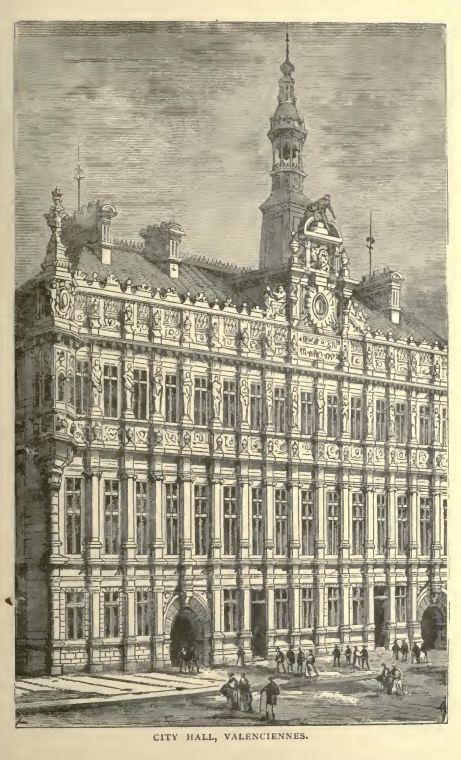
203her to Valenciennes, where he was then living with his family.
Sir John, being filled with the spirit of a true knight-errant, burst into tears when he heard Isabella's sad complaints from her own lips. "Lady," he said, "see here your knight who will not fail to die for you, though every one else should forsake you; therefore I will do everything in my power to conduct you safely to England with your son, and to restore you to your rank with the assistance of your friends in those parts; and I, and all those whom I can influence, will risk our lives on the adventure for your sake; and we shall have a sufficient armed force, if it please God, without fearing any danger from the King of France."
The queen would have thrown herself at his feet, but he would not allow it, and said, as he caught her in his arms:
"God forbid that the Queen of England should do such a thing! Madam, be of good comfort to yourself and company, for I will keep my promise, and you shall come to see my brother and the countess, his wife, and all their fine children, who will be rejoiced to see you, for I have heard them say so."
The queen answered: "Sir, I find in you more kindness and comfort than in all the world besides; and I give you five hundred thousand thanks for all you have promised with so much courtesy. I and my son shall be forever bound unto you, and we will put the kingdom of England under your management, as in justice it ought to be."
Then Isabella mounted her horse, and set off with her train to follow Sir John to Valenciennes. Many of the citizens of that town came forth to meet her, and she was received very graciously by the Earl of Hainault and his wife, who gave several feasts in her honor.
Isabella spent a week in this hospitable household, 204during which Sir John's sympathies were so aroused in her behalf that he obtained his brother's permission to accompany her to England. In the meantime he had written to certain knights in other parts of the country, beseeching them to arm in the cause of the distressed Queen of England. The expedition gathered at Dort, where the queen and her suite met them. Here they all embarked, but the fleet was tossed about by a tempest for several hours, and some of the ships were knocked to pieces. At last the queen was brought safely to shore near Harwich, and her knights and attendants built her a tent of carpets, and kindled a great fire of pieces of the wrecked vessels. Then all the horses and arms were taken from the ships which, the wind being favorable by that time, were sent around to the opposite coast. At daybreak the queen marched with her army to the next town, where she found the houses well stocked with all sorts of provisions, though the people had fled in terror, not knowing what to expect.
The advanced guard, meantime, marched through the country, seizing all the cattle and food they could get hold of, and spreading misery in every direction. When Isabella came along the owners complained bitterly, but she paid them most liberally for all they had lost. The money thus distributed made the queen popular, and the people were anxious to supply her with whatever she desired after that.
Although the king had forbidden his subjects to meet Isabella, when she arrived at Harwich a large number of knights, barons, and bishops were assembled to welcome her. Her force numbered two thousand seven hundred and fifty-seven soldiers, commanded by Sir John of Hainault, and Roger Mortimer commanded the English, who joined them after, they landed.
So many false stories had been circulated by the queen's agents of the persecutions she had endured from her hus205band and his barbarous ministers, and of the way she had been driven into a foreign land by plots against her life, that she was considered the most injured of wives and queens.
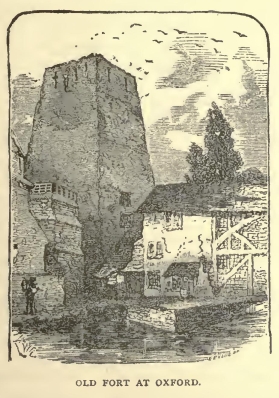
The common people were blinded by excitement, and flocked to meet her without stopping to inquire whether her cause were just or not. All the tales of her guilty conduct that had reached them from time to time they now believed to have been pure inventions of her enemies, the Despencers. No voice was raised against her though she came with her son, the Prince of Wales, attended by an outlawed traitor and a band of foreigners to raise a revolt against her own husband. It seems strange that such a wicked woman should have met with such success; but 206every Plantagenet in England was on her side, and she had many French relations there who always had thought her of more importance than the king.
Instead of taking measures to defend himself, Edward wrote pathetic letters to the Pope and to the King of France asking for aid, and issued a proclamation offering £1,000 for the head of the arch traitor, Roger Mortimer. The queen then offered a reward of double that sum for the head of the younger Despencer, and declared that her only motive in coming home was to deliver England from the king's bad advisers.
When Isabella attended church at Oxford in company with her son, Mortimer, and all her followers, the Bishop of Hereford preached the sermon and explained the queen's motive for taking up arms, concluding with this sentence: "When the head of a kingdom becometh sick and diseased, it must be taken off without useless attempts to administer any other remedy." It is shocking to think of the wife and son of a man so devoted to both, as King Edward certainly was, listening to such a murderous speech without expressing their horror and indignation. But the only effect of it was to increase the madness of the populace against the unhappy king, who, attended by the two Despencers and a few other friends, fled to Bristol, intending to seek refuge in Ireland.
His departure was the signal for a general uprising of the Londoners, who mobbed the Tower, and set all the prisoners free in the queen's name. Then Isabella pursued her husband with her army, which had largely increased, and laid siege to Bristol. The king shut himself up with the younger Despencer in the castle, much grieved to see how all his subjects had turned against him. The older Despencer was seized and brought before Isabella, who declared "that she should see that law and justice were 207executed on him according to his deeds."
"Ah, madam," he replied; "God grant me an upright judge and a just sentence! and that if I cannot find it in this world, I may find it in another."
The knight was ninety years of age when he made this reply, but that was of no consequence to Isabella; she had him in her power at last, and was determined to punish him. He was sentenced, and his execution took place within sight of his son and the king, who were still shut up in the castle. So alarmed were they at the old man's tragic fate that they endeavored to escape to Wales in a little boat. After tossing about for some days they were driven back by contrary winds to within a mile of the castle they had fled from. A knight, observing the efforts of the boatmen, rowed out in his own barge with a strong force to see what was the matter, and soon succeeded in capturing the king and his favorite, both of whom were delivered over to the queen as her prisoners.
Now Isabella's evil nature blazed out and showed her real character. She started with all her army for London, having caused Sir Hugh Despencer to be bound to the smallest and meanest horse that could be found, and dressed in his mantle of state, on which was embroidered his coat-of-arms. Thus was he led in mockery through all the towns they passed, his approach being announced by trumpets and cymbals. When they reached Hereford the royal party were received with great rejoicing, and stopped there to celebrate the feast of All Saints.
The unfortunate Hugh Despencer, who had eaten not a mouthful since the moment of his arrest, now became faint, and Isabella feared that he might succumb before reaching London. He was, therefore, brought to trial without further delay, and most cruelly put to death.
Several other gentlemen who had in one way or another 208offended either the queen or her friend, Mortimer, were executed in the same place.
When the army, which had been increased to an enormous size by volunteers by the way, arrived in London, great crowds flocked to welcome them, presenting costly gifts to Isabella and some of her followers.
On the 7th of January parliament met and decided to remove their absent sovereign, proclaiming the Prince of Wales King of England by the title of Edward III. When this was made known to the queen she pretended to be very much distressed, and actually forced herself to shed tears, though it was precisely what she had worked for. But she overacted her part, and her counterfeit tears so deceived her son that he made a solemn vow not to accept the crown unless his royal father should willingly resign it to him.
This was awkward; for how could a committee wait upon the king to ask him to abdicate? But young Edward adhered to his resolution, and a dozen commissioners were appointed by Isabella to demand of the fallen monarch his crown, sceptre, and the rest of the regalia.
They proceeded to Kenilworth Castle, where Edward was kept as a state prisoner, and in a cruel, heartless manner pointed out to him the errors he had committed as their reason for desiring him to resign his crown. Edward listened to the mortifying recital and wept bitterly. At length he replied, "that he knew he was punished for his many sins, and was grieved for having incurred the hatred of his people. He was glad his eldest son was so gracious in their sight, and gave them thanks for choosing him to be their king." Although the poor monarch had fainted during this interview, he failed to arouse the sympathy of the commissioners.
Edward II. was by no means a bad man, for his chief 209faults were those of judgment, and at times want of dignity, which led him to engage in boyish frolics, and occasionally to drink to excess.
A.D. 1326. On the following Christmas day, 1326, young King Edward, who was just fifteen years of age, was crowned in Westminster Abbey. Then twelve bishops and nobles were appointed to advise and assist the youthful sovereign in affairs of state. The queen offered no objection, but as she had the military power in her own hands she made Roger Mortimer her prime minister, and demanded an enormous sum of money for her own use. She sent presents and deceitful messages full of affection to her husband, who in return wrote to request the favor of being once more permitted to see her and his son. But Isabella was never softened towards him, though she was, to a great extent, the cause of his unfortunate situation. She was so thoroughly hard-hearted that, when she heard he was kindly treated at Kenilworth, she had him removed from one place to another under the care of two brutal fellows whose cruelties were too horrible to mention. One night, just a year after the queen's return, Edward II. was put to death by her order in Berkeley Castle, and buried privately. Then the nation became indignant; many of Isabella's friends deserted her when they found that they had been the tools of an artful, ambitious, depraved woman, and a strong party was organized to get rid of her. She had committed more crimes in one year than the late king and his ministers had done in twenty, though she pretended to be a reformer.
She was a cruel hypocrite, planning, with the slyness of a cat, the destruction of each member of the royal family. Knowing that the Earl of Kent was most miserable on account of the part he had taken in her proceedings, she caused somebody to tell him that his brother was not dead, 210but a prisoner at Corfe Castle. The earl employed a friar to inquire whether this was true.
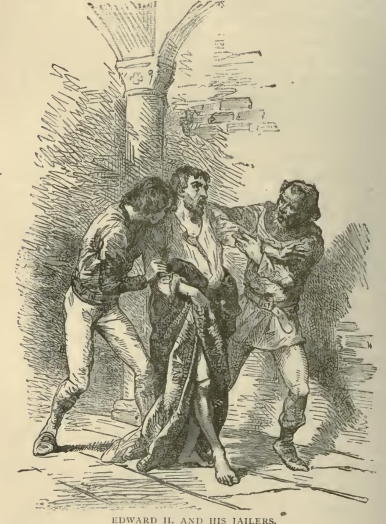
He was assured that it was, and had shown to him at a distance a person seated at a table so disguised as to resemble the dead king. The earl then went to the castle and requested the governor to conduct him to his brother's apartment. The governor did 211
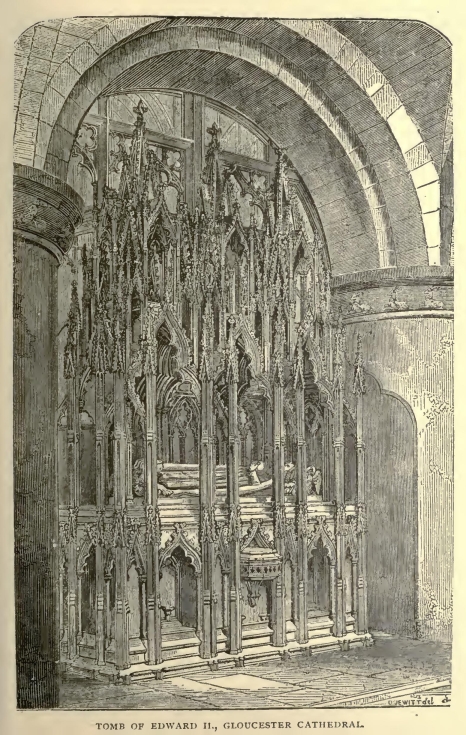
213 not deny that edward was in the castle, but said that he was not permitted to let any one see him, upon which the earl wrote a letter to be conveyed to the supposed prisoner. this letter was immediately carried to the queen, who used it as a pretence for the earl's arrest, and after an absurd trial he was unjustly condemned to die. His estates passed into the hands of mortimer's son.
By this time Roger Mortimer had made himself so offensive with his haughty display and his cruelty that the king had him arrested and locked up in the Tower. A few days later he was executed with several of his friends, and his body hung on the gallows at Tyburn for two days.
Having thus rid himself of his worst enemy, Edward III. ordered his mother to live at Castle Rising, where, with plenty of people to wait on her, and everything to make her comfortable, she passed her time quietly, having no chance to scheme or plot against the government.
There she remained for about twenty-seven years, receiving occasional visits from her son, who never permitted her name to be mentioned in his presence, excepting with great respect.
A.D. 1358. She died in 1358, and was buried by Edward III. with much ceremony at Grey Friars' Church, her body being attired in the uniform of that order of nuns.
A fine alabaster tomb was erected to her memory, the only inscription thereon being:
When Edward, Prince of Wales, was, with his mother, compelled to seek refuge at the house of the Count of Hainault (of which we have given an account in the story of Isabella of France), he fell violently in love with the count's second daughter, Philippa, and she returned his affection. She was only fifteen years of age, and he a few months older, but they formed an attachment that lasted throughout their lives. Philippa was a brilliant Flemish beauty, whose excellent heart and lovable disposition endeared her to all who knew her. Later, as Queen of England, she proved a blessing to that country by the wisdom and good judgment she displayed in encouraging manufactures and trade. But before she assumed that position she was doomed to many months of anxiety and uncertainty; for her young lover, after only a fortnight's enjoyment of her society, departed on the dangerous expedition of invading his father's kingdom. There was considerable doubt as to whether he would ever return, because not only were the affairs of his country in such a condition that he could not foretell what turn they might take, but the relatives of both the lovers might interpose many objections to their union.
It was not the custom in those days for the heir of England to acknowledge that he had made his choice of a wife without first consulting his parliament and councillors,
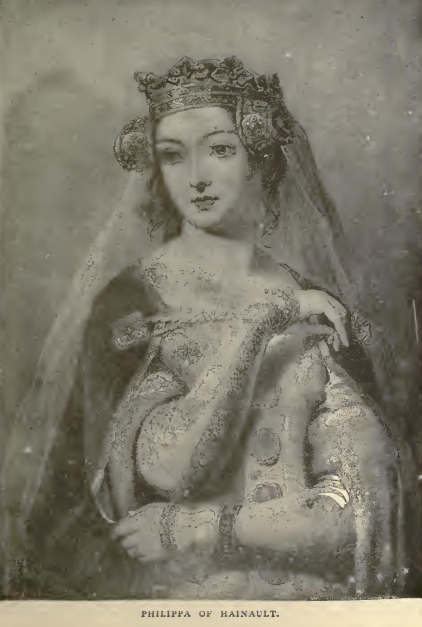
217but young Edward imparted his secret to his mother, and, as she had taken a great fancy to pretty Philippa, she promised to aid him as best she could. Therefore as soon as possible after her return home she led the public authorities to decide that one of the four daughters of the Count of Hainault would be the most desirable alliance for her son, but without naming which one. However, we may be very sure that the young man gave his own private instructions to his messengers, for they made no mistake in their choice, nor is it likely that he would risk trusting entirely to their discretion as to which of the young Hainault ladies would prove most worthy to become Queen of England.
The messengers applied first to Sir John, Philippa's uncle, who had been in England fighting the cause of the new king, and requested his assistance in the selection of a wife for their young sovereign. Sir John received them with all the honors he could lavish, and gave them the most sumptuous feasts and splendid entertainments of all sorts. After several days spent in this manner, he conducted them to Valenciennes, where they were equally well received at his brother's house. A special dispensation was required from the Pope, because the two mothers of the lovers were cousins; so messengers were sent to obtain it, which they did without much difficulty.
A.D. 1327. As soon as Edward heard that all necessary arrangements had been completed, he ordered the marriage ceremony to be performed at Valenciennes, though as he was engaged in a war on the Scottish border with the renowned Robert Bruce, he could not be present. In the absence of the bridegroom, the wedding must have been rather a tame affair, but there was no help for it, and preparations were made for a grand display. The costume and equipage of the bride were unusually costly and elegant, 218no expense or pains being spared to render the festival worthy of the wealthy country in which it was given.
Afterwards Philippa, accompanied by her Uncle John and a large retinue, proceeded to Dover, and then to London, where a solemn procession of the clergy introduced her into the city, and she was presented by the lord mayor with a service of silver worth three hundred pounds as a marriage gift. The city was illuminated, and there were great rejoicings, feasts and public entertainments of all sorts, that were kept up for three weeks after the bride's arrival.
She did not stay long in London, however, but hurried on to York to meet her husband, being received with honors at every town through which she passed. All the parliament and royal council assembled at the union of the young king and his bride, as well as a hundred of the principal nobility of Scotland, who came to conclude a final peace with England.
Nothing is said about the bride's marriage dowry, because the queen-mother had already got possession of it and spent it. She had besides so managed to get hold of the public funds that the young sovereign of England was nearly penniless. The following summer was passed by the new couple at Woodstock, the beautiful country residence which was the favorite home of Philippa so long as Isabella, the queen-mother, and Mortimer ruled the kingdom.
Sir John of Hainault returned to his native land laden with jewels and rich presents, almost all of his countrymen accompanying him. Among the few who remained behind was a youth named Sir Walter Mauny, whose office was to carve for Philippa. He became one of the first Knights of the Garter, an order established by Edward III., of which we shall hear later.
A.D. 1330. The coronation of the young queen did 219not take place for nearly two years after her marriage. All the customary duties were performed on that occasion, but the ceremony was remarkable for the absence of display on account of the emptiness of the treasury.
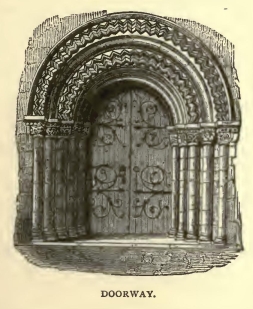
The queen-mother, with her favorite, Mortimer, had used up all the public funds for their own support, but young Edward was not going to stand such a state of affairs much longer, and before the close of the year he had liberated himself from his wicked mother's control and executed her favorite.
With the reins of government in his own hands, the young king, aided by his good and sensible wife, set to work to reform the abuses of his mother's reign and to establish most excellent and satisfactory laws.
Edward had a very violent temper, which would have led him to commit many an act of cruelty and injustice had it not been for the influence of his kind-hearted, virtuous wife.
A.D. 1330. 220Her eldest son, Edward, surnamed the Black Prince on account of the color of the armor he wore in battle, was born while she was living at Woodstock, and in celebration of that event a grand tournament was arranged to take place in London. Philippa, with all the noble ladies, was invited to attend. The preparations were on a much grander scale than usual, thirteen knights being engaged on either side. The arena was covered with sand to prevent the horses' feet from slipping; flags and banners were ingeniously arranged as decorations, and a temporary platform was erected and ornamented for the accommodation of the queen and her ladies. No sooner were they all seated than the scaffolding gave way, and they tumbled pell-mell to the ground. Fortunately the platform was not high, and nobody was hurt, but the ladies were terribly frightened, and, for a few moments, the confusion and excitement were very great.
The king flew into a perfect fury and vowed that the careless carpenters should instantly be put to death. This was rather a severe sentence, particularly as the damage was slight, and so Philippa considered it, for scarcely had she recovered from her fright than she threw herself on her knees before her angry husband, and pleaded with angelic sweetness for the pardon of the poor men. Edward soon became calm under the influence of her gentle voice and words, and forgave the offenders.
Up to this time all the wool grown in England had been sent to the Netherlands to be manufactured into cloth, and Philippa remembered what a source of profit and occupation it had been for her own country. She therefore set to work to establish a manufacturing colony at Norwich, and a letter was sent to John Kemp of Flanders, cloth-weaver, in which he is informed, "that if he will come to England with the servants and apprentices of his mystery, and with 221his goods and chattels, and with any dyers who maybe willing to accompany him beyond the seas, and exercise their mysteries in the kingdom of England, they shall have letters of protection and assistance in their settlement."
A.D. 1335. He came, and was the patriarch of the Norwich woollen manufactories. Philippa often visited the colony, which soon brought considerable wealth into the country, encouraging the work by her patronage, and, like a beneficent queen of the hive cherishing and protecting the working bees, she made a law that no woollen clothes should be worn except those made in England. Besides the occupation which she thus provided for hundreds of her subjects, this young queen displayed unusual foresight for a woman of her age in the tournament exhibitions she held at Norwich, by which she gave the citizens assurance of gallant protection on the part of the nobility in case of need. These festivities brought together the workers and the defenders of the nation, and Queen Philippa set them the example of mutual respect. Edward III. did not often accompany his wife on her visits to Norwich, but usually passed the time of her absence with his unhappy mother at Castle Rising.
In 1333 Edward again commenced a furious war on Scotland. His faithful Philippa went with him as far as she could, and while he laid siege to Berwick took up her residence at Bamborough Castle. It was during this siege that the king committed a deed so atrocious that it must forever be a dark stain upon his character. Douglas, the defender of Scotland, left King Edward before Berwick and made a forced march to the castle that contained Queen Philippa, hoping to frighten the king and to force him to fly to her assistance. But he was mistaken, for Edward had too much confidence in the strength of the castle and the firmness of his wife to budge. It is probable though 222that this attempt to capture Philippa aggravated his ferocious temper and prompted him to the cruel deed to which we have referred. The two young Seatons, sons of the Governor of Berwick, had been taken as prisoners, and the king had them put to death because the father refused to surrender the town. His object was to take Berwick by a desperate blow and fly to the relief of his queen, and he succeeded, for the poor grief-stricken father of the Seatons was so perfectly stunned by the infamous murder of his boys, that he could offer no further resistance. Douglas and Edward fought not far from Benwick, where the former was killed and the king entered the town in triumph with Philippa at his side.
During the queen's residence in the north of England quite an amusing circumstance occurred. King Edward had returned from Scotland, and his wife, who had been separated from him for a long time, went as far as Durham to welcome him back. He lodged at St. Cuthbert's Priory near the castle. After supper the queen entered her husband's apartments, where, feeling fatigued from her journey, she hoped to have a good night's rest. Scarcely had she undressed than there came a loud knocking at her door. Upon opening it several monks presented themselves with a pathetic appeal to her not to offend their holy patron St. Cuthbert, who during his life avoided the fair sex and would be dreadfully angry if one of them, no matter how high her rank, should sleep beneath the roof of his convent. The pious Philippa was distressed at the idea of having unintentionally displeased the saint, and fled in her night-clothes to the castle, which was fortunately not far away.
A.D. 1336. About this time Count William of Hainault died of gout, and Edward thus lost the liberal supplies that he had always counted on from that source. The English 223people of that period chose always to be at war; but expected their monarchs to pay the costs. Edward was reduced to such extreme poverty that he was forced to pledge his wife's crown for twenty-five hundred pounds, at the beginning of his long war, and during his whole reign the crown jewels were seldom out of pawn. He had been engaged in a naval battle with France since his victories in Scotland, and in 1340 found himself bankrupt. By that time Philippa had several children, and was residing in the Tower, where she devoted herself to their education with her usual good sense.
Now we must see how Edward was led to establish the Order of the Garter. Wark Castle was under the guardianship of the Earl of Salisbury, who, while King Edward was encamped near Berwick, was taken prisoner. The Countess of Salisbury was then left alone at the castle with her young nephew, and it was besieged by the King of Scotland. Becoming alarmed at the approach of danger she sent the youth to seek assistance of Edward who immediately replied in person. At his appearance the siege was raised, and the countess, to prove her gratitude, ordered the gates to be thrown open, and received the king with great honors. She courtesied low, thanked her preserver warmly for his prompt aid, and conducted him into the castle, where he and all his knights and attendants were entertained sumptuously. Everybody was struck with the countess' noble deportment and affable behavior, and the king was charmed with her grace and beauty.
While he was dancing with her after the banquet she gave in his honor she unfortunately dropped her garter, and was overcome with confusion, but Edward with his usual gallantry picked it up and, holding it aloft, said: "Honi soit qui mal y pense,"
"evil to him who evil thinks." In commemoration of this event, and out of compliment to the 224countess, he established an order called the Knights of the Garter. The queen attended the first meeting of this order at Windsor, on which occasion all the knights were accompanied by their ladies, who wore the badge with the motto the king had proposed as a bracelet on their left arm. The object of this order of knighthood was to assist distressed ladies, and after it was well established the king announced his intention of going to the aid of the Countess de Montfort, who was trying to uphold the cause of her infant son against the whole power of France, while her husband was a prisoner in the tower of the Louvre. He appointed Philippa regent, with the Earl of Kent as her assistant, and departed for France with his son Edward, then only sixteen years of age. At the battle of Cressy, which had occurred during the siege of Calais, this boy proved himself a true hero.
During the king's absence, David of Scotland advanced into England and set fire to the suburbs of York. Philippa hastened in person to the relief of her northern subjects, and took up her residence at Newcastle. On the following day the King of Scots, with forty thousand men, halted within three miles of the town, and sent word to the queen that if her men were willing he would wait and give them battle. She replied: "that her barons would risk their lives for the realm of their lord, the king."
When her army drew up in order of battle she rode among them mounted on her white charger, entreating the men "to fight manfully for the love of God." They promised to do the utmost in their power, and the queen withdrew after commending them "to the protection of God and St. George."
Philippa had the moral courage becoming in a woman, and as soon as she had done all that a great queen could do for the encouragement of her army, she left the battlefield, 225which was no place for her, and retired to pray for her invaded kingdom.
Her army gained the victory, and King David was taken prisoner by a squire named John Copeland, who rode off with him and refused to give him up. This displeased Philippa, who the next day wrote to the squire commanding him to surrender the King of Scots to her forthwith. He replied, "that he would not give up his royal prisoner to a woman but only to his own lord, King Edward, for to him he had sworn allegiance and not to any woman."
The queen was troubled at this obstinacy, and wrote all about it to the king, who ordered John Copeland to come to him at Calais immediately. When Edward saw the squire he took him by the hand, saying: "Ha! welcome my squire, who by thy valor hast captured mine adversary, the King of Scots."
John Copeland fell on one knee and replied: "If God out of his great goodness has given me the King of Scotland, and permitted me to conquer him in arms, no one ought to be jealous of it, for God can, if He please, send His grace to a poor squire as well as to a great lord. Sire, do not take it amiss if I did not surrender King David to the orders of my lady queen, for I hold my lands of you and not of her, and my oath is to you and not her, unless indeed through choice."
The king thanked him warmly for his valor, and ordered him to go home and hand his prisoner, the King of Scotland, over to Philippa, adding, "and I assign lands as near your house as you can choose them to the amount of five hundred pounds a year for you and your heirs." The squire obeyed, and the excuses he made were so acceptable to the queen that she bore him no ill-will. She ordered King David to be conducted in grand procession through the streets mounted on a tall black war-horse, so that every one 226might know him and recognize him in case he attempted to escape, and then to be locked up in the Tower of London. Next day, accompanied by a large number of her ladies, she sailed for Calais, where Edward gave a magnificent fête to welcome his victorious queen.
Meantime the defenders of Calais were so much reduced by famine that they offered to surrender. At first Edward resolved to kill them every one, but in compliance with the request of Sir Walter Mauny, one of the Knights of the Garter, who begged him to be merciful, he softened somewhat, and sent this message: "Tell the Governor of Calais that the garrison and inhabitants shall be pardoned excepting six of the principal citizens, who must surrender themselves to death with ropes round their necks, bareheaded and barefooted, bringing the keys of the town and castle in their hands."
Sir Walter carried the cruel verdict to the governor. He wept bitterly; he was compelled, however, to break the dreadful news to the inhabitants, who at the loud peals of the alarm-bell assembled in the town-hall. When they heard the king's message, they broke into loud lamentations of grief and despair. The hardest heart could not have failed to be touched by such a scene. Men stared at each other, scarcely knowing what to say or do. After a pause, Eustace St. Pierre, the most wealthy citizen of Calais, arose and offered himself as one of the six to make the horrible sacrifice for his fellow-townsmen. Five others followed this noble example amid the blessings and thanks of the assembly, and the number was completed. Mounted on a horse, the governor slowly and solemnly conducted them to the barriers, where Sir Walter Mauny awaited them, and said: "I deliver up to you, as Governor of Calais, these six citizens, and swear to you they are the most wealthy and respectable men of the town. I beg of you, gentle sir, that
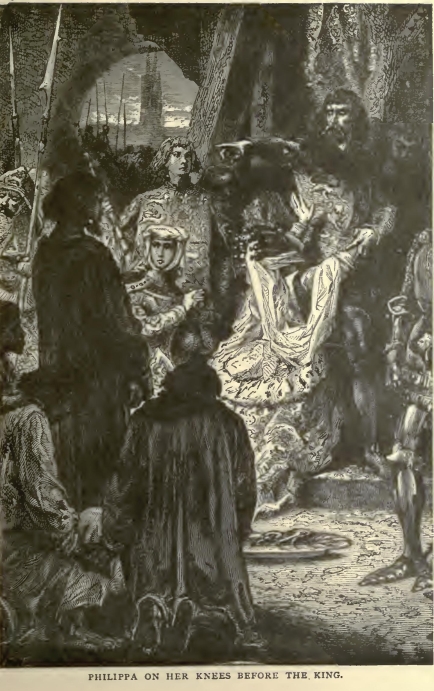
229you would beseech the king that they may not be put to death."
"I cannot answer what the king will do with them," replied Sir Walter; "but you may depend upon this, that I will do all I can to save them."
All the English nobles wept at the sight of these six gentlemen as they knelt before the king and begged for compassion, but Edward eyed them angrily and ordered their heads to be struck off forthwith. Some of the knights entreated the king to be more merciful, but he would not listen to them, and sternly repeated his order.
At that moment Philippa appeared. Falling on her knees at her husband's feet, she looked up into his face with tears in her eyes, and said: "Ah, gentle sir, since I crossed the sea with great peril to see you I have never asked you one favor; now I most humbly ask as a gift, for the sake of the son of the blessed Mary, and as a proof of your love to me, the lives of these six men."
King Edward looked at her for some time in silence, then replied: "Ah, lady, I wish you had been anywhere else than here; you have entreated in such a manner I cannot refuse you. I therefore give them to you—do as you please with them."
Philippa then conducted the poor men to her own apartments, where their halters were removed from their necks and they were served with an excellent dinner. Afterwards she saw that they were conducted out of the camp in safety. The king entered Calais and took possession of the castle, where proper lodgings had been prepared for himself and his queen.
A.D. 1348. After their return to England, in 1348, an awful epidemic, called the "black death," visited the kingdom and carried off the king and queen's second daughter, Johanna, a princess only fifteen years old, but blessed with 230so many charms that a number of minstrels had chosen her for the subject of their verses. What made the event more than ordinarily sad was, that she was engaged to be married, and her funeral procession occurred at the very time that had been fixed for the wedding ceremony. This was a great sorrow to the royal couple. So dreadful was the pestilence that every household in London was afflicted by it, and in some families all the members died..
Before this horrible visitation Philippa had turned her attention to the working of the coal mines in England, which, like the cloth manufacture, proved an industry of immense profit to the nation, besides enriching many private individuals. Wherever this great queen turned her patronage, prosperity was sure to follow, and her subjects loved and trusted her.
A.D. 1357. In 1357 the English gained a grand victory at Poictiers, and the Black Prince returned with many prisoners. Among them was one Bertrand Du Guesclin. One day when Queen Philippa was entertaining at her court a number of the noble French prisoners, the Prince of Wales proposed that Du Guesclin should name his own ransom, adding that whatever sum he mentioned should set him free. The warrior named a hundred thousand crowns. The Prince of Wales was astonished at such a sum, and asked how he could raise it. "I know a hundred knights," replied Du Guesclin, "in my native Bretagne, who would mortgage their last acre rather than have me languish in captivity or be rated below my value. Yea, and there is not a woman in France now toiling with her distaff who would not devote a year's earnings to liberate me, for well have I deserved of their sex. And if all the fair spinners of France employ their hands to redeem me, think you, prince, that I shall abide much longer with you?"
Queen Philippa, who had listened to this conversation
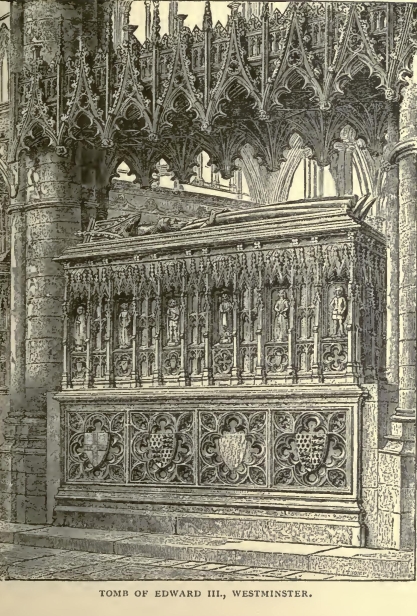
233with great attention, now spoke: "I name," she said, "fifty thousand crowns, my son, as my contribution towards your gallant prisoner's ransom; for though an enemy to my husband, a knight who is famed for the courteous protection he has afforded to my sex deserves the assistance of every woman." Du Guesclin threw himself at the feet of the generous queen, saying: "Ah, lady, being the ugliest knight in France, I never reckoned on any goodness from your sex excepting those whom I protected with my sword, but your bounty will make me think less despicably of myself." Philippa, like all great women, honored those men who paid most reverence to her own sex.
After a lingering illness, she sent for the king one day when she knew that death was approaching. Taking his hand in her own, she asked him to grant her three requests. He promised in advance with tears rolling down his cheeks. "My lord," she said, "I beg you will fulfil whatever engagements I have made with the merchants for their wares, as well on this as on the other side of the sea; I beseech you to fulfil whatever gifts or legacies I have made or left to churches and to all my servants, whether male or female; and when it shall please God to call upon you hence, you will choose no other sepulchre than mine, and that you will lie by my side in the cloisters of Westminster Abbey." The king replied: "Lady, all this shall be done."
A.D. 1369. Shortly after she died, and with her life departed the happiness, good fortune and even respectability of Edward III. and his family. Where Philippa had once promoted virtue, justice and wisdom, scenes of folly, strife and sorrow now followed at court. One of the chroniclers of the time says: "I firmly believe that her spirit was caught by holy angels and carried to the glory of Heaven, for she had never done anything by thought or deed to endanger her soul."
The marriage of King Richard II. with Anne of Bohemia gave general satisfaction in England, and proved a happy one in every respect. At the coronation, which followed a few days after, the young bride received the title of "the good Queen Anne." It pained her to see the distress of the unhappy peasantry caused by the bloodshed and barbarous executions that had been the result of Wat Tyler's insurrection. She compared their miserable lot with her own bright and joyous one, and was thus prompted to ask a great favor of the king. Having first convinced herself that she would not be refused, she demanded a general pardon for all malefactors. Her mediation came in time to save the life of many an unfortunate creature, and sent a thrill of happiness through scores of afflicted households. No wonder then that she was called "good Queen Anne," but what was better still, she never forfeited the title.
Queen Anne was not a beauty, but at the age of sixteen, when she became King Richard's wife, she was a blooming, healthy girl, with a clear, fresh complexion and bright eyes. She had a high, narrow forehead, long upper lip and fat cheeks, but the remarkable head-dress she wore neutralized these defects somewhat. It was a cap two feet high and equally wide, scooped out at the top so as to leave two high points resembling horns. This structure was made of wire and pasteboard, covered with a silky gauze. Though
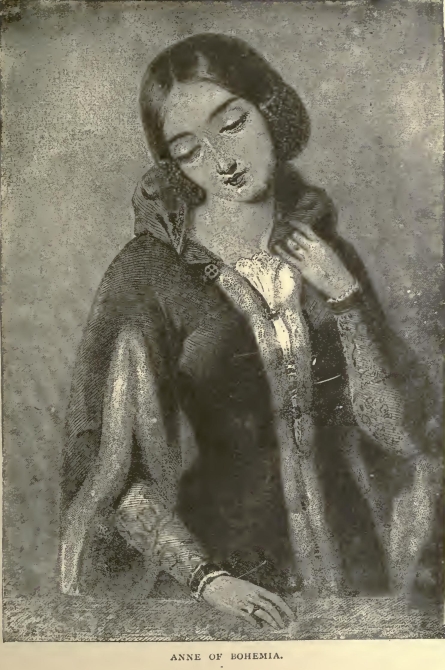
237hideously ugly and excessively uncomfortable, it was universally adopted by the English ladies in compliment to the queen, whose taste must have been somewhat defective if she was responsible for the device or crest she used, and required all her knights to wear at tournaments. It consisted of an ostrich, that most ungraceful of birds, with a bit of iron in his mouth. But Queen Anne introduced two articles into England that were no doubt gratefully received; one was the ordinary pin which we of the present day consider indispensable; the other was the side-saddle, not such as we are accustomed to, but a bench with a step suspended on which the rider's two feet were placed. This mode of riding may have been comfortable, but the horse had to be led by a groom because it was impossible for a lady to handle the reins herself.
A.D. 1384. At a festival of the Order of the Garter, in 1384, Queen Anne wore a robe of violet cloth lined with fur, with a hood of the same material faced with red. All her ladies were similarly attired. The king, who was quite a dandy, wore on that occasion, a coat embroidered in precious stones that cost thirty thousand marks. In this reign the shoes had long-pointed toes of an absurd length fastened to the knees with gold or silver chains, that must have been quite an annoyance to the wearer. But Richard II. was very luxurious in his tastes and so fond of spending money, that extravagant costumes were invented to please him, regardless of taste or convenience.
Anne of Bohemia did not spend all her time in frivolous amusements, for she read the Scriptures in her native tongue, and may be considered one of the mothers of the Reformation. It is possible that she may have been influenced by her mother-in-law, Joanna, the Princess of Wales, whom she loved very much, but certain it is that when John Wickliffe was in danger of his life, at the council of 238Lambeth, in 1382, both these royal ladies implored King Richard to aid in saving that reformer's life.
A war in Scotland called the king from home when he had been married a little over a year, and while he was away, his half-brother, John Holland, murdered Lord Stafford. The cause of this dreadful crime was jealousy. Stafford was a soldier of such high and noble character that he was a great favorite with the whole English army, and so chivalrous that the queen called him "her knight." It was when on his way with messages from the king to Anne that the encounter, which resulted in the death of the honored earl, took place. John Holland had noticed him, for many months, with increasing envy, which led him, at last, to slay one who had not given the slightest provocation for a quarrel. The father of Stafford was so distressed at the atrocious murder of his dearly-beloved son, that King Richard, prompted by the old man's demand for justice, vowed his brother's life should pay the forfeit of his deed. Meanwhile Holland had fled to the shrine of St. John of Beverly, and kept out of the way until the king returned from Scotland. Then Joanna, Princess of Wales, mother of Richard and John Holland, pleaded, with tears and lamentations, to one son for the life of another. Before it was granted, she died, and the king, unable to refuse her last request, pardoned the criminal, who started, at once, on an atoning pilgrimage to Syria.
The queen was called upon to act as mediator again in 1387, after the defeat of the royal troops by the Duke of Gloucester and young Henry of Bolingbroke. The Archbishop of Canterbury was then sent to the king to propose a treaty of peace, but was absolutely refused admittance to his majesty's presence until the queen persuaded her husband to yield. After the interview the royal household removed from Bristol, where it had been established for several months, to London.
and actually went on her knees to plead for the life of John Calverly, one of her esquires, but to no avail. That parliament was called "the merciless," and merited the title.
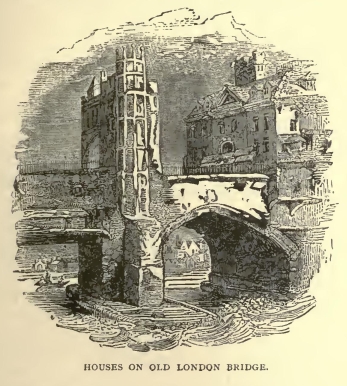
The succeeding two years were passed by the royal couple at Shene, a favorite summer residence because of the beauty of the surrounding landscape.
A.D. 1389. At the meeting of parliament in 1389 239the Duke of Gloucester, with his adherents, established a reign of terror that made fidelity to the king and queen an offence. Several members of Queen Anne's household were selected as victims, principally because they favored the cause of the Reformation and read the works of Wickliffe and Lollard. The queen spared no pains in trying to save her friends, ard 240asked them, "how old he was."
"Twenty-two," was the reply, whereupon he declared that his ancestors had been considered of age much earlier, and it was therefore his intention to submit to control no longer. A sort of recoronation then took place at St. Stephen's Chapel, when the nobility renewed their oaths to the young sovereign, who thenceforth governed the kingdom himself.
A splendid tournament was held in honor of this event, over which Queen Anne presided. Sixty of her ladies, mounted on fine horses, each led by a knight, rode, to the sound of the trumpets, and attended by a train of minstrels, through the streets of London. When they arrived at the tilting-grounds at Smithfield, they passed before the queen, who was already seated on a richly decorated stand, then placed themselves on either side of her. The prizes consisted of a richly jewelled clasp and a gold crown, which the queen presented to the victors with her own hands. At the close of the match, a fine banquet was served, succeeded by dancing, which was kept up until a late hour in the night.
A.D. 1392. In 1392 King Richard applied to the citizens of London for a loan of a thousand pounds. It was refused, but a wealthy Italian came forward and offered the whole of the sum, whereupon a mob set upon the unfortunate money-lender and tore him to pieces. Such a formidable riot was the result of this outrage that Richard took away the city charter and removed the law courts to York. This was a dilemma that had not been counted on, and occasioned so much distress and disturbance that Queen Anne was again called upon to act as mediator. This time she merely persuaded her husband to make a public
passage through London with her, trusting to the citizens to do their part, which she would follow up with her request at the proper moment. 241The king, with his escort, appeared first in the procession, then followed the queen and her ladies. She wore her crown, a robe of rich velvet, and a large collar of precious stones that blazed in the sunlight as she moved along. The procession halted at Southwark bridge, where it was welcomed by the lord-mayor and other authorities, followed by representatives of every branch of trade carrying various devices. There the king was presented with a pair of snow-white horses, covered with trappings of gold cloth to which silver bells were attached. The queen received a beautiful white palfrey, and after listening to a long speech by the lord mayor, the procession moved on. All the streets through which they passed were hung with flags, banners and rich tapestry, the public fountains flowed with wine. At different points bands of music and singers were stationed, the latter strewing the path with fresh flowers as the royal couple approached. Some rare and valuable gifts were presented, among which was a tablet set in jewels with the crucifixion engraved thereon. The king took it in his hand and said: "Peace be to this city!" Another was handed to the queen bearing a request that she would not fail to plead for the king's pardon. She cast her eyes over it and said, with a confident air, "leave all to me."
On arriving at Westminster Palace, the king entered first, and proceeding to the great hall, mounted the throne, sceptre in hand, and awaited the arrival of the queen and the rest of the procession. After all had assembled, her majesty knelt at the feet of her royal spouse and in a firm, clear voice made an humble and loving appeal that the charters and liberties of his penitent subjects might be restored.
"Be satisfied, dearest wife," answered Richard, taking her hand and raising her from her lowly position, "loth should we be to deny thee any reasonable request. Meantime ascend, and sit beside me on my throne, while I speak a few words to my people." 242His majesty then addressed the lord-mayor, thanked him for the exhibition of loyalty that had been made that day, as well as for the costly presents made to himself and his wife, bade him keep the peace of the city, and handed him back the key and sword of his office. This reconciliation cost the city ten times as much as the loan their sovereign had required. King Richard was preparing for a campaign in Ireland in the June of 1394 when his beloved wife was taken from him. She died at Shene, and in the bitterness of his grief, unable to bear the sight of the palace in which he had spent so many happy hours with his late companion, Richard had it destroyed.
The body of Anne of Bohemia was carried in grand procession to London and buried at Westminster.
King Richard went to Ireland shortly after, and frequently in the council-chamber of Dublin when anything recalled his "good Queen Anne" to his thoughts he suddenly would burst into tears and leave the room.
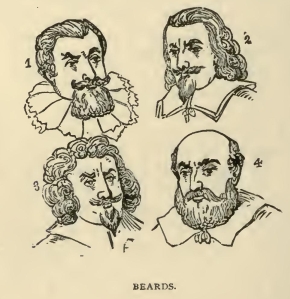
It seems strange that when Richard II. reached the age of thirty he should have had a fancy to share his throne with a child of nine, yet that was the age of Isabella of Valois, when he married her.
She was the eldest daughter of Charles VI. of France and the wicked Isabeau of Bavaria; but fortunately she inherited nothing from her mother but her beautiful dark eyes and clear olive complexion; her goodness and lovely character she got from her father.
When Richard was told that Isabella was too young for him, he replied: "that every day would remedy the deficiency of age, and her youth was one of his reasons for preferring her, because he should educate her to his own mind, to the manners and customs of the English; and that, as for himself, he was young enough to wait for her."
A.D. 1396. When the English ambassadors waited on Isabella to solicit her hand for Richard, one of them dropped upon his knees and said: "Madam, if it please God, you shall be our lady and queen." Without any prompting, the little maid replied; "Sir, if it please God and my lord and father that I be Queen of England, I shall be pleased thereat, for I have been told I shall then be a great lady."
Her appearance and manners were very pleasing, and 244from the time when it was proposed that she should marry Richard, she began to practise how to behave as queen, though she could not prepare herself for the sad experience that awaited her in that exalted position.
King Richard went to Paris, attended by a retinue of the first noblemen of his realm, to claim his little wife. At a magnificent dinner given by the King of France, the last of a series of entertainments that had been held in honor of his royal guest, Isabella was presented to her future lord. Then, attended by her parents and the whole court, she was conveyed in a rich litter to Calais, where the marriage ceremony was performed by the Archbishop of Canterbury. "The little queen," as Isabella was called from that time, made a public entry into London a few days later, when many rich and beautiful gifts were presented to her.
The bride's marriage portion consisted of 800,000 francs in gold. Her trousseau was magnificent; among the garments was a robe and mantle such as had never been seen in England for costliness. It was composed of crimson velvet, embossed with solid gold birds, perched on branches of real pearls and emeralds. Down each side was a border of miniver, there was a cape and hood of the same fur, and the mantle was lined throughout with ermine. Another robe was light blue velvet, embroidered with pearl roses; the little lady had besides coronets, rings, necklaces, and buckles worth a large sum of money and beautiful enough to delight the heart of any girl. Her bedroom curtains were of red and white satin with embroidered figures. Isabella was crowned at Westminster in 1397, when she was just ten years old; then she went to reside at Windsor, where her education was continued under the guidance of Lady de Courcy.
King Richard made frequent visits to his little wife, each
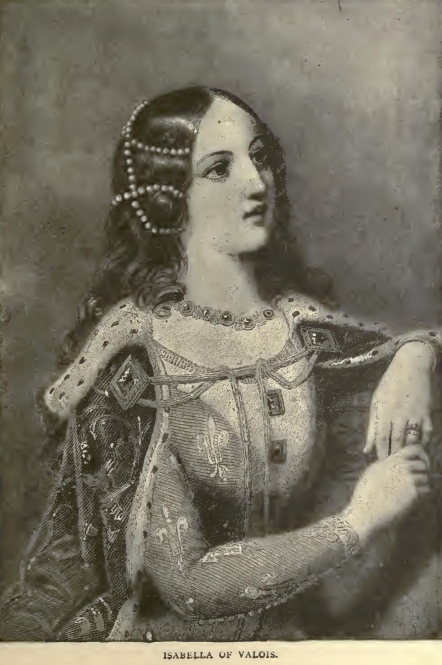
247one being the occasion of a holiday from study, and of a great deal of pleasure to the child who anticipated the appearance of her lord with no little impatience. Richard was always courteous and gentle in his manners towards ladies, and had a lively disposition, which rendered him a very congenial companion; besides, he dressed with such exquisite taste that the admiration he inspired in the heart of Isabella warmed into an affection that she never ceased to entertain for him as long as he lived.
When King Richard went to France to claim his bride, he spent so much money that he found himself deeply involved in debt. This led to a fierce struggle with the party headed by his uncle, the Duke of Gloucester, and the Earl of Arundel. At last Richard would bear it no longer, so he managed to rid himself of both his opponents. This he did by having the duke treacherously murdered, and the earl illegally executed.
But Richard was not accustomed to such cruel deeds, and his conscience troubled him to such a degree that he would often start up from his bed at night and cry out in horror: "That his bed was covered with the blood of the earl." The sudden death of Roger Mortimer, lord deputy of Ireland, to whom Richard was warmly attached, called him to that country to quell the rebellion that ensued.
Before his departure he went to Windsor to bid farewell to Isabella; while there he dismissed Lady de Courcy on account of excessive extravagance, and appointed his widowed niece, Lady Mortimer, in her stead, as governess and first lady of honor to his young consort.
The parting scene between the royal couple was very touching, the king lifting his wife up in his arms and kissing her repeatedly while offering words of hope and comfort.
Henry of Bolingbroke, who had been absent from England 248for several years, returned while Richard was away,—a most unfortunate circumstance for the royal cause. The Duke of York, who acted as regent in the king's absence, was alive to the little queen's position, and hurried her off to the fortress of Wallingford.
Attended by sixty thousand fighting men, Henry of Bolingbroke marched through England and presented himself before the very gates of Flint Castle, where Richard, with a handful of faithful knights, had fortified himself. Upon Henry's boldly demanding admittance the king agreed to allow him, with eleven others, to pass the wicket of the castle. But it was soon evident that any such precaution was unnecessary, for on looking out of the window the king beheld the army that had come to besiege him, and surrendered himself at once.
While King Richard and Henry of Bolingbroke stood in the courtyard of the castle waiting for their horses, Math, the beautiful greyhound that always accompanied the king when he rode out, and would never follow nor notice anyone else, suddenly dashed through the court, leaped upon Henry, and put both paws on his shoulders, as he had been wont to do to the king. Henry asked the meaning of his being thus selected for the animal's caresses. "Cousin," replied the king sadly, "it means a great deal for you, and very little for me; for the natural instinct of my favorite dog prompts him to fondle and pay his court to you as King of England, which you will be, and I shall be deposed."
Richard was taken to London and lodged in the Tower, where he suffered torment because he could get no information as to the fate of his Isabella. After a time he offered to resign his crown to Henry of Bolingbroke, now called the Duke of Lancaster, but received only taunts and reproaches in reply. Meanwhile "the little queen" had been removed from Wallingford to Leeds Castle in Kent. 249At the next session of parliament, the members remained seated at Westminster Hall, while Henry, with a number of priests, dukes, and earls rode to the Tower, dismounted in the courtyard and entered the Hall. Then King Richard, on being summoned, walked in with his crown upon his head and the sceptre in his hand, and addressed the assembly as follows: "I have reigned King of England, Duke of Aquitaine, and Lord of Ireland about twenty-two years; which royalty, lordship, sceptre, and crown, I now freely and willingly resign to my cousin, Henry of Lancaster, and entreat of him in the presence of you all to accept this sceptre." The king was then conducted back to his apartments in the Tower, and the crown and sceptre were safely locked away in the treasury of Westminister Abbey.
The following October, Henry of Lancaster assembled parliament, and was crowned with great ceremony as Henry IV. Isabella had been removed to Sunning Hill, where she was treated as a state prisoner, and kept in ignorance of the fate of her husband.
Shortly after the coronation of Henry IV. a plot against his life was discovered, and then the fate of poor Richard was sealed, as we shall see.
Henry's attendants kept constantly reminding him, by hints and insinuations, that as long as Richard lived he could not reign peaceably, until worn out with care and anxiety he wearily asked one day while sitting at table: "Have I no faithful friend who will deliver me of one whose life will be my death, and whose death my life?" After such a speech from the king it was not likely that Richard's life would long be spared. His attendants began to treat him with so little ceremony at last that the royal prisoner remarked upon it one day when he was dining; whereupon he was informed that King Henry had given new orders.
"The devil take Henry of Lancaster and thee together!" 250exclaimed Richard in a passion, striking the attendant who had answered with a carving-knife. At that instant eight armed men rushed into the room; Richard started up, seized the weapon that the one nearest to him, held, and defended himself so valiantly that four of the attacking party were slain outright. Then while he was fiercely warding off the blows of three others, the leader of the band jumped upon the chair Richard had occupied while dining, and dealt him a blow on the back of his head that killed him instantly.
A.D. 1339. Thus fell the son of the Black Prince at the early age of thirty-two, and Queen Isabella was made a widow before she was thirteen.
The King of France was suffering from an attack of insanity, therefore could take no steps for the restoration of his daughter, but the French council requested Henry IV. to allow her to return to her native land. He refused, saying "that she should reside in England, as all other queen-dowagers had done, in great honor; and that if she had unluckily lost a husband she should be provided with another who would be young, handsome, and in every way deserving of her love, that person being no other than the Prince of Wales." But Isabella mourned her murdered spouse so sincerely that she rejected the gallant Henry of Monmouth and no longer felt any pride in being Queen of England.
When Charles VI. recovered, he sent ambassadors to inquire into the condition of his daughter in England, and to make arrangements for her return. But it was not until late in July, eighteen months after the death of Richard II. that his widow was restored to her parents. Henry had seized her jewels and dower, and refused to give them up.
A.D. 1402. The goodness and amiable disposition of the youthful queen had won the affection of her English ladies, and when she parted from them they wept so much
253that she was obliged to comfort them, though she, too, was in tears.
In 1406 Henry IV. again proposed for the hand of Isabella for the Prince of Wales, declaring that if the marriage could be brought about he would abdicate the English crown in favor of his son. But the little queen had meanwhile promised to marry her cousin, Charles of Angoulême, sun of the Duke of Orleans. An unfavorable answer was therefore given to the English ambassadors, who were very much displeased at their failure.
Isabella was not married to her cousin until the murder of his father by the Duke of Burgundy made him Duke of Orleans.
A.D. 1410. She loved him dearly, and lived happily with him for nearly two years, but she was only a little more than twenty-one when her death occurred. This Duke of Orleans was a celebrated poet, whose compositions are still read in France. We quote one written shortly after his sad bereavement, but it is much prettier in the original French:—
"Alas!
Death, who made thee so bold,
To take from me my lovely princess?
Who was my comfort, my life,
My good, my pleasure, my riches.
Alas! I am lonely, bereft of my mate
Adieu, my lady, my lily!
Our loves are forever severed."
It was to the Duke of Bretagne, Joanna of Navarre's first husband, that Henry IV. was partly indebted for his elevation to the throne of England. Henry was an exile when Richard II. was obliged to go to Ireland, and finding that a clear field was thus left for his return, he applied to the Duke of Bretagne for advice and assistance, and was unhesitatingly provided by him with vessels, soldiers, and arms. The use he made of them is recounted in the last reign.
Joanna, the duke's wife, met Henry of Bolingbroke, the first time when he was making his preparations for this expedition to England, and was very much pleased with his beauty and attractive manners.
A.D. 1401. When she had been a widow for two years, and Henry was established on the throne, she willingly accepted an offer of his hand in marriage. He had then been a widower since 1394, when Anne of Bohemia, his first wife, died.
Joanna of Navarre agreed to marry Henry IV., but she had a family of children, and before going to England she had to provide for them. She knew that it would be unwise to take her sons with her, and as the eldest had succeeded to his father's title, the people of Bretagne would naturally object to his making England his home, so she entered into a treaty with her uncle, the Duke of Burgundy,
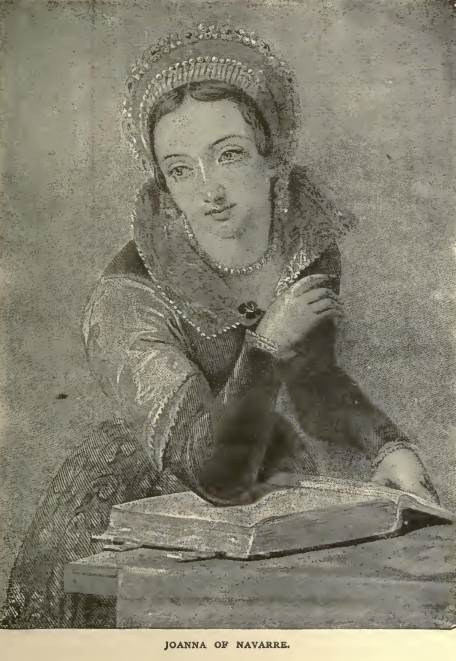
257who faithfully swore to preserve the laws, liberties and privileges of the Bretons. Thereupon the little duke and his two brothers, Arthur and Jules, were placed under his care, and taken to Paris to live.
A.D. 1402. The two daughters accompanied their mother to Winchester, where King Henry awaited her. The marriage was publicly solemnized at the church, of St Swithin, and afterwards there was a splendid feast. The citizens of London made costly preparations to receive the bride, whose coronation took place Feb. 26, 1403, nearly three weeks after her landing in England.
Joanna was thirty-three years old at that time, but she was still handsome, majestic, and graceful; she was, besides, a woman of excellent common sense, but excessively avaricious. Indeed, this besetting sin not only prompted her to make unjust demands on her subjects, and to accept unlawful bribes, but also prevented her from performing those deeds of charity that one reasonably expects from people in lofty positions.
The festivities that succeeded the coronation were rudely interrupted by an attack of the Bretons on the merchant shipping along the coast of Cornwall. This made the queen distasteful to her new subjects at once, though as her own son, the Duke of Bretagne, was then entirely under the influence of the Duke of Burgundy, it was the French who were responsible for the attack. Then followed the Percy rebellion and the battle of Shrewsbury, where the king so nearly lost his life.
A.D. 1404 Joanna further increased her unpopularity by filling her palace with her former subjects, an error that many Queens of England had made before her. But in this instance it was soon rectified, for the House of Commons took the matter in hand and cleared the royal household of nearly all the Breton servants. As the king 258was well aware that the voice of the people had secured for him his position, he dared not interfere.
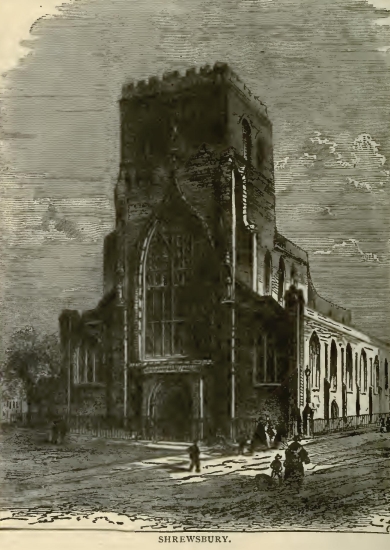
Three years after she had ascended the throne of England, Joanna was called upon to part with her daughters, because their brother, whose subjects they were, claimed them.
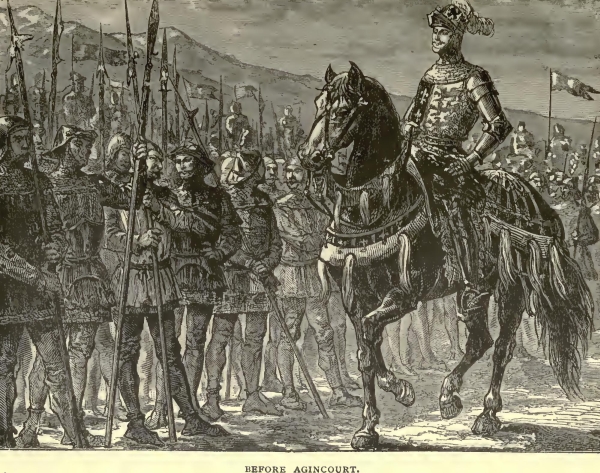
261He had a husband provided for each, and they were married soon after their return to France.
A.D. 1413. The death of Henry IV., which occurred in 1413, left Joanna again a widow. His interview with the Prince of Wales, during which he resigns his crown and offers most excellent advice, is correctly given in the fifth act of Shakespeare's Henry IV.
When the new king, Henry V., ascended the throne, he treated his stepmother with every mark of attention and respect, so much so that when he started on his expedition against France she was appointed regent in his absence.
A.D. 1415. The Duke of Bretagne took no part in this contest; but Queen Joanna's second son, Arthur, made the first attack on Henry's camp, at the head of two thousand French cavalry, near Agincourt. It was midnight on the eve of St. Crispin's day and a violent storm was raging when the assault was made. It resulted in victory for the English; Arthur was wounded and taken prisoner.
It was with an aching heart that Queen Joanna was called upon to receive the royal victor when all England rejoiced at his return; for her son-in-law and her brother had both been killed at the battle of Agincourt, and her son, Arthur, was brought to her kingdom in chains. She had been separated from the boy for twelve years, and now she was only permitted to give him a fond embrace, and then see him consigned to the gloomy Tower. Although Henry continued for a time to treat the queen with consideration, he would listen to no proposition or entreaty of hers for Arthur's release.
A.D. 1419. At last, on an accusation of witchcraft, preferred against Joanna by her confessor, who declared that she was planning with two sorcerers who were dealing with the powers of darkness for the destruction of the king, she 262was committed to Pevensey Castle as a prisoner. Henry V. gave the queen no opportunity of justifying herself, but no attempt of hers on his life was ever proved.
A.D. 1422 Her money was all appropriated by King Henry, and she did not regain her liberty until his death was at hand; then his conscience smote him, and he did his utmost to make amends.
Joanna lived many years to enjoy her restored liberty and kept her court chiefly at Havering Bower, surrounded by all the luxuries that wealth could procure.
She died in 1437, and was buried at Canterbury Cathedral beside Henry IV.
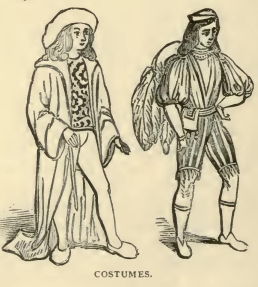
Charles VI., King of France, and his wife, Queen Isabeau of Bavaria, had eight children, three sons and five daughters, of whom Katherine was the youngest. The boys became in turn Dauphins of France; Isabella, the eldest of the family, was married to Richard II. when she was only eight years of age, and had an experience throughout her short life such as has never been recorded of so young a girl. But she proved herself a devoted wife, and bore her sufferings with true heroism. She died when Katherine was only nine years old. Two of the daughters of Charles VI. became duchesses, Marie entered a convent, and the two little ones, Michelle and Katherine, at the respective ages of three and five, we find shut up in the dismal Hôtel de St. Paul with their brothers and their infirm father.
Queen Isabeau was one of the most wicked women that ever lived, for she not only joined her brother-in-law, the Duke of Orleans, in stealing the revenues of the royal household, thus leaving her husband and children with no means of support, but she neglected them most criminally, and then, for a long time, deserted them. The poor king was insane, which fact in itself would have kept any true wife at his side, but his guilty, wretched consort deserved neither the title of wife nor mother, for she neglected her duty as both. Her daughters inherited her splendid, large, dark eyes, as veil as her clear, brilliant complexion, but, 264fortunately for themselves and others, none of her wickedness.
While at the Hôtel de St. Paul these poor little children were almost starved to death, and as their mother had left them without a change of linen they ran about in filthy rags. Some of the inferior attendants of the palace had compassion enough to give them a little food, but the servants of the royal family were left without money, consequently they neither could nor would provide for the children. Their condition must have been pitiable, indeed, but God watched over them, and as by a miracle their father's reason suddenly returned to him one day. For a long while he had been totally unconscious of the misery that surrounded him. What must have been the agony of the good man when he beheld his own plight and that of his innocent, forsaken little ones? It makes one shudder at the thought. But it had a different effect on the cruel, infamous Isabeau; for no sooner did she hear that her husband's reason was restored than she began to tremble for her own safety, as well she might. She therefore hurried away to Milan, and ordered her brother Louis, who was as bad as she, to bring the children to her.
He obeyed, and not only carried off the five royal children but also those of the Duke of Burgundy. Their absence was soon discovered, and the duke sent a troop of armed men after them, who overtook them before they had got very far. After securing the children of both families the men turned respectfully to the Dauphin Louis, then only ten years old, and asked him "whither he would please to go."
"I will return to my royal father," replied the boy. He was eagerly obeyed and carried back to Paris with his companions.
Later, Isabeau got possession of the little Katherine, but her conduct became so infamous that she was imprisoned,265
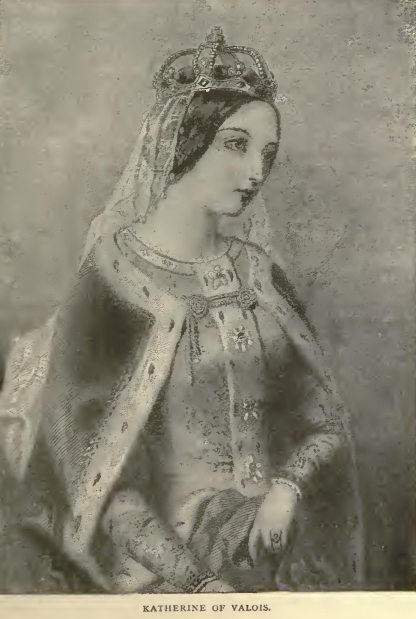
excellent education. At the age of ten he played the harp well, and was extremely fond of music. Later in life he performed on the organ and composed sacred airs. After his mother's death, Richard II. took possession of the boy, who then lived at the palace, until he was placed at Oxford to complete his studies.
He was only sixteen years old when he fought at the bar 267and the child was sent to a convent to be educated. We will leave her there for a while to tell something about Henry V., who became her husband.
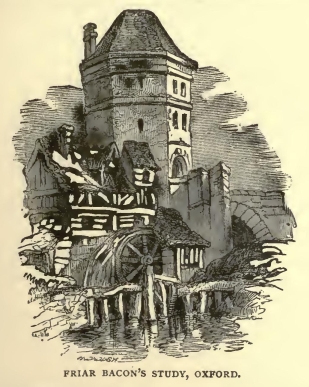
A.D. 1387. He was born in 1387, and was a very sickly infant, but he had a devoted mother, who took such good care of him that he soon grew strong. She gave him his first lessons in Latin, and he was afterwards blessed with an title 268of Shrewsbury, where he proved himself a brave prince. He advanced too rashly on the enemy, and received a serious wound in the face that left a scar to the end of his life. On being advised to retire that the point of the arrow might be taken out, "To what place?" he asked, "who will remain fighting, if I, the prince, a king's son, retire for fear at the first taste of steel? let my fellow-soldiers see that I bleed at the first onset; for deeds, not words, are the duties of princes who should set the example of boldness."
Henry V. was extremely poor while he was Prince of Wales; but that did not prevent his enjoying himself, even though his dissipations, and recklessness forced him into company far beneath him in rank. He was at times so pushed for money that he would disguise himself as a highwayman, and lie in wait for the collectors of the rents due the crown and rob them. Sometimes he got soundly beaten himself, but he always rewarded those officers who made the boldest fight. He knew how to appreciate faithfulness, even when it told against himself.
He performed some of the wildest pranks when he lived at a manor near Coventry. On one occasion he and some of his friends were arrested by the mayor of that town for raising a riot, and this was not the only time that he was locked up in jail. The young nobles found that they could have so much liberty and fun at "Prince Hal's" house that they preferred it to the king's court. This made Henry IV. quite jealous at times, but it did not prevent their flocking to the manor and enjoying their mad frolics. During one of these, a favorite servant of the prince was arrested and taken before Judge Gascoigne. No sooner did Henry hear of it than he rushed to the court of justice, where the servant stood awaiting his trial. Walking boldly up to the man he endeavored to remove his chains; the judge interfered, whereupon the prince boxed his ears 269soundly. Such an outrage caused great indignation on the part of Gascoigne; who not only reproved the young man as he deserved, but actually had him locked up in the prison of the King's Bench. No doubt the prince regretted that he had allowed his temper to get the better of his common sense; for, after he had taken time to reflect, he submitted with a good grace to his well-merited punishment. When Henry IV. heard of this occurrence, he said: "he was proud of having a son who would thus submit himself to the laws, and that he had a judge who could so fearlessly enforce them."
For a long time the king had been trying to get a wife for his wild son, no doubt with the hope that marriage would improve his bad behavior. Several ladies had been proposed, but in each case something happened to prevent an engagement. At last both father and son seemed determined on obtaining the fair Katherine for the lofty station of Princess of Wales. The Duke of York was sent on a private mission to demand her hand in marriage for Prince Henry, and while he was absent the king died.
A short but fierce civil war had to be fought before Henry V. could take possession of the throne, because somebody raised a report that Richard II., who would have succeeded, was still alive. In order to restore peace, Henry was obliged to have Richard's corpse paraded through the streets. It was carried in a chair of state adorned with regal ornaments, Henry walking by its side, and all the court following. After a solemn ceremony it was safely laid away in Westminster Abbey, and tranquillity returned.
Then the new king made another application for the hand of Princess Katherine, at the same time demanding the enormous dowry of two millions of crowns and all the southern provinces of France.
Charles VI. tried to compromise,—and offered 450,000 270crowns. This the English lover refused with disdain. In fact, he wanted an excuse for invading France, so resolved to fight for Katherine the Fair, and to win her, as well as the gold and the provinces he had demanded, at the point of the sword. In order to raise money for this expedition he had to sell or pawn all the valuables he owned, but his ambition was aroused and he never doubted that "the game was worth the candle."
From Southampton Henry V. sent a letter to the King of France warning him of his intended invasion, and adding that if the southern provinces and the hand of Katherine were not bestowed on him at once he would take them by force.
The king replied: "If that was his mind he would do his best to receive him; but as to the marriage he thought it would be a strange way of wooing Katherine, covered with the blood of her countrymen." This answer might have had a favorable effect on the young king had not the Dauphin Louis excited his anger by sending him a cask of tennis balls, saying, "that they were fitter playthings for him, according to his former course of life, than the provinces he demanded."
"These balls," replied Henry, making an angry pun, "shall be struck back with such a racket as shall force open the Paris gates."
A.D. 1415. He left Southampton in August, 1415, and after a furious battle took possession of Harfleur in October. In the winter he finished his campaign by the victory of Agincourt, which shed everlasting glory on his name. But it was a sad day for the enemy. France was thrown into a dreadful panic by the number of her nobles and princes that were slain at that battle. The Dauphin Louis is said to have died of grief on account of it; but when, shortly after, his death was followed by that of his brother, there was a report that the unnatural Isabeau had poisoned both her sons. 271The malady of poor King Charles returned with so many misfortunes, and his wicked wife, taking advantage of the confusion in the country, made her escape from prison. She then joined the Duke of Burgundy, took the reins of government in her own hands, and obtained control of her beautiful daughter Katherine.
Strange to say, although this woman had so shamefully neglected her children when they most required her care, she became quite proud of Katherine when she saw her such a lovely young woman, and soon exercised a surprising influence over her. The young princess had set her heart on becoming Queen of England, and in this her mother heartily seconded her.
When Henry V. was laying siege to Rouen Isabeau sent him a picture of Katherine by an ambassador, who was to ask him, "whether so beautiful a princess required such a great dowry as he demanded with her?" The king gazed long and earnestly on the portrait, and acknowledged that it was suprisingly fair, but refused to diminish his demands in the least.
A.D. 1418. At last the city of Rouen fell. France was in a state of despair, and the queen resolved to try what effect Katherine herself would have on the proud heart of the conqueror, since her picture had failed to satisfy him. A truce was therefore obtained and a conference appointed at a town called Pontoise.
The poor crazy king, with the queen and Katherine, came to the place of meeting in a richly ornamented barge. There was a large enclosure made with planks on the banks of the river Seine; outside were tents and pavilions covered with blue and green velvet worked with gold. Some of these were occupied by the King and Queen of France, the Princess, the Duke of Burgundy, his council and a thousand soldiers. Then the King of England 272arrived with his two brothers and his escort of men-at-arms, and took possession of the remaining tents.
When the conference was about to commence the queen entered the enclosure from the right side followed by Katherine. The King of England entered from the left, advanced towards the queen, whom he saluted with profound respect, and kissed her as well as the princess. He then took his seat opposite, while the Earl of Warwick made a long speech in French. Some time was spent in discussion, when the parties took leave of each other and separated, leaving everything as unsettled as before. Three weeks later the same personages, with the exception of Katherine, met for another conference on the same spot. Finding that her daughter's beauty had not induced the conqueror to lower his demands, Queen Isabeau would not permit Katherine to be present the second time. This arrangement displeased Henry very much, for he was desperately in love with the handsome dark-eyed princess. Still he remained firm, and the second conference ended as unsatisfactorily as the first had done.
Hoping that the family of his beloved would send some flattering messages, Henry waited a few days; but losing patience at last he demanded a third interview. He had now made up his mind that he would be satisfied with something less than he had at first required, and felt certain that he would only have to open his arms to receive his pretty lady-love. But lo, to his great surprise and disappointment, on arriving at Pontoise he found the tents removed, the fence that marked the enclosure torn down, and all the planks taken away, showing plainly that the marriage treaty was supposed to be at an end. It served him right, but he looked upon himself as the injured party, and flew into a perfect rage. He now loved Katherine more than before, and turning to the Duke of Burgundy, 273the only member of the royal family of France who was present, he said; "Fair cousin, we wish you to know that we will have the daughter of your king, or we will drive him and you out of his kingdom." The duke replied angrily, and many high words passed between the two men before they separated.
Henry continued his war in France, conquering at every step, until, reduced to dire distress, the royal family were forced to pocket their pride, and beg to have the marriage treaty renewed. Henry was even asked to name his own terms. He haughtily replied: "That he had been deceived so often that he would treat with no one but the Princess Katherine herself, who, he was sure, would not try to deceive him." This message was carried to the queen, who returned a love-letter written by the princess, and a request that Henry would come to Troyes for the ceremony of espousal. He consented with pleasure.
Henry V. had not been modest in his demands, for with the hand of Katherine he was to receive not only the provinces he had named in the first instance, but also the regency of the whole of France, thus disinheriting the older children of the royal family.
A.D. 1420. On his arrival he was conducted with great ceremony to the Hôtel de Ville, where apartments had been provided for him, and the next day he met Queen Isabeau and his lady-love at the church of Notre Dame, where, before the high altar, the articles of peace were read and signed. Henry's tall, handsome figure was well set off that day by the magnificent suit of burnished armor in which he appeared. In his helmet was a fox's tail ornamented with precious stones. A flowing plume would have been much prettier, but he liked to dress oddly sometimes, and no doubt thought that a little surprise of this sort would excite Katherine's interest. 274After the treaty was signed, King Henry requested an interview with his lady-love, which was granted, nobody besides being present excepting one female attendant. Katherine could speak little English, and Henry's knowledge of French was slight, which made their love scene, as Shakspeare has represented it, quite laughable. When he asks her: "Do you like me, Kate?" she replies: "Pardonnez moi, I cannot tell vat is—'like me?'" But when he tells her she is like an angel, her knowledge of English serves her very well, though she modestly refers to her attendant, who speaks worse than she does, to have it explained.
Henry makes a long speech, assuring her of his love, and asking for hers in return, and this she understands so well as to say: "Is it possible dat I sould love de enemy of France?"
"No," he replies, "it is not possible you should love the enemy of France, Kate; but in loving me you should love the friend of France; for I love France so well that I will not part with a village of it: I will have it all mine; and, Kate, when France is mine and I am yours, then yours is France, and you are mine."
That puts her head all in a whirl, and she says, with a slight frown: "I cannot tell vat is dat." But the lover soon explains all that he wants her to understand and receives her promise to marry him. Placing a superb ring of great value upon her finger, Henry kisses his lady-love and thus ends the ceremony of betrothal.
The following month they were married; but this event did not put an end to the war, for the honeymoon was passed amidst a series of sieges and bloodshed, and there is no account of Katherine's once interceding with her husband for her wretched country. If she had not been selfish in her happiness she might have spared much misery to others. 275After the siege of Melun, Henry had Queen Isabeau proclaimed regent of France, so that he might visit England to show off his pretty bride and have her crowned. First they made a triumphal' entry into Paris, where rich presents were offered to the youthful queen, and the rejoicings were on a most magnificent scale. The young couple spent Christmas in that city, and went on the 1st of February to Calais, where they embarked for England.
A.D. 1421. Towards the end of the month Katherine was crowned at Westminster Abbey and then conducted to the great hall, where a feast was served to a large party of noble ladies and gentlemen. But this feast had to be prepared without meat of any kind, for it was Lent, and called for a great deal of ingenuity on the part of the caterers. Each course was contrived to express some political meaning, the motto of explaining it being always attached to the most prominent dish.
The only instance of active benevolence that we hear of Katherine took place at this feast, when she asked her husband to give James I. of Scotland, who was a prisoner and sat at the table, his liberty. Henry consented on condition that the king would go with him to fight in France.
Then the young queen went to live at Windsor, where her husband would have joined her, but he was compelled to go back to France to fight.
It was during the siege of Meaux that news was brought him of the birth of a son. "Where was the boy born?" he asked eagerly, and when he was told "at Windsor," he repeated the following prophetic verse, which shows not only that he must have been very superstitious, but that he was a wretched poet:—
"I, Henry, born at Monmouth,
Shall small time reign and much get;
But Henry of Windsor shall long reign and lose all;
But as God will, so be it."
276 Henry requested that the child should not be born at Windsor, because he had some mysterious belief that bad luck hung over that palace, but Katherine had not chosen to obey him.
The following spring she wrote a loving letter to her lord, declaring that she longed to see him, and he immediately wrote her to join him in France.
She landed at Harfleur with an army of twenty thousand men, who were to assist in fighting against her unhappy country. Her father and mother advanced with Henry V. to meet her, and the reunion was a source of great joy to them all. No doubt the king wanted to see his little baby, but it had been left in England, and he was never to have that great pleasure. His health had been failing for a long time, but amidst the excitement of war he would not allow himself rest until he could no longer stand. Shortly after his wife's arrival he was carried on a litter to the castle in the wood of Vincennes, where she was stopping, and where he spent his last hours on earth.
A.D. 1422. When he was dying, he said to the Duke of Bedford: "Comfort my dear wife, the most afflicted creature living."
Katherine was not twenty-one years old when her husband died, and her grief was most violent, for she loved him devotedly. She made all the funeral arrangements herself, and they were conducted with great pomp.
The body was laid on a chariot drawn by four black horses. Above it was a bed on which lay a figure made of leather, and painted to resemble the dead king. On the head of this figure was a crown of gold and precious stones, and around the body a purple robe lined and trimmed with ermine. In the right hand was a sceptre, in the left a globe of gold with a cross rising from it. The face was uncovered, and a canopy superbly decorated was held above it. The
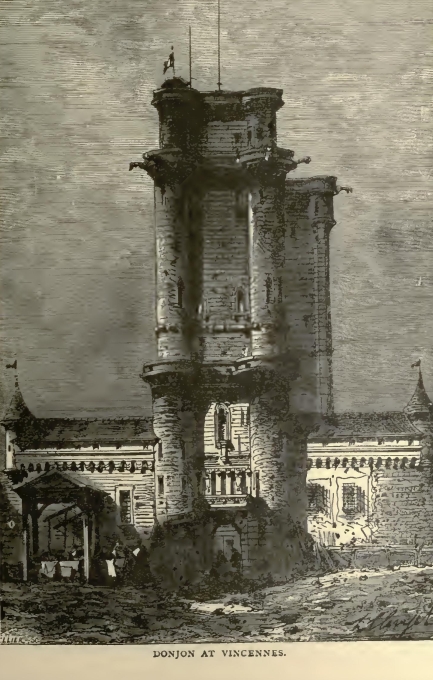
279King of Scots and a number of princes, lords, and knights followed in deep mourning. Four hundred armed knights rode around the car with their lances pointing downward, and these were followed by a company of men clothed in white bearing lighted torches. The queen with her retinue came about a mile behind. When the procession reached London it was met by fifteen bishops, a score of abbots, and a vast crowd of priests and people. They proceeded along the streets chaunting hymns for their dead king. After his burial Katherine raised a magnificent tomb to his memory.
The little prince was just eight months old when his mother returned to him at Windsor, where she spent the first few weeks of her widowhood. When parliament met, four months later, she removed to London and passed through the city on a throne drawn by white horses and surrounded by all the princes and nobles of England. With her infant on her lap, the young mother looked very pretty and interesting, and it is said that the little fellow behaved remarkably well. As he grew up he was present each year at the opening of parliament, and when he reached the age of seven the Earl of Warwick was appointed his tutor. He was crowned at Westminster, and afterwards the ceremony was repeated at Paris.
In the meantime his mother had become reconciled to the loss of her husband, and had married one Owen Tudor, with whom she lived very privately. After Henry V. died, the English met with many disasters in France, for there was nobody to lead them as this great warrior had done. This was a cause of deep sorrow to Katherine, and, with other anxieties, broke down her health. She died on the 3d of January, 1437, and was buried in "Our Lady's Chapel" at Westminster Abbey.
Margaret was the last of the Provençal Queens of England, and she filled a most important position for more than a quarter of a century. Through her mother she was a direct descendant of the great Emperor Charlemagne, and her father, René of Anjou, was the son of the King of Sicily and Jerusalem.
A.D. 1431. When she was about two years old her father fought a battle against Anthony of Vaudemonte, and was taken prisoner. This battle was to decide who was to rule over Lorraine, and as René was captured he was handed over to the Duke of Burgundy, who locked him up in the top of a high tower at Dijon. While there the royal captive amused himself with painting on glass; some of the beautiful specimens of his art were preserved, and are still to be seen in the chapel of the Castle of Dijon.
During the imprisonment of her husband, which lasted a long time, Margaret's mother was left with the entire care of their four young children, two boys and two girls, all of whom were remarkably pretty and interesting. Many months passed, and at last René was granted permission to leave the prison on condition that he would consent to the marriage of his elder daughter, Yolante, then in her ninth year, with Frederic of Vaudemonte, the son of the man by whom he had been made a captive. She was to have for her dowry part of the disputed lands
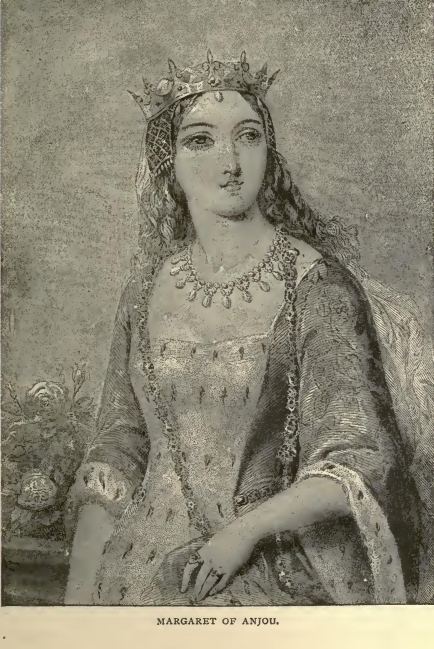
283of Lorraine. Besides, René had to pledge himself to pay a heavy ransom to the Duke of Burgundy, to give his two sons as hostages, and to allow Yolante to go and live with her new mother-in-law. At the same time, the baby Margaret was promised in marriage to Pierre, Count of St. Pol, but in consideration of her youth she was permitted to stay at home. So out of their four children these unhappy parents took back only one to Nancy, where they were living.
All René's efforts to raise the ransom failed, and there was nothing left for him to do but to deliver himself up at last and go back to prison. His son John went with him, while Louis, the younger one, was restored to his distressed mother.
Two years passed away, and Louis, King of Naples, died. René was his rightful successor, and his faithful wife immediately took steps to claim the throne for him. She was a woman of superior talent, courage, and energy, and as she lived at the time when the renowned Joan of Arc was flourishing, it did not appear in any way odd or strange that she should fight for her rights. She at once assumed the title of Queen of the Two Sicilies, and went to live in the Castle of Tarascon, on the banks of the river Rhone.
Her two children became such pets among the Provençals, who loved their captive prince, that they were almost worshipped. Every time they went out the people would follow them in crowds, sing and strew flowers in their path, and present them with offerings of wreaths. At night they would light bonfires in front of the castle, because there was a superstition among them that it was the way to keep off pestilence. Once when a band of people, calling themselves witches and fairies, came with the crowd to see the pretty children, they were all burned alive, the ignorant of those times believing that pestilence was brought by the magic of such creatures. Notwith284standing this precaution a plague really did break out, and the queen was obliged to hurry away with her little ones. They embarked at Marseilles and went to Naples, where there was an ancient palace belonging to the family of Anjou.
The queen then had her husband proclaimed King of the Two Sicilies. At this ceremony she was seated with her children in the chair of state, which was covered with velvet embroidered with gold, and borne through the streets of Naples. She never ceased working until she obtained her husband's freedom, and witnessed his grand entry into Naples on a stately white charger, followed by a Provençal army.
A.D. 1435. In the treaty for his liberation the following very remarkable article, proposed by the Duke of Burgundy, appears:—"And to cement the peace between the two powers, Margaret of Anjou, second daughter of King René, shall espouse the young King of England." Margaret was then only six years of age. Her parents removed to a magnificent palace, where she and her brother Louis pursued their studies together for several years. Then Louis died and Margaret experienced in this loss her first real sorrow.
King René's territories fell into the hands of the English, and he was reduced to such poverty that he retired with his family to Lorraine, where he spent his time writing verses and composing music that was the delight of all Europe. It was he who invented the opera ballet, and while thus pleasantly engaged he bore his trials with perfect indifference.
In the meantime, Margaret's engagement with St. Pol was broken off on account of the prospect of an alliance with the King of England. She had become a beautiful girl, and had created quite a sensation at the court of her 285aunt, the Queen of France, by her wit and accomplishments. When Henry VI. heard of her charms he sent a gentleman to find out if they had not been exaggerated, and at the same time to bring him a correct portrait of the Lady Margaret. The messenger returned with an eloquent description of her, partly because it was really deserved, and partly because he, as well as many persons of both the English and the French nations, hoped that this alliance would bring about a lasting peace between their countries. Henry was then in his four-and-twentieth year, good-looking, with a cultivated, refined mind, and excellent morals.
A.D. 1444. In 1444, commissioners met to arrange a treaty of peace, which was to be strengthened by the marriage of Henry and Margaret. When King René's consent was asked he gave it on condition that the dominions of Anjou and Maine were returned to him. This was granted by Henry and his council, and neither money nor lands were required for a dowry with the bride, her beauty and talents being considered sufficient "to outweigh all the riches in the world."
There was some opposition made to this marriage by the Duke of Gloucester and his party, who did not want peace with France, nor a daughter of the house of Anjou on their throne; but it was all arranged in spite of them, and the Duke of Suffolk sailed from England with a splendid train of nobility to conduct Margaret to her future home.
The marriage ceremony was performed at Nancy in presence of the bride's parents, the royal family of France, and a large number of nobles and ladies. King Henry was not present, but Suffolk stood in his place, and married the Lady Margaret in the name of the Sovereign of England.
King René gave a grand tournament in honor of the 286marriage, and all the princely knights and gallant warriors wore garlands of daisies out of compliment to the bride, who had chosen this flower for her emblem. The festivities lasted eight days, and were attended by most of the nobles of France, England, and Burgundy. Margaret's sister, Yolante, was married at the same time, and this is how it was managed: she had been engaged to Frederic of Vaudemonte for more than nine years, but as her father had been forced to agree to this engagement when he was a prisoner he never intended to fulfil it. But the lover was not to be put off any longer, so he made a plan with some of his daring young friends to carry off his lady-love while the tournament was going on. King René was very angry at first, but soon forgave the young couple, and the festivities continued with fresh spirit.
At the end of the week Margaret took a mournful farewell of her weeping family and friends, by whom she was deeply loved. Her uncle, Charles VII. of France, went part of the way with her. At parting, he pressed her in his arms tenderly, and said, with his eyes full of tears: "I seem to have done nothing for you, my dear niece, in placing you on one of the greatest thrones in Europe, for it is scarcely worthy of possessing you." The young queen was sobbing so that she could not reply, and they parted never to meet again. Her father went with her still further, and when they embraced in farewell they could not speak, but turned away from each other with hearts too full to permit of their uttering a single word.
The wars with France that had lasted so long had made Henry so poor that he was obliged to call a meeting of parliament, when his bride was coming, to get money to defray the expenses of his wedding and Margaret's coronation, and for the same purpose he pawned some of the crown jewels.
The young queen had been so ill on the voyage that she 287had to be carried from the boat to the shore. A terrible storm was raging when she landed, but in spite of the thunder and lightning, people flocked in crowds to look at her. It was many days before she could proceed on her journey, because her illness proved to be something that looked very like small-pox. However, it could not have been a very severe case, because her beauty was not impaired in the least.
A.D. 1445. She was able to join her husband at last, and their nuptials were solemnized at Tichfield Abbey, in April, 1445. The bridal ring contained a ruby of great value, and had been a present to the king from his uncle, Cardinal Beaufort.
Poor Margaret's wardrobe was so scanty that Henry was obliged to buy her some clothing before she could appear in public. This to a girl of fifteen, who probably expected a fine trousseau when she married at least, must have been distressing. Although the English were dissatisfied because their new queen brought no dower, and because of her relation to the royal family of France, her beauty won its way to their hearts, and secured for her a hearty welcome where ever she appeared. All the knights and nobles wore her emblem flower, the daisy, in their caps, when they came in a body to receive her in state. This must have been a very flattering compliment, and the king carried it still further by having "Marguerites" engraved on his silver. Grand preparations had been made in London for the young queen's reception; there were triumphal arches across the principal streets bearing mottoes and beautiful designs in flowers, besides banners and evergreens. At every corner there were pictures or dressed-up figures having some political meaning, or offering some mark of welcome and loyalty to the new sovereign.
A large procession of men on horseback conducted her 288into the city.' These consisted of, first, the Duke of Gloucester with five hundred attendants, all wearing his badge and livery; then the mayor, aldermen, and sheriffs in blue gowns with embroidered sleeves and red hoods. Next came the queen's carriage, surrounded by her suite, and a long train of followers brought up the rear.
The coronation took place at Westminster two days later with great splendor, though the king's treasury was almost empty. No doubt all this display was very gratifying to King René's faithful steward, squire, and minstrels, who came to England to witness the reception of their princess, then went back home to tell all about it.
A few weeks after the coronation an embassy arrived with congratulations to Henry VI. from the King of France, and René, Margaret's father. Henry received them seated in a large chair of state covered with blue tapestry. His long robe of scarlet velvet with gold embroidery swept the floor. When the ambassadors made their speech, wishing him the blessings of peace and prosperity, he raised his hat and said, several times: "St. John, thanks; great thanks to St. John!" They then inquired after the health of the young queen, and expressed a hope that the peace then existing between France and England would last forever. Henry replied: "That he desired the continuance of peace beyond anything on earth;" to which all who were present answered, "Amen!"
For the first two years after Margaret's marriage, Cardinal Beaufort was her chief adviser, and she became so fond of him that she would often make visits at his house in Waltham Forest, where there was a room magnificently fitted up for her special use with hangings of spun gold from Damascus. Henry was attached to the good cardinal also, and was always glad to be guided by his advice. He was of the greatest assistance to the young couple on several 289occasions, for his immense wealth enabled him to help them out of many a debt that they could not otherwise have paid.
At this time Margaret was a woman of unusual intellect and grace of manners. One of the chroniclers of her reign says of her: "England had never seen a queen more worthy of a throne than Margaret of Anjou. No woman surpassed her in beauty, and few men equalled her in courage. It seemed as if she had been formed by Heaven to supply to her royal husband the qualities which he required in order to become a great king."
It was a pity that she was called to share the throne of England when she was so young, for her judgment was not formed, and she had a nature that was more likely to create enemies than friends. She was very foolish in her treatment of the Duke of Gloucester, Henry's uncle, who, she knew, had been one of those most strongly opposed to her marriage. For this she could not forgive him, and, like a spoiled child, took every opportunity of showing him what influence she had over the king, and how much she loved Cardinal Beaufort and the Duke of Suffolk, both of whom were his sworn enemies. But there was a great change in her life by the time she had been two years on the throne, for Henry's ministers met in parliament, and decided on the destruction of the Duke of Gloucester. He had shown a disposition to join the Duke of York for the purpose of opposing the queen and her influence in every possible way. Although the king had no particular evidence to offer against his uncle, he was convinced that he was his enemy, and had him arrested for high treason. The whole country was astonished at this charge, but the astonishment was changed to horror, when, seventeen days later, the Duke of Gloucester was found dead in his bed. Murder was suspected, but there was no proof of it. Some people even 290accused the queen of having had a hand in it, but it is not at all probable that so young a girl, and one of Margaret's open, candid nature, could have been guilty of so foul a deed.
Eight weeks later the venerable Cardinal Beaufort died, and the young queen was thus deprived of a friend and adviser, whose large experience and profound wisdom had made his counsel so valuable to her. This was, indeed, a most serious loss, for Henry had not the qualities requisite for the government of a kingdom, and this duty, therefore, fell upon the shoulders of Margaret, who was so young that she had scarcely learned to govern herself. The king was absorbed in his studies and in the regulation of the college at Eton, that he had just founded. Affairs of state interested him but little, so his wife naturally turned for advice to the nearest friend of the departed cardinal. This was the Duke of Suffolk, a gray-haired statesman and soldier, who had served in the English army for thirty-four years. He was also a member of the king's cabinet, and his wife was Margaret's favorite maid of honor.
During the interval of peace that the English nation enjoyed before they were again forced into war, Margaret laid the foundation for Queen's College. She also tried to get the people interested in the manufacture of woollen and silk goods that had been commenced there many years before, but the desire for fighting had grown so that it was impossible to make those men or their sons who had fought in France, till the soil or weave cloth. The silk manufacture was chiefly carried on by women, while the men thirsted for the excitement of war in spite of its miseries.
A.D. 1449. In 1449 Charles VII. renewed hostilities, and in the course of two years had got back most of the towns in Normandy. The Duke of York and his party blamed "that French woman," as they contemptuously 291called Margaret, for all their losses, and declared that the king was fit for a cloister rather than a throne, since he left all the affairs of his kingdom in the hands of a woman.
The Duke of York made himself so offensive to Margaret that she resolved to get rid of him at any cost; she therefore appointed him governor of Ireland. This was a serious mistake, for it only increased his power. He left a strong party in England who were opposed to the queen, though not openly, and did everything to make her and her favorite minister unpopular. They never ceased their efforts until they saw the Duke of Suffolk first imprisoned, then banished, and finally put to death by his enemies in defiance of the crown.
This tragedy was the first of many scenes of blood and horror that were in store for England. The misery of the lower classes caused by famine and disease was so great that they rose in rebellion, headed by Jack Cade, who gathered his rough motley forces about him at Blackheath. They numbered fifteen thousand, but when they heard that King Henry was coming in person to fight them, they got frightened, and fled to a place called Seven Oaks.
It was a pity that Queen Margaret went with her husband, for although she became warlike later in life, she was so little disposed to fight at that time that no sooner had Henry gained a victory than she persuaded him to go back with her to London. She could scarcely have committed a greater error, for the rebels mistook the king's departure for cowardice, and marched straight to the metropolis, where there is no telling what they would have done had not the churchmen interfered and calmed the storm. At their approach the king and queen fled to Kenilworth Castle, and the archbishop took it upon himself to pardon the rebels if they would return in peace to their homes.
A.D. 1450. 292Cade was not pardoned, but when he found himself deserted by his followers he made his escape. A thousand pounds were offered for his head, and the sheriff of Kent, who caught him, obtained the reward. It was afterwards proved that the Duke of York was at the bottom of this revolt.
The royal couple had now taken the Duke of Somerset into their favor, and though he was exceedingly unpopular in England he succeeded to Suffolk's high office. He belonged to the house of Lancaster, and it is said that his violent temper caused the beginning of those dreadful "wars of the roses" that lasted for twenty years. He had a dispute with Warwick in the Temple Gardens, and plucked a red rose, calling on all the bystanders who sided with him to do likewise. Warwick chose a white rose, and did the same, and forever after the two parties of York and Lancaster were distinguished by this sign. Instead of endeavoring to settle the dispute, Queen Margaret wore the red rose, and very imprudently declared herself an opponent of the other party.
In time the Duke of York became so powerful that the queen advised her husband to make an attack on him. He consented, and marched toward the Welsh border, but he was too weak to take a firm stand as he ought to have done to crush his enemy, and consented to an interview with York, who demanded that Somerset should first be put under arrest. Henry consented. York then disbanded his army and entered the king's tent quite alone. In the meantime the queen had contrived to get Somerset out of the Tower without Henry's knowledge. She then concealed him behind a curtain of the royal tent, so that he might be present at the interview. When York assured the king that he had taken up arms for the sole purpose of bringing Somerset to punishment, the concealed duke rushed from
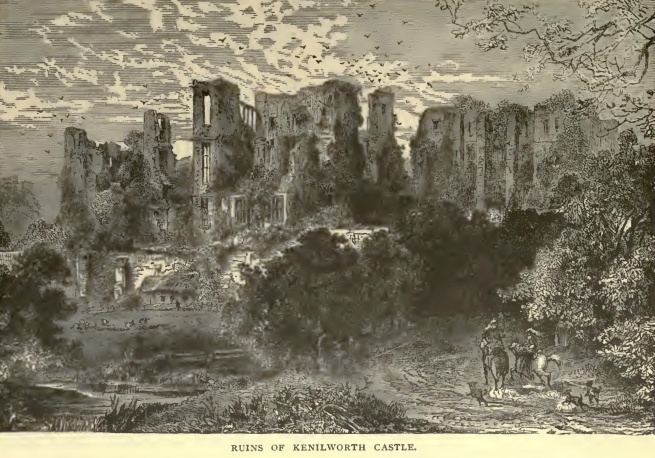
295his hiding-place and accused his enemy of treason. A fierce quarrel ensued, during which the king stood speechless with astonishment. As York left the tent he was put under arrest, probably by the queen's order; but later, when he swore fealty to the king at St. Paul's Cathedral, he was released.
A.D. 1452. About this time Talbot, Earl of Shrewsbury, one of Margaret's most devoted friends, was killed in battle. A magnificent volume of sketches that he presented to her shows that he must have had great taste for the fine arts. The colored title-page represents the king and queen seated side by side on a low divan. Margaret wears a royal crown; her hair is of a pale golden color, and falls gracefully over her shoulders. Her mantle is of royal purple, fastened with gems and bands of gold. She is beautiful and majestic in this picture, and does not appear more than twenty years old. Talbot kneels before her presenting the volume, with his dog by his side. Daisies are painted in clusters on the title-page, and the queen's initial (M) is surrounded by the garter and its motto. The ladies in attendance who stand behind the divan wear heart-shaped caps, formed of a stuffed roll ornamented with gold and jewels, and fastened in a fanciful turban shape over a close cap of gold cloth or net-work brought to a point in front and rising at the back of the head. At the end of the volume is an allegorical picture representing Margaret and the ladies of her court as the Virtues. Margaret is Faith and King Henry appears as Honor. The old earl was mourned by all classes of people, for he was the greatest captain of the age.
A.D. 1453. It was in this year that the queen's dearly loved mother died, and a still heavier calamity fell upon the royal household in the fearful malady that began to show itself in the king. He had inherited the brain disease 296of his grandfather, Charles VI. of France, and the trouble in his court had so affected him that his reason gave way under it. Margaret was therefore compelled to govern alone, whether she desired it or no, and, like a good wife, she made every effort to keep her poor ailing husband in ignorance of all political disturbance. She had him removed to his palace at Westminster, where he could be quiet and kept free from all excitement, and it was there that his only child, the unfortunate Edward of Lancaster, called "The child of sorrow," was born. This boy was named Edward, and was York's only rival to the throne. He was therefore not welcome to the nation, who felt that his existence would be the cause of much bloodshed between the two parties of York and Lancaster.
At this period Queen Margaret was ruling, with the assistance of Cardinal Kemp, Archbishop of Canterbury, but he died a few months after the prince was born, and the House of Lords sent a committee to the king to request him to name a successor. But poor Henry stared at them without understanding a word they said, and of course could make no reply. The Duke of York was then appointed defender and protector of the king as long as his illness lasted, or until Prince Edward should be old enough to ascend the throne. Five physicians and surgeons were appointed to attend the royal sufferer and watch over his health.
Margaret was so wrapped up in her baby, and so worried on account of her husband's condition, that she took no part in these political changes, but her party insisted on her having absolute power as queen regent. York objected, and had the Duke of Somerset put under arrest.
A few months later the king's consciousness suddenly returned, and he seemed as though awakening from a deep sleep. His child was then shown to him, and he noticed 297
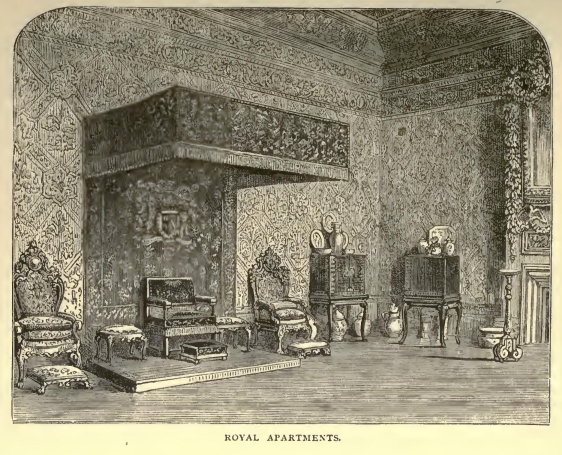
299the boy for the first time, although he was more than a year old. the news of the cardinal's death brought tears to his eyes, and he said 'that he never knew of it till this time,' and 'that one of the wisest lords in the land was dead.'
There was great rejoicing over the king's recovery, and Margaret immediately took measures to have him restored to power. Though still weak, he attended parliament and replaced Somerset in office. But this triumph of the queen's party did not last long, for the Duke of York raised an army and marched towards London, intending to take the king by surprise.
Henry had courage, but he could not bear to shed the blood of his subjects; however, there was no help for it now, so he made his headquarters at St. Albans, with not more than two thousand men. The Earl of Warwick commenced the attack, and the battle, which lasted only one hour, was a desperate one, large numbers being slain on both sides. The king was wounded in the neck, but continued to fight until left alone under the royal banner. He then walked coolly to a baker's shop close by to have the wound attended to. The Duke of York followed him, and falling on his knees before the sovereign, said: "Rejoice! for the traitor, Somerset, is slain." Henry replied: "For God's sake stop the slaughter of my subjects." York then took the wounded king by the hand and led him to his apartments in the abbey of St. Albans. On the following day they went together to London.
At the approach of the Duke of York's army Margaret had retired to Greenwich with her ladies and the little prince, where she awaited the result of the battle of St. Albans with great anxiety; and when the news came of the defeat of her party, and the death of so many of her brave friends, she fainted and remained in a stupor for several hours. The king's wound was so serious that, added to 300the excitement of the battle, it brought a return of his disease. He was not in a condition to attend the next parliament, so the Duke of York appeared in his name.
This was a parliament made up of the queen's enemies, who naturally found great fault with her management of public affairs. They petitioned the king to appoint the Duke of York protector of the realm, and urged him so often and strongly to this step that at last he consented. No sooner was this done than the queen was advised to withdraw to some quiet spot with her husband and child. She was glad to comply, for her mind was so filled with these objects of her care that she did not feel capable of any other duties. She removed to Greenwich Palace, where she devoted herself to the nursing of the king and the education of her boy. But while there she received frequent visits from the princes of the Lancaster family and the young Tudors, Henry's half brothers. Besides these, a band of brave young nobles and gentlemen gathered around her, panting to avenge the blood of their fathers who had fallen at St. Albans. These so strengthened the Red Rose party that as soon as the king's health improved Margaret felt it her duty to present him again at parliament. She therefore held a meeting of her friends and made all the arrangements for this step.
A.D. 1456. When King Henry entered the House of Lords, and addressed them in a calm, dignified speech, telling them that since by the blessing of God his health was so far restored that the kingdom no longer needed a protector, they were so taken by surprise that they immediately consented to his resuming the reins of government. The Duke of York had not heard of this new move of Queen Margaret's, and happened to be absent. When an order reached him next day, signed by the king, requesting him to resign his office, he was so chagrined that he retired to 301the country. Henry Beaufort, heir to the late Duke of Somerset, was then appointed prime minister.
The poor queen had her hands full, for not only was she obliged to keep constantly prompting her husband how to act, but she took great pains to amuse him and to preserve in him a calm, peaceful state of mind. Minstrels were gathered from all parts of the country, and well paid for reciting and playing to him, and daily requests came from nobles and other subjects for leave to go on pilgrimages to the different shrines to pray for his health. This had a very soothing influence and filled King Henry's mind with hope.
Margaret showed a great deal of wisdom and prudence in the way she exercised her power at this time, and feeling a desire to know whether she was popular with her subjects, she resolved to travel with the king and the little prince through some of the midland counties and spend a short time at Coventry. Everywhere the royal party were received with great enthusiasm, and processions were got up in their honor. Margaret won her way to all hearts that were not prejudiced against her, and during her stay at Coventry the citizens became so devoted to her that the name of their town was changed to "Margaret's Safe Harbor."
Now the French and Scotch thought that as there were two parties in England it was a good time to attack them, but they made a great mistake, for although the nation were divided among themselves, they became one as soon as a foreign power dared to attack them. A general congress of the two parties was called, and presided over by the lord-mayor, who was appointed guardian of the public peace. A treaty was formed after two months of debate and quarrel, when the king and queen made a public entry into London. The feast of the Annunciation was kept as a day of public thanksgiving for the peace that reigned between the houses of York and Lancaster, and when the 302procession was formed to march to St. Paul's Cathedral, the earls who had been the deadliest foes headed it, walking arm in arm. The king followed alone, and just behind him came the Duke of York, leading Margaret by the hand. All appeared to be on the most loving terms, and the happiness of the citizens of London manifested itself in their cheering, bonfires and other signs of rejoicing. This patched-up, make-believe peace lasted only a short time, for the Duke of York was at that time lord admiral of the whole English navy, and with so much power he was not likely to remain long inactive.
A.D. 1459. The following year the queen made a tour through some of the counties of England with her husband, for the benefit of his health, as she said, though her real object was to gain favor for her son, then a most engaging child of six years. So well did she succeed that at the battle of Bloreheath, which was fought shortly after, ten thousand men wore the Prince of Wales' livery. King Henry was dangerously ill when this battle was fought. The Yorkists were victorious, and their leader boldly asserted his right to the crown.
But Margaret was not crushed by defeat; on the contrary, her energies were aroused, and she determined to take up arms herself to fight the cause of her husband and son. The warlike blood of Charlemagne was thrilling in her veins, and she was the countrywoman of Joan of Arc, who had proved herself such a successful warrior. She went to Coventry, where she succeeded in getting together another army. By this time the king's health had so far improved that she persuaded him to march to Ludlow and meet the Duke of York on the battle-field.
In the meantime Margaret had so increased her popularity that many of the Yorkist soldiers refused to fight against her husband. The duke was taken aback at this, and circulated 303a report of the king's death, and caused a mass to be sung in camp for the repose of his soul. Hearing of this, the queen caused a pardon to be proclaimed in the king's name for all who would return to their allegiance. The Yorkist leaders did not believe in this offer of pardon until Henry, urged on by his courageous wife, advanced to the very gates of Ludlow Castle and proclaimed it again. Then so many soldiers of the other side deserted that the duke made his escape and went to Calais, leaving his wife and her two younger sons to defend the castle. They were taken prisoners, and the whole town was destroyed.
Margaret was delighted with the success of her first campaign, but she did not enjoy her triumph very long, for the Earl of Warwick, who was a more determined enemy than York, brought a band of experienced soldiers from Calais, and gathering all his forces, made a tremendous charge on the Lancaster troops, killing ten thousand of them in two short hours, and capturing King Henry. The queen was stationed near enough to receive the dreadful news within an hour, and made her escape with her son to a fortress in the north of Wales, where she was honorably received and protected by a courageous chieftain of that country. Nobody knew where she was hidden, not even the king, who was taken to London and carefully guarded.
As soon as York heard of the victory of his party he entered the city of London at the head of five hundred horsemen, with a sword of state borne before him. He rode straight to Westminster, and, entering the House of Lords, walked to the throne, and laid his right hand on it with a look around among the peers that implied he awaited an invitation to take his seat there. Not a word was spoken. At length the Archbishop of Canterbury broke the dead silence, and asked him, "if he would be pleased to visit the king."
"I know of no one in the realm who 304ought not rather to visit me," he replied, haughtily, and left the house.
The peers then referred it to Henry to decide whether he or the Duke of York had the legal claim to the throne. He replied: "My father was king; his father was also king; I have worn the crown forty years from my cradle; you have all sworn fealty to me as your sovereign, and your fathers have done the like to my father and grandfather. How, then, can my right be disputed?" Nevertheless, the king agreed that if he were permitted to wear the crown during his life, he would resign it, at his death, to the Duke of York or his heirs. He was next compelled to order the return of his wife and son.
All the fire in Margaret's nature was aroused at hearing how the rights of her boy had been surrendered, but she was without an army, and what could she do? Suddenly it occurred to her to seek assistance from the King of Scotland. He was the son of a Lancaster princess, and his wife was a friend and relation of Margaret. She caused a report to be circulated that she was raising an army in France, then went secretly to Scotland, and within eight days after her husband's order for return had been received she crossed the Scottish border at the head of the forces she had gathered there, and unfurled the banner of the Red Rose. Her numbers were increased by knights from all the northern counties of England, and before the leaders of the White Rose party were aware of her being in the country at all, she presented herself at the gates of York.
The duke was so taken by surprise at this bold movement on the part of the queen that he shut himself up in his strong Castle of Sandal to await the arrival of his son. But Margaret followed him up, and defied him day after day to meet her in the field, calling him a coward for being afraid of a woman, until he arranged his forces for battle, hoping to
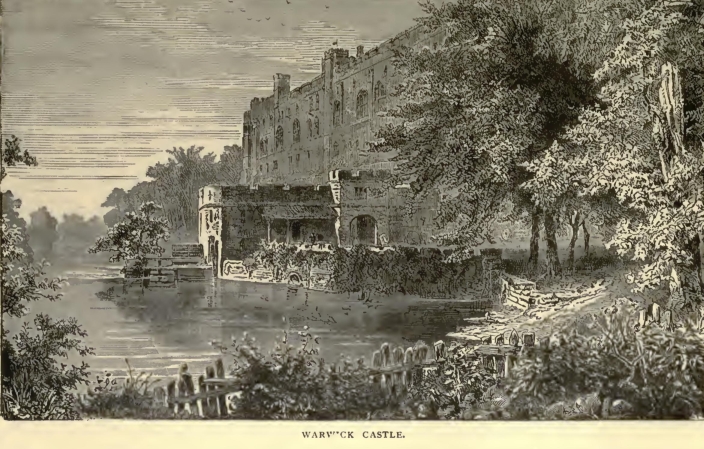
307frighten her away. He soon saw his mistake though, for Margaret was not in the least daunted at the sight of his warriors. She did not play the Amazon herself by fighting, but she directed her own forces, under the command of Somerset, in such a way as to enclose the Yorkists from all sides in a net, as it were, and in less than half an hour two thousand of them lay dead on the field, the duke himself among the number. Lord Clifford cut off the dead leader's head, crowned it with paper, and presented it on the point of his lance to Queen Margaret, saying: "Madam, your war is done; here is your king's ransom."
She shuddered at first and turned away, then suddenly remembering all the trouble this man had given her, she looked again and smiled in satisfaction. She then ordered the head to be placed over the gates of York, and that of the Earl of Salisbury, who was her prisoner, to be placed beside it, adding, that room must be left for those of the Earls of March, York's son, and Warwick, which she intended should keep them company. This was a grave mistake, and added much to the fury of her enemies, who stopped at no deed of cruelty and horror after that.
Her next step was to try to rescue her husband, for which purpose she hurried on to London. But she was met at St. Alban's by Warwick's forces leading the king in their train. A furious battle ensued, but Margaret's stout northern soldiers were too much for the Londoners, and when night came all the Yorkists fled, leaving the king behind. One of his attendants hastened to the queen's quarters to inform her that her lord was near, whereupon she flew to embrace him. Accompanied by the Prince of Wales and some of the northern lords, they went to the Abbey church of St. Albans to return thanks to God for the king's deliverance. They were received by the abbot and monks, who prepared apartments for them in the abbey, where they remained for a while. 308But Margaret's better feelings were all changed by the hard experience she had had, and in her desire for further vengeance she made so many mistakes that she turned the good-will of the Londoners towards her into hatred, and they refused to let her enter the city. So she removed with her troops towards the northern counties, her husband and son accompanying her. Then Edward of York entered London in triumph. He was received by the citizens as their deliverer, and proclaimed king by the voice of the people under the title of Edward IV.
This was considered the death-blow to the house of Lancaster, but not by the persistent Margaret, who in the course of a few days rallied an army of sixty thousand men. Her generals, Somerset and Clifford, persuaded her to stay with her husband and son, while they engaged Edward and the Earl of Warwick, first at Ferrybridge and then at Towton. A heavy snow-storm that fell in the faces of the Lancastrians so blinded them that their arrows did not take effect, while those of their enemy covered the field with forty thousand of their dead.
Margaret fled to Scotland, and Edward IV. forbade all his subjects under pain of death to hold any sort of communication with her or her husband; yet there were many faithful hearts ready to sacrifice life and fortune to the heroine of the Red Rose. She and Louis XI., then on the throne of France, were first cousins, and had been brought up together. To him she now turned for aid, but he received her coldly when she threw herself at his feet, merely offering her a sum of money providing she would give him Calais if she could not return it within a year. The people of England objected to this, and thought that as Calais was not hers to give she had committed treason in making the promise.
After five months' absence she returned to England with 309two thousand volunteers, obtained more assistance from the Scotch, and got possession of several important fortresses.
In the spring the battle of Hexham was fought, the Yorkists being victorious. Margaret fled with her son to the nearest forest, where, after wandering about for awhile, she fell in with a gang of robbers, who stole everything of value that she had about her. While they were quarrelling over the division of the spoils, she snatched up her boy and ran away to the nearest thicket. When evening came on she crept out of her hiding-place, dreading above all things lest she might fall in with a band of Edward's troops, when by the light of the moon she beheld a robber of gigantic size advancing towards her with a drawn sword. Taking her son by the hand she bravely advanced towards the man with all her natural dignity of bearing and said: "Here, my friend, save the son of your king." The robber was struck with astonishment, and dropping his sword, offered to conduct them to a place of safety, telling the queen that he was a Lancastrian gentleman who had been ruined in King Henry's service. Taking the prince in his arms he led Queen Margaret to a cave in the forest, where his wife received them and provided refreshments. There the fugitives remained for two days. On the third their hiding-place was discovered by the devoted followers who were determined to stand by Margaret to the very end. These were Pierre de Brezé, one of her own countrymen, his squire, Barville, and an English gentleman.
A.D. 1463. From them Margaret heard of the escape of her husband and of the dreadful fate of her faithful friends, Somerset, Hungerford, and Roos, who had been captured and beheaded in the public market-place of Hexham without trial.
On leaving the hut of the generous outlaw, the queen 310thanked him and his wife with tears in her eyes. Her friends had offered them money, which they had refused, and Margaret had nothing left to give them. "Of all I have lost," she said, "I regret nothing so much as the power to recompense such virtue." She then proceeded to Scotland, reaching there only after a great deal of hardship and danger, to find that her presence caused great uneasiness to the king, who feared that it might be the means of bringing him into trouble with England.
She embarked for Flanders, where some of the ladies of the court had taken refuge, accompanied by the prince, the faithful de Brezé, and about two hundred of those ruined Lancastrians who still had faith in her.
When she arrived at St. Pol, the Duke of Burgundy not only received her with honors and gave a festival to welcome her, but he also assisted her with money. To each of her ladies he presented a hundred crowns, to de Brezé, who had spent the whole of his fortune in Margaret's service, a thousand, and to the queen herself an order for twelve thousand crowns. This princely behavior on the part of the duke was like heaping coals of fire on Margaret's head, for she had always despised him, and had been heard to say more than once, "that if by any chance he were to fall into her hands she would make the axe pass between his head and his shoulders." He sympathized with her misfortunes, and entertained her in a way becoming her station, but he would give her no political aid nor allow any of his subjects to take part in her quarrel. As his guest she was welcome so long as she chose to stay, and when she left he provided her with an escort.
Margaret next visited her sister Yolante, Countess of Vaudemonte, and then her father offered one of his ancient castles in Verdun for her residence, where, with a few of her ruined friends, she devoted herself to the education of the last tender bud of the Red Rose of Lancaster.
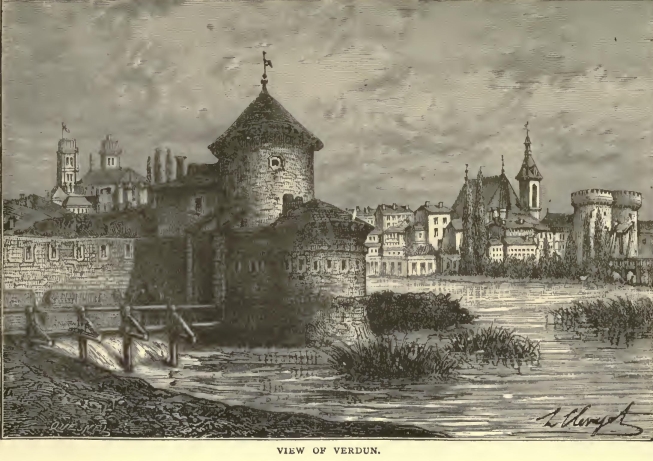
313After King Henry's escape at the battle of Hexham, he wandered about, hiding himself in the house of one friend or another, but most of the time in a cave, until he was betrayed by a monk, and taken to London under arrest. There he was treated most brutally by a mob, and after being led through the streets by the Earl of Warwick, who kept shouting "Treason, treason, and behold the traitor!" he was locked up in the Tower.
It seems that Edward IV. still feared Margaret's power in England, for he had the coasts guarded to prevent her return, and put to the torture several persons who were only suspected of having assisted her with money.
Two years later there was a great change in the politics of England, and the Earl of Warwick took up arms to drive the king from his throne. But he failed and was obliged to fly to France, where Louis received him. Now Margaret's relations saw a chance for regaining for her the throne she had lost, so they all united in trying to bring about an interview between her and her bitter enemy. At first she shuddered at the thought of ever seeing him, but when he became very humble, offered the most plausible excuses for his conduct, and swore to defend her and her son with all the power he had once used in opposing them, she consented to pardon him and influenced her son to do the same. The Earl of Oxford also obtained her pardon.
Prince Edward was then eighteen years of age, and had fallen in love with Anne, the Earl of Warwick's second daughter. Margaret did all she could to oppose this match, but she was at last won over, and the marriage was solemnized the following August, 1470.
In the meantime Warwick had raised an army to take to England, whither he went as soon as the wedding ceremonies were over. His wife, Queen Margaret, Prince Edward and his bride then went to Paris by invitation from
Louis XI. The streets of the city were magnificently decorated and hung with rich tapestry, and all the officers turned out in grand procession to conduct the royal party to the palace of St. Paul, that had been fitted up for their reception. It was there that news came of the landing of the Earl of Warwick in England, and of his success in liberating King Henry and placing him on the throne once more.
A.D. 1471. Then Margaret with all her party resolved to return. In February the preparations were completed, and the fleet set sail from Harfleur. But wind and weather were against them, and after three times being driven back to the coast of Normandy, with great damage to the ships, they resolved to wait.
When at last they were able to sail again, they were sixteen days and nights making a voyage that usually took twelve hours. After landing, they repaired to an abbey, where they were celebrating Easter when the dreadful news came of the death of Warwick and the recapture of King Henry.
For the first time in her life the poor queen was completely crushed, and wished she might die rather than live for the misery that was yet in store for her. Some of the Lancastrian nobles sought her out, and expressed their intention of continuing the fight against Edward IV., and at last so aroused her from the despondent state into which she had fallen that she consented to aid them. Placing herself at the head of an army that they had raised, she marched thirty-seven miles in one day, and met her enemy within a mile of Tewksbury.
When all arrangements were made for the battle, Margaret rode about the field from rank to rank, encouraging the soldiers with promises of large rewards if they won the victory. It proved a sorry day for the Lancaster cause, 315and when Queen Margaret saw her troops wofully defeated she fell down in a swoon. She was carried from the battlefield to a small convent near by, where her daughter-in-law and some of her ladies awaited her. She was thus spared witnessing the fall of her son, who was killed near the close of the battle; but when the dreadful truth was brought to her, she cursed King Edward and all his posterity in her agony of grief.
When this was repeated to the king, he thought of putting her to death, but with a refinement of cruelty that was even worse, he forced her and the unfortunate Princess of Wales to take part in his triumphal entry to London. Margaret was then shut up in the dismal prison where her husband had been for five years, but she beheld him never again, for he was murdered the very night of her arrival in the gloomy fortress of the Tower.
King René sacrificed his inheritance of Provence to Louis XI. for the liberation of his daughter Margaret. Then an agreement having been made between the Kings of France and England for her ransom, in August, 1475, she landed in France, with three ladies and seven gentlemen sent by her father to escort her. Thirty years before she had left the shores of her native land a monarch's bride in all the pride and flush of youthful beauty; she returned a broken-hearted, childless widow, for whose afflictions it was treason to shed a tear.
"Ambition, pride, the rival names
Of York and Lancaster,
With all their long-contested claims,
What were they then to her?"
A.D. 1479. She died in the fifty-first year of her age, and was buried in the Cathedral of Angers, in the same tomb with her royal parents. 316
When Elizabeth Woodville was maid of honor to Queen Margaret of Anjou she little supposed that she would ever ascend the throne of England, yet that was her destiny not many years later.
But, first, she became the wife of John Grey, son and heir of the wealthy Lord Ferrers, who owned the domain of Bradgate, where she lived until her husband's death. John Grey was a brave, handsome man of twenty-five when he married Elizabeth, and occupied the important position of leader of Queen Margaret's cavalry. He was killed at the second battle of St. Albans, leaving his young wife with two little children, named Thomas and Richard, both under four years of age. By the cruel fortunes of war these little ones were deprived of their inheritance of Bradgate, and so, with their mother, went to live at the Castle of Grafton, which belonged to the Duchess of Bedford, Elizabeth's mother.
One day when Edward IV. was hunting in the forest of Whittlebury, the young widow waylaid him, and throwing herself at his feet, pleaded earnestly for the restoration of Bradgate to her fatherless boys, who stood by her side. Struck by her beauty and downcast looks, the king listened attentively to her request, and not only granted it, but fell in love with her on the spot. This interview took place beneath the shade of a wide-spreading tree that is known to this day as the Queen's Oak.
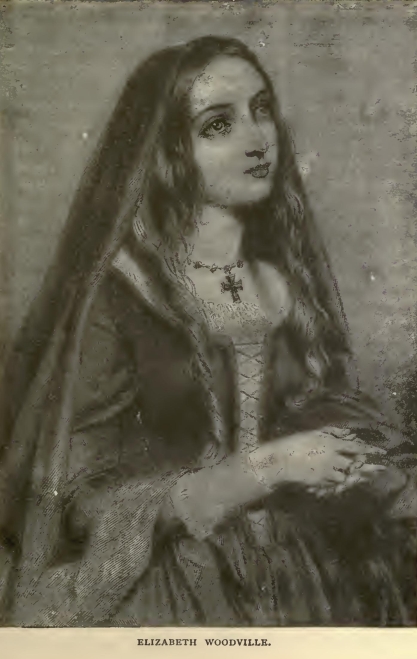
A.D. 1464. 319Elizabeth met her royal lover many times after that in the same place, and when the Duchess of Bedford, who was a most ambitious and manoeuvring mother, found out how matters stood, she arranged for a private marriage, which took place May 1, 1464, in the town of Grafton.
The king's mother became very angry when she heard of this unequal match, for she was queen at that period, and could not bear to resign her place to the daughter of a man who began his career as a poor squire. However, it was too late to lament, and in the autumn the bride was led by the young Duke of Clarence to the abbey-church of Reading, where the king took her by the hand, and presented her to the council of peers assembled there as his lawfully wedded wife. Elizabeth appeared that day in a dress of rich blue and gold brocade with a long, full train bordered with ermine. The sleeves and body were tight, and a band of ermine around the neck, and, passing down either side of the open skirt in front, displayed a rich satin petticoat. Over her yellow hair, which fell loosely down her back, she wore a lofty crown. A costly pearl necklace encircled her throat.
Queen Elizabeth soon gained unbounded influence over the mind of her husband, which she too frequently exerted for the advancement of her own relatives. She had a soft, caressing voice, and always assumed an air of humility, when desirous of gaining a point, that had its weight with Edward. The acknowledgment of the king's marriage was followed by a series of the most brilliant feasts and tournaments ever witnessed in England.
The coronation of the new queen took place at Westminster Abbey, May 26th. That morning the king had knighted thirty-two citizens, who preceded the queen's litter on horseback. After the coronation, which was conducted 320with great solemnity, a grand banquet was held, the royal couple presiding.
Elizabeth was most unfortunate in soon incurring the ill-will of Warwick, the prime minister, who had been all-powerful in England for several years. It was increased by the influence gained through her instrumentality by the various members of her family. Before long, the popular rage was excited against the Woodvilles, and England was in a state of insurrection.
A.D. 1469. The queen's father and one of her brothers concealed themselves in a forest, but were discovered and beheaded, without judge or jury. This was a dreadful blow to Elizabeth, who was warmly attached to her family. The king went north to inquire into the cause of the outrage, but could not get back for a long-time because Warwick and the Duke of Clarence kept him under a kind of restraint; however he escaped at last, and got back to London. Then Warwick and Clarence were so frightened at having interfered with the king's movements that they got away with their families as quickly as possible and went to France.
All this time the queen was safely lodged in the Tower. But it was not very long before Warwick returned to England, and Edward came so near falling into his hands again that he fled half-dressed one night just as the troops approached the castle, and embarked on board a ship at Lynn.
Elizabeth was so alarmed for her own safety and that of her family that she went at once to a gloomy monastery, called the Sanctuary, where her mother and her three daughters, Elizabeth, Mary, and Cicely, accompanied her.
A.D. 1470. It was there that the first son of Edward IV. was born. He was named after his father, and christened with as little ceremony as though he had been the son of the poorest man in the kingdom.
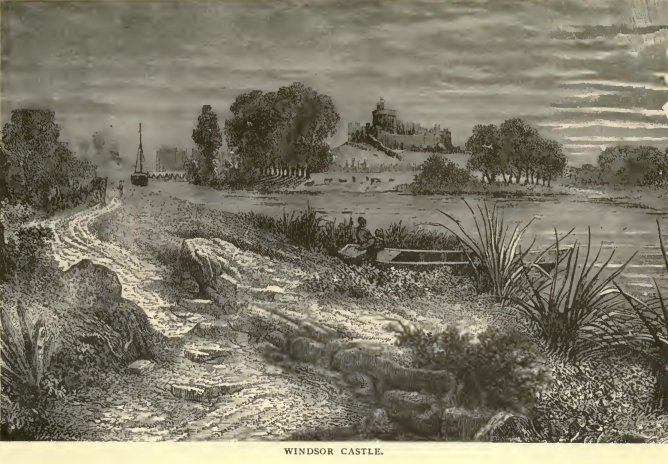
323By the time the little prince was five months old, the Duke of Clarence had parted from Warwick, and Edward returned to London, where he was warmly received. He hastened to meet his family, and removed them from the Sanctuary to his mother's palace, Castle Baynard. Several battles that he fought and won after his return put an end to so many of Edward's opponents—among them Warwick, the most formidable—that the house of York was at last firmly established in power and the rebellion crushed. Then followed several years of peace, when the royal family were settled at Windsor or at Westminster, holding court with great state and splendor.
King Edward's second son, Prince Richard, Duke of York, was born during this season of enjoyment, and when he was five years old he was formally married to Anne Mowbray, infant heiress of the Duchy of Norfolk, aged three.
The following spring the singular death of the Duke of Clarence occurred. He had been condemned to execution for an offence against the king, his brother, but one morning he was found drowned in a butt of malmsey. Clarence was in the habit of drinking to excess, and it was supposed that he fell into the butt of his favorite wine while in a state of intoxication.
A.D. 1483. In 1483 King Edward was seized with an attack of fever that resulted in death. After lying in state for several days his body was interred with great pomp in the Chapel of St. George.
Queen Elizabeth was left in a more unprotected state this time than when her first husband died. The young king was pursuing his studies at Ludlow Castle, under the care of her brother, Lord Rivers. Elizabeth proposed to the council that he should be at once escorted to London with a powerful army, but Lord Hastings, who presided, 324could see no necessity for such a step, and so, unfortunately for young Edward, it was not taken.
Meanwhile the Duke of Gloucester, who was in Scotland, caused Edward V. to be proclaimed at York, and wrote such a kind, deferential letter to the queen, that she felt she had a friend in this first prince of the blood.
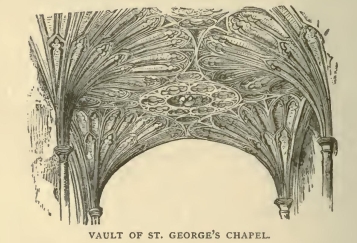
The council then commanded Earl Rivers to bring the young king to London, and Elizabeth was eagerly awaiting him, when news was brought to her that the Dukes of Gloucester and Buckingham had met him with an armed force, seized his person, and arrested Earl Rivers and Lord Richard Grey, who were with him. The poor mother could scarcely believe such an astonishing report. As soon as the Archbishop of York heard what had happened, he took the great seal and carried it to Elizabeth, assuring her that if an attempt were made to crown anybody but her eldest son he would take it upon himself to crown Richard. But, when on the following day, he saw the Thames covered with boatloads of Gloucester's soldiers, placed there to watch the queen, he regretted what he had done, and went to the 325Sanctuary, where Elizabeth had taken refuge with the Duke of York, to get the seal back again..
The 4th of May had been appointed for the coronation of Edward V. He entered the city surrounded by a retinue of the Duke of Gloucester's officers, headed by the treacherous duke himself, and, under some pretence, was lodged in the royal apartments of the Tower, the coronation having been postponed for some trivial reason.
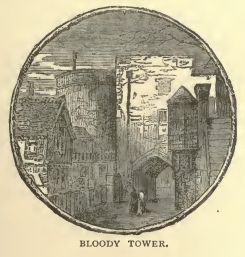
Gloucester's next object was to get possession of Prince Richard. He would have taken him by force, but the Archbishop of Canterbury took it upon himself to persuade Elizabeth to give him up. This he accomplished, after a great deal of persuasion, by working upon her sympathies and telling her of the loneliness of her eldest son, Edward, who was pining for a playmate. At last it was agreed that the child should go to his brother until after the coronation, for which preparations were going on night and day.
But the Duke of Gloucester intended that no such coronation should ever take place, so he brought shameful accusations against Elizabeth and her children, put several 326of her adherents to death, and finally had himself crowned King of England on the 26th of June.
In less than a month from that date the two little princes, whom he had kept shut up in the Tower, were murdered by his order. It is impossible to describe the agony of the poor mother when she learned the fate of her two dear little boys. She cried to God for vengeance on the wretch who had committed so foul a crime. Only a few months later Richard of Gloucester's only son, for whose advancement he had shed so much innocent blood, died.
Elizabeth was forced to submit to the will of the usurper, whose acts of tyranny rendered her existence bitter in the extreme. But she lived to see her daughter Elizabeth on the throne of England, as the wife of Henry VII., and her own restoration to liberty.
A.D. 1492. She died in 1492, attended in her last ill ness by the most affectionate care of her daughter. Her funeral was conducted with the utmost simplicity, and she was buried at St. George's Chapel, in the tomb with Edward IV. The monument is of steel, representing a double gate between two ancient Gothic towers. On a flat stone, at the foot of this monument, is engraved:
King Edward, and his Queen,
Elizabeth Woodville.
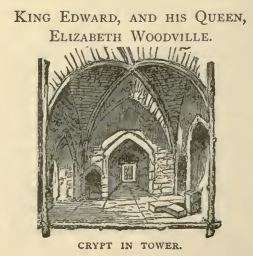
Few women living only to the age of thirty-one, have known as much suffering and sorrow as came to the lot of Anne of Warwick in that limited space of time. The greater part of her childhood was passed at Calais, but she was in England with her father, the Earl of Warwick, at intervals during the struggles between the houses of York and Lancaster, in which he took such a prominent part, and fled with him in terror after Edward IV. escaped from his clutches. The misery and danger of that flight to France came to an end at last, and then succeeded a few months of genuine happiness for this young girl.
A.D. 1470. The treaty concluding her marriage with Edward of Lancaster having been duly concluded, Anne was united to him shortly after her return to France, only to be deprived of his beloved companionship within the year, for he was killed at the battle of Tewksbury, and she was left a widow at seventeen. The Duke of Gloucester, being Anne's cousin, had seen a great deal of her during her childhood, for they were nearly of the same age, and had shared each other's pastimes. But he had such a dreadful temper, and was, besides, so disagreeable, being humpbacked and ungainly, that Anne was not fond of him. He, on the contrary, was so much in love with her, that no sooner was she free to marry than he determined to make her his wife. 328Being under the same charge of treason that included her mother and Queen Margaret, after the Duke of Gloucester, had assumed the reins of government, she was in his power. But she tried hard to elude his attentions and even went so far as to take a situation in a house in London disguised as a cook. The wily humpback found her out, however, and placed her in a convent for safe-keeping. After a time she was permitted to seek the protection of her uncle, the Archbishop of York, but his arrest left her again exposed to the persecutions of her hated cousin, who, by a series of wicked deeds, forced her at last to marry him.
A.D. 1473. The ceremony took place at Westminster in 1473, and then poor Anne was more unhappy than ever. She lived at Middleham Castle in Yorkshire, where, for a time at least, she was rid of her hated tyrant of a husband, for he was engaged fighting the Scotch, and only returned after the death of Edward IV., as mentioned in the last reign.
In 1474 the son was born for whom the Earl of Gloucester had so foully steeped his soul in crime. This child was Anne's one source of comfort and joy, and on him she lavished all her affections.
A few days after his return from Scotland the Duke of Gloucester started, as we have seen, with a troop of soldiers to intercept his nephew, Edward V., on his way to London, and proceeded with the hapless boy in his charge.
Anne joined her husband after he had caused the murder of his two nephews in the Tower, and shared the coronation for which he had committed so many shameful and outrageous deeds. The very preparations that had been made for the coronation of Edward V. served to grace that ceremony when his cruel uncle usurped his rights, and the same day Gloucester's son, Edward, was created Prince of Wales.
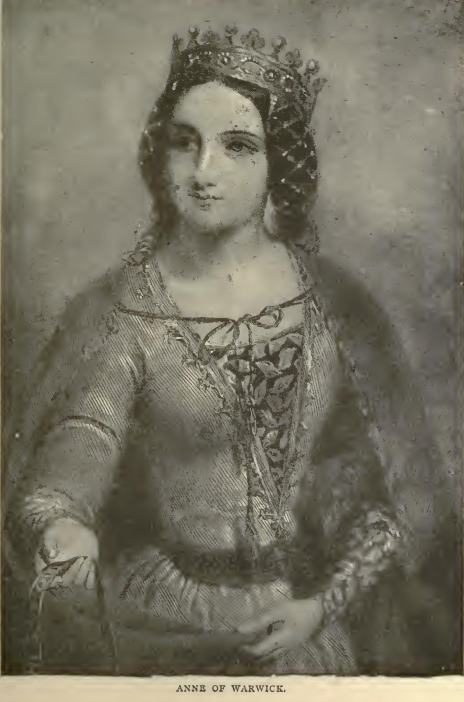
331A banquet succeeded, and every detail of the entire ceremony was conducted with great splendor. Then the royal couple, attended by the prince, passed through the metropolis in procession and took up their abode at Windsor Castle. Later they kept court in grand style at Warwick Castle for a week, and afterwards travelled through the kingdom. At York these new sovereigns were crowned once more, and soon after Richard III. was recalled to London on account of an insurrection headed by the Duke of Buckingham. Anne accompanied him, leaving her son under the protection of friends in the north, where she thought he would be safer than in London. She never beheld the child again, for he died during her absence. The shock caused by this sudden and dreadful calamity so crushed the unfortunate mother that her health began to decline.
When she was ill and suffering her wicked husband was more unkind to her than ever. He seemed anxious to be rid of her, and shed only a few hypocritical tears when she
In 1485 the heart-broken Anne of Warwick was buried at Westminster, not far from the altar.
Richard III. was killed at the battle of Bosworth within the year.
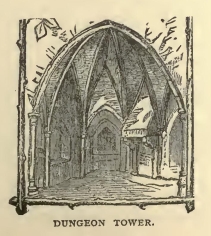
This princess was the daughter of Edward IV. and Elizabeth Woodville, whose secret marriage caused so much trouble. She was shut up in the sanctuary while her father's throne was in jeopardy, and danced at the balls given to celebrate his restoration. She was at that time only six years old, and when she reached the advanced age of nine her hand had been promised in marriage four times as a peace-offering from her father to other monarchs.
Elizabeth was well educated, for at a very early age she could read and write her own language, as well as French and Spanish. She was sixteen when her little brothers were murdered in the Tower, and her love for them had been so great that she grieved very deeply over their cruel fate. Her engagement with Henry of Richmond, who afterwards ascended the throne, turned her attention from this dreadful event somewhat. Elizabeth was separated from her mother when they left the sanctuary, and went to the court of Richard III., whose queen always treated her with great kindness and consideration.
Lord Stanley, Henry Tudor's stepfather, occupied a very high position at court, and to him the Princess Elizabeth applied for assistance in getting possession of the throne, to which she knew she had a right. Stanley had several secret interviews with the princess on this subject, and assured her that, at his bidding, his adherents in the north-
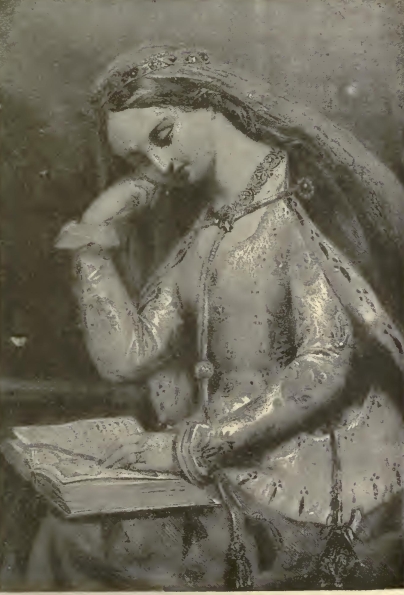
335west would fly to her side, armed and equipped for battle. But, like many of the earls of his day, Lord Stanley could not write, and he did not dare trust a public scribe with his directions. Thereupon Elizabeth assured him that if he would only dictate, and affix his seal, she would do all the necessary writing. For this purpose they met in disguise. Six letters were duly prepared and sealed, and committed to the care of Humphrey Brereton, a knight who had been attached to the cause of Edward IV. These dangerous despatches were delivered according to their directions, and on his return from the expedition Brereton met Stanley and Elizabeth at an old inn in the suburbs of London, with a party of gentlemen who had returned with him. This meeting took place at night, and when Elizabeth had satisfied herself that no prejudice existed among these men against her Lancastrian lover, she agreed to send him a ring through them as a token that he might trust himself in Stanley's power. Brereton carried this ring to Henry, who was at a monastery some miles from Rennes. The lover kissed his lady's present, but kept the messenger waiting three weeks for his answer. Henry Tudor had been a fugitive and a prisoner nearly all his life, and extreme caution had become second nature to him.
At last he consented to undertake an expedition that would either make or mar him, and sailed from Harfleur with a large fleet. He was received in England with a hearty welcome, for the people regarded him as a saviour who was to preserve them from Richard's tyranny.
A.D. 1485. On the evening of the 21st of August, 1485, three weeks after his arrival, Henry encamped with his army near Bosworth. The next day the celebrated battle was fought, which terminated the life of Richard III., and placed Henry Tudor on the throne.
After the death of Anne of Warwick Richard III. had 336sent his niece, Elizabeth, to a castle in Yorkshire, where she was kept as a close prisoner, and the first intimation she had of her royal lover's success was when the people of the neighborhood gathered about the gloomy building with shouts of joy. A guard of nobility and gentry escorted her in state to London, and she went in company with her mother to live at Westminster Palace.
Henry VII. was recognized as King of England, and crowned soon after; but he seemed in no hurry about his marriage, which did not take place until January 18th of the following year. The event was celebrated with bonfires, banquets, dancing and songs, and the prelate who performed the ceremony held a bunch of red and white roses, tied together for the first time. This was in commemoration of the union of the rival houses of York and Lancaster.
A.D. 1486. The royal couple then went to live at Winchester, where in the course of a year their first child was born. He was named Arthur, after King Henry's favorite hero and ancestor.
A.D. 1487. The birth of this prince was succeeded by his mother's coronation, which took place in November, 1487. On the Friday before that important ceremony Elizabeth went with her husband from London to Greenwich. She was accompanied on the river Thames by a grand pageant of boats, the finest being rowed by the students of Lincoln's Inn, who had beautiful music performed on their barge throughout the route, and kept side by side with that of the queen. That night was passed at the Tower, where the king created eleven Knights of the Bath, and the next day Elizabeth proceeded through the city to Westminster Palace. An immense crowd collected to behold their queen, as this was her first public appearance since her marriage. 337She was not quite twenty-two; her figure was tall and handsome; her complexion fair and brilliant. She had, besides, soft blue eyes and delicate features, set off by a profusion of yellow hair. Her costume on this occasion was a gown of white silk, brocaded with gold, and a mantle of the same material, bordered with ermine and fastened across the breast with gold cords and tassels. A close-fitting cap, formed of rich gems in a golden network, encircled her head, and her hair fell loosely around her shoulders.
The young queen was borne in an open litter, and four of the new Knights of the Bath supported a rich canopy over her head. She was preceded by four baronesses, riding on gray horses, and Henry's Uncle Jasper, as grand steward. Lord Stanley, now Earl of Derby, was high constable, and the Earl of Oxford, Lord Chamberlain. The queen was followed by her sister Cicely, who sat in an open chariot with the Duchess of Bedford, and a long train of other vehicles containing noble ladies, the rear being brought up by six baronesses on horseback. The streets were all decorated, and a chorus of children, dressed as angels, sang the queen's praises as she passed along.
The following morning Elizabeth entered Westminster Hall in a rich robe of purple velvet edged with ermine. A coronet of gold, set with large pearls and colored gems, encircled her brow. She stood under a canopy of state, and then, followed by her attendants, proceeded to the abbey. A strip of carpet over which she walked was cut to pieces and distributed among the throng assembled to gaze upon her, and so eager were they to possess themselves of this memento that several people were trampled to death. King Henry and his mother took no part in the coronation, but sat in a latticed box placed for their use, and observed both the church ceremony and the banquet, at which the queen presided, afterwards. From that time she appeared in public with all the splendor of a Queen of England.
A.D. 1489. In 1489 a little princess was born; she was named Margaret after the king's mother, who presented the infant with a silver box filled with gold pieces. At the christening a play was performed before the royal family at the palace.
A.D. 1491. The second prince, who afterwards reigned as Henry VIII., was born June 28, 1491. He was always remarkable for strength and robust health, but we shall have more to say about him hereafter.
Queen Elizabeth was so generous, not only to her own family, but to those of her subjects who brought her trifling presents of early vegetables, fruit, or flowers, that she often found herself in debt, and had to pawn her plate or jewels to satisfy her creditors. But her own wants were limited, and she managed her personal expenses with economy.
A.D. 1495. In 1495 the king and queen were in great trouble on account of the invasion of Perkin Warbeck, who was married to one of Henry's nearest relatives. This man was an impostor, but so active in his movements, appearing in quick succession in various parts of the realm, that for seven long years there was danger of his usurping the crown. At last, the battle of Blackheath decided his cause; for it was won by King Henry, and Perkin was soon after captured. Henry did not wish to shed the blood of this kinsman, but it became absolutely necessary before peace could be restored. He was therefore hanged at Tyburn, November 16, 1499. The Earl of Warwick had allowed himself to become so implicated in Perkin's schemes that he too was condemned to death; his execution took place on Tower Hill a fortnight later.
A.D. 1499. A dreadful plague broke out in England, the same year, and the king felt so alarmed for the safety of his family that he took them to Calais, where they resided for a couple of months. During that period two marriages of great importance were agreed upon. One was between the little Princess Mary, Henry's youngest daughter, and Charles, son of the archduke, Philip of Austria; the other was between Arthur, Prince of Wales, and Katharine of Arragon, but within five months, Prince Arthur was dead. The king and queen were at Greenwich Palace when the loss of their eldest son was made known to them. Each tried to comfort the other and to bear the sad bereavement with Christian fortitude. But Arthur had been a promising youth, and it was long before his afflicted mother could reconcile herself to his death.
The following January, 1502, the Princess Margaret was betrothed to James VI. of Scotland. The ceremony was performed at St. Paul's Cathedral and presided over by the queen, who afterwards led her daughter by the hand to a grand banquet prepared at the Bishop of London's Palace Margaret, who was only a little over twelve years of age remained in England to finish her education under her mother's care.
A.D. 1503. But on February 11, 1503, the gentle, pious, lovely, and dearly-loved Queen Elizabeth expired, suddenly, after a very short illness. This event cast a gloom over the whole city; the bells of St. Paul's and of all the churches in London tolled dismally, and the utmost sorrow was felt in every household.
The queen's body was embalmed and placed within the Tower Chapel where it lay in state for twelve days. Then? after mass had been celebrated, it was placed in a hearse covered with black velvet, on which was a large white cross. An image exactly representing the queen was placed in a chair above. This image was decked out with royal robes, crown, sceptre, jewels and everything just as Elizabeth had appeared when living. Four women kneeled by the chair, on top of the hearse, which was drawn by six horses, in black velvet trappings, from the Tower to Westminster.340
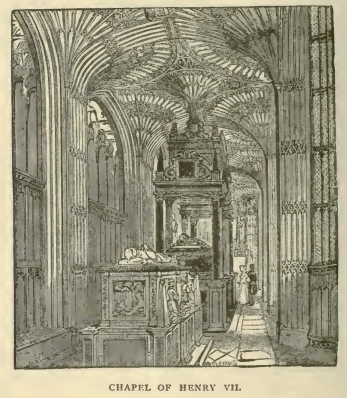
The horses were led by men robed in black; eight ladies of honor rode singly after the hearse, followed by the lordmayor, other authorities, and a long train of citizens. at every door in the city stood a man bearing a lighted torch, and at various points groups of thirty-seven virgins, that number corresponding with the queen's age, were stationed, all dressed in white and holding lighted tapers. Torches burned before all the churches, and bands of monks and nuns, singing anthems, met the funeral procession as it moved along. The Earl of Derby led a party of nobles, who preceded the hearse into the churchyard of St. Margaret, Westminster. The body was carried into the abbey, where it was placed on a dais richly covered with velvet drapery, on which the queen's motto: 'humble and reverent,' was embroidered. All the lords and ladies in attendance then retired to Westminster Palace and took supper. next morning the remains of Elizabeth were put in the grave.
Henry VII. lived seven years after his wife's death, and developed some very bad traits when her influence was removed. He had never permitted her to have any voice in the government of the realm, but in her gentle loving manner she had prompted him to many a generous, sensible action. He died in 1509, and was buried in the splendid chapel at Westminster Abbey which bears his name.341
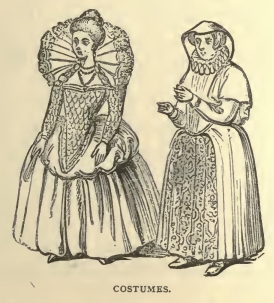
Katharine of Arragon was born when her native land was at the very height of its prosperity. Her parents were Ferdinand and Isabella, the powerful and popular sovereigns, who had conquered nearly the whole of Spain.
Katharine's early infancy was passed in a camp where Queen Isabella resided with her young family while her army besieged the town of Granada. This siege lasted for several years, but the town was taken at last; and when Katharine was four years old she accompanied her parents in their grand triumphal entry into Granada, where she lived until she went to England.
Her residence was in the Alhambra, that gorgeous palace, once the abode of the Moorish kings, always an object of wonder and admiration, even to this very day when it is almost in ruins. Part of her time was passed in the cool, shady bowers of the Generalife, the fairy palace which stood on a mountain high above the Alhambra, in the midst of luxuriant groves, fruit, flowers, arbors and hedges, such as only a southern climate can produce. It was from this home that Katharine took her device of the pomegranate, which was used during her reign in England as a decoration. This fruit was once a production of Granada, and was worked on the coat-of-arms of the Moorish kings.
Queen Isabella was the most learned princess of her time in Europe, and knew the importance of a good edu-
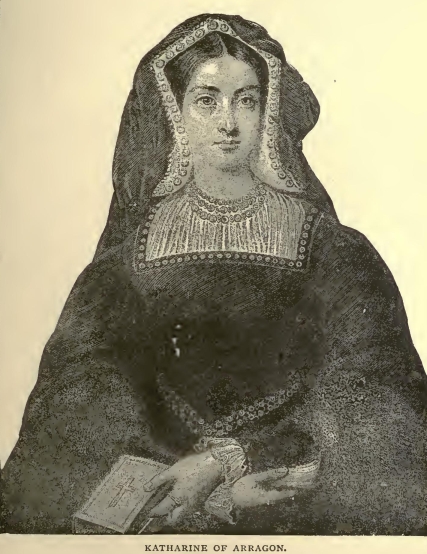
cation 345for her four daughters. Consequently she provided them with the very best tutors she could find, and they early became excellent Latin scholars. Katharine read the Scriptures in that tongue, and throughout her whole life continued to study it.
When she was sixteen years old Henry VII. of England sent ambassadors to Spain to demand her hand in marriage for his son, Prince Arthur. The union was agreed upon, and Katharine sailed with four young ladies and other attendants for Plymouth, where she was received by a crowd of nobility and gentry, who entertained her all the time she was amongst them with a variety of sports peculiar to their country. As soon as her arrival was known the king sent Lord Brook, steward of the royal palace, to provide everything for her comfort. The Duchess of Norfolk and the Earl of Surrey went to meet her also, and the former remained as her companion.
The following month the king himself set out for Plymouth, but the roads were in such a wet, muddy condition that it was several days before he reached East Hampstead, where he met Prince Arthur, who did not until then know of the arrival of his bride. Next morning they continued their journey, but had not gone far when they were met by a party of Spanish cavaliers on horseback, who stopped them, and in a most solemn manner informed them that they could not proceed further, because their Moorish customs forbade the royal bridegroom or his father to look upon the face of the bride until she stood at the altar.
King Henry was amazed. He was quite willing to observe all reasonable forms and ceremonies, but to his English ideas this seemed thoroughly absurd, and he was not willing to turn back.
He had come to a dead halt in the drenching rain on that cold November morning, and felt rather cross at having 346his progress thus interrupted. After a few moments consideration he called his councillors about him, and asked what he should do. A long discussion ensued, and the conclusion was, "that the Spanish infanta, being now in the heart of this realm of which King Henry was master, he might look at her if he liked." This suited the king precisely, and, leaving his son behind, he rode rapidly forward to the next town, where Katharine had arrived only a couple of hours before. Her retinue were thrown into a terrible state of perplexity when Henry made a request to see her, and presented himself for that purpose at the very door of her apartments. An archbishop, a bishop, and a count stood guard, and informed the king "that the lady infanta had retired to her chamber." But the more opposition he met with the more his curiosity was aroused, and the more determined was he to see the bride. He declared that "if she were even in bed he meant to see and speak with her, for that was his mind and the whole intent of his coming."
There was nothing more to be said, and further opposition might have given serious offence to the monarch, therefore the infanta dressed herself and admitted him. The interview must have been rather unsatisfactory, because neither could speak the language of the other; however somebody must have interpreted what was said, for King Henry seemed much pleased.
He withdrew, to change his damp garments, and within half an hour presented himself again at Katharine's door, this time with the prince, who had followed him. In the presence of several bishops and nobles the young people went through the ceremony of betrothal, which was done in Latin, and therefore understood by both. After supper the king and Prince Arthur returned to the infanta's apartments, where the evening was passed in music and dancing, 347
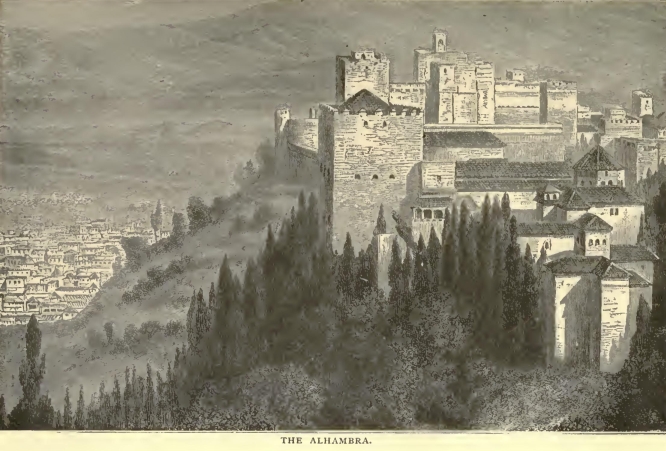
interspersed with singing by the minstrels. Prince Arthur could not join in the Spanish dances, but he knew the English ones, and went through the figures with one of the ladies of his own country.
Katharine continued her journey next day, and on her arrival at Kingston was met by the Duke of Buckingham on horseback, the Earl of Kent, Lord Henry Stafford, the Abbot of Bury, and four hundred dukes and gentlemen, in the Stafford livery of scarlet and black, who came to welcome her into the realm. She rested at that place all night, and was escorted to Kensington Palace next day by Buckingham and his train. There she stopped until the Spanish retinue, as well as all the nobility of England, could make the necessary preparations for her grand entry to London.
In the meantime King Henry went to meet his wife at Richmond, and to tell her what he thought of their new daughter-in-law. The royal couple then came down the Thames, in a barge, with a party of ladies to welcome the stranger.
Three days later the infanta entered the city by London Bridge, riding on a large mule, according to the Spanish custom. The Duke of York rode on her right and the pope's ambassador on her left. She had on a broad, round hat, the shape of those worn by cardinals, tied down at the sides with a scarf of gold lace. Under this hat was a closely-fitting red cap, and her long dark hair streamed over her shoulders. Her four Spanish damsels followed on mules, each led by an English lady, dressed in cloth of gold and riding on a small horse. After these came the whole grand procession, and all advanced to Bishop's Palace.
A.D. 1501. Four days later the marriage ceremony was performed at St. Paul's Cathedral, on a platform six feet high and large enough to hold eight persons. The were present at the ceremony. The king and queen sat in a box that had been built for their use near the platform. After the ceremony the bride and bridegroom followed the churchmen to the high altar, where mass was celebrated. Standing in the great doorway of the cathedral, Prince Arthur endowed his bride with one-third of his property. The princess was then led by her brother-in-law, young Henry, to the Bishop's Palace of St. Paul's, where a banquet was spread. The newly-wedded couple were served 350bride, who never entirely gave up her Spanish style of dress, wore a closely-fitting cap of white silk, from which hung the Spanish mantilla, embroidered with gold, pearls and precious stones, that almost concealed her figure. Her body and sleeves were made very full, and she wore a large hoop under her skirts.
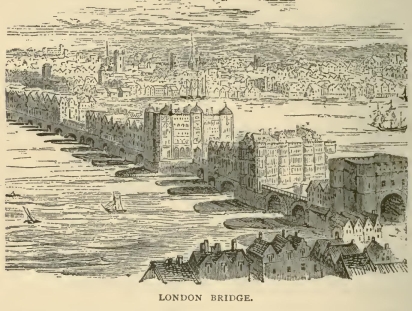
Prince Arthur was dressed in white satin. The Archbishop of Canterbury and nineteen bishops and abbots 351on gold plate, ornamented with pearls and precious stones, valued at twenty thousand pounds.
The following week a grand tournament was held in the open space in front of Westminster Hall. There was a stage erected for the royal party. On the right entered the king and his lords; on the left, the queen, the bride, and their ladies, and took their seats on richly embroidered cushions, under a canopy draped with cloth of gold. The places, that were arranged one above another, in rows like those in a circus, to form an enormous circle, were so packed with people that only their heads could be seen. Presently loud blasts from the trumpets announced the arrival of the knights, who were borne into the arena under fanciful canopies. The Earl of Essex sat in a pavilion among trees, flowers, and rocks, with curious-looking animals climbing up the sides. A handsome young lady, fantastically dressed, stood on a green hill above the earl. The Marquis of Dorset appeared in a pavilion all draped in gold, wearing a complete suit of armor. Lord William Courtenay rode an enormous red dragon, led by a giant carrying a tree in his hands. There were twenty or thirty in all of these curiously-adorned knights, who marched around the arena to the delight of the audience, and then engaged in a tilt that caused many a bruise and scratch, but no serious damage to anybody.
When evening came on the royal company withdrew to Westminster Hall. At the upper end was a dais with elevated seats for the king, queen, the bride and groom, and the king's mother. All the ladies sat on the left side and the gentlemen on the right, and the nobility, who were not engaged in the performance or ballets that followed, took their places on the king's side of the hall according to their rank. When a couple desired to dance between the entrances of the regular performers, the gentleman would 352advance to the front of the dais from his side, the lady would do the same from hers, and after a few minutes' dancing return to their respective places. The first pageant was a full-rigged ship drawn in on wheels. The mariners performed their duties as though they were really at sea, and used only seafaring terms. Next came a castle all lighted up inside, eight young women appearing at the windows handsomely attired in the newest styles. At the top window of the castle sat a lady in Spanish costume representing Katharine of Arragon. The princess must have been amused when she saw her double, who sat up quite haughtily, while two gentlemen courted her and sought in every possible way to gain her favor. For a while she treated their attentions with disdain, but at last, as in all ballets, matters took a favorable turn; the ladies came out of the castle, were joined by the sailors from the ship, and the whole party danced a grand set of exceedingly pretty figures, and then disappeared into the castle again. This structure was drawn by marvellous gold and silver lions harnessed with massive gold chains. But we must explain what these beasts really were. In each one were two men, one in the fore and the other in the hind quarters, so completely hidden that nothing appeared of them but their legs, which were made to look like those of the real lions. Then Prince Arthur danced with his aunt, the Princess Cicely, Henry, Duke of York, with his sister Margaret, and Katharine with one of her Spanish ladies. There was considerable difference in the two styles of dancing, for the English movements were quick and lively, while those of the Spanish were slow and stately, resembling a minuet. The king and queen were much pleased with these performances of their children, and watched them with a great deal of pride.
At a grand dinner given in Parliament Chamber on the 353
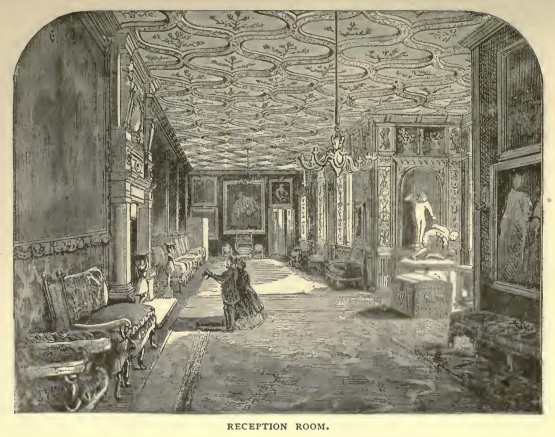
following Sunday, Katharine distributed the prizes won in the tilt. To the Duke of Buckingham she gave a valuable diamond; to the Marquis of Dorset, a superb ruby, and to the others, rings set with precious stones. 355
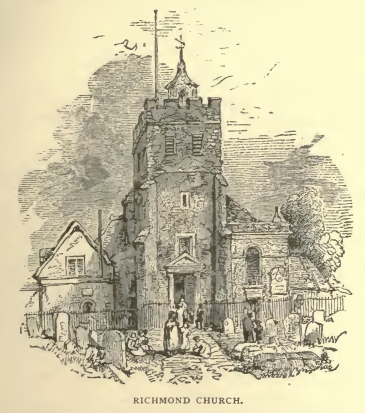
A week later the court went to Richmond, where, after mass on the first Sunday, they all assembled in the gardens and played games of chess, backgammon, cards, and dice, while some Spaniards entertained them with tumbling and dancing. In the evening a huge rock was drawn by three sea-horses into the grand hall, where the ladies and gentlemen were assembled. On either side of the rock were mermaids made of shells, and inside of the figures were the 356sweet-voiced children who sang in the king's chapel. These could not be seen, but their harmony filled the air as the rock was drawn slowly through the whole length of the hall. When it reached the platform on which sat the royal family, a large number of white doves flew out, and live rabbits ran about the hall, causing great shouting and merriment. King Henry closed the entertainment by making rich gifts of plate to the lords and ladies from Spain, who then took leave of their princess, as they were going back home.
Katharine looked very sad after they had left her, and the king observing this sent word for her and her ladies to join him in his library. There he showed them all the pretty English and Latin books that he thought would please them, laughed and chatted in a kind friendly manner with his daughter-in-law, and then asked her to select some jewels from a lot that he had ordered for her. After she had made her choice, he distributed the rest among her ladies, and so won Katharine's heart by his warm, affectionate treatment that she ceased to feel depressed in her English home.
A few months later the princess went with her husband to Wales, where they were to have a little court of their own similar to the one at Westminster. Katharine performed the journey on horseback, and when she felt fatigued she rested on a litter, borne between two horses. This was the only mode of travelling before turnpike roads were made.
The Prince and Princess of Wales made themselves very popular in their new home, but they did not stay there long, for Arthur was taken suddenly ill, and died of the plague the following April, 1502, just six months after his marriage.
A.D. 1502. The queen was sorely grieved at the sudden death of her eldest child, but she did not forget to sympathize with the young widow left alone in a strange land, the language of which had hardly become familiar to 357her ear. She sent for her immediately, and had her brought to London in a litter covered with black velvet and black cloth that must have looked very like a hearse, and settled her in a palace called Arragon House, where she spent part of her widowhood. Her marriage portion consisted of two hundred thousand crowns. Half the sum had been paid, and her parents being unwilling to pay the other half, requested that their daughter should be returned to them. But Henry VII. wanted to get hold of the other half of his daughter-in-law's portion, he therefore proposed a marriage between her and his younger son Henry. This was accepted by the sovereigns of Spain, providing a dispensation from the pope could be obtained. This was necessary on account of the relationship.
Katharine seems to have been very unhappy at this time, and wrote her father that she had no desire to marry again, adding, "that she did not wish him to consider her tastes or wishes, but to act in all things as suited him best."
Such dutiful conduct excites our surprise when we consider that she was the principal person concerned. It seems quite natural that at the age of eighteen she should have objected to a union with a boy five years younger, even though he had not been so nearly related to her.
Notwithstanding her objections, two such diplomatists as King Ferdinand and Henry VII. were pretty sure to arrange matters to suit themselves, and about a year after Katharine became a widow, she was betrothed to the young prince. Six years elapsed before the marriage was celebrated, during which period Henry VII. died, and his son Henry ascended the throne. Immediately after this event he assured the Spanish ambassador of his attachment to Katharine, saying that he loved her better than any other woman in the world.
There was a great deal of discussion among the church{358]men on account of the relationship existing between Henry and Katharine, but at last all difficulties were overcome and they were married. A few days later the coronation took place at Westminster.
A.D. 1510. On this occasion the streets of London were as usual all decorated, and part of the way to the abbey was lined with young maidens dressed in pure white, bearing palms of white wax in their hands. They were attended by priests swinging silver censers as the king and queen passed by. Katharine was attired as a bride in white embroidered satin-, her dark hair fell in rich profusion down her back, and on her head she wore a crown set with rich jewels. She was seated in a litter covered with white cloth of gold, borne by two white horses, and was followed by all the noble ladies of England in little chariots. After the coronation a grand banquet was spread in Westminster Hall. The king and queen were served on an elevated platform at the upper end of the hall, while several ladies of high rank sat at Katharine's feet holding her pocket-handkerchief, table-napkin, fan and purse. At the end of a week the festivities came suddenly to an end on account of the death of the king's grandmother. Then a pestilence broke out in London, and the court removed to Richmond Place, where Henry planned all sorts of performances, parties and masquerades, in which he enjoyed taking part. Katharine did not care so much for that kind of diversion, for she was naturally quiet and studious, and felt more interested in practical employment.
At one of the Christmas festivals the king slyly left her side during the progress of a tournament, and returned in the disguise of a knight, astonishing all the company with the grace and skill of his tilting. The applause he received induced him to take part often in these exercises, and when he would present himself before his wife in different 359disguises she good-humoredly pretended to be very much mystified. Once he entered her room with several nobles dressed as Robin Hood and his men, and another time when the foreign ambassadors were invited to dine at court Henry conducted his wife to her throne, then suddenly disappeared, and in a few minutes returned with the Earl of Essex, both disguised as Turks, while other nobles followed him in Russian, Persian and Moorish costumes, the last having their faces blacked. The king's beautiful sister, Mary, with several of the court ladies, danced a ballet in mask, which amused Katharine very much, particularly as the princess was attired like an Ethiopian queen. In all the decorations used on these occasions the pomegranate was mingled with the roses of York and Lancaster, and the Tudor device of the hawthorn with its scarlet berries.
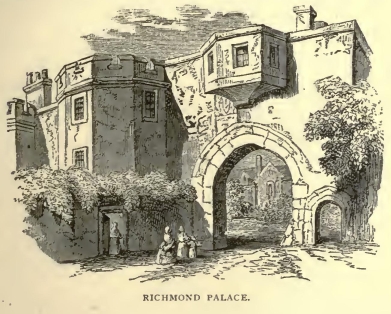
At the close of the year 1510 the queen had a little boy, 360and he was named Henry. The king was so much pleased at this event that a grand tournament was given to celebrate it. In the evening a nobleman came to inform the queen that there was a gold arbor full of ladies who had prepared something for her entertainment. Katharine answered very graciously "that both she and her ladies would be happy to behold them and their pastimes." Then a large curtain was drawn aside, and an arbor moved forward. It had posts and pillars covered with gold and twined with branches of hawthorn, roses and eglantine, all made of satin and silk, the colors of the different flowers. In the arbor were six beautiful young girls in white and green satin dresses, covered with the letters H. and K. knit together with gold lacing. Near the bower stood the king himself, with five lords dressed in purple satin, likewise covered with the gold letters H. and K. Then they all danced before Katharine, and while they were thus engaged a very different scene was going on at the other end of the hall. The golden arbor that the ladies left for the dance had been rolled back close to where a large crowd of Londoners had gathered to see the grand doings at court, as they always did in those days. They began to finger the ornaments, and finally to pluck them off until they had entirely stripped the bower. The chief steward tried to prevent this destruction, but not wishing to disturb the ballet by using violence he failed entirely. Meanwhile the king finished his performance, and feeling in an excellent humor at its success he called to the women in the crowd to come and help themselves to the golden letters from his dress and that of his company. Little did he imagine what would be the result of this order, for scarcely was it given than the whole assembly rushed forward like a mob, and seized not only on him but all his guests, helping themselves to every glittering ornament that was in sight 361They even went so far as to take the jewels of the ladies, and to strip the king of most of his fine clothing. One of the gentlemen was left with nothing on but his flannels. It was amazing what a clean sweep was made in a few minutes of all the finery. At last the guards succeeded in clearing the hall without bloodshed, and the king laughing heartily handed his wife to the banquet in his own chamber, where the court sat down in their tattered condition, treating the whole scramble as a frolic. No doubt the young king had received a lesson by which he profited later. A few weeks after his birth the young prince died, much lamented by everybody at court.
The following year Henry invaded France in person, leaving the queen not only with the reins of government in her own hands, but making her besides captain of all his forces, with the assistance of five nobles. During the king's absence the Scots invaded his kingdom, but were repulsed. It is remarkable that two of the greatest victories gained over that nation were those of Neville's Cross and Flodden Field, both fought under the management of queens in the absence of their husbands.
After the battle at Neville's Cross Katharine went on a pilgrimage to Walsingham shrine, and returned just in time to welcome her husband, who took her by surprise at Richmond, where there was a most loving meeting between the royal couple. He had travelled through his realm in disguise, therefore the queen had not been informed that he was coming so soon.
A.D. 1514. Henry had been victorious in France, and the war ended there by the marriage of his beautiful young sister Mary and Louis XII. Anne Boleyn, who was then a young girl, went with the bride as her attendant.
Mary was in love with the Duke of Suffolk when she was forced into this marriage with the King of France. In less 362than three months the young husband died, and then the duke, who was sent to France to take care of the widow and her property, married her. Henry VIII. was very angry at first at the sly way in which this love-affair had been managed, but Katharine made peace between the brother and sister, and invited the young couple to Greenwich Palace, where she entertained them with a grand festival.
On the first of May the king gave a party, which was conducted in this way: Katharine, with the young bride and all the court ladies, rode from the palace to Shooter's Hill, where the king, with the archers of his body-guard, met them, dressed like Robin Hood and his outlaws, and begged that the royal party "would enter the good greenwood and see how outlaws lived."
Katharine graciously consented, and was led to a rustic bower, covered with hawthorn boughs and spring flowers, where a fine breakfast of venison and other good things was laid out. This lodge in the wilderness delighted all the ladies, and a couple of hours were very pleasantly passed in eating and chatting. On their return to Greenwich they were met by a car, all decorated with natural flowers and ribbons, and drawn by five horses. Each horse was ridden by a fair damsel, dressed in gay colors, and in the car, amidst garlands of flowers, stood lady May, attended by the goddess Flora. As soon as the queen appeared at the foot of the hill these young girls began a hymn about the return of spring, and preceded the royal party all the way home, singing as they moved along.
A.D. 1520. Queen Katharine had two royal visitors at her palace. One was Queen Margaret, widow of James IV. of Scotland, who took refuge with Henry VIII. from the troubles in her own country; the other was her nephew, who afterwards became so illustrious as the Emperor 363
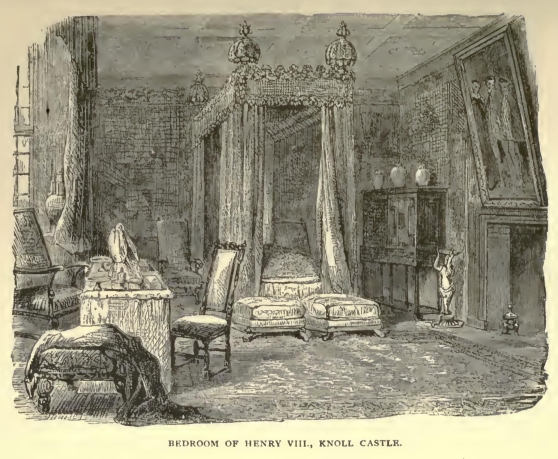
365Charles V. The latter spent several days with his aunt, who entertained him royally, then proceeded with the English Court to that congress with the King and Queen of France known on account of its splendor as the Field of the Cloth of Gold. At that meeting the carpet beneath Katharine's throne was all embroidered in pearls, and the decorations of the camp were of corresponding magnificence.
At that time Katharine formed a warm friendship for Queen Claude of France, surnamed the Good, a lady of superior intellect and taste. Henry and King Francis also became very much attached to each other, though that did not prevent their fighting when an opportunity offered.
When Charles V. parted from his Aunt Katharine she presented him with a beautiful English horse, and a saddlecloth, of gold tissue, bordered with precious stones. On his return home, he often spoke of Katharine's happiness in having married so grand a prince as Henry VIII.
While Queen Katharine was in power several improvements were made in England, particularly in the cultivation of fruit and flowers. During the wars some of the finest trees had disappeared entirely, but Katharine had them replanted, as well as salad, cabbage and carrots, which she imported for that purpose from the Holland.
An old rhyme says:—
"Hops and turkeys, carps and beer,
Came to England all in one year."
We cannot help wondering why hops were cultivated, because Henry VIII., who interfered in all the most trifling concerns of his subjects, forbade them to put hops in their ale. The turkeys were brought from North America by a lieutenant in Sebastian Cabot's voyage of discovery.
Before giving an account of Katharine's wrongs and 366sufferings, which began after she had been married about ten years, let us see how both she and King Henry VIII. are described by people who lived in their time.
Sebastiano Giustiniani, an Italian who lived in England, says, writing in 1519:—
"His majesty is about twenty-nine years of age, as handsome as nature could form him,—handsomer by far than the King of France. He is exceedingly fair, and as well-proportioned as possible. When he heard that the King of France wore a beard he allowed his to grow also, which, being somewhat red, has the appearance of being of gold. He is an excellent musician and composer, an admirable horseman and wrestler. He possesses a good knowledge of the French, Latin, and Spanish languages, and is very devout. On the days when he goes hunting he hears mass three times, but on other days as often as five times. He has vesper service every day in the queen's chamber. He is uncommonly fond of the chase, and every time he attends one he tires out eight or ten horses, stationed at different places where he proposes to stop. When one is fatigued he mounts another, and by the time he returns home they are all used up. He takes great delight in bowling, and it is the pleasantest sight in the world to see him engaged in this exercise with his fair skin covered with a beautifully fine shirt. Affable and benign, he offends none, and has often said to his ambassadors that he wished every one were as content with his condition as he was."
Katharine was then about thirty-four, but looked no older than her husband, because he was a robust, burly man, while she had a slender, stately figure. Her face was oval, features regular, with a sweet, calm look, though rather heavy. Her forehead was unusually high, and she had large, dark eyes, and a bright brunette complexion. She usually wore a five-cornered cap, bordered with rich gems, that stood up 367around her head like a crown, and came down the sides of her face, covering the ears. From this cap hung the black Spanish mantilla, and around her throat, waist and wrists were clusters of rubies, linked together with strings of pearls, pendants of the same from the belt, reaching almost to her feet. In one of her portraits she is represented in a robe of dark-blue velvet, with a long train, bordered with sable fur, straight sleeves, with ruffles around the hand, loose hanging sleeves over them, and a petticoat of gold-colored satin, that shows beneath the velvet dress, raised on one side.
Katharine was very pious, self-denying, and almost a nun in her performance of religious duties. She would rise at different times of the night for prayers, and always dressed for the day at five o'clock in the morning. She wore the habit of the St. Francis order of nuns beneath her royal robes, and unlike the ladies of the present day, she was often heard to say that she considered no part of her time so much wasted as that passed in dressing and adorning herself.
She fasted on Fridays and Saturdays and on all the saints' days, confessed every week, and received the Eucharist every Sunday. For two hours after dinner one of her attendants read books on religion to her.
Notwithstanding this devotion Katharine enjoyed lively conversation, and often invited Sir Thomas More, whose society gave her great pleasure, to her private suppers with the king. She was fond of needle-work also, and left some rich specimens of her skill, that were for a long time preserved in the Tower.
Although she took great interest in all English customs, and tried to make her subjects forget that she was a foreigner, she never could fancy field-sports, though Henry expressed great displeasure because she would not mount.368
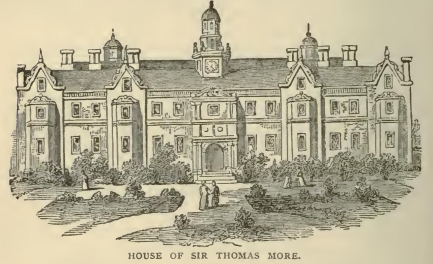
Cardinal Wolsey occupied a prominent position in England at this time, and he was a very good friend to Katharine until she felt compelled to express her opinion of a certain bad action of his, which was brought about in this way: One day the Duke of Buckingham was holding the basin for the king to wash his hands when the cardinal poked his in also. The duke became very indignant at such presumption, for he considered it beneath his dignity to perform such an office for anybody but his sovereign; he therefore flung the water all over the cardinal's feet, whereupon that worthy prelate scowled revengefully, and angrily a horse and hunt as Englishwomen did. For his sake she pretended to like games, though she really had little taste in that direction. Even after her misfortunes began, the great Erasmus said to Henry: "Your noble wife spends the time reading the sacred volume which other princesses occupy with cards and dice." That renowned scholar always held her up as an example to her sex, and dedicated a very important work to her, called "Christian Matrimony." 369threatened punishment. He carried it into effect, and succeeded in causing the execution of the duke on a charge of treasonable sorcery.
Buckingham had been one of Katharine's earliest friends in England, and she could not help remonstrating against the injustice of his sentence. She even pleaded for him with the king, but failed. Wolsey's opposition was too strong, so Katharine revenged herself by openly censuring his cruel conduct, for which he never forgave her.
The next year Charles V. visited his aunt again at Greenwich Palace. He came really for the purpose of urging the king to make war against France, though he pretended that it was to engage himself to his little cousin, Princess Mary, then only six years old.
Queen Katharine met him at the hall-door, with her daughter by her side, and blessed him as he kneeled down before her. He stayed in England six weeks, and the result of his visit was more fighting in France.
Then Anne Boleyn returned home, and was appointed maid of honor to Queen Katharine. She was a great beauty, and such a belle at court that unhappily Henry fell in love with her. But he did not make his feelings known just then because the queen's health was very bad, and no doubt he flattered himself that she might accommodate him by dying, and thus spare him the trouble of a divorce. However she grew better, and then, with Wolsey's assistance, Henry began to make plans for ridding himself of her. His first step was to complain to his confessor that his conscience troubled him for having married his brother's widow, but it seems strange that that inward monitor had been silent for so many years. He set spies to watch Katharine's actions, hoping, no doubt, that something might be discovered to help his cause; but he was disappointed, and the queen was secretly informed of his intentions. 370Naturally she was very indignant, and wanted to consult her nephew, Charles V., as to what she ought to do. For that purpose she sent a faithful servant, but he was stopped on the way by one of Wolsey's agents.
She then expressed her intention of going to law about the matter, and consulted her confessor, hoping that it would be laid before the church. The poor, friendless woman might have known that she could scarcely look for justice in a land not her own against a popular sovereign and his all-powerful adviser. She had an interview with her husband, but he put her off with deceitful excuses and fair promises, and she was forced to await patiently whatever his pleasure might prompt.
In the meantime a pestilence broke out in London, and several of the royal household died of it. This so alarmed Henry that he made thirty-nine wills, confessed his sins every day, and passed most of his time in penitence and prayer, his only recreation being the mixing of medicines and the compounding of plasters and ointments. He even sent Anne Boleyn home to her relations. But no sooner did the pestilence disappear than his jovial spirits returned, and he began to write daily love-letters to his favorite. Wolsey, to aid the king's divorce, had made the pope believe that Katharine wished to retire from the world and lead a religious life, and it is possible that he thought she might be persuaded to do so.
A.D. 1528. She did not know of this deception until Campeggio, the pope's legate, arrived in England in 1528. Then, in order to disprove it, she adopted a different course of conduct, became gay and lively, and encouraged all sorts of diversions among her court ladies. She tried to make herself popular with her subjects too, by being more gracious than before, and appearing oftener in public. This behavior was turned against her by the king's council, t 371who were told that the queen was only gay because her husband was sad, and that she was conspiring for his death and that of his cardinal. Thereupon they advised Henry to separate himself from her entirely, and to remove the Princess Mary from her guardianship. This piece of malice was a sting bitterer than death.
Katharine knew that Wolsey was her chief persecutor, and did not hesitate to charge him with all her troubles as well as with being an enemy to her nephew, Charles V.
That emperor was very much distressed when he heard of the turn affairs had taken, and declared that if the pope decided against his aunt he would not complain, but if not, he would support her and her daughter as far as possible.
In May, 1529, there was a solemn court held in the great hall of the palace at Blackfriars, Wolsey and Campeggio presiding. Each of the prelates was seated in a large chair, covered with rich tapestry, near a long table. On the right was a canopy with a massive chair for the king, and on the left a similar one for the queen. Henry did not appear at first, but Katharine entered the hall, attended by four bishops and a train of court ladies, to say that she would only accept the decision of the pope, because the cardinals who were present were too prejudiced to be just. She then left.
After several weeks of discussion the king and queen were both summoned to appear in court. When the crier called: "Henry, King of England, come into court," he answered distinctly, and standing up beneath his canopy, spoke of the virtues of his wife and of his unwillingness to part from her, excepting to soothe the pangs of his conscience. Then Katharine was called. She was already present, seated in her chair, and merely rose to explain that the action of the court was illegal, stating reasons why such was the case. 372Her name was called again. Then she rose a second time, and walked around the table the whole length of the court, until she came to where the king sat. Kneeling down before him, she made a most touching appeal, begging him to take compassion on her, a stranger in his land, and let her have some justice. She also requested him to suspend the trial until she could hear from her family in Spain and get their advice.
After she had finished her long address to the king, she made a low bow, and with a dignified air slowly marched out of court. As she moved away, her name was called several times, whereupon the person on whose arm she leaned said: "Madam, you are called back."
"I hear it well enough," she replied; "but on—on—go you on, for this is no court wherein I can have justice."
Her appeal to the king had made such an impression on all present that he made a long speech, lamenting "that his conscience should urge the divorce of such a queen who had ever been a devoted wife, full of gentleness and virtue." The members of his council knew well that he was not speaking the truth, but they did not dare to tell him so. As Cardinal Wolsey was still a favorite, the king closed his harangue by an assurance that he was in no way to blame for the desired divorce.
A week later Katharine was summoned to court again, but refused to obey, and with her own hand wrote an appeal to the pope. The cardinals had done all they could think of to get the queen to consent to a divorce, and being at a loss how to proceed, they took a vacation of three months. At the expiration of that term the two cardinals went to Bridewell, and requested a private interview with Katharine. She received them courteously, impressed upon them her forlorn situation in a foreign land, deprived of counsel, and told them that she would be 373grateful if they would advise her how to act. She then withdrew with them to a private room, where they remained for nearly an hour in earnest conversation. She must have argued her case well, for both the cardinals were won over to her side, and would never say another word against her. This was the only cause for offence that King Henry ever had against Wolsey, who ceased, from that moment, to be his favorite.
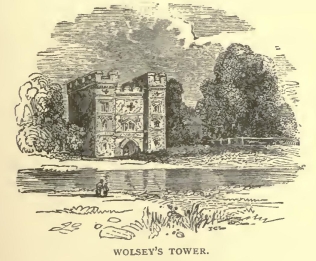
When the court met again, the king was very angry to hear that the question of his divorce must be referred to the pope. He wanted it settled in his way and in England. Shortly after, Wolsey had an interview with the king, which proved his last.
The king and queen passed Christmas together at Greenwich with the usual festivities, and seemed to be on very good terms, he treating the Princess Mary very tenderly, and showing Katharine the respect due the Queen of England.
Henry had an object in this; he wanted his wife to withdraw her appeal from Rome, and let the matter be decided 374in England, but she refused. Then he got angry, put a sudden stop to the court diversions, and retired to the palace at Whitehall that he had just taken from Wolsey.
Later, he sent a message to the queen entreating her to "quiet his conscience." She replied: "God grant my husband a quiet conscience; but I mean to abide by no decision excepting that of Rome."
This answer put the king in a perfect fury. After the festival of Trinity he accompanied the queen to Windsor, but left in a few days, and sent her word to be out of the castle before his return. "Go where I may," was the reply of the forsaken queen, "I am his wife, and for him I will pray!" She immediately left Windsor Castle, and never again beheld her husband or child. She went to reside at Ampthill, whence she wrote her daughter letters full of most excellent advice, always praying her to submit to her father's will. Her reason for this was that she wished the child to keep in the king's good graces, knowing that he would some time or other acknowledge her rights. Once, on hearing of Mary's illness, Katharine wrote to Cromwell for permission to see her, but was cruelly refused.
Finding at last that the decision at Rome was likely to be against him, the king induced Dr. Cranmer, who had just been made Archbishop of Canterbury, to conclude the long agitated question of the divorce by granting it. At the commencement of the following year he married Anne Boleyn, and there were insurrections raised in many parts of the kingdom on account of it.
Had Queen Katharine not been such a good woman she might have given the king a great deal of trouble by heading a party against him, particularly as the House of Commons had requested him to take her back. At the end of several months Cranmer succeeded in getting the divorce 375settled; but the sorrow and anxiety that poor Katharine had suffered had broken down her health, so that when Lord Montjoy went to inform her that she was no longer Queen of England, but dowager Princess of Wales, he found her very ill in bed. She declared that she had been crowned and anointed queen, and would be called by that title as long as she lived, and no bribes or threats would move her in the least. She forbade her servants to take an oath to serve her as Princess of Wales, and many of them were obliged to quit her service because they would not disobey her. Those who remained were excused from taking the oath at all.
Katharine always judged her rival in the most charitable light, and seemed to think her an object of pity. Once when one of her women cursed Anne Boleyn, because she saw how troubled her mistress was, Katharine said: "Hold your peace! curse her not, but rather pray for her, for even now is the time fast coming when you shall have reason to pity her and lament her case."
Katharine had removed to Buckden, where she passed her time in praying and deeds of charity, or embroidering for the churches. After a while she regained her peace of mind, and made herself greatly beloved by the country people, who visited her frequently, and showed her the deepest respect. Other messengers were sent to her from Henry, requesting her to call herself Prince Arthur's widow, and to resign the title of queen. This made her very angry, and she declared that she was the king's wife, not his subject, and would be called queen until she died. She was the only person in the realm who dared to defy the king; she had lost his love, but not his esteem. Anybody at court who was known to speak in Katharine's favor was either locked up in the Tower or executed, and a perfect reign of terror was the result. When she heard 376how her friends had suffered on her account her health grew worse, and as she was anxious to live for the sake of her daughter she sent a request to the king to appoint her a residence nearer London. He named Fotheringay Castle, a place that was notoriously unhealthy. But Katharine absolutely refused to go there, and after a great deal of opposition on the part of the king's agents she was removed to Kimbolton Castle, deprived of many comforts that her ill-health made necessary for her. One serious cause of distress to Katharine was the imprisonment of her two confessors, who, simply because they took sides with her, were subjected to the most cruel torments.
A.D. 1536. By the end of the year the queen was on her death-bed. When she knew her end was approaching she sent an entreaty to Henry that she might be permitted to see her child and give her a blessing. It was refused. A few days before she expired Katharine called one of her maids to her bedside and, dictated a farewell letter to the king, in which she pardons him for all the misery he has caused her, and prays that God may also pardon him. She commends their daughter Mary to his care, and begs him to be a good father to her. And in conclusion she requests marriage portions for her three maids, and a year's extra pay for all her other servants lest they should be unprovided for. Henry shed tears on reading the letter, and sent Eustachio, the Spanish ambassador, to attend Katharine's death-bed. He and Lady Willoughby, the friend and countrywoman of the queen, who hastened to her at the last, were the only persons present when she passed away. In her will she left a few legacies, but her income had been so cut down during the last few years of her existence that she had not much to dispose of. She mentions her dresses that Henry kept when she was so brutally turned away from his palace, and begs that they be used for church 377ornaments. She was buried at Peterborough Abbey, and for several years a canopy covered with a black velvet cloth, on which was embroidered a large silver cross and the Spanish coat-of-arms, stood over the grave.
Henry had a solemn service at Greenwich on the day of Katharine's burial, at which he appeared with his attendants in deep mourning, and commanded all his court to do the same. Anne Boleyn dressed herself and all her ladies in yellow instead, and heartlessly laughed over the death of the queen. "I am grieved," she said, "not because she is dead, but for the vaunting of the good end she made." She had reason to speak so, for nothing was talked of but the Christian death-bed of Katharine, and many books and papers were written in her praise.
A short time after her burial some of her friends ventured to suggest to the king that a monument ought to be erected to her memory. He answered: "That he would have to her memory one of the goodliest monuments in Christendom." This was the beautiful abbey church of Peterborough, for when Henry VIII. caused the destruction of all the convents and monasteries in England he spared that one because it contained Queen Katharine's remains. Through all her bitter trials no enemy was successful in tarnishing Katharine of Arragon's good name, but Shakspeare is the only writer who has properly appreciated her moral worth.
Anne Boleyn was one of the beauties of the court of Katharine of Arragon, and was particularly attractive to the king on account of her wit and her fondness for pageants and masquerades, in which she took a leading part. Henry performed at these entertainments, also; thus these two were often thrown together, and the lady's vanity and ambition were flattered by the attentions he paid her.
She was an Englishwoman by birth, though of French descent on her father's side. Her mother died when she was only eleven years old, and she was taken charge of by a French governess called Simonette. She was carefully educated, and excelled in music and needlework. Besides, she wrote both French and English letters to her father when he was away, and that was an accomplishment very rare among ladies of the reign of Henry VIII. {[A. D. 1514.]} It was probably on account of her superior knowledge that she was selected to go with the young Princess Mary to France when she married Louis XII., and her knowledge of the language must have been of great service to the young girl, who could speak only English. They had a very stormy voyage to Boulogne, and had to go ashore in little boats at the risk of their lives. It was rather trying to the Princess Mary and her four maids of honor to have to appear in their drenched garments before all the French nobles who had assembled on the beach to receive them.
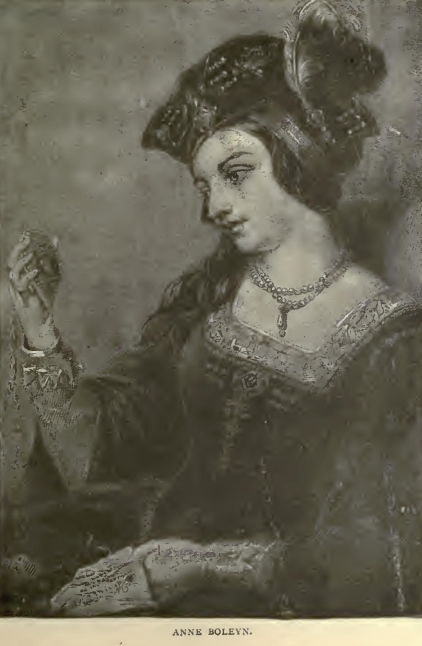
381But they soon had a chance of showing off their beauty to advantage, for when within four miles of Abbeville they mounted white horses, and with thirty other ladies who joined the procession, rode into the town. Mary wore a superb embroidered robe, and her ladies' dresses were of crimson velvet, which must have been particularly becoming to the warm, brunette complexion and sparkling black eyes of Anne Boleyn.
When the King of France died, and Mary went back to England, Anne did not accompany her, but entered the service of Queen Claude, wife of Francis I.
This queen was a most excellent woman, and exercised a wholesome influence over her maids of honor. They went regularly with her to mass, attended her when she appeared in public, and spent part of every day in her society reading, embroidering, and weaving. The strict rules of this sober-minded queen were rather irksome to the lively English maid of honor, for she was fond of all sorts of games, music, and dancing, and is said to have invented many new figures and steps which she performed with much grace and agility. Another of her gifts was a remarkably sweet voice, both in singing and speaking. While at the French court her costume was a cap of velvet, trimmed in points, a little gold bell hanging from each point; a vest of the same material with silver stars, a jacket of watered silk with large hanging sleeves that almost concealed her hands, and a skirt to match. Her feet were encased in blue velvet slippers, with a strap across the instep, fastened with a diamond star. Her hair fell in ringlets about her shoulders. Of course she dressed in this manner only when she was very young; later, when she lived in England, her costumes were very different. She had one serious defect which, however, she managed to conceal with her long sleeves. It was a deformity of the little finger of the left hand which some chroniclers say was divided and formed two fingers.
A.D. 1522. 382She was about twenty years old when she returned to England and attached herself to the household of Katharine.
The maids of honor dined at mess in those days like officers of the army or navy of the present time, and were plentifully served with all the good food the markets afforded, besides an ample supply of ale and wine. Each maid of honor was allowed a servant and a spaniel, and those who were daughters of peers could have stabling for horses and carriages besides.
There was a young man at court named Lord Henry Percy, the eldest son of the Duke of Northumberland, whose duty it was to attend Cardinal Wolsey to the palace daily; but while that prelate held council with the king, Lord Henry would pass the time with the court ladies. The result of these visits was a love affair between him and the fair Anne Boleyn. But the king had made up his mind to marry the young maid of honor himself as soon as he could get a divorce from his wife, consequently he complained to the cardinal, and told him that he must break off the match at once, because he had planned a marriage for Anne with another person. The cardinal sent for Percy and took him to task for thinking to unite himself to anybody without first consulting his father and the king. The young man expressed his regret at having displeased the king, but declared that he could not give up his lady-love. Thereupon Wolsey swore that he should be forced to do so, adding: "I will send for your father out of the North, and he and we shall take this matter in hand; in the meantime I charge thee to go no more into her company to arouse the king's indignation." With these words he arose and went into his own room.
In answer to the king's summons the Earl of Northumberland did appear with as little delay as possible. He was 383an extremely proud, cold, narrow-minded man, who wanted his son to marry a woman at least his equal in rank and wealth; therefore at the conclusion of his secret interview with the cardinal he rated Percy soundly, and applied to him the most abusive and insulting names he could think of. He finished his long lecture by telling him that he did not mean to make him his heir, because he had other boys who, he trusted, would prove wiser men, and he would choose one of them for his successor.
Percy was then banished from court, and forced to marry Mary Talbot, a daughter of the Earl of Shrewsbury, with whom he was very unhappy. If only he had been strong enough to hold out in his love for Anne a little while longer he might have been spared a great deal of misery, for his father died in less than three years after his forced marriage, and he became Earl of Northumberland.
To punish Anne for loving Percy, the king banished her from court and sent her home to her father's house. She laid the whole blame on Wolsey, and was so angry with him as to declare she would be revenged on him. He could never gain favor with her after that. She lived at Hever Castle, with her father and stepmother, and was very unhappy on account of the great disappointment she had suffered.
After a time the king made an unexpected visit at the castle, but Anne pretended to be ill, and would not leave her room all the time he was there. But the tyrant was bound to have everything to suit himself, so he began to draw her family to court by giving them important offices, and advanced her father to the peerage under the title of Viscount Rochford. Still Anne did not return, and the king wrote her several letters urging her to do so. She dared not show him how angry she was because he had 384broken off her engagement with Percy, but she was treasuring up a store of vengeance against the cardinal, who had been his tool, that she hoped some day to visit upon his head. She had been away from court just four years when she returned, and Wolsey's enemies were glad to be able to count on her influence to crush him.
A short time after he was sent on an embassy to France, and it was during his absence that Anne gained a great deal of influence over the king. Ambition had entered her head, and seeing that Henry admired her, she determined to share his throne as soon as his wife could be got out of the way. He had asked her to marry him, and only awaited the settlement of the divorce, which was a long and tedious affair.
Anne Boleyn was soon living in Suffolk House, which the king had secured for her, and there she had a regular court of her own, with her ladies-in-waiting, her train-bearer, and her chaplains, quite independent of the queen.
The first introduction of Tindal's translation of the Scriptures was made while Anne was so powerful. Among her ladies was one called Mistress Gaynsford, who had a lover, also employed at Suffolk House, named George Zouch. One day the young lady was deeply interested in a book, from which she would not raise her eyes, even to speak to George, who tried several times to make her listen to him, At last he became very angry and snatched the book out of her hand. It proved to be the translation of Tindal, that had been privately presented by one of the Reformers to Anne Boleyn. Now, this work had been proscribed by Cardinal Wolsey, who was not in favor of any reforms in religion, and kept secret from the king. Mistress Gaynsford knew this perfectly well, and was so frightened at being discovered with it that she begged and implored her lover to return it to her, but merely to tease her,
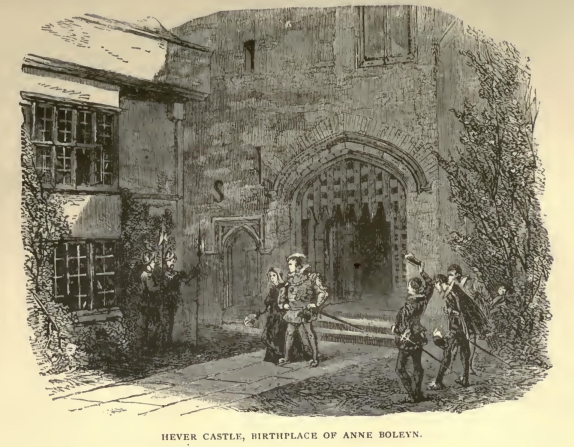
387he ran off with it. The next time he went to the King's chapel, with the other courtiers, he took it into his head to read the identical book he had taken from his ladylove, and became so absorbed in it that the service was concluded without his knowing it. The dean of the chapel wondered what George could be reading with so much interest, and asked to have a look at the volume. As soon as he saw what it was he carried it to Cardinal Wolsey. Meantime, Anne had asked for it, and when she heard into whose hands it had fallen, she said: "Well, it shall be the dearest book that ever dean or cardinal detained." Then she went to the king, and not only succeeded in persuading him to get the book back for her, but made him read it.
This beautiful favorite continued to hate Cardinal Wolsey more and more, and was determined that Henry should show him no favors if she could help it. Her mind was constantly busy laying plans to keep them apart, and to put the cardinal in an unfavorable light, though she used the most flattering terms both in speaking and writing to him. This deception she continued until he was won over to Queen Katharine's cause, when she declared her hostility openly, and she was a woman who would stop at nothing that would gratify her thirst for revenge. She was constantly poisoning the king's mind against him, yet the old friendship would crop out from time to time, and when the cardinal was seized with the pestilence Dr. Butts, the king's physician, was sent to attend him.
"Have you seen yonder man?" asked King Henry of the doctor. "Yes," was the reply; "and if you will have him dead, I warrant you that if he receive not some comfort from you he will be dead within four days."
"God forbid!" cried the king, "I would not lose him for twenty thousand pounds. I pray you go to him, and do you care for him." 388"Then must your grace send him some comfortable message," said Dr. Butts.
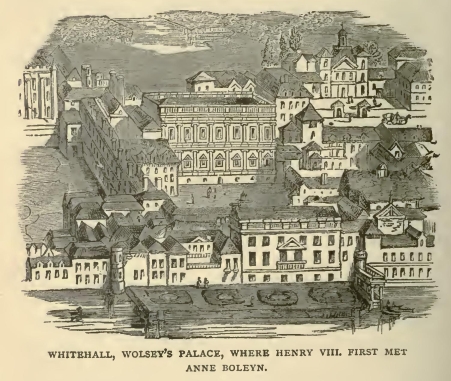
"Tell him that I am not offended with him in my heart for anything, and bid him be of good comfort," returned the king, handing the doctor a ruby ring with his own image carved thereon, and requesting him to carry it to the patient. He desired Anne Boleyn to send some token of regard also, and she handed the doctor a gold tablet that hung at her side, adding a loving message, of which she did not mean a word. Wolsey raised himself in his bed when the presents were shown to him, and thanked the doctor joyfully for the comfort he had brought. At the end of four days he was well again. But he was too near the court for the comfort or ease of his enemies, so 389the Duke of Norfolk, Anne's uncle, sent him word through Cromwell "that if he did not instantly depart for the north he would tear him with his teeth." He did go as far as Cawood, near York, but Anne never ceased her persecutions until she had him arrested for high treason, and employed her early lover Percy to carry him the warrant. No doubt this was done to remind the cardinal of her first cause of hatred towards him. He was in prison only twenty-five days when he obtained his release.
At this time the Duke of Norfolk, Anne's uncle, was president of the cabinet, while the Duke of Suffolk, her father, Sir Thomas More, Fitzwilliam, and Stephen Gardiner conducted the affairs of the realm, but she was the ruling power that influenced them all. She kept up her court with great splendor, and spent money most extravagantly. Still she could not marry the king until Cromwell's bold stroke that separated England from the power of the pope enabled her to do so.
Then poor Queen Katharine was driven away from Windsor Castle, and the king created Anne Boleyn Marchioness of Pembroke, with a pension of £1000 per annum. This ceremony was performed with great pomp. The king was seated on his throne in the presence chamber at Windsor, surrounded by his councillors and a number of peers. Anne Boleyn entered, followed by a long train of courtiers, and lords and ladies of the nobility. Lady Mary carried on her left arm a robe of state made of crimson velvet, lined and trimmed with ermine, and in her right hand a coronet of gold. Anne wore a jacket of red velvet with short sleeves, her hair hanging loosely about her shoulders. She courtesied three times before reaching the throne, then kneeled down at the king's feet. After that the charter was read aloud, and the king himself placed the mantle on the shoulders of the new marchioness and 390the coronet on her head. She thanked the sovereign humbly, and withdrew amidst the sounding of trumpets. Anne Boleyn's tastes were much more in harmony with those of the king than Katharine's had been, for she was fond of hunting and all games of cards and dice. She was a lucky gamester as a rule, but Henry's losses were perfectly enormous, and formed quite an important item in his private expenses.
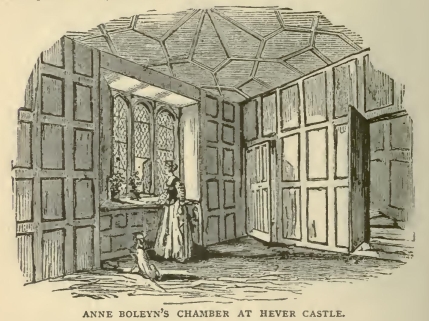
The exact time or place of the marriage between Henry VIII. and Anne Boleyn is not known. It was kept secret because it was so unpopular in England, but as soon as the ceremony was performed Viscount Rochford was sent to France to announce the event to Francis I. When the secret leaked out Cranmer publicly announced King Henry's divorce from Queen Katharine and his marriage to Anne Boleyn, who then began to appear in state.
A.D. 1534. Early in May, 1534, the king notified the 391lord-mayor that the coronation of Queen Anne would take place at Westminster on Whitsunday, and requested him to conduct her grace from Greenwich to the Tower by water a few days before. On the 19th of May the river Thames presented a most festive appearance. In obedience to the royal order a barge had been decorated and fitted up for Anne Boleyn's use in a most gorgeous style. The lord-mayor embarked in this, and fifty others followed in his train, one carrying a band of music, while the others were filled with all the great men of London dressed in scarlet, many of them wearing heavy gold chains about their necks, and others their order of knighthood. Hundreds of little row-boats were moving about on the water besides, for every one who could procure any sort of a tug accompanied the chief of the city to Greenwich, or rested on their oars in the best positions they could find to get a sight of the new queen. On the deck of the royal barge was a tremendous dragon, surrounded by other monsters that were from time to time made to vomit forth fire by concealed artillerymen to the delight and terror of the different boats that floated near. On one barge sat a score of young ladies amidst festoons of red and white roses arranged on branches that formed a canopy, at the summit of which sat a white falcon crowned, holding a sceptre in one foot, and Anne Boleyn's motto "Me and Mine" hanging on his breast. These young ladies sang the queen's praises in a chorus as they glided over the water. All the barges were fitted up with gay flags, flowers and banners. Having reached Greenwich Palace they anchored, the band performing different pieces of music, and the chorus of ladies singing until three o'clock, when Anne appeared superbly dressed and attended by her ladies. She entered her barge, and the gay flotilla moved down the river again amidst music, cheering, and the sounding of trumpets until 392it reached the Tower, when a marvellous peal of guns was shot off. The lord-chamberlain received the queen and conducted her to the king, who kissed her tenderly. The whole evening the barges hovered near the Tower, and from them was a display of brilliant fireworks, while crowds of people, stood to witness them on the neighboring wharves and bridges.
How different were the feelings of the fair Anne within that self-same fortress only two short years later. On the eve of the coronation, according to the usual custom, the queen was conducted through the city of London in grand procession. All the streets through which she passed were decorated. The lord-mayor received her at the Tower gate. He wore a crimson velvet gown with a gold collar. First in the procession came the French ambassador with his retinue in blue and yellow velvet, then the judges, next the newly-made Knights of the Bath in violet gowns with hoods lined and trimmed with white fur. After them came the abbots, then the nobility and the bishops. The Archbishop of York rode with the ambassador of Venice, and Cranmer, Archbishop of Canterbury, with the French ambassador. Then followed two esquires wearing the coronet of Normandy and Aquitaine, the lord-mayor with his mace and garter, several more knights and nobles. Close behind them was an open litter drawn by two white horses led by footmen dressed in white damask. In this litter sat the bright object of the parade in a jacket of silver tissue, mantle of the same lined with ermine, her dark hair falling in pretty contrast over her shoulders. A band of precious stones encircled her head, and above her was held by four knights on foot a canopy covered with cloth of cold.
The master of the horse led the queen's own riding animal, bearing a rich side-saddle with trappings of cloth of 393gold that reached nearly to the ground. Seven ladies on horseback, dressed in crimson velvet, followed; then came two chariots, in one of which sat the old Duchess of Norfolk with the Marchioness of Dorset, and in the other four ladies of the bed-chamber. Fourteen more ladies with their waiting maids came next, and the guard brought up the rear.
At Fenchurch street was a pageant of children dressed up to represent different kinds of merchants, who welcomed the queen both in French and English, the whole procession halting for that purpose. At a corner of another street was an enormous fountain that poured forth fine Rhenish wine all day long, of which anybody could drink just as much as he chose. One of the pageants was a white falcon similar to the one on the barge, with this difference: it sat uncrowned amidst red and white roses, and when the queen came opposite it, an angel flew down, accompanied by soft music, and placed a crown of gold on its head. A fountain of red wine flowed at another corner, and the three Graces stood above it on a throne, before which sat a poet who recited verses and presented the queen with appropriate gifts from Faith, Hope and Charity.
The city recorder handed the queen a purse containing a thousand marks in gold, which she graciously received with thanks. At Cheapside was a rich pageant from which proceeded music and singing, while Pallas, Venus, and Juno held up their apples of gold containing wisdom, riches, and felicity, which they presented to the queen. Over the gate of St. Paul's was a banner with this inscription in Latin: "Proceed, Queen Anne, and reign prosperously."
On a scaffold near by were two hundred children, all beautifully dressed, who recited verses, and so after passing several other pageants and fountains of red and white wine, the queen arrived at Westminster. The palace was richly decorated within and without. She rode to the very middle of the hall, where she was assisted to alight from her litter, and led up the high dais, where she took her seat under the canopy of state. At her left side stood a cabinet with ten shelves filled with rich and costly cups and goblets of gold. After partaking of wine, cake, and sugar-plums, which were handed to her ladies also, she withdrew to change her dress, and probably to rest, for all the parading and sightseeing of the past several hours must have been rather fatiguing.
The next day was the one that Anne had looked forward to for many years; the one that was to place her on the throne of England. It was the 1st of July, and at a little after eight o'clock on that bright summer morning she stood under her canopy of state in a purple velvet mantle lined with ermine, a band of rubies encircling her brow. There was the usual procession for such occasions, and the queen was conducted to the high altar in Westminster Abbey, where she prostrated herself while Cranmer recited part of the service. Then he anointed her on the head and breast, placed the crown on her head, and handed her the sceptre, while the choir sang the Te Deum. She returned to her seat between the high altar and the choir, where she remained to the end of the mass, when her father led her to her private room off Westminster Hall to wait till the banquet was prepared. Then all the great earls stood in 395gorgeous attire prepared to wait on the queen in different capacities, the Duke of Suffolk as high steward, assisted by Lord William Howard, the Earl of Sussex as carver, the Earl of Arundel as chief butler, and so on.
When all was ready, the queen entered the hall with her canopy borne over her, washed her hands in the perfumed water poured over them by Sir Thomas Wyatt, and took her seat at the table, the Countesses of Oxford and Worcester standing on either side of her chair, while two gentlewomen sat at her feet. All the tables in the hall were beautifully laid and tastefully decorated, and there was music all through the meal. The king took no part in this ceremony at all, but remained shut up in the cloister of St. Stephen's a part of the abbey, whence he could overlook all the proceedings without being seen himself. During the dinner the Duke of Suffolk and Lord William Howard rode up and down the hall, laughing and chatting with the lords and ladies, and when it was over commanded them to remain in their places until the queen had washed her hands. She arose and stood in the middle of the hall, while the Earl of Sussex brought her some sweetmeats. Then the lord-mayor brought her a golden cup filled with wine. After she had drunk, she presented him the cup and walked towards the door of her room under her canopy. Before disappearing, she turned and presented the gold bells, canopy, and all its decorations to the barons who had carried it.
On the following day there were jousts before the king and queen in the tilt-yard. But the pope did not approve of this second marriage, and so expelled the royal couple from the church; and Henry's cousin Cardinal Pole, wrote him letters of reproach, calling Anne "Jezebel,"
"Sorceress," and many other horrible names. Nevertheless, the king treated her with all the dignity of her station, and had 396her initial A joined with his own on all the gold and silver coins that were struck after their marriage. Henry VIII. was the first and last monarch of England who ever paid his wife that compliment.
Sir Thomas More was one of Anne's special enemies, because he remained true in his friendship for Queen Katherine to the day of her death. When his daughter visited him in the Tower he asked her "how Queen Anne did?"
"Never better," she replied: "there is nothing else at court but dancing and sporting."
"Never better!" said he, "alas! Meg, alas! it pitieth me to think into what misery, poor soul, she will shortly come. These dances of hers will prove such dances that she will spurn our heads off like foot-balls, but it will not be long ere her head will dance the like dance." Her tragical end proves the truth of that poet's prophetic words.
When that great and good man was executed, the announcement of it was made to Henry while he happened to be playing cards with Anne. "Thou art the cause of this man's death," he cried, looking at her angrily, and rising from the table. He then shut himself up in his room, deeply grieved.
A.D. 1533. In 1533 Anne had a little daughter born, who afterwards became the renowned Queen Elizabeth. The opposition her marriage had met with from Rome caused Anne to side with the Reformation party, though she always continued a Catholic at heart, and observed all the ceremonies of that church. It is probable that she took no part in the cruelty that Henry exercised over the pious reformers, but it is certain that she made no effort to prevent it; for had she done so, she was still powerful enough to have succeeded. She had enjoyed one triumph.
Probably this change was due to the influence of the reformer, Hugh Latimer, whom she rescued from prison, where he had been sent by the bishop of London; for it was after he preached to her and pointed out her duty that she so generously distributed alms and even paid for the education of promising lads who were likely to devote themselves to the church. She must often have felt that 397after another, but when she reached the very summit of her greatness, no doubt she found that her path had been more thickly strewn with thorns than roses, and that in reading the Scriptures she felt the force of the text, which says: "What is a man profited if he gain the whole world and lose his own soul?" She became grave and serious, and spent more time at needlework with her ladies, whom she assisted in making clothing which she distributed among the poor.
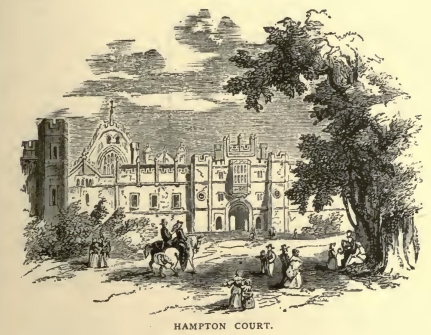
398her position on the throne of England was not very secure, for as her capricious husband had behaved towards his first wife might he not behave towards her also?
When the news of Katharine's death was brought to her she exclaimed: "Now I am indeed a queen!" But it was not long before she was suffering all the bitter pangs that the good queen over whose death she rejoiced had endured.
Henry had grown tired of her, and was carrying on a flirtation with the beautiful Jane Seymour, one of her attendants. And so, under one pretext or another, her friends were either beheaded or locked up in the Tower.
At last her turn came, and just as she had finished her dinner, on the 2d of May, the Duke of Norfolk, with Cromwell and other lords of the council entered, while Sir William Kingston, lieutenant of the Tower, stood in the doorway.
Anne asked "why they had come?" They replied: "That they came by the king's command to conduct her to the Tower, there to abide during his highness' pleasure."
"If it be his majesty's pleasure I am ready to obey," she said, going with them to her barge without waiting to make the least change in her garments. Arriving at the Tower, she was placed in the apartment she had occupied on the night before her coronation. Her attendants were two enemies, who were particularly disagreeable to her—Lady Boleyn and Mrs. Cosyns. These two women never left her, night or day, for they slept on a pallet at the foot of her bed, and reported every word she uttered. They made all sorts of impertinent remarks to her, and kept constantly annoying her with questions by which they hoped to prove something against her.
The poor queen was so affected by her close imprisonment that at times she seemed to have lost her reason. She wrote a touching letter to the king, appealing to his 399mercy, but he took not the slightest notice of it, and just one week after she was sent to prison a charge of high treason was made by the grand jury of Westminster against Anne Boleyn, her brother, and four of her best friends.
The friends were condemned to death, as almost everybody was in Henry VIII.'s reign who was brought to trial for high treason, though sometimes they were not even tried at all.
Twenty-six "lords' triers," from the body of nobles in England were selected to try Lord Rochford, Anne's brother; and, although he defended himself with great spirit and eloquence, and many of the judges sided with him, he was found guilty.
After his removal, Anne, Queen of England, was called into court by an usher.
She appeared immediately, and took her stand "with the true dignity of a queen, courtesying to her judges without any sign of fear."
The charges were read, and she pleaded "Not guilty," but the trial was continued for a long time, and ended by a verdict of guilty. It was her uncle, the Duke of Norfolk, who presided at this trial, and he pronounced her sentence. She was condemned to be burnt or beheaded, at the king's pleasure. Anne Boleyn heard this dreadful doom without changing color, but when her stern kinsman had ended, she clasped her hands and raising her eyes to Heaven exclaimed: "O Father! O Creator! Thou who art the way the life, and the truth, knowest whether I have deserved this death."
She then turned to her judges and proclaimed her innocence of every charge made against her, closing her remarks with: "Think not I say this in the hope of prolonging my life. God has taught me how to die, and he will strengthen my faith. As for my brother and those others who are unjustly 400condemned, I would willingly suffer many deaths to deliver them; but since I see it so pleases the king I shall willingly accompany them to death, with this assurance, that I shall lead an endless life with them in peace." With a composed air, she rose, made a parting salutation to her judges, and left the court.
The 19th of May was the day appointed for her execution, and the interval was passed in prayer and confession, receiving the sacraments of the church, and other preparations for death.
It was the king's pleasure that she should be beheaded in the grounds of the Tower, and that no strangers should be admitted. A headsman from Calais was brought over to do the horrible deed, because he was considered particularly expert. Anne Boleyn's fate had had no precedent in English history, for even in the Norman reigns of terror woman's life had been held sacred, and the most merciless of the Plantagenet sovereigns had been too manly to butcher ladies. But the age of chivalry was over, and Henry VIII. was the first sovereign who sent queens and princesses to the block, without justice or mercy.
The unfortunate queen was duly informed of her fate; her mournful experience had shown her the vanity and vexation of flattery. Beauty, wealth, genius, pleasure, power, royalty, had all been hers, and whither had they led her?
She had not condescended to implore the mercy of the king, for she knew his pitiless nature too well even to attempt to touch his feelings. She passed the last night in prayer, and when morning came, and she heard that her execution was to be a few hours later than she expected, she said to Mr. Kingston: "I hear I shall not die afore noon, and I am very sorry, for I thought to be dead by this time, and past my pain," 401Mr. Kingston told her that the pain would be little and very short.
"I have heard say," she replied, "that the executioner is very good, and I have a little neck," and she spanned it with her hands, laughing heartily as she did so.
A.D. 1536. Her last message to the king was: "Commend me to his majesty, and tell him he hath been ever constant in his career of advancing me; from a private gentlewoman he made me a marchioness, from a marchioness a queen, and now he hath left no higher degree of honor he gives my innocency the crown of martyrdom."
A few minutes before twelve o'clock the massive doors of the Tower were thrown open, and the royal victim appeared in a robe of black damask with a deep white cape falling around her shoulders.
She looked very beautiful when she ascended the scaffold, with a calm and dignified air, and turning to Kingston she requested him not to hasten the signal of her death until she had spoken what she desired to say.
Then she began: "Good Christian people, I am come hither to die by the law, therefore I will speak nothing against it. I am come hither to accuse no man, but only to die, and to yield myself humbly unto the will of my lord the king. I pray God to save the king, and send him long to reign over you, for a gentler or more merciful prince there never was. If any person will meddle with my cause, I require them to judge the best. Thus I take my leave of the world and of you, and I heartily desire that you all will pray for me." She then removed her hat and collar, as well as the close cap from her head, and handed them to her ladies, who were weeping so bitterly that they could not aid her. Then turning to them she said: "And ye, my damsels, who ever showed yourselves so diligent in my service, and who are now to be present at my last hour 402and mortal agony, as in good fortune ye were faithful to me, so even in this my miserable death ye do not forsake me. And as I cannot reward you for your true service to me, I pray you take comfort for my loss. Forget me not, and be always faithful to the king's grace, and to her whom with happier fortune, ye may have as your queen and mistress. Esteem your honor far above your life, and in prayers forget not to pray for my soul."
Mary Wyatt, the sister of Sir Thomas Wyatt, the poet, who was one of Anne's devoted friends, attended her on the scaffold, and received her last gift, which was a little book of devotions bound in black enamel and gilt. She then whispered a few words to this lady, and kneeling down, placed her head upon the block. Time was allowed the poor unfortunate queen to say; "O Lord God, have pity on my soul," when the sword fell. With one stroke, the head of Anne Boleyn was severed from her body, and rolled in the dust.
There is a black marble monument in the ancient church of Horndon-on-the-Hill, in Essex, pointed out as the burial place of Anne Boleyn, but as it bears no name, no notice or inscription of any kind, there is no proof that her body lies there.
A great epic poet has beautifully said:—
"Tradition! oh, tradition! thou of the seraph tongue;
The ark that links two ages, the ancient and the young."
Jane Seymour has always been pronounced the most beautiful of all the wives of Henry VIII. But she has also been presented to the world as a meritorious, discreet, young woman. We cannot consider her so when we remember that within twenty-four hours after Anne Boleyn's head was cut off she became the king's wife. For it must have been while acting as maid of honor for that unhappy lady that she not only received the attentions of her fickle, heartless husband, but even made all the necessary arrangements for her marriage with him. We shudder at the thought of the preparations that must have been going forward for the wedding-feast at the palace, while the Tower was the scene of heart-rending agony to the queen, who was about to sacrifice her life for the gratification of a tyrant.
The giddiness of youth cannot be pleaded as apology for Jane Seymour's indecency, for she was no child when she permitted herself to be courted by the royal Bluebeard, and must have been entirely conscious of the enormity of her actions.
Perhaps her early education was at fault, but of that little is known excepting that it was acquired in France. She was maid of honor to Mary Tudor, queen of Louis XII., and went to England after her dismissal from the French court. Anne Boleyn occupied a similar position at the 404same time, therefore the two maids of honor probably knew each other intimately.
One day, after Anne Boleyn had ascended the throne, she observed a locket that hung from a pretty gold chain about the neck of Jane Seymour, and expressed a desire to see it closer. The maid of honor blushed, faltered, and drew back, whereupon the queen snatched the locket from her, opened it, and beheld the likeness of the king, her husband.
From that moment Anne Boleyn knew that her fate was sealed; she was indignant, but that availed her nothing. She found herself supplanted by a rival as she had supplanted her predecessor. Perhaps her punishment was deserved, but it does not justify the conduct of the king or his new lady-love.
A.D. 1536. When the axe made Henry VIII. a widower, Jane Seymour was at Wolf Hall, in Wiltshire, and her royal lover at Richmond Park. On the morning of the 19th of May his majesty stood under a spreading oak, with his huntsmen and hounds prepared for the chaise, awaiting the signal gun from the Tower to announce that he was free. At last the welcome sound reached his ear. "Ha, ha!" he cried, "the deed is done! uncouple the hounds and away." This was all the regret he expressed for the death of the woman he had pretended to love so well.
His widowhood lasted just one night, for the next morning he was at Wolf Hall, where he was united to the beautiful Jane Seymour. The ceremony was performed in the parish church, and was succeeded by a feast at which several members of the king's privy council were present.
Then the royal couple proceeded to Winchester, and from there to London. A grand reception was held on the 29th of May, when Jane was presented as queen.
When parliament met, a few days later, the lord-chan-
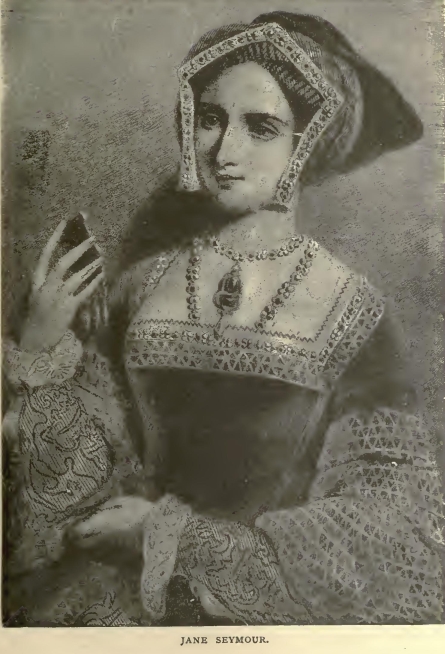
cellor 407made a lengthy speech setting forth the king's virtues, trying to justify his vagaries in the matrimonial line by a great deal of tedious, false reasoning, and winding up with the information that Anne Boleyn's daughter was not heir to the throne of England. Part of this speech was devoted to setting forth the noble sacrifices made by Henry VIII. for the benefit of his people.
The speaker chosen by the House of Commons went further, and loaded the king with the most fulsome compliments, comparing him to Samson, Solomon, and Absalom combined. Thus was Henry VIII. encouraged in his wickedness, until, as Cardinal Wolsey wisely said: "he actually forgot that there was both heaven and hell."
The Princess Mary was on good terms with her stepmother, who effected a reconciliation between her and the king; but the conditions were so cruel, that there was not much to be grateful for. Perhaps Jane was not responsible for them, and as we have so little that is favorable to relate of this queen, we will give her the benefit of the doubt. She made no enemies, because she avoided expressing any decided opinions, and preserved as much as possible a placid silence, and permitted herself to be governed, in all things, by her husband. If regard for her head prompted such behavior, at least she was wise.
The winter of 1537 was a remarkably cold one, and the royal couple with their entire court crossed the frozen Thames on horseback, so thick and solid was the ice.
Henry's two other queens had been crowned, so he thought the same honor ought to be conferred on the third, but the continuance of the pestilence caused that ceremony to be postponed so long that death prevented it altogether, for Jane Seymour lived only eighteen months after her marriage. Meanwhile, she was living at Hampton Court, where her little son was born, who afterwards became Edward VI.
vet cloth. On top of this pall was a wax figure resembling the dead queen dressed in regal robes with a crown, sceptre, and jewels.
On the 12th of November the car was drawn by six horses to St. George's Chapel, where the corpse was interred.
Henry VIII. wrote a letter to Francis I. rejoicing over the birth of his son and expressing considerable regret at the death of his wife. He really did put on mourning attire, and appeared depressed in spirits for several weeks. This is all that could be expected of so worldly and gay a king.
A.D. 1537. This prince was baptized at midnight, and both his sisters, Mary and Elizabeth, took part in the ceremony, which was succeeded by such a blowing of trumpets as must have been very trying, indeed, to the nerves of a young infant.408
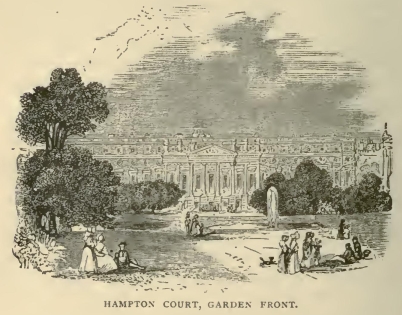
The next day Jane Seymour died. Her body was embalmed and laid on a car of state covered with a rich velvet.
Anne of Cleves was a most unfortunate, ill-treated princess, but she possessed so many virtues that she surely deserved a better fate than to become the wife of a king so devoid of the feelings of a gentleman as Henry' VIII.
After the death of his third queen, this capricious monarch did not find it so easy to get another as he probably expected it would be. Certainly it must have been a woman of rare courage who would willingly subject herself to such a yoke, knowing the experience of his other victims.
Jane Seymour had not been dead more than a month when he made a request of Francis I. that he might be permitted to choose a lady from the royal blood of France for his queen. That monarch replied, "that there was not a damsel of any degree in his own dominions who should not be at his disposal."
Henry was quite flattered at this compliment, and thought it would only be necessary for him to put out his hand to secure any woman he might condescend to favor, so he requested Francis just to bring all the fairest ladies of his court to Calais for him to take his choice. The gallantry of the French king was shocked at such an idea, and he replied, "that it was impossible to bring ladies of noble blood to market as horses are trotted out at a fair."
Then Henry wanted to marry James V.'s lady-love, whom he had seen and admired, not paying the slightest attention to the fact that she was already engaged. When he found it impossible to get her, he was ready to consider the proposition of his ambassador with regard to her sister or Mademoiselle Vendôme.
"Let them be brought to Calais," he said, "and I will take a look at them."
"That would be impossible," was the reply; "but your majesty could send somebody to Paris to see them."
"Good gracious! how can I depend upon any one but myself?" asked Henry. "I must see them, and hear them sing; and what is more, I must see how they look while they are singing," he added.
By the end of the year he found that there was no hope for him in France, so he put on a most melancholy air, and pretended to be dreadfully grieved at the death of his pretty Jane.
This state of mind lasted for about two years; then Cromwell spoke in such flattering terms of the princesses of the house of Cleves that Henry began to think he had played the rôle of forlorn widower long enough.
Cromwell had only seen Sybilla, the eldest daughter of the Duke of Cleves. She was married to the Duke of Saxony, and was famed for her talents, virtues, charming manners, and extreme beauty. But unfortunately for Henry, Anne, the second daughter, was as unlike her sister as possible, and had no accomplishments whatever, with the exception of needlework.
Holbein, the celebrated Dutch artist, was required to paint the portraits of both Anne and her younger sister, Amelia, for Henry's inspection, and Christopher Mount was sent to negotiate the treaty of marriage. He wrote a letter to Cromwell filled with Anne's praises and said, "she as far excelleth the Dutchess of Saxony as the golden sun excelleth the silver moon." 411The Duke of Saxony was very much opposed to a union of his sister-in-law with a man of Henry VIII.'s character, but he was the champion of the Reformation, and Christopher Mount assured him "that the cause of Protestantism in Europe would be greatly advanced by the influence of a Lutheran Queen of England, for Henry was easily managed through his wives."
The Duke of Cleves died in 1559, but his son, who succeeded him, favored Anne's marriage with King Henry, and so did their mother, both being strong allies of the Protestant cause, and feeling that even though it might be a sacrifice, it ought to be made for the sake of their religion.
One of Henry's commissioners wrote him that Anne "occupieth much of her time with her needle. She can read and write her own language, but French and Latin or other language she knoweth not; nor yet can sing or play on any instrument, for they take it here in Germany for a rebuke and an occasion of lightness that great ladies should be learned, or have any knowledge of music." He also speaks of her gentle and amiable temper, but above all he praises her sobriety, which is quite amusing.
Ever since the death of Jane Seymour the Catholics and Protestants of England had vied with each other as to which should be next represented in the queen. It was the magic brush of Hans Holbein that decided the question, and Cromwell won a triumph over Gardiner, Norfolk, and his other rivals, though it brought him ruin at last.
At length all matters of state policy and ceremony were arranged, and the young princess bade farewell to her mother, brother, and sisters, by whom she was tenderly beloved.
The first week in October, 1539, she left her native city, Dusseldorf on the Rhine, attended by a splendid escort. On her arrival at Antwerp she was received by the English 412merchants there, who gave her a grand torchlight procession by daylight. Next day she proceeded on her journey, and arrived at Calais December 11.
About a mile outside of the town she was met by a regiment of armed men, with the king's archers, all in gay attire, besides the Earl of Southampton, Lord William Howard, and many other lords and gentlemen. Gregory Cromwell, with twenty-four others wore coats of satin damask and velvet, with gold chains of great value, and two hundred yeoman who followed them were dressed in the king's colors, red and blue cloth.
The Earl of Southampton welcomed the royal bride and conducted her into Calais, where such a peal of guns was shot from the ships on her arrival that all her retinue were astonished. Then firing began all along the coast, and was continued by the vessels until there were one hundred and fifty rounds, and so much smoke that the people in Anne's train could scarcely see each other.
The following day she was presented by the mayor with a hundred gold sovereigns, and for about three weeks after her arrival there were all sorts of pastimes and festivities. Meanwhile Henry impatiently awaited his long-expected bride, and busied himself with the execution of four worthy abbots.
The wind did not favor her progress until the 27th, when she embarked, attended by a fleet of fifty ships, and arrived at Deal the same day. The princess was received by a great company of ladies and gentlemen, and conducted to Dover Castle, where she remained until the next Monday, when, in a dreadful storm, she set out for Canterbury. Several days of travel brought the royal bride to Rochester, and New Year's Day was spent at the bishop's palace in that town.
The king was so impatient to see her, that, in company 413with eight of his gentlemen-in-waiting, he rode to Rochester to steal a look at his German bride, who, no doubt he thought, would rival the bright-eyed Boleyn and the fair Seymour.
On his arrival he sent a messenger to inform Anne "that he had brought her a New Year's gift, if she would please to receive it."
He followed his messenger into the room where she sat, but a glance was sufficient to show him that he had been deceived. She was by no means a pretty woman, and Henry regarded himself as an injured person in having to marry her. Perhaps she was not more charmed with his appearance or manners, but she sank upon her knees at his approach and did her best to receive him lovingly. He raised her gently, and kissed her, but there could not have been much conversation between them so long as they had to employ an interpreter. Besides her language was so displeasing to his musical ear that he did not want to hear more of it than he could help, though he knew before she came that she could speak no English. The moment he left her presence he sent for the lords who had brought her over and made his complaints.
The New Year's gift that he had provided for Anne was a muff and tippet of rich sable, but when he found she was not handsome he would not honor her by presenting it with his own hands, but sent it on the following morning by a messenger.
He returned to Greenwich in a melancholy frame of mind, and abused Cromwell for having provided him with a wife whom, with his usual brutality, he called a "great Flanders mare." Cromwell tried to put the blame on the Earl of Southampton, and said: "That when he found the princess so different from the pictures, and the reports that had been made of her, he ought to have stopped her 414at Calais till he had given the king notice that she was not so handsome as she had been represented." The admiral replied bluntly "that he was not invested with any such authority, his commission was to bring her to England, and he had obeyed orders." The king interrupted them by ordering them to find some means to get him out of his engagement. There was a great deal of discussion about the matter, but no objection to the marriage could be invented that would be at all satisfactory to Anne's relations in Germany, so Cromwell assured the king that as a matter of policy he must do nothing to gain the ill-will of her friends.
"Is there no remedy but that I must needs put my neck into this yoke?" exclaimed Henry, passionately.
After these gracious words, which it is to be hoped did not reach the ears of the insulted lady who was waiting his orders at Dartford, he commanded the most splendid preparations to be made for his marriage. On the 3d of January a rich tent, covered with cloth of gold, was pitched at the foot of Shooter's Hill for the royal bride, and other tents around for her ladies. Twelve hundred gentlemen were ranged in double file from the park gates to the heath awaiting the arrival of the king with his bride. About twelve o'clock her grace came down from Shooter's Hill, accompanied by a hundred of her own nation, the Dukes of Norfolk and Suffolk, the Archbishop of Canterbury, with other bishops, lords and knights who had come from France, and went towards the tents, where Dr. Kaye, her almoner, presented all the officers and servants of her household, and addressed to her an eloquent Latin oration, of which she did not understand a word. It was answered by her brother's secretary, who acted as interpreter. Then Anne stepped out of her chariot, and was saluted and welcomed by sixty-five ladies, whom she thanked and kissed, after 415which all entered the tents to warm themselves, for the weather was exceedingly cold and disagreeable. When the king heard that his bride had arrived at her tent he set out through the park to meet her, accompanied by the officers of his council and his gentlemen in waiting, all richly attired in velvet coats embroidered in gold, and mounted on fine large horses. The Marquis of Dorset rode alone, attired in purple velvet and bearing the king's sword of state. Some distance behind him came Henry VIII., mounted on a splendid white courser with trappings of cloth of gold embroidered with pearls. All the buckles, bit, and pendants were of solid gold. The king wore an embroidered purple velvet coat, the sleeves and breast of which were slashed, showing cloth of gold beneath, and fastened together with large buttons of diamonds, rubies, and oriental pearls. His sword and girdle were studded with costly emeralds, and his cap was so covered with jewels that it was not possible to fix a value on it. Around his neck was a deep collar thickly studded with rubies and pearls.
When the bride was informed of Henry's approach she walked out of her tent, mounted a white horse, and, surrounded by her footmen, rode forward to meet him. Her dress was made of rich cloth of gold, cut round in Dutch fashion without a train. On her head she wore a close cap, above which was a circular bonnet ornamented with oriental pearls. Across her brow was a coronet of black velvet, and around her neck a band of superb diamonds. Henry saluted her in the most courteous manner, took off his hat and embraced her as though he really cared for her, while she, not forgetting her duty, and perhaps the instructions she had received, thanked him sweetly and praised the arrangements he had made for her reception. No doubt he was pleased with all the flattering remarks she 416felt obliged to make to him. Then he put her on his right side and they rode along together, he acting a deceitful part in trying to appear pleased, and she filled with indignation at the way he had scorned her.
When the grand cavalcade that followed and preceded the royal pair arrived at Greenwich Castle all the men alighted from their horses excepting the king, who rode to the inner court with his bride. When the queen had alighted from her horse Henry tenderly embraced her, and bade her "welcome to her own," then conducted her through the hall that had been prepared for her reception. There he left her and went to his room, where he had an interview with Cromwell, to whom he made bitter complaints about the appearance of his unlucky bride.
Cromwell said he was sorry his grace was not better satisfied, whereupon Henry bade him call his council together to see whether they could not hit upon some plan for getting him out of this marriage. The council met that very afternoon, but failed to aid the king out of his dilemma, and this put him in such a bad humor that he would not say what he had determined to do until the next Monday morning; then he ordered the marriage ceremony to be performed next day, without even consulting the bride..
He wore a gown of cloth of gold, with raised silver flowers all over it. His coat was crimson satin embroidered and slashed, the points fastened with large diamonds, and a rich collar about his neck.
He entered the presence-chamber, and calling Cromwell to him, said, "My lord, if it were not to satisfy the world and my realm, I would not do what I must do this day for any earthly thing." Then one of the officers of the household informed him that the queen was ready. He advanced towards her chamber door, but had to wait 417several minutes before she appeared, which made him very angry. Who can blame the poor woman for her tardiness? she would have been excusable if she had refused to come at all. At last Henry sent one of his lords to bring her. She was dressed in a robe of cloth of gold, thickly embroidered in large flowers of oriental pearls. The skirt was cut, as before, round without a train, and at her neck and waist were costly jewels. Her hair fell luxuriantly over her shoulders, and on her head was a coronet of diamonds, with a few sprigs of rosemary. She walked modestly forward, between the Earls of Overstein and Essex, with a sad, demure expression, and on approaching the spot where the king stood made three low obeisances. She was followed by her ladies.
The Archbishop of Canterbury and Cranmer performed the marriage ceremony, the Earl of Overstein gave her away, and on her wedding-ring was engraved this sentence "God send me weel to keepe."
On the 4th of February the king and queen went up the Thames in grand state to their palace of Westminster. Henry kept up an outward show of attention to his bride, but she knew not the art of pleasing, felt no sympathy with his tastes, and could not gain his affection.
She knew this, but could not help it. Several times she sent for Cromwell, hoping with his advice to be more successful, but he positively refused to talk privately with her. He had reasons of his own for doing so.
On the 1st of May a company of the gallant knights at court, all dressed in white velvet with rich ornaments, had a grand tournament in honor of the recent marriage, and this was the last time Henry and Anne of Cleves ever appeared together in public.
Anne studied the English language industriously, and tried in every possible manner to please her lord, but by 418the end of five months she was convinced that it was hopeless.
There was a low-born, unprincipled creature at court, named Sir Thomas Wriothesley, who would have done or said anything to gain favor with his sovereign, and he kept constantly lamenting over Henry's position, and how hard it was for him to be bound to a wife whom he could not love. In this way he prepared the way for a divorce, and Henry was only too ready to avail himself of any excuse. Now his sensitive conscience began to trouble him again. This time it was on the score of religion; he could not bear to think of having a Lutheran wife. No wonder poor Anne lost patience, and in a moment of pique, told him that, "if she had not been compelled to marry him she might have fulfilled her engagement with another to whom she had promised her hand."
That was enough for him; she could scarcely have said anything that would have suited him better, and he at once set to work to make her position as unpleasant as possible. His first move was to dismiss all her foreign attendants, and supply their places with English ladies of his own selection.
By this time he was in love with the young and beautiful Katharine Howard, niece to the Duke of Norfolk, and had decided to make her his wife as soon as he could manage it. The leaders of the Catholic party favored this union, and hoped at the same time for the downfall of their great enemy, Cromwell. They were soon to be gratified, for Henry now required a tool, who would not be guided by the nice feelings of a gentleman, for carrying out his plans. Cromwell was not such a one, and he must be put out of the way. In this reign of terror nothing was easier, and in less than a month he was arrested and shut up in the Tower.
A few days later Anne was sent to Richmond under pretence 419that her health required change of air, and this was the prelude to the divorce for which Henry had now grown impatient.
Archbishop Cranmer had performed the marriage ceremony, and it now became his duty to divorce the king for the third time in less than seven years. This was accomplished by unanimous consent of the clergy July 13. As the queen was a stranger to English laws and customs, she was spared the humiliation of appearing before the council.
When everything was settled, Suffolk, Southampton, and Wriothesley were appointed to go to Richmond to get the queen's consent. She was so alarmed when she saw them that before the true object of their visit could be explained to her she fell fainting to the ground. No doubt the poor woman thought she was on the point of having her head cut off. When she recovered consciousness, she was told that if she would resign her title as queen Henry would adopt her for a sister, and that she should be endowed with estates to the value of £3,000 a year. This was an immense relief, and Anne expressed her willingness to resign her honors with such alacrity that the lords were quite surprised.
When Henry heard this, and saw the paper she had signed to that effect, he could not believe that she was so ready to part with so supremely precious a person. Fearing that she might relent, he wrote to his council requesting them to have her write a letter to her brother explaining her position, and expressing her earnest desire for the divorce.
Anne then wrote her mother and brother that she was honorably treated, and felt quite cheerful and contented. She hoped that no dispute would arise between her native land and England, where she purposed spending her life, and begged them in no way to interfere, no doubt dreading that if they did so it would be visited on her head.
In the meantime Anne passed her time very pleasantly at Richmond, dressed magnificently, and performed many deeds of charity; in short, she was happier than she had been since her departure from home.
Sixteen months later Katharine was thrown into prison, and then several attempts were made by various parties to bring about the reunion of Henry and Anne, but fortunately for her without success. From her retirement she heard
A.D. 1540. On the 28th of July, Cromwell was beheaded, and the pious, learned Doctor Barnes, who had been instrumental in bringing about the marriage, was burned at the stake.420
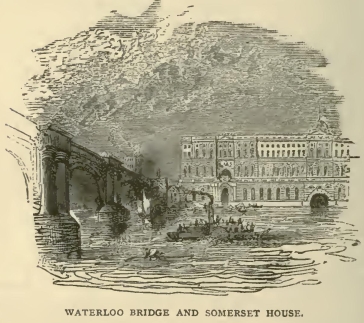
In August Henry visited his divorced wife at Richmond, and was so well received by her that he stayed to supper and seemed in excellent humor. Two days later he publicly introduced Katharine Howard at court as his queen. 421of the misery the king endured when he became convinced of how his new wife had deceived him, and she must have been more than human if she did not feel somewhat gratified when the royal Bluebeard was compelled to part from her.
Katharine Howard enjoyed sixteen months of boundless influence over her husband, but her lucky star was soon to wane, and without being allowed to open her lips in her own defence save to her confessor, she walked like a sheep to the slaughter. Her execution took place February 13.
A.D. 1577. Anne of Cleves outlived Henry VIII. and his last wife, and died during the reign of Queen Mary at the Palace of Chelsea, aged forty-one.
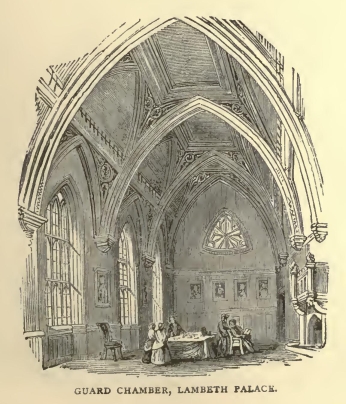
There is not a family in England whose name has appeared so often in its history, whether for good or for bad, as that of the Howards, nor one whose members filled such varied and important positions, as every attentive reader will admit.
Katharine Howard was nearly related to Anne Boleyn; she became the fifth wife of Henry VIII., and is by no means one of the nobler specimens of the family to which she belonged.
She was born in 1521, and had the misfortune to lose her mother while she was still young. Her father's duties called him from home a greater part of the time, and the Duchess of Norfolk, her grandmother, who had charge of Katharine, was so neglectful of her duty as to permit the child to choose her own companions, and they were unfortunately low and degraded.
Unlike most grandmothers, the duchess merely tolerated Katharine in her household, and felt that she had performed her part when the little maid was locked in her room, and the key safely deposited in her own pocket. But, like many naughty girls, Katharine managed, in spite of locks, to meet Francis Derham, one of the Duke of Norfolk's retainers, to whom she secretly engaged herself. In order to be nearer his lady-love, Derham entered the service of her grandmother as gentleman-usher. After a 423time the old lady began to observe certain signs of intimacy between this pair of lovers, and on entering a room one day unexpectedly she found them romping together. Shocked at the familiarity of her usher towards her granddaughter, she boxed the ears of the lady-attendant for permitting it, punished Katharine, and dismissed Derham from her service.
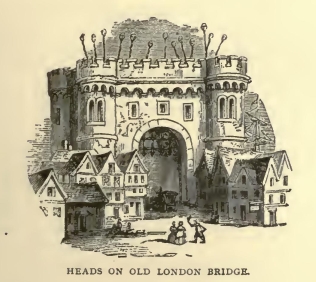
After that Katharine was kept under greater restraint, and as she grew into womanhood learned to behave properly, and became remarkable for her charming and graceful manners.
She met Henry VIII. the first time at a banquet given by the Bishop of Winchester to celebrate the monarch's marriage with Anne of Cleves, and afterwards at the house of Gardiner. The king took such a fancy to her that it was not long before he secured her appointment as maid-of-honor to the queen. It has been supposed that Katharine was instrumental in bringing about the death of 424Cromwell, but, as she only intrigued for the king's favors, it is not probable that she troubled her head about politics.
Henry VIII. fell in love with her as he had done with Anne Boleyn and Jane Seymour, when they were maids-of-honor, and little Katharine was silly enough to be flattered by the marks of favor he showed her. The Duchess of Norfolk, instead of warning the girl of her danger, was foolish enough to encourage her to court the king's attention, and provided her with fine clothes to make her as attractive as possible to his majesty.
Henry was easily won, and privately married Katharine a few days after he was divorced from Anne of Cleves.
A.D. 1540. On the 8th of August, 1540, the new bride was introduced at Hampton Court as Queen of England. A short honeymoon was passed at Windsor, and then the royal couple made a tour through several counties, but the king had exhausted his treasury when he married his Flemish bride, so he could not honor Katharine Howard with either a coronation or a marriage festival. But he was very much in love, and lavished affection on her.
Six months of peace and happiness were enjoyed by the royal couple, Henry seldom leaving the side of his young wife, nor permitting any of his councillors to interrupt his pleasures. Katharine felt her power and forgot what had been the fate of her predecessors. She was soon to be reminded, however, for the realm had become divided into two parties—the Catholic and Protestant, and both were strong. The Reformers fondly hoped that Anne of Cleves might be restored to her former position, and regarded Katharine in the same unfavorable light as Anne Boleyn had been looked upon by the Catholics.
At last, in the spring, came a crisis in the shape of an insurrection by the Catholics in Yorkshire, headed by Sir 425
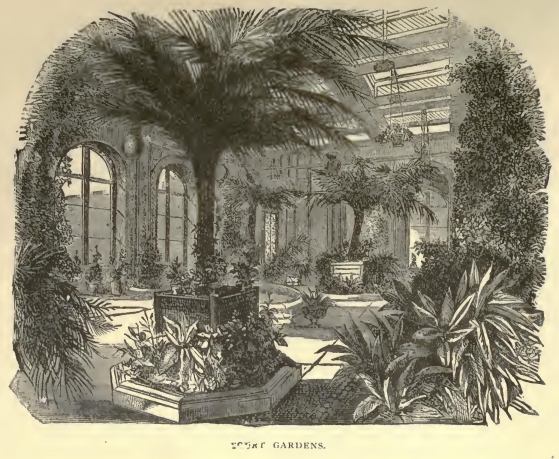
427 John Neville. Henry thought Cardinal Pole was the cause of it, and so took his revenge by ordering the execution of the Countess of Salisbury, Pole's mother, who had been in the tower for more than a year: when the aged lady heard of it she refused to lay her head upon the block, saying, 'so should traitors do, but I am none, and if you will have my head you must win it as you can.' thereupon the brutal ruffian who acted as executioner dragged her by her hoary locks, and 'slovenly butchered the woman in whose veins flowed the noblest blood of England.'
For the purpose of ascertaining the exact state of affairs in Yorkshire, King Henry set out with his wife for that place early in July, 1541, leaving Cranmer, Audley, and Seymour, three Protestant adherents, among his councillors at home. At Yorkshire the royal couple were met by two hundred gentlemen in velvet coats, with four thousand yeomen, who knelt while one of their number offered nine hundred pounds. At another place three hundred ecclesiastics presented six hundred pounds, and so on until Henry found himself much richer than when he started on his journey. Queen Katharine saw more of the pomp of royalty at this time than she had done during the whole year before, for the wealthy aristocracy in every part of the country vied with each other in the grandeur of their entertainments given in honor of the royal couple.
Katharine had been married little more than a year when Francis Derham returned to England, and she committed the error of appointing him as her private secretary. As soon as the king heard of the relation that had existed between this man and his wife previous to her marriage his jealousy was aroused, and the Protestant statesmen took good care to encourage every suspicion that entered their monarch's head. Meanwhile poor little Katharine was 428entirely unconscious of the storm that was gathering about her.
King Henry was soon forced to order her removal from Hampton Court. Wriothesley and Rich were the unprincipled, cruel agents who, determined upon the destruction of the queen, persecuted her until she was beside herself with terror and grief. Then, too, she loved her husband, and when she was compelled to leave him without one word of farewell, one look of compassion, her heart was almost broken. The king suffered also, but his council took little heed of that; it would be dangerous for them were Katharine to regain her power.
Shakespeare truly says:
"Trifles, light as air,
Are to the jealous confirmations strong
As proofs of holy writ."
Katharine was removed to Sion House, and thence a few days later to the gloomy dungeon of the Tower.
During the short season of terror that succeeded the queen's arrest, Derham, the poor old Duchess of Norfolk, Culpepper, Katharine's cousin, and several other persons who were guilty of no crime but that of suspecting the attachment that had existed before her marriage between Katharine and Derham, were executed.
On the 16th of January, 1542, parliament met to decide the fate of the queen, and without granting her the privilege of uttering one word in her own defence she was condemned to die. The 14th of the following month was fixed upon for the execution of this beautiful young girl, against whom no crime could be proved even through the instrumentality of the torture.
A.D. 1542. She met her death calmly and meekly, professing to the last her loyalty to the king. Her burial 429took place immediately without even the ceremonies that would have been accorded to the meanest of her subjects; she was interred in St. Peter's chapel of the Tower. When speaking of Henry VIII., Sir Walter Raleigh says: "If all the patterns of a merciless tyrant had been lost to the world they might have been found in this prince."
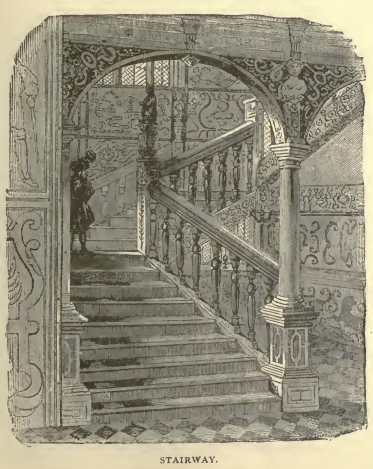
Katharine Parr was the first Protestant Queen of England, and the only one of the wives of Henry VIII. who supported the doctrine of the Reformation with sincerity. She was an Englishwoman, but not of royal birth, being the only daughter of Sir Thomas Parr, a knight. She was gifted by nature with a fine mind, which was carefully cultivated by her excellent mother, as some of her writings that still exist certainly prove. She read and wrote Latin well, and had some knowledge of Greek.
When a little girl she never could bear to sew, and often said to her mother, "my hands are ordained to touch crowns and sceptres, not spindles and needles." But Lady Parr was too wise to allow such notions to take a strong hold of her daughter's mind, and insisted on her performing those duties that befitted her station in life; consequently her embroidery, of which specimens have been preserved, shows unusual skill and industry. At Lizergh Castle a magnificent counterpane and toilet-cover are exhibited as the work of her hands, and although three centuries have passed since it was done, the colors are scarcely dimmed at all. The material is the richest white satin. In the centre is a medallion of a raised eagle beneath the royal crown, surrounded by a wreath of flowers in colored silks and gold thread. At each corner is a large dragon in purple, crimson, and gold, while bouquets of
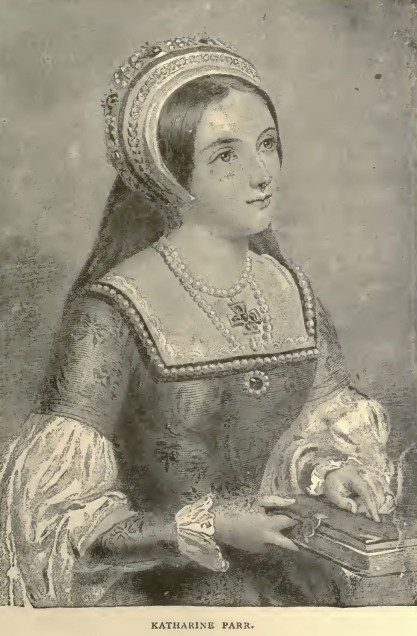
433flowers in gorgeous colors are dispersed here and there over the other part. The pieces match, but are of different proportions.
Katharine was married twice before she became the wife of Henry VIII. Her first husband was Lord Edward Borough, a middle-aged widower with several children, who died a short time after the marriage. John Neville, Lord Latimer, was her second choice; he was also a widower with children, and Katharine's amiable temper and sound sense so well fitted her to perform the duties a stepmother that she was loved and esteemed by the families of both her husbands.
She was not more than twenty-nine years old when she was left a widow for the second time. It was then that she became a convert to the Reformed religion, and encouraged its apostles to meet daily in her chamber of state to preach their sermons.
She was not only pious, learned and handsome, but she possessed great wealth, and was connected by descent or marriage with some of the noblest families in England.
Scarcely six months had elapsed after the death of Lord Latimer when she was informed by Henry VIII. that she was the lady whom he intended to honor by making her his sixth wife. She was amazed, and no doubt terrified, when she recalled the cruel treatment of her royal suitor's other victims'. Besides Lord Seymour was courting her, and she had favored his attentions. But that gentleman valued his head so much that no sooner did he hear of his all-powerful royal brother-in-law's intention than he vanished from the scene, leaving Katharine to transfer her affection as best she might.
A.D. 1543. She exchanged her widow's weeds for bridal robes, and was married at Hampton Court without pageantry, but with all suitable observance of ceremony. 434We are reminded of the fair Scheherazade in the Arabian Nights, who married the sultan, knowing that it was his custom to take a fresh wife every day and cut off her head in the morning.
But the cross, selfish old tyrant whom Katharine Parr had the courage to marry was in such bad health that he needed a skilful nurse; perhaps for that reason she felt confident that her position would be secure. On the day of her marriage she gave presents of bracelets set with rubies, as well as a liberal sum of money, to the Princesses Mary and Elizabeth.
The University of Cambridge sent the king a congratulatory letter on his choice of a Protestant wife, and the celebrated Roger Ascham corresponded with her in the name of that college, requesting her to write oftener, and not to shrink from being called learned. The dignity of the scholar and the queen are beautifully blended with the tenderness of the woman in the character of Katharine Parr after she ascended the throne.
She became an object of jealous ill-will to Gardiner, the leader of the Catholic party, who feared her influence over the king. Scarcely two weeks after the marriage he advised Henry to appoint a commission to search every house in Windsor for books written in favor of the new religion. Henry consented, but made an exception of the castle, no doubt having reason to know that more of such works would be found hidden away in his own household than in all the town put together.
The result was that many men and women were arrested, tried, and condemned to death, and although the flames of their martyrdom were kindled almost in sight of the Protestant queen, she was unable to save the victims. She knew well enough that the murder of these humble Reformers was a blow aimed at herself, and that Gardiner was 435playing a bold game against all those professing her religion.
One of the first acts of justice that Katharine performed after she became queen was to restore the king's two daughters, Mary and Elizabeth, to their proper position at court, after which she was constantly making them presents, and showing them many deeds of tenderness and motherly care. She and Mary were opposed to each other in religious belief, but they were about the same age, had the same accomplishments and tastes, and soon became warm and steadfast friends. Elizabeth's brilliant talents were drawn forth and encouraged by her gifted stepmother, who also directed the studies of Edward.
In one of his letters to her he says: "I thank you, most noble and excellent queen, for the letters you have lately sent me; not only for their beauty, but for their imagination. When I see your good writing and the excellence of your genius, quite surpassing my invention, I am sick of writing. But then I think how kind your nature is, and that whatever proceeds from a good, kind intention will be acceptable; and so I write you this letter."
Her celebrated work, "The Lamentations of a Sinner," is one of the finest specimens of English composition of that period. It is a treatise on morality and the imperfections of human nature.
Henry would have been miserable with a woman of such superior intellect if she had not constantly flattered him and studied his various moods. But so great was the influence she acquired over him, and the confidence he felt in her wisdom, that when he went on an expedition against France he appointed her to govern his realm as Queen Regent of England and Ireland, assisted by the Earl of Hertford.
During his absence he wrote very loving letters to his 436wife, who, together with her royal step-children, resided in one house.
A.D. 1544. She showed a great deal of moral courage, but by her beauty, tact, and domestic virtues she had made herself so necessary to her fat, dropsical husband that she was dearer to him than any of her predecessors had been.
Henry had become so unwieldy from disease that he could not move without assistance, and his wife showed herself the most patient and tender of nurses. Sometimes she would remain on her knees for hours bathing and bandaging his ulcerated leg, for he would not permit anybody to touch it but her.
A.D. 1546. The last occasion of festivity at the court of Henry VIII. was when ambassadors arrived to arrange terms of peace between France and England. They were met by a numerous cavalcade of nobles, knights and gentlemen, headed by the young heir to the throne, Prince Edward, who, though only in his ninth year, was mounted on a charger, and welcomed them in the most graceful and engaging manner. He conducted them to Hampton Court, where for ten day's they were feasted and entertained with great magnificence by the king and queen.
Henry presented Katharine with jewels of great value, that she might make a good appearance before their French guests, he also provided new and costly hangings and furniture for her apartments as well as a quantity of handsome silver.
Wriothesley and Bishop Gardiner were alarmed at Katharine's ever-increasing influence, not only over her husband, but over the mind of young Edward as well, and watched her closely, in the hope that they might be able to make some charge against her. Nothing offered itself excepting her religious opinions, which were opposed to Henry's.
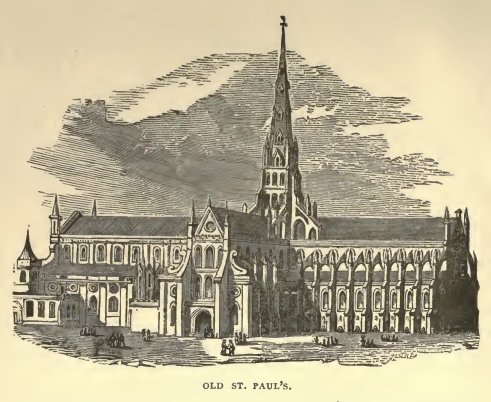
439Several persons were burned to death about this time for professing the reformed doctrine, among whom was the young, beautiful and learned Anne Askew. She was a lady of honorable birth, who became a convert to the new faith, and was for that reason violently driven from her home by her cruel husband. Resuming her maiden name, she worked hard for her religion, and was aided by the first ladies at court. When it was discovered that she had sent books to the queen, she was singled out as a victim by those who hoped by means of torture to wring some confession from her by which Katharine might be charged with heresy or treason. But they were mistaken, for the heroic Anne Askew died at the stake like a true martyr, "with an angelic expression on her smiling countenance." Sir George Blagge was arrested also, but he happened to be one of the king's prime favorites, and was sometimes called by the endearing nickname of "pig." As soon as Henry heard of this arrest he sent for Wriothesley and rated him well, commanding him to draw up a pardon on the spot. On his release Blagge flew to thank his preserver, who on seeing him cried out, "Ah! my pig, are you here safe again!"
"Yes, sire," was the reply, "and if your majesty had not been better than your bishops your pig had been roasted ere this time."
The next attack was on the queen herself, whom Wriothesley and Gardiner had resolved to strike with a fatal blow. They told the king that her sister, Lady Herbert, not only read the books that he had prohibited, but also gave them to Katharine to read. Now it happened that the royal couple often conversed on theological subjects in their hours of domestic privacy, and Henry enjoyed his wife's ready wit and eloquence. She courted these subjects, because, knowing that he was suffering from an incurable malady, she felt it her duty to turn his mind heavenward. 440One day in the presence of Gardiner she went a little too far in opposing her lord's views, and as he was suffering with his leg he felt rather more irritable than usual. He therefore snappishly put a stop to the discussion; after making a few pleasant remarks Katharine left the room. "A good hearing it is," said Henry sharply, "when women become such clerks; and much to my comfort to come, in mine old age, to be taught by my wife!" Gardiner took advantage of the king's wounded vanity to insinuate things against his wife that he would not have dared to say a few days before. He flattered him on his knowledge of theology, and declared that his majesty excelled the princes of that age and every other, as well as all the professed doctors of divinity, so much that it was absurd for anybody to think of arguing with him as the queen had just done. He added that it was painful for any of his counsellors to hear it, because those who were so bold in words would not hesitate to commit any act of disobedience. In fact he so poisoned the king's mind as to gain from him a warrant to consult with others of his party about drawing up articles against the queen that might bring her head to the block. But they decided to begin with the ladies of the court whom she esteemed most, and to search their trunks and closets for something to charge Katharine with, and after they had found it to arrest her in the middle of the night and take her in a barge to the Tower.
All this time the queen suspected nothing, but continued her nursing of her husband and her religious discussions with him as before. One day an attendant of Katharine's picked up a paper in the gallery of Whitehall that Wriothesley had dropped. It contained a list of charges against the queen with an order for her arrest, and bore Henry's signature. The terrified woman had an attack of hysterics as soon as she became acquainted with the contents of the 441paper; as her apartment was next to the king's he heard her shrieks and cries, and sent to inquire what was the matter. Her doctor informed the messenger that the queen was seriously ill, and that the cause seemed to be distress of mind. No doubt Henry realized how much he should miss her gentle nursing if she should die, so he determined to pay her a visit. Accordingly he was wheeled into her room in a chair, and was really alarmed when he saw how ill she looked. After a few minutes she assured him that his visit had greatly revived her, and at the same time expressed her regret at having seen so little of him for a few days, and her fears that she had unintentionally given him some cause for offence. Henry replied kindly and affectionately. Then she was so humble and loving in her manner that a reaction took place in the humor of her imperious lord, and he told the physician of the plot against the patient's life.
The next evening Katharine felt well enough to return the king's visit. She entered his room, attended by her sister, Lady Herbert, and the king's young niece, Lady Jane Grey, who carried the candles before her majesty. Henry welcomed her courteously, but in course of time tried to draw her into a religious argument as usual. She avoided the snare by observing, "that she was but a woman, with all the imperfections natural to the weakness of her sex, therefore in all matters of doubt and difficulty she must refer herself to his majesty's better judgment; for," she continued, "God hath appointed you supreme head of us all, and of you, next unto God, will I ever learn."
"Not so, by St. Mary!" cried the king, "ye are become a doctor, Kate, to instruct us, and not to be instructed of us, as oftentime we have seen."
"Indeed," replied she, "if your majesty have so conceived 442my meaning has been mistaken, for I have always held it preposterous for a woman to instruct her lord; and if I have ever presumed to differ with your highness on religion it was partly to gain information for my own comfort regarding certain nice points on which I stood in doubt, and sometimes because I perceived that in talking you were better able to pass away the pain and weariness of your present infirmity, which encouraged me to this boldness, in the hope of profiting by your majesty's learned discourse."
There was no limit to the flattery that this egotist could stand. With a complacent smile he replied, "And is it so, sweetheart? Then we are perfect friends." He then kissed her, and gave her leave to depart.
On the day appointed for her arrest the king felt better, and sent for her to take the air with him in the garden. She came attended by three ladies. Presently Wriothesley with forty armed men entered the garden with the intention of carrying the queen off to the Tower. But he had not been informed of the change in the king's mind. To his great surprise Henry received him with a burst of indignation, calling him beast, fool, and knave, and bidding him get out of his sight. Katharine tried to calm him, and begged forgiveness for her foe.
"Ah! poor soul," said the king, "thou little knowest, Kate, how evil he deserveth this grace at thy hands. On my word, sweetheart, he hath been to thee a very knave!"
Now if Katharine had not been a woman of forbearance and real virtue she would immediately have turned on her enemies when she had the king in her power, but instead of that she induced him to overlook Wriothesley's offence, but he never forgave Gardiner the blunder he had made, and not only struck his name from his council-book but forbade him his presence. Henry is said to have been very kind 443and affectionate to Katharine during his latter days, yet it was well-known that he was preparing another charge of heresy against her when death overtook him, and that she survived him only by special good luck.
A.D. 1547. Henry VIII. expired January 28, 1547, at the royal palace of Westminster, in the fifty-sixth year of his age.
When his will was opened Katharine was surprised and indignant to find that she was not appointed regent of the realm, with the care of the young King Edward VI., as she deserved to be.
The king's body lay in state for several days, and was then buried with great pomp in St. George's Chapel, Windsor Castle.
A few months after his death Katharine returned to her former lover, Sir Thomas Seymour, to whom she was married in the month of May, 1547. Her royal stepchildren were much pleased at this match, and continued their affection for Katharine throughout her life.
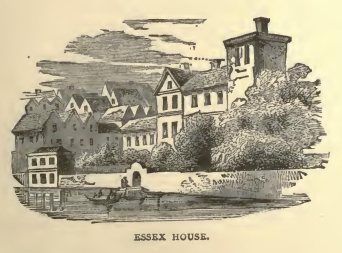
End of the Project Gutenberg EBook of Agnes Strickland's Queens of England,
Vol. I. (of III), by Rosalie Kaufman and Agnes Strickland
*** END OF THIS PROJECT GUTENBERG EBOOK QUEENS OF ENGLAND, VOL. I ***
***** This file should be named 47121-h.htm or 47121-h.zip *****
This and all associated files of various formats will be found in:
http://www.gutenberg.org/4/7/1/2/47121/
Produced by David Widger from page images generously
provided by the Internet Archive
Updated editions will replace the previous one--the old editions
will be renamed.
Creating the works from public domain print editions means that no
one owns a United States copyright in these works, so the Foundation
(and you!) can copy and distribute it in the United States without
permission and without paying copyright royalties. Special rules,
set forth in the General Terms of Use part of this license, apply to
copying and distributing Project Gutenberg-tm electronic works to
protect the PROJECT GUTENBERG-tm concept and trademark. Project
Gutenberg is a registered trademark, and may not be used if you
charge for the eBooks, unless you receive specific permission. If you
do not charge anything for copies of this eBook, complying with the
rules is very easy. You may use this eBook for nearly any purpose
such as creation of derivative works, reports, performances and
research. They may be modified and printed and given away--you may do
practically ANYTHING with public domain eBooks. Redistribution is
subject to the trademark license, especially commercial
redistribution.
*** START: FULL LICENSE ***
THE FULL PROJECT GUTENBERG LICENSE
PLEASE READ THIS BEFORE YOU DISTRIBUTE OR USE THIS WORK
To protect the Project Gutenberg-tm mission of promoting the free
distribution of electronic works, by using or distributing this work
(or any other work associated in any way with the phrase "Project
Gutenberg"), you agree to comply with all the terms of the Full Project
Gutenberg-tm License available with this file or online at
www.gutenberg.org/license.
Section 1. General Terms of Use and Redistributing Project Gutenberg-tm
electronic works
1.A. By reading or using any part of this Project Gutenberg-tm
electronic work, you indicate that you have read, understand, agree to
and accept all the terms of this license and intellectual property
(trademark/copyright) agreement. If you do not agree to abide by all
the terms of this agreement, you must cease using and return or destroy
all copies of Project Gutenberg-tm electronic works in your possession.
If you paid a fee for obtaining a copy of or access to a Project
Gutenberg-tm electronic work and you do not agree to be bound by the
terms of this agreement, you may obtain a refund from the person or
entity to whom you paid the fee as set forth in paragraph 1.E.8.
1.B. "Project Gutenberg" is a registered trademark. It may only be
used on or associated in any way with an electronic work by people who
agree to be bound by the terms of this agreement. There are a few
things that you can do with most Project Gutenberg-tm electronic works
even without complying with the full terms of this agreement. See
paragraph 1.C below. There are a lot of things you can do with Project
Gutenberg-tm electronic works if you follow the terms of this agreement
and help preserve free future access to Project Gutenberg-tm electronic
works. See paragraph 1.E below.
1.C. The Project Gutenberg Literary Archive Foundation ("the Foundation"
or PGLAF), owns a compilation copyright in the collection of Project
Gutenberg-tm electronic works. Nearly all the individual works in the
collection are in the public domain in the United States. If an
individual work is in the public domain in the United States and you are
located in the United States, we do not claim a right to prevent you from
copying, distributing, performing, displaying or creating derivative
works based on the work as long as all references to Project Gutenberg
are removed. Of course, we hope that you will support the Project
Gutenberg-tm mission of promoting free access to electronic works by
freely sharing Project Gutenberg-tm works in compliance with the terms of
this agreement for keeping the Project Gutenberg-tm name associated with
the work. You can easily comply with the terms of this agreement by
keeping this work in the same format with its attached full Project
Gutenberg-tm License when you share it without charge with others.
1.D. The copyright laws of the place where you are located also govern
what you can do with this work. Copyright laws in most countries are in
a constant state of change. If you are outside the United States, check
the laws of your country in addition to the terms of this agreement
before downloading, copying, displaying, performing, distributing or
creating derivative works based on this work or any other Project
Gutenberg-tm work. The Foundation makes no representations concerning
the copyright status of any work in any country outside the United
States.
1.E. Unless you have removed all references to Project Gutenberg:
1.E.1. The following sentence, with active links to, or other immediate
access to, the full Project Gutenberg-tm License must appear prominently
whenever any copy of a Project Gutenberg-tm work (any work on which the
phrase "Project Gutenberg" appears, or with which the phrase "Project
Gutenberg" is associated) is accessed, displayed, performed, viewed,
copied or distributed:
This eBook is for the use of anyone anywhere at no cost and with
almost no restrictions whatsoever. You may copy it, give it away or
re-use it under the terms of the Project Gutenberg License included
with this eBook or online at www.gutenberg.org
1.E.2. If an individual Project Gutenberg-tm electronic work is derived
from the public domain (does not contain a notice indicating that it is
posted with permission of the copyright holder), the work can be copied
and distributed to anyone in the United States without paying any fees
or charges. If you are redistributing or providing access to a work
with the phrase "Project Gutenberg" associated with or appearing on the
work, you must comply either with the requirements of paragraphs 1.E.1
through 1.E.7 or obtain permission for the use of the work and the
Project Gutenberg-tm trademark as set forth in paragraphs 1.E.8 or
1.E.9.
1.E.3. If an individual Project Gutenberg-tm electronic work is posted
with the permission of the copyright holder, your use and distribution
must comply with both paragraphs 1.E.1 through 1.E.7 and any additional
terms imposed by the copyright holder. Additional terms will be linked
to the Project Gutenberg-tm License for all works posted with the
permission of the copyright holder found at the beginning of this work.
1.E.4. Do not unlink or detach or remove the full Project Gutenberg-tm
License terms from this work, or any files containing a part of this
work or any other work associated with Project Gutenberg-tm.
1.E.5. Do not copy, display, perform, distribute or redistribute this
electronic work, or any part of this electronic work, without
prominently displaying the sentence set forth in paragraph 1.E.1 with
active links or immediate access to the full terms of the Project
Gutenberg-tm License.
1.E.6. You may convert to and distribute this work in any binary,
compressed, marked up, nonproprietary or proprietary form, including any
word processing or hypertext form. However, if you provide access to or
distribute copies of a Project Gutenberg-tm work in a format other than
"Plain Vanilla ASCII" or other format used in the official version
posted on the official Project Gutenberg-tm web site (www.gutenberg.org),
you must, at no additional cost, fee or expense to the user, provide a
copy, a means of exporting a copy, or a means of obtaining a copy upon
request, of the work in its original "Plain Vanilla ASCII" or other
form. Any alternate format must include the full Project Gutenberg-tm
License as specified in paragraph 1.E.1.
1.E.7. Do not charge a fee for access to, viewing, displaying,
performing, copying or distributing any Project Gutenberg-tm works
unless you comply with paragraph 1.E.8 or 1.E.9.
1.E.8. You may charge a reasonable fee for copies of or providing
access to or distributing Project Gutenberg-tm electronic works provided
that
- You pay a royalty fee of 20% of the gross profits you derive from
the use of Project Gutenberg-tm works calculated using the method
you already use to calculate your applicable taxes. The fee is
owed to the owner of the Project Gutenberg-tm trademark, but he
has agreed to donate royalties under this paragraph to the
Project Gutenberg Literary Archive Foundation. Royalty payments
must be paid within 60 days following each date on which you
prepare (or are legally required to prepare) your periodic tax
returns. Royalty payments should be clearly marked as such and
sent to the Project Gutenberg Literary Archive Foundation at the
address specified in Section 4, "Information about donations to
the Project Gutenberg Literary Archive Foundation."
- You provide a full refund of any money paid by a user who notifies
you in writing (or by e-mail) within 30 days of receipt that s/he
does not agree to the terms of the full Project Gutenberg-tm
License. You must require such a user to return or
destroy all copies of the works possessed in a physical medium
and discontinue all use of and all access to other copies of
Project Gutenberg-tm works.
- You provide, in accordance with paragraph 1.F.3, a full refund of any
money paid for a work or a replacement copy, if a defect in the
electronic work is discovered and reported to you within 90 days
of receipt of the work.
- You comply with all other terms of this agreement for free
distribution of Project Gutenberg-tm works.
1.E.9. If you wish to charge a fee or distribute a Project Gutenberg-tm
electronic work or group of works on different terms than are set
forth in this agreement, you must obtain permission in writing from
both the Project Gutenberg Literary Archive Foundation and Michael
Hart, the owner of the Project Gutenberg-tm trademark. Contact the
Foundation as set forth in Section 3 below.
1.F.
1.F.1. Project Gutenberg volunteers and employees expend considerable
effort to identify, do copyright research on, transcribe and proofread
public domain works in creating the Project Gutenberg-tm
collection. Despite these efforts, Project Gutenberg-tm electronic
works, and the medium on which they may be stored, may contain
"Defects," such as, but not limited to, incomplete, inaccurate or
corrupt data, transcription errors, a copyright or other intellectual
property infringement, a defective or damaged disk or other medium, a
computer virus, or computer codes that damage or cannot be read by
your equipment.
1.F.2. LIMITED WARRANTY, DISCLAIMER OF DAMAGES - Except for the "Right
of Replacement or Refund" described in paragraph 1.F.3, the Project
Gutenberg Literary Archive Foundation, the owner of the Project
Gutenberg-tm trademark, and any other party distributing a Project
Gutenberg-tm electronic work under this agreement, disclaim all
liability to you for damages, costs and expenses, including legal
fees. YOU AGREE THAT YOU HAVE NO REMEDIES FOR NEGLIGENCE, STRICT
LIABILITY, BREACH OF WARRANTY OR BREACH OF CONTRACT EXCEPT THOSE
PROVIDED IN PARAGRAPH 1.F.3. YOU AGREE THAT THE FOUNDATION, THE
TRADEMARK OWNER, AND ANY DISTRIBUTOR UNDER THIS AGREEMENT WILL NOT BE
LIABLE TO YOU FOR ACTUAL, DIRECT, INDIRECT, CONSEQUENTIAL, PUNITIVE OR
INCIDENTAL DAMAGES EVEN IF YOU GIVE NOTICE OF THE POSSIBILITY OF SUCH
DAMAGE.
1.F.3. LIMITED RIGHT OF REPLACEMENT OR REFUND - If you discover a
defect in this electronic work within 90 days of receiving it, you can
receive a refund of the money (if any) you paid for it by sending a
written explanation to the person you received the work from. If you
received the work on a physical medium, you must return the medium with
your written explanation. The person or entity that provided you with
the defective work may elect to provide a replacement copy in lieu of a
refund. If you received the work electronically, the person or entity
providing it to you may choose to give you a second opportunity to
receive the work electronically in lieu of a refund. If the second copy
is also defective, you may demand a refund in writing without further
opportunities to fix the problem.
1.F.4. Except for the limited right of replacement or refund set forth
in paragraph 1.F.3, this work is provided to you 'AS-IS', WITH NO OTHER
WARRANTIES OF ANY KIND, EXPRESS OR IMPLIED, INCLUDING BUT NOT LIMITED TO
WARRANTIES OF MERCHANTABILITY OR FITNESS FOR ANY PURPOSE.
1.F.5. Some states do not allow disclaimers of certain implied
warranties or the exclusion or limitation of certain types of damages.
If any disclaimer or limitation set forth in this agreement violates the
law of the state applicable to this agreement, the agreement shall be
interpreted to make the maximum disclaimer or limitation permitted by
the applicable state law. The invalidity or unenforceability of any
provision of this agreement shall not void the remaining provisions.
1.F.6. INDEMNITY - You agree to indemnify and hold the Foundation, the
trademark owner, any agent or employee of the Foundation, anyone
providing copies of Project Gutenberg-tm electronic works in accordance
with this agreement, and any volunteers associated with the production,
promotion and distribution of Project Gutenberg-tm electronic works,
harmless from all liability, costs and expenses, including legal fees,
that arise directly or indirectly from any of the following which you do
or cause to occur: (a) distribution of this or any Project Gutenberg-tm
work, (b) alteration, modification, or additions or deletions to any
Project Gutenberg-tm work, and (c) any Defect you cause.
Section 2. Information about the Mission of Project Gutenberg-tm
Project Gutenberg-tm is synonymous with the free distribution of
electronic works in formats readable by the widest variety of computers
including obsolete, old, middle-aged and new computers. It exists
because of the efforts of hundreds of volunteers and donations from
people in all walks of life.
Volunteers and financial support to provide volunteers with the
assistance they need are critical to reaching Project Gutenberg-tm's
goals and ensuring that the Project Gutenberg-tm collection will
remain freely available for generations to come. In 2001, the Project
Gutenberg Literary Archive Foundation was created to provide a secure
and permanent future for Project Gutenberg-tm and future generations.
To learn more about the Project Gutenberg Literary Archive Foundation
and how your efforts and donations can help, see Sections 3 and 4
and the Foundation information page at www.gutenberg.org
Section 3. Information about the Project Gutenberg Literary Archive
Foundation
The Project Gutenberg Literary Archive Foundation is a non profit
501(c)(3) educational corporation organized under the laws of the
state of Mississippi and granted tax exempt status by the Internal
Revenue Service. The Foundation's EIN or federal tax identification
number is 64-6221541. Contributions to the Project Gutenberg
Literary Archive Foundation are tax deductible to the full extent
permitted by U.S. federal laws and your state's laws.
The Foundation's principal office is located at 4557 Melan Dr. S.
Fairbanks, AK, 99712., but its volunteers and employees are scattered
throughout numerous locations. Its business office is located at 809
North 1500 West, Salt Lake City, UT 84116, (801) 596-1887. Email
contact links and up to date contact information can be found at the
Foundation's web site and official page at www.gutenberg.org/contact
For additional contact information:
Dr. Gregory B. Newby
Chief Executive and Director
gbnewby@pglaf.org
Section 4. Information about Donations to the Project Gutenberg
Literary Archive Foundation
Project Gutenberg-tm depends upon and cannot survive without wide
spread public support and donations to carry out its mission of
increasing the number of public domain and licensed works that can be
freely distributed in machine readable form accessible by the widest
array of equipment including outdated equipment. Many small donations
($1 to $5,000) are particularly important to maintaining tax exempt
status with the IRS.
The Foundation is committed to complying with the laws regulating
charities and charitable donations in all 50 states of the United
States. Compliance requirements are not uniform and it takes a
considerable effort, much paperwork and many fees to meet and keep up
with these requirements. We do not solicit donations in locations
where we have not received written confirmation of compliance. To
SEND DONATIONS or determine the status of compliance for any
particular state visit www.gutenberg.org/donate
While we cannot and do not solicit contributions from states where we
have not met the solicitation requirements, we know of no prohibition
against accepting unsolicited donations from donors in such states who
approach us with offers to donate.
International donations are gratefully accepted, but we cannot make
any statements concerning tax treatment of donations received from
outside the United States. U.S. laws alone swamp our small staff.
Please check the Project Gutenberg Web pages for current donation
methods and addresses. Donations are accepted in a number of other
ways including checks, online payments and credit card donations.
To donate, please visit: www.gutenberg.org/donate
Section 5. General Information About Project Gutenberg-tm electronic
works.
Professor Michael S. Hart was the originator of the Project Gutenberg-tm
concept of a library of electronic works that could be freely shared
with anyone. For forty years, he produced and distributed Project
Gutenberg-tm eBooks with only a loose network of volunteer support.
Project Gutenberg-tm eBooks are often created from several printed
editions, all of which are confirmed as Public Domain in the U.S.
unless a copyright notice is included. Thus, we do not necessarily
keep eBooks in compliance with any particular paper edition.
Most people start at our Web site which has the main PG search facility:
www.gutenberg.org
This Web site includes information about Project Gutenberg-tm,
including how to make donations to the Project Gutenberg Literary
Archive Foundation, how to help produce our new eBooks, and how to
subscribe to our email newsletter to hear about new eBooks.